- • Developed a Python script to automate data entry tasks, reducing manual work by 40% and enhancing data accuracy.
- • Collaborated in a team of 5 to design a user-friendly internal website, improving employee engagement by 25%.
- • Conducted thorough testing of new software releases, identifying and documenting over 50 bugs for resolution.
- • Initiated a project to optimize network security measures, which was later implemented company-wide.
- • Analyzed large datasets using SQL and Excel, providing insights that led to a 15% reduction in operational costs.
- • Created detailed reports on market trends, which were used to inform strategic decisions by senior management.
- • Participated in a cross-functional team to develop a new data visualization tool, resulting in improved client presentations.
- • Assisted in the implementation of a new CRM system, training 20+ employees and ensuring a smooth transition.

5 Entry-Level IT Resume Examples & Guide for 2024
Entry Level IT roles focus on providing support for technology systems and ensuring smooth operations for users. Highlight your experience with troubleshooting, customer service, and any relevant technical projects on your resume. Consider incorporating skills like problem-solving, familiarity with various software, and basic network knowledge. Mentioning your ability to learn quickly and adapt to new technologies will demonstrate your potential and commitment to the role.
All resume examples in this guide
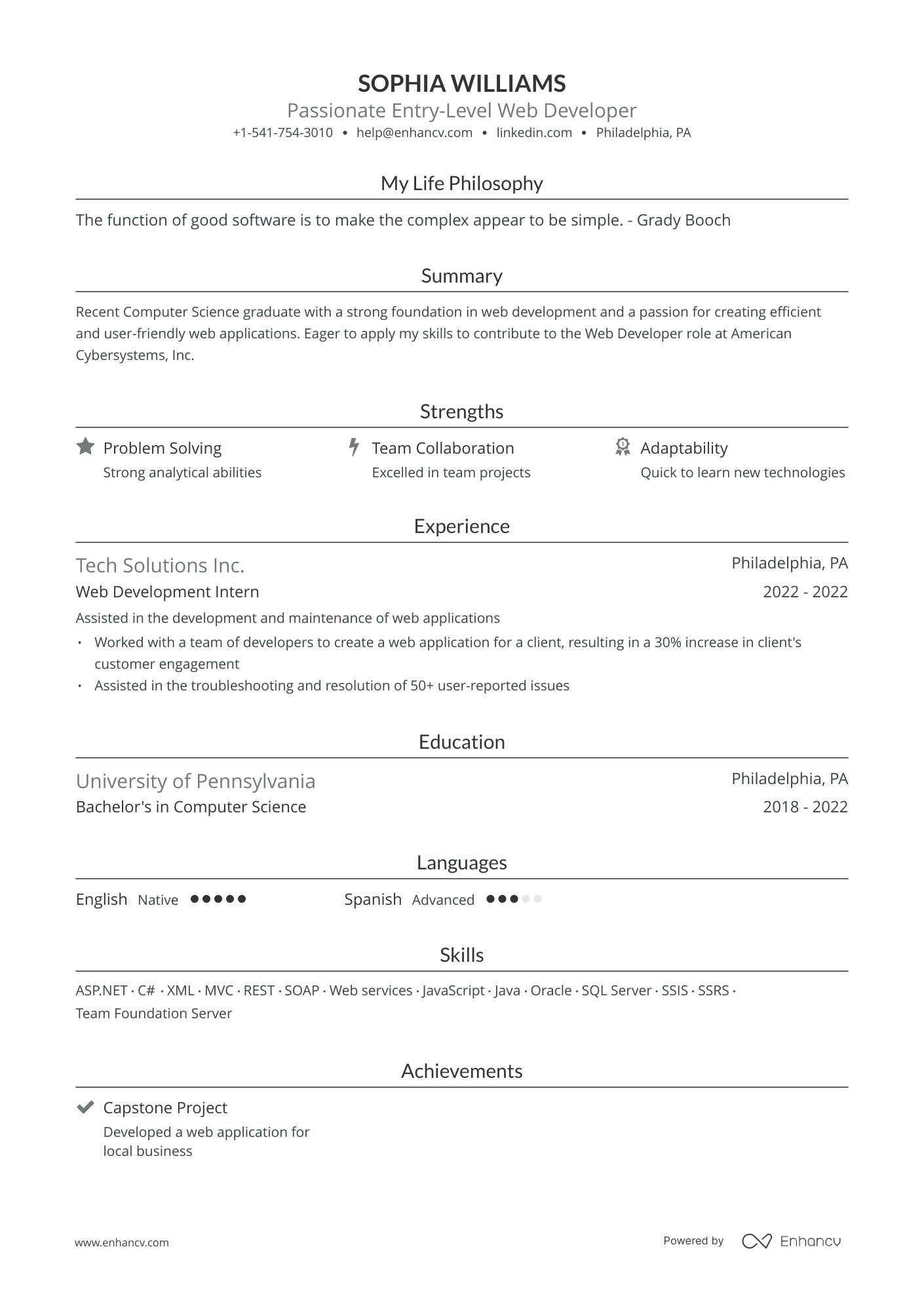
Traditional
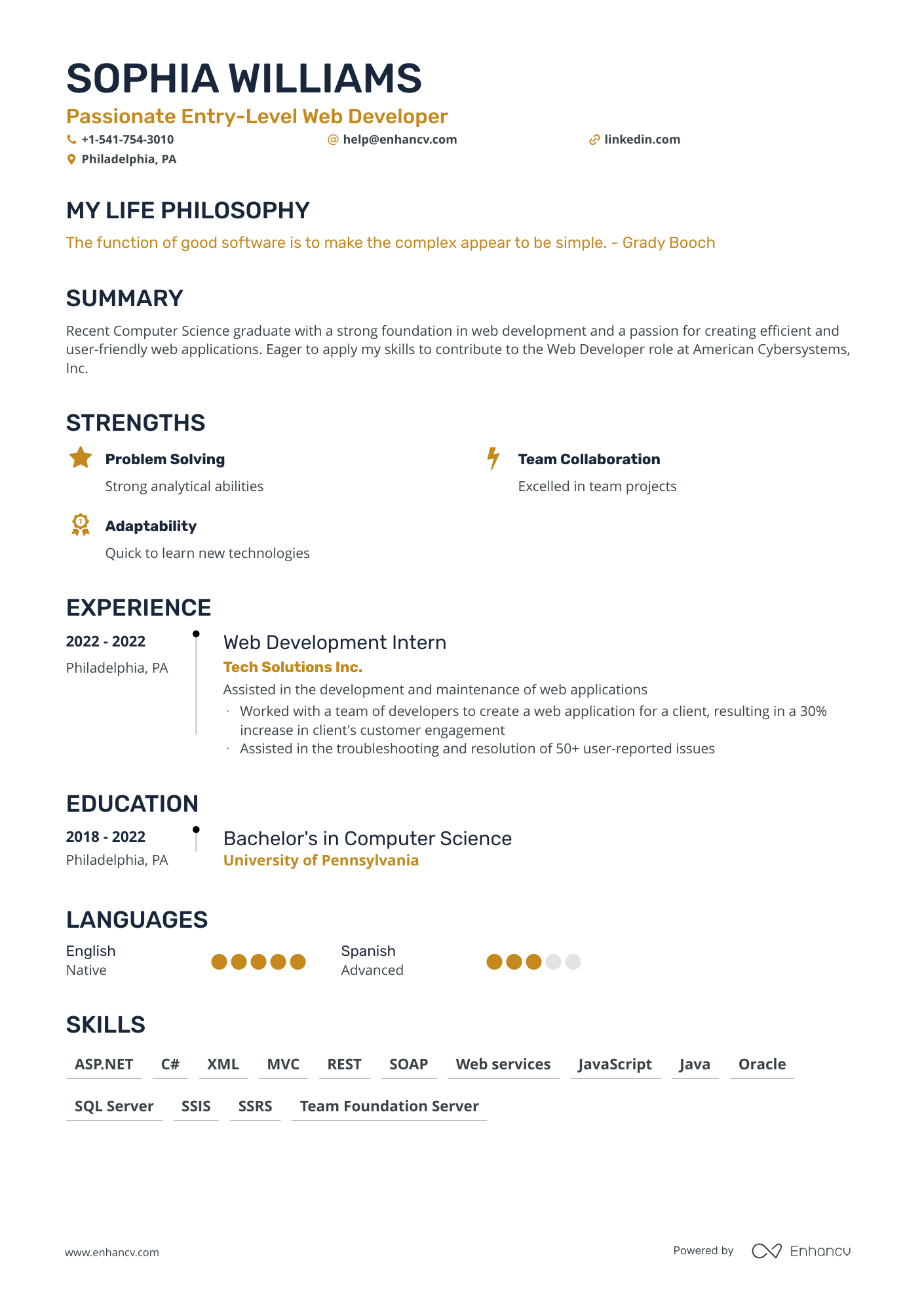
Resume Guide
Entry-level IT Resume Example
Resume Format
Resume Experience
Hard & Soft Skills
Certifications & Education
Resume Objective Tips
Additional Resume Sections
Key Takeaways

IT professionals are increasingly becoming the most sought-after talent in today’s job market across various industries. Even among entry-level applicants, companies are on the lookout for the next superstar to drive their technological advancements forward.
But, there’s a big headache for entry-level IT applicants when highlighting their qualifications! That’s due to the nature of tech jobs, which aren’t as straightforward as traditional roles. Two entry-level IT candidates can occupy the same role in separate companies yet have completely different duties and responsibilities.
On the bright side, a powerful entry-level IT resume that captures your unique strengths and talents can be the solution. All you need to do is understand exactly what’s expected from you in the job description to be able to promote yourself in the best fashion.
This entry-level resume-building guide will teach you:
- How to format and design your entry-level IT resume to make a strong first impression.
- Best strategies to bridge your lack of experience through projects, internships, and self-taught skills.
- Most in-demand soft and core skills for entry-level IT jobs to meet recruiters’ demands.
- Entry-level IT resume templates and examples to get you inspired.
- Unique techniques for leveraging education and certificates to bolster your job search.
Looking for more resume guides for entry-level IT jobs? Check out our top picks:
- Entry-Level Programmer Resume
- Entry-Level System Administrator Resume
- Entry-Level Data Scientist Resume
- Entry-Level Software Engineer Resume
- Computer Science Resume
- Entry-Level IT Cover Letter
Entry-level IT resume example
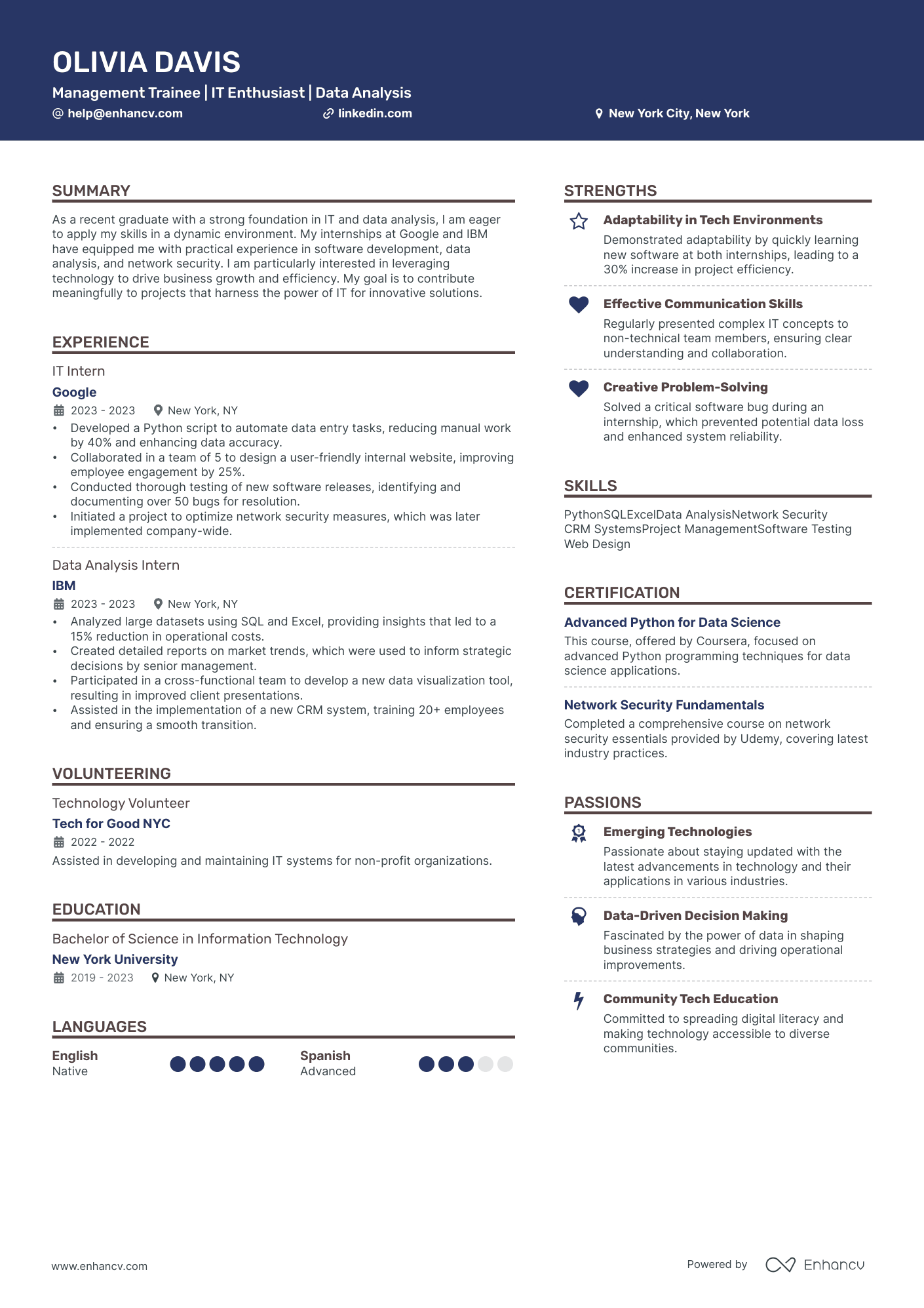
Here's what this applicant does well in their resume:
- Practical IT experience: Mentions internships at Google and IBM, showcasing hands-on experience in software development, data analysis, and network security, which is crucial for the IT field.
- Quantifiable achievements: Provide specific figures, like reducing manual work by 40% and increasing engagement by 25%, demonstrating the impact of their work.
- Relevant certifications: Lists certifications like "Advanced Python for Data Science" and "Network Security Fundamentals," which are pertinent to the IT and data analysis sectors.
- Enthusiasm for IT: Demonstrates a genuine passion for technology and continuous learning, highlighted by their volunteering experience at nonprofit organizations and commitment to spreading digital literacy.
How to format an entry-level IT resume
Crafting an effective entry-level IT resume is about presenting your professional journey in an unambiguous fashion that captivates recruiters right off the bat. Just like how clarity and efficiency are essential in IT, you should think of your resume format as the UI of your job application.
A well-designed UI guides recruiters effortlessly through your resume, making such a potentially dull task effortless and enjoyable. It allows you to highlight your strengths and achievements clearly and concisely, ensuring that your document stands out in a sea of applicants.
When formatting your entry-level IT resume, consider the following elements to make a strong impact:
- Use the reverse chronological format: Start with your most recent degree, certification, or work experience, and then work your way backward.
- Create an attractive header section: At the top of the page, craft a clear header that includes your name and contact information . (If you’d like to add a resume photo , you should be mindful of the norms in the country you're applying to.)
- Emphasize important sections: As an entry-level applicant, it’s key to shift the focus from experience toward other sections such as education, internships, certifications, as well as relevant projects or skills.
- Keep your resume length to one page: If you keep your resume concise and on-point, a single page is more than sufficient to cover all relevant information without overwhelming the recruiter.
Resume font is another important element to consider when building your entry-level IT resume. The right typeface is both professional and easy to read, making your resume more visually appealing. Some fonts we recommend are Rubik, Lato, Montserrat, Raleway, Exo 2, and Volkhov. But of course, you can always use traditional fonts such as Arial and Times New Roman.
When deciding on the format to use for your resume , PDF is often the best choice compared to DOC. PDF documents maintain their design and layout across all devices, ensuring that hiring managers will read them exactly as you intended. This is particularly crucial for entry-level IT resumes, where clarity and professionalism are key.
Lastly, you may have heard the myth that applicant tracking systems (ATS) will automatically reject your resume if it lacks a few keywords. In reality, that's far from the truth because ATS systems still don't have built-in features that autonomously disqualify candidates based solely on the absence of specific keywords. So, what does that mean exactly?
If your rejection rate is high, it's probably due to one of two reasons:
- The position had already been filled before you even sent your application.
- The hiring manager went through all resumes and chose a different applicant.
Now, the goal of using these keywords is more about resonating with the recruiter once your resume reaches their desk. Especially in IT, core skills and industry-specific terms demonstrate your familiarity with the tech field and align your experience with the job requirements, making a strong case for your candidacy.
Is your resume good enough?
Drop your resume here or choose a file . PDF & DOCX only. Max 2MB file size.
The top sections on an entry-level IT resume:
- Header: It allows the recruiter to connect with the candidate easily for discussion or job offers.
- Career objective: Helpful to understand the candidate's goals, and aspirations, and how they align with the company's requirements.
- Skills: For the IT role, this section is essential to list technical skills like coding languages, software, and hardware familiarity.
- Education & certifications: This highlights the candidate's credentials, degree, and any extra courses or certifications specifically in the IT domain.
- Work experience/internships: Shows any hands-on experience with IT roles or projects, which is often a deciding factor for entry-level candidates.
What recruiters want to see on your resume:
- Technical skills: These are vital in IT roles as they form the basis of their work, which includes coding languages, software knowledge, hardware troubleshooting, etc.
- Certifications: Certificates from reputable sources strongly suggest dedication and seriousness toward your profession, giving you an edge over other applicants.
- Problem-solving skills: Problem-solving is a crucial skill as it allows IT job seekers to overcome complex technical issues using logical thinking and creativity.
- Hands-on experience: Even for an entry-level candidate, expertise with real-world projects, internships, or volunteer work can demonstrate your ability to apply theoretical knowledge in practical scenarios.
- Familiarity with latest trends: The field of IT is rapidly evolving, making a proactive learning approach a top priority for hiring companies. That includes familiarity with the latest tech trends (like AI, Machine Learning, etc.).
How to write your entry-level IT resume experience
Typically, the experience section is the part of your resume where you outline your career history and achievements. It’s where you provide recruiters with insight into your practical skills and how you've applied your tech knowledge in real-world scenarios.
But as an entry-level IT candidate, it’s comprehensible if you don’t have extensive experience to showcase in your resume. The good news is: hiring companies understand that and aren’t looking for long years of expertise. However, you still have an opportunity to catch them off guard and get them excited about hiring if you list self-directed learning experiences, temp work , projects, etc.
Here are a few ways you can do that:
- Projects and coursework: Detail any relevant academic projects or coursework that demonstrate your IT skills and knowledge.
- Internships: Even when not directly related to IT, internships can show your ability to work in a professional environment and acquire new skills.
- Volunteer work: Participation in tech-related volunteer work is invaluable to highlight your practical skills and your passion for technology.
- Self-learned skills: Mention any IT skills you've taught yourself through online courses, tutorials, or personal projects.
Examples of entry-level IT resume experience section:
- • Participated in a semester-long project to build a website for a local shop
- • Utilized web development tools and languages to assist with the development of front-end and back-end components.
- • Responsible for the testing and optimization of website features post-launch.
From a quick first glance, it's evident that there are a lot more details you can delve into when describing this project. Of course, this doesn’t mean overloading your description with buzzwords and jargon that could leave the recruiter confused. But it does mean providing a clearer, more engaging narrative.
Also, the example fails to feature any metrics or tangible skills that might catch the hiring manager's attention.
Here are a few quick tips to enhance this entry-level IT experience section:
- Include quantifiable achievements: Whenever possible, use numbers to quantify your accomplishments in the project. For example, "Developed an app that got 1,000+ downloads in the first month."
- Highlight transferable skills: Even if your experience isn't directly related to IT, highlight any transferable skills you may have acquired throughout your journey. These could include problem-solving, teamwork, and adaptability.
- Leverage action verbs: Start each bullet point with a strong action verb, such as “Designed” or "Implemented," to articulate your contributions more effectively.
- • Collaborated with a 4-member team to develop an e-commerce website for a local bookstore, utilizing HTML, CSS, JavaScript, and PHP.
- • Led the backend development by designing and implementing a secure, efficient MySQL database to handle user data and transactions.
- • Conducted comprehensive testing and debugging to ensure optimal site functionality across different browsers and devices, resulting in a 25% increase in user engagement in the first-month post-launch.
How to list your hard skills and soft skills on your resume
Showcasing sought-after skills on your entry-level IT resume is crucial as that illustrates your readiness to adapt, learn, and contribute from day one. Headhunters don’t expect you to master machine learning algorithms or cloud infrastructure optimization. However, they’re looking for someone with the right talents and personality to embark on their learning journey with enthusiasm and dedication.
There are two types of skills you can list on any IT resume: soft skills and core skills.
Soft skills are personal attributes that enable you to interact effectively and harmoniously with others in your day-to-day activities. In the IT sector, interpersonal skills are just as crucial as technical abilities, which include communication, teamwork, and adaptability.
Hard skills refer to the technical competencies and knowledge that are specific to the IT field. These measurable abilities are often acquired through education, certifications, and practical experience. Examples of core skills could include programming languages, network security knowledge, or database management.
Here are three steps to build a captivating skills section for your IT resume:
- Start with the job description in mind: Carefully read the job ad to identify the skills and talents the hiring company is seeking. This ensures your resume is aligned with the specific requirements of the position.
- Write down all your soft and core skills: Create a comprehensive list of all your abilities, and make sure you’re listing all the transferable skills you’ve acquired through other experiences.
- Narrow it down to 5-10 unique and relevant skills: Select the 5-10 most in-demand soft and core skills that best represent your capacities so you can best represent your qualifications.
Best hard skills for your entry-level IT resume
- Network Troubleshooting
- Cybersecurity
- Cloud Computing (AWS, Azure)
- Data Analysis
- Machine Learning
- Artificial Intelligence
- Project Management Tools
- Software Testing
- Database Management
- UI/UX Design
- Mobile App Development
- Troubleshooting Hardware Issues
Best soft skills for your entry-level IT resume
- Communication
- Problem-Solving
- Critical Thinking
- Time Management
- Adaptability
- Customer Service
- Attention to Detail
- Collaboration
- Learning Agility
- Multitasking
- Decision Making
- Analytical Thinking
- Stress Management
- Self-Motivation
How to list your certifications and education on your resume
Education and certifications will provide a powerful boost to your application as an entry-level IT candidate. They not only show your commitment to the profession but also your eagerness to learn and grow. These sections are especially valuable if you’re a fresh graduate with not much work experience or transferable skills to capitalize on.
Before we dive into any further details on how to list your education, let’s first understand what hiring companies expect from you for their entry-level job openings.
The majority of starter jobs in IT require at least a bachelor's degree in related fields such as computer science, information technology, or software engineering. Given the flexibility of the IT sector, candidates with different educational backgrounds can also land a job with relative ease. However, they first have to demonstrate strong technical skills and practical experience through projects or internships.
When listing education on an IT resume, you must include the following information:
- Name of your degree (e.g., Bachelor of Science in Computer Science)
- Name of the institution (e.g., University of XYZ)
- Graduation date (or expected graduation date if you're currently studying)
- Major and minor (if applicable)
- Relevant coursework , projects, or academic achievements (optional)
Certifications serve as an objective measure of your technical abilities and potential. They’re an excellent way to prove your keen interest in the latest advancements and best practices in your field. More importantly, they signal to employers your willingness to learn, giving you an edge over any other applicant lacking such credentials.
Best certifications for your entry-level IT resume
- Support Certifications
- ITIL 4 Foundation IT Service Management Certification
- CompTIA Cloud+
- Cisco Certified Network Associate
How to write your entry-level IT resume summary or objective
A resume summary is a personal statement outlining your professional expertise and career skills. It’s like an executive summary of a project report, designed to give a quick overview of your biggest achievements and what you can bring to the table.
A resume objective, on the other hand, focuses more on your career goals and future aspirations. Instead of highlighting measurable accomplishments, the objective section helps you articulate your potential and eagerness to contribute to the company's success.
As an entry-level applicant, your best bet is to capitalize on your future potential and make realistic promises about what you can help the company achieve. You also want to express your enthusiasm for the IT field and showcase your commitment to learning, which can be your strongest selling point since you lack experience.
Therefore, it’s best to create a resume objective instead of a resume summary .
But how can you make this section so captivating that it can get you shortlisted for an interview?
- Match your resume objective to the job offer: Your objective should fit the specific IT role you're applying for, addressing its needs and requirements.
- Highlight soft and transferable skills: Even if you're new to the field, you likely have relevant coursework or soft skills that you can put to good use. Look for any transferable technical skills that you possess, such as analytical reasoning or attention to detail.
- Highlight your passion for IT: Showing enthusiasm for technology and how you stay updated with the latest trends will certainly make your application more compelling.
- Clarify your career goals: Be sure to outline how you see this role fitting into your career path. This proves to recruiters that you have ambition and that you are thinking about how you can grow within their company.
Examples of entry-level IT resume objective sections:
Even if this is your first time building a resume, you can easily tell that this objective doesn’t do a good job of persuading recruiters. Not only is it too focused on the candidate’s wants, but it also lacks specificity when it comes to skills and talents. Even worse, it fails to mention any relevant qualifications or areas of interest in IT.
Let’s apply the tricks we learned above, and see how this example improves:
This new objective section is targeted specifically to the job offer, which makes it more appealing and attractive to the hiring company. It clearly states the applicant’s educational background and area of expertise, emphasizing how they will contribute to the company’s growth. It also demonstrates a genuine willingness to learn and grow, aligning the candidate's goals with the company's objectives.
Additional sections for an entry-level IT resume
As already mentioned, a one-page resume is sufficient for an entry-level IT applicant. However, you do need to make your application interesting through additional sections to truly capture your worth and provide a comprehensive view of your capabilities.
If you think about it: your fiercest competitors also have a bachelor’s degree, possess relevant certifications, and can boast similar technical skills. So, to truly stand out, your resume outline has to showcase qualities beyond just technical skills and education. Your own entry-level IT resume must include instances from both your professional and personal life that can make recruiters go “Wow!”.
Here are the best additional sections to feature on an entry-level IT resume:
- IT Projects: Detail any relevant projects you've worked on, whether as part of your coursework, personal initiatives, or through internships.
- Strengths: Highlight personal strengths that make you a good fit for IT roles, such as proficiency in coding languages, analytical thinking, or problem-solving skills.
- Hackathons and Competitions: Participation in hackathons, coding challenges, or technology competitions will show your competitive spirit and ability to work under pressure.
- Online Courses and Workshops: Completing relevant online courses or workshops, especially those with a practical component or certification, shows your interest in developing your technical knowledge.
- Volunteering: Volunteer work, especially when related to technology, can demonstrate passion and your willingness to engage with the community.
- Languages: Multilingual abilities are a great asset when applying for global companies, as they can highlight your ability to communicate in diverse environments.
- Passions: Share any passions you have related to technology, which can range from a keen interest in cybersecurity trends to personal projects like building your own PC or developing an app.
Key takeaways
Crafting a career-launching entry-level IT resume should no longer be a mystery. Here are a few key ideas to get you started:
- Your resume format and design are vital for making a strong first impression. Always ensure they are tailored to be both visually appealing and professionally relevant.
- Despite your lack of experience, you can showcase technical prowess by detailing relevant projects, coursework, and personal initiatives. This demonstrates your ability to apply theoretical knowledge in practical scenarios.
- Choose the most persuasive soft skills and core talents and highlight them in a separate section to draw attention to your best capabilities.
- Hiring companies consider theoretical knowledge a gold mine when hiring for entry-level jobs. Thus, highlighting a degree with relevant certificates could be the key to elevating your entry-level IT resume.
- Create a personalized resume objective instead of a summary to inform recruiters about your career goals and showcase your passion and enthusiasm for the tech field.
- Additional sections such as “Projects” and “Workshops” will help provide a fuller picture of your skills and interests, making you a more attractive candidate to recruiters.

Looking to build your own Entry Level It resume?
- Resume Examples
Why Does My Resume Look Different When I Upload It
How to write a job rejection email response (with bonus examples), how do i conduct a resume review, how to list an internship on your resume, should you include irrelevant experience on your resume, how to write a resume for internal position.
- Create Resume
- Terms of Service
- Privacy Policy
- Cookie Preferences
- Resume Templates
- AI Resume Builder
- Resume Summary Generator
- Resume Formats
- Resume Checker
- Resume Skills
- How to Write a Resume
- Modern Resume Templates
- Simple Resume Templates
- Cover Letter Builder
- Cover Letter Examples
- Cover Letter Templates
- Cover Letter Formats
- How to Write a Cover Letter
- Resume Guides
- Cover Letter Guides
- Job Interview Guides
- Job Interview Questions
- Career Resources
- Meet our customers
- Career resources
- English (UK)
- French (FR)
- German (DE)
- Spanish (ES)
- Swedish (SE)
© 2024 . All rights reserved.
Made with love by people who care.
![it entry level sample resume How to Write an Entry Level IT Resume [With 3 Examples]](https://www.visualcv.com/static/7d5c5966fbe7ea7760b4cca046e2fe0b/38ec4/entry_level_IT_hero-min.jpg)
How to Write an Entry Level IT Resume [With 3 Examples]

When we speak to entry-level IT professionals, it isn’t uncommon for us to hear -
“I sent 400 applications and only got 2 calls, is it normal? Is finding an IT job that hard? Is my entry-level IT resume that bad?”
Not having an experience hurts your chances for sure, but it isn’t the end of the road .
The key is to differentiate yourself from the rest by writing an entry-level IT resume.
While you work on improving your qualifications (projects, certifications, etc) - this guide will help you perfect your IT resume with no experience .
Let’s start by looking at some entry-level IT resumes that you can drive inspiration from. But if you feel you need more inspiration, browse our 500+ resume examples library.
- Entry Level IT Resume with No Experience Example
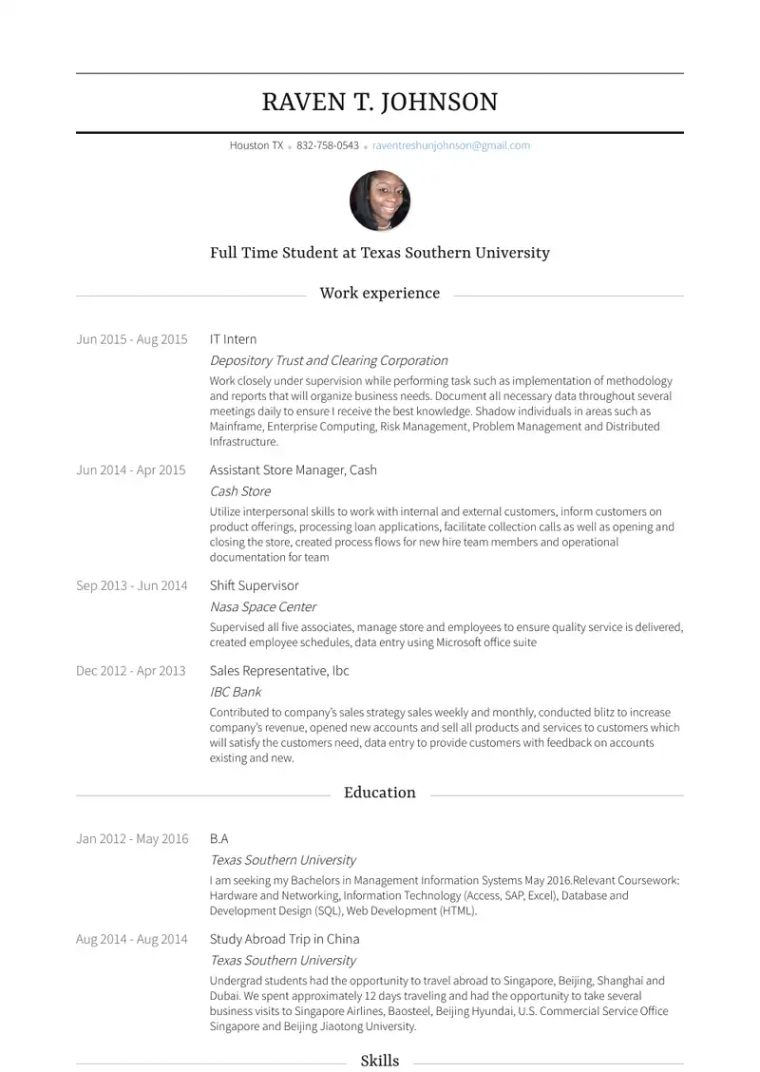
- Entry Level IT Resume with 6 Months of Experience Example
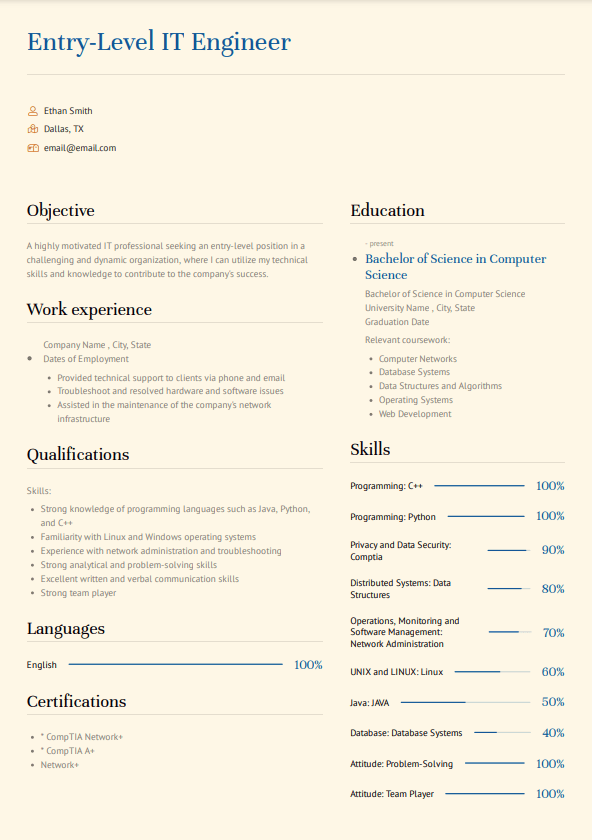
- Entry Level IT Support Technician Resume Example
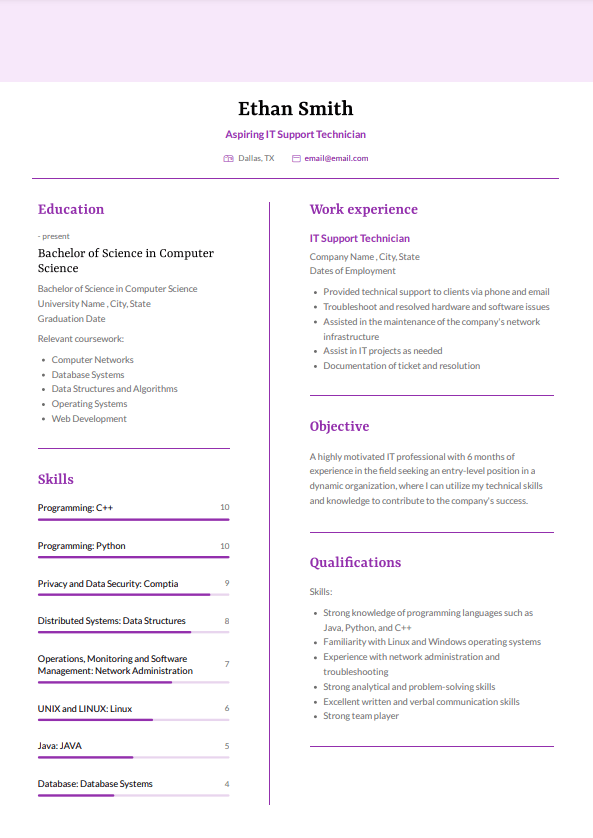
- How to Write an Entry-Level IT Resume
After reviewing thousands of entry-level IT resumes, here’s our take on how you should write yours:
- Unprofessional templates, odd white spaces, and general ill-fitting resume templates lead to rejection. That’s why select the right entry-level IT resume template.
- Avoid writing paragraphs, try to use bullet points and short sentences. 90% of rejected entry-level resumes fail to do this.
- Carefully put an objective summary, your top skills, any past relevant experience or projects, education, and IT certifications as individual sections.
- Now, make sure your objective is less than three lines, communicates your skills, past relevant experience, and why you are applying for this IT role.
- While listing any relevant past experience, follow the STAR method to impress the hiring manager.
- On the education section - list your degree and year. Add your GPA only if it is more than 3.7.
- While listing your certifications - make sure to list the date on which you completed the certification.
- When your list your skills - focus on IT technical skills and leverage this section to add relevant keywords.
- If you still wish to add soft skills, add them in a separate section.
If you have no experience to show at all (not even from student jobs that could potentially show transferable skills) - put the following sections in your resume instead (in this order):
- Resume header with full name, contact information, links, and objective summary.
- Relevant IT projects.
- Certifications
If you follow the advice given above - you’ll be able to beat 90% of competing job applications.
Also, a hiring manager would consider your application a lot more seriously as your being so thoughtful with your entry-level IT resume.
All good so far, right? And, we understand that you aren’t a copywriter who can write these entry-level IT resume sections without sweating.
That’s why we will show you how you can perfectly write each of these sections. And, we will give you templates to write yours as well.
- Example Entry-Level IT Resume Objective
Aspiring IT Support professional with deep expertise in hardware troubleshooting, technology deployment, network troubleshooting, and virtualization. Dean’s List for all semesters. Actively exploring opportunities to solve complex networking problems.
This IT objective is extremely brief, very impactful, and would keep the hiring manager interested in your application.
If you wish to create a similar entry-level IT resume objective without the pain, simply fill out the template below.
Entry-Level IT Resume Objective Template
Aspiring IT [target job title] professional with deep expertise in [skill 1], [skill 2], and [skill 3]. Achieved [add your top achievement here]. Actively exploring opportunities to solve [a specific interest of yours] problems.
- Summary or Objective for your Entry-level IT Resume with No Experience?
If you have no IT experience, we recommend that you write an objective instead of a resume summary. An objective can more meaningfully convey your existing skills, how they are relevant and why you are applying for a position.
A resume summary would only help if you are an entry-level IT professional with 0-1 year of experience. And, if that’s the case, here’s an example and a template for you.
- Entry Level IT Resume Summary for 0-1 Year Experience IT Professionals
IT Support professional with 8 months of managing ACME’s intranet and handling all IT tickets. Evolved and scaled IT systems at ACME and now exploring more challenging IT support opportunities.
Use the template below to write an impactful entry-level IT resume summary.
Template for Entry-Level IT Resume Summary
IT [job title] professional with [0-1] month(s) of [core expertise, core responsibilities]. [Achieved something] at [current company] and now exploring more challenging [job title] opportunities.
You now should be able to effortlessly write your own entry-level IT objective or summary.
Once you’ve shown a hiring manager that you are skillful and passionate about information technology - it’s time to give them exactly what they want to read further.
We will do that by showcasing relevance through:
- Any work experience with transferable skills.
- Project work performed that displays technical proficiency in IT.
- Certifications that show commitment to learning.
- Skills that show you are relevant to the position.
- Relevant education and a great academic record.
- Right Way to Fill Work History When You’ve No IT Experience
When you write your work history section, you either:
- Have internships or other jobs whose experience would help display your proficiency with IT systems.
- You have no internship or experience but have worked on technical IT projects in college or a personal capacity.
When writing an entry-level IT resume where you can show any past experience that can highlight transferable skills - follow these steps:
- Look at the job description, and extract key skills a hiring manager would want a potential candidate to have.
- Explain how your past experience involved leveraging those skills or solving similar problems.
- Make sure to list your work experience in form of a bulleted list.
- Follow the STAR method while writing your experience.
- Make sure to re-read your entry-level IT resume
But what if you have never worked any job before? Not even an internship!
In that case, we advise that you rename the “Work Experience” section of your entry-level IT resumer to “IT Projects”. Now, you can list your projects in a no-experience IT resume in two ways.
Here are two formats for entry-level IT resumes.
Format Entry-level IT Resume With No Experience #1
[Name of IT Project] [Date/Duration]
- [bullet list item #1 e.g. performed network testing for 100+ connected gateways]
- [bullet list item #2 …]
- [bullet list item #3 …]
Note - use this format only when you are listing a large project. It would make little sense to list smaller projects in that way. If you have done multiple-smaller projects, use the resume format provided below.
IT Projects [Date/Duration]
- [Project 1] [one line description e.g. performed network testing for 100+ connected gateways]
- [Project 2] [one line description …]
- [Project 3] [one line description …]
If you have done any IT internship, list that within the work experience section.
Example of Listing Internship on an Entry-Level IT Resume
IT Support Intern | May-June 2021 Nyoom Technologies | New York, NY
- Assisted with day-to-day IT support queries from Nyoom staff, achieving a 95% success rate.
- Participated in training and development sessions with a staff mentor to develop my IT support and customer service skills.
- Collaborated with IT support staff to update support documentation, empowering staff to address IT issues independently
- Entry Level IT Skills for Resume
- Database maintenance
- Systems administration
- Customer service
- Collaboration
- Microsoft Office suite
- Troubleshooting
These skills are expected from every entry-level IT candidate. If you are applying for a specific role e.g. IT Network Administrator - highlighting your IT networking skills would be the best.
- Certifications for Entry-Level IT Resume
- CompTIA Network+
- CompTIA Security+
These certifications are very commonly expected from entry-level IT resumes with no experience.
- Add Keywords to Your Entry-Level IT Resume
While writing your entry-level IT resume, pick relevant keywords from this list and add to your resume:
- System administration
- IT networking
- IT infrastructure
- Database administration
- Ticket management
- Patch management
- System upgrades
- Network configuration
- Real Entry-Level IT Resumes and What They Can Improve
Entry-Level IT Resume Feedback #1
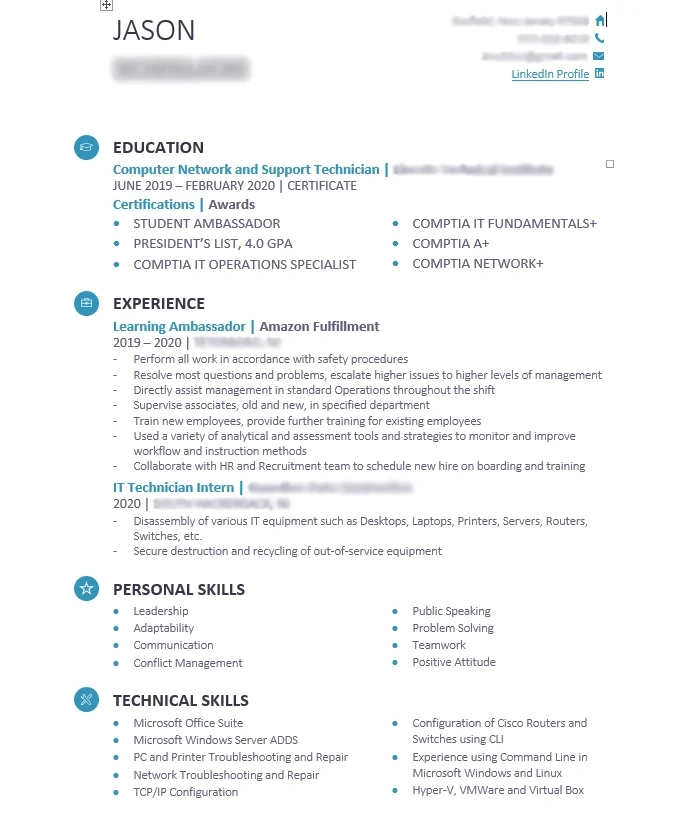
If we were to improve this entry-level IT resume, we would:
- Lead with IT skills instead of experience using a functional or a combination resume format.
- The date the IT support technician certification was completed should be listed.
- The entry-level IT candidate should make devices, vendors, services, applications, etc that they worked with more visible as that’s the information a hiring manager would look for.
Entry Level IT Resume Feedback #2
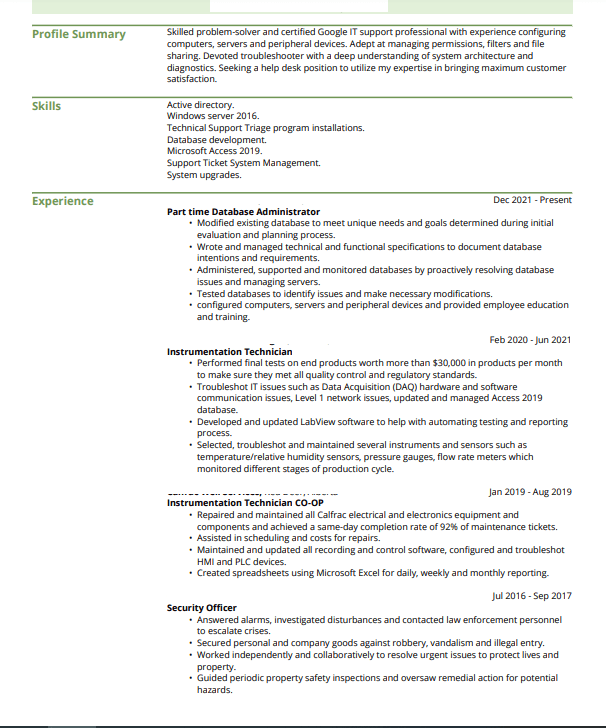
- The resume is more than one page, that’s not helpful for an entry-level IT resume. Reduce it to one page.
- Reduce the skill section by using commas instead of adding them to a new line.
- Since the candidate already has an IT background, it would help them if they write an objective explaining how their skills are transferable and better explain why they are applying for the position.
- The resume template used in this entry-level resume has too much whitespace that unnaturally extends the length. Select a better resume template.
- Use more IT specific keywords e.g. troubleshooting systems, networking, Linux, etc.
Entry Level IT Resume Feedback #3
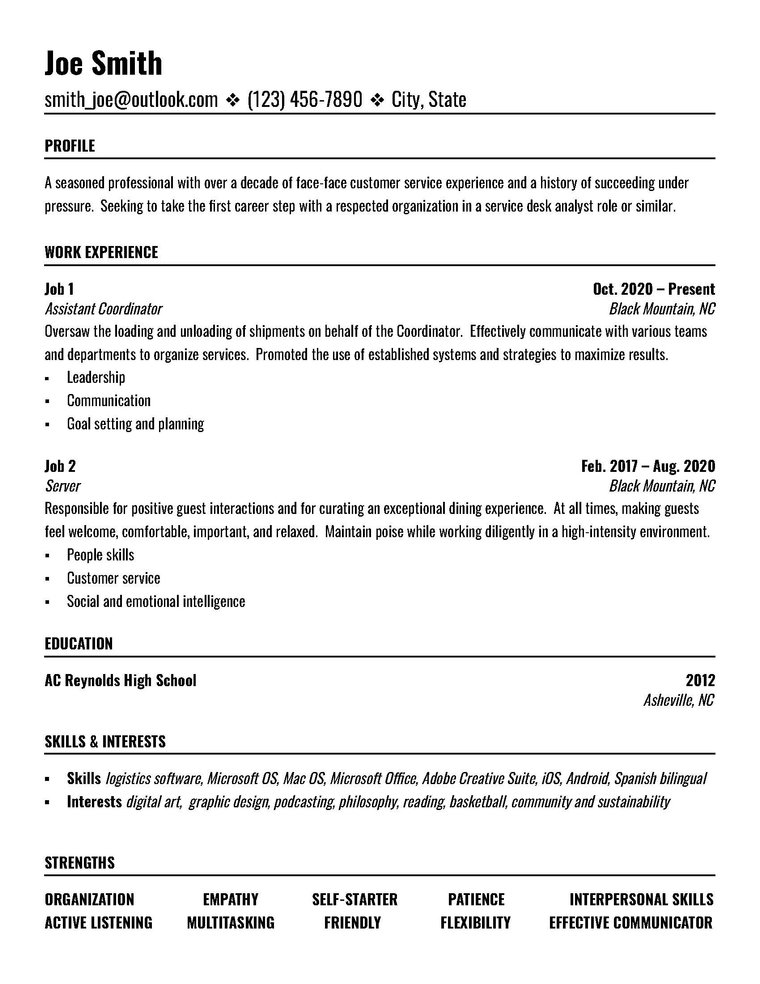
- Turn the two lines under the existing experiences into bullet points following a STAR format.
- Add any relevant IT certification or IT education in a separate section.
- Reduce the number of soft skills used as they are adding fluff to this entry-level resume. The resume currently appears to be from a candidate that hasn’t proactively learned anything about information technology.
- List your college/university and your major/minor. List your GPA if your GPA is more than 3.7.
- Remove the strength section as it is adding no value to your resume.
- How to Improve your Entry-Level IT Resume Even Further?
Reach out to your contacts, colleagues, friends, mentors, etc within the target IT role and ask them for feedback on your entry-level IT resume.

Madison Norton
VP Marketing & Resume Expert
Madison is the VP Marketing and General Manager at VisualCV . He's a seasoned marketing leader, resume writing and career marketing expert and now helping people grow their own career marketing strategies to build a career they love.
Madison on LinkedIn
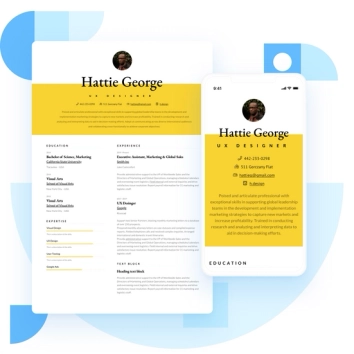
Resume formatting tips and examples for all jobs and experience levels. Learn how to best format your resume and land that dream job in 2024!
August 8, 2023

Our 2023 Free Resume Writing Guide is filled with quality job search tips, resume examples and information you need to know before writing your resume or CV.
January 30, 2023
![it entry level sample resume The complete guide to using a two-column resume template [with examples]](https://www.visualcv.com/static/944469b562e32c5bf7cab8359abbbcb6/b1ad1/laptops-pencil.png)
What is a two-column resume, and why should I use one? With stylish templates and efficient use of space, a two-column resume is great for any job-seeker.
April 22, 2022
Community Success Manager & CV Writing Expert
Copyright © 2024 Workstory Inc.
Select Your Language:
7 Entry-Level Software Developer Resume Examples for 2024
Starting as an entry-level software developer can be challenging. This article provides resume examples and advice to help you create a strong application. Learn what skills to highlight, the best formats, and how to catch a hiring manager's attention. Start your career in software development with the right resume.

- 04 Sep 2024 - 5 new sections, including 'Education placement on resume', added
- 04 Sep 2024 - 6 new resume templates, including Entry-Level Web Developer with Front-End Specialization, added
- 02 Sep 2024 - Article published
Next update scheduled for 12 Sep 2024
Here's what we see in the best entry-level software developer resumes.
Show Impact With Numbers : Show impact by using numbers such as time savings , reducing bugs , increasing user satisfaction , and improving code efficiency . Metrics show your work's value.
Include Relevant Skills : Include skills on your resume that you have and are mentioned on the job description. Some popular ones are Java , Python , JavaScript , SQL , Git . But don't include all of them, choose the ones you have and are mentioned in the JD.
Highlight Internship Or Project Experience : Experience from internships or projects are important. Use phrases like developed a web app or improved database performance .
use this maybe to have a resume upload button widget 1: yellow Here's a short quick tip / warning for people to include. If your symptoms get worse or do not improve after 1 day, go to a lower altitude if you can. Try to go around 300 to 1,000 metres lower.
widget 2: red / but not serious Here's a short quick tip / warning for people to include. If your symptoms get worse or do not improve after 1 day, go to a lower altitude if you can. Try to go around 300 to 1,000 metres lower.
helpful blue / but not serious Here's a short quick tip / warning for people to include. Here's a short quick tip / warning for people to include. Here's a short quick tip / warning for people to include. Here's a short quick tip / warning for people to include. Here's a short quick tip / warning for people to include. Here's a short quick tip / warning for people to include. Here's a short quick tip / warning for people to include.
Entry-Level Software Developer Resume Sample
Find out how good your resume is.
ummm here it is
Get your resume scored
Want to know if your resume stands out for entry-level software developer roles? Our resume scoring tool gives you a clear picture of where you stand. It checks your resume against key criteria that recruiters in the tech industry look for.
Upload your resume now for an unbiased assessment. You'll get a score and specific feedback on how to make your resume stronger for software development positions.
Education placement on resume
For an entry-level software developer, your education is a critical part of your background. Place it at the start of your resume, as it presents your foundation in the field. If you have recent, relevant education such as a degree in computer science, software engineering or you have completed a coding bootcamp, make this the first section after your contact information.
Focus on your degree or courses that align with software development. Include any specific projects or coursework related to programming, system design, or other relevant areas. This shows you have a good understanding of the basics. If you have done an internship or have practical experience, list these details alongside your education to highlight hands-on practice in software development. Remember, clarity is key. You want to make it easy for hiring managers to see your qualifications for the software developer role.
Include portfolio links
For software developers, including links to your GitHub or personal portfolio is important. This shows your hands-on experience and coding skills.
Make sure your projects have clear descriptions and are up-to-date. Employers look for practical proof of your abilities.
Junior Software Developer Resume Sample
Keep your resume concise.
As a hiring manager, I recommend you keep your resume to one page. You are likely starting your career in software development, and your resume should only include experiences and skills relevant to this role. Make sure each word counts and directly relates to the job you are applying for.
Focus on your most relevant projects, programming languages, and any practical experience like internships. If your resume is extending beyond a page, review each section and ask yourself if the information is essential for an entry-level role. Include only your strongest technical skills and most significant achievements in software development.
Senior Software Developer Resume Sample
Highlight technical skills.
List all relevant technical skills, such as programming languages, frameworks, and tools. This is essential for software developer roles.
Be specific about your proficiency in each skill. Mention any certifications or courses that back up your expertise.
Entry-Level Software Developer transitioning from Different Field Resume Sample
Entry-level web developer with front-end specialization resume sample.
- UI Developer Resume Examples
- Senior Web Developer Resume Examples
- Entry Level Web Developer Resume Examples
- Front-End Developer Resume Examples
- AWS Full Stack Developer Resume Examples
- ERP Developer Resume Examples
- iOS Developer Resume Examples
- Frontend Developer Intern Resume Examples
Quick links
Entry-level software developer, resume sample #1, resume sample #2, resume sample #3, junior software developer, resume sample #4, senior software developer, resume sample #5, entry-level software developer transitioning from different field, resume sample #6, entry-level web developer with front-end specialization, resume sample #7, additional resources, questions get in touch.
Resume Worded | Proven Resume Examples
- Resume Examples
50+ Entry Level Resume Examples - Here's What Works In 2024
Writing your resume is the first step to landing your first job in a new industry. this guide will cover several examples of real resumes that helped people break into a new industry, whether it was their first job or if they changed careers..
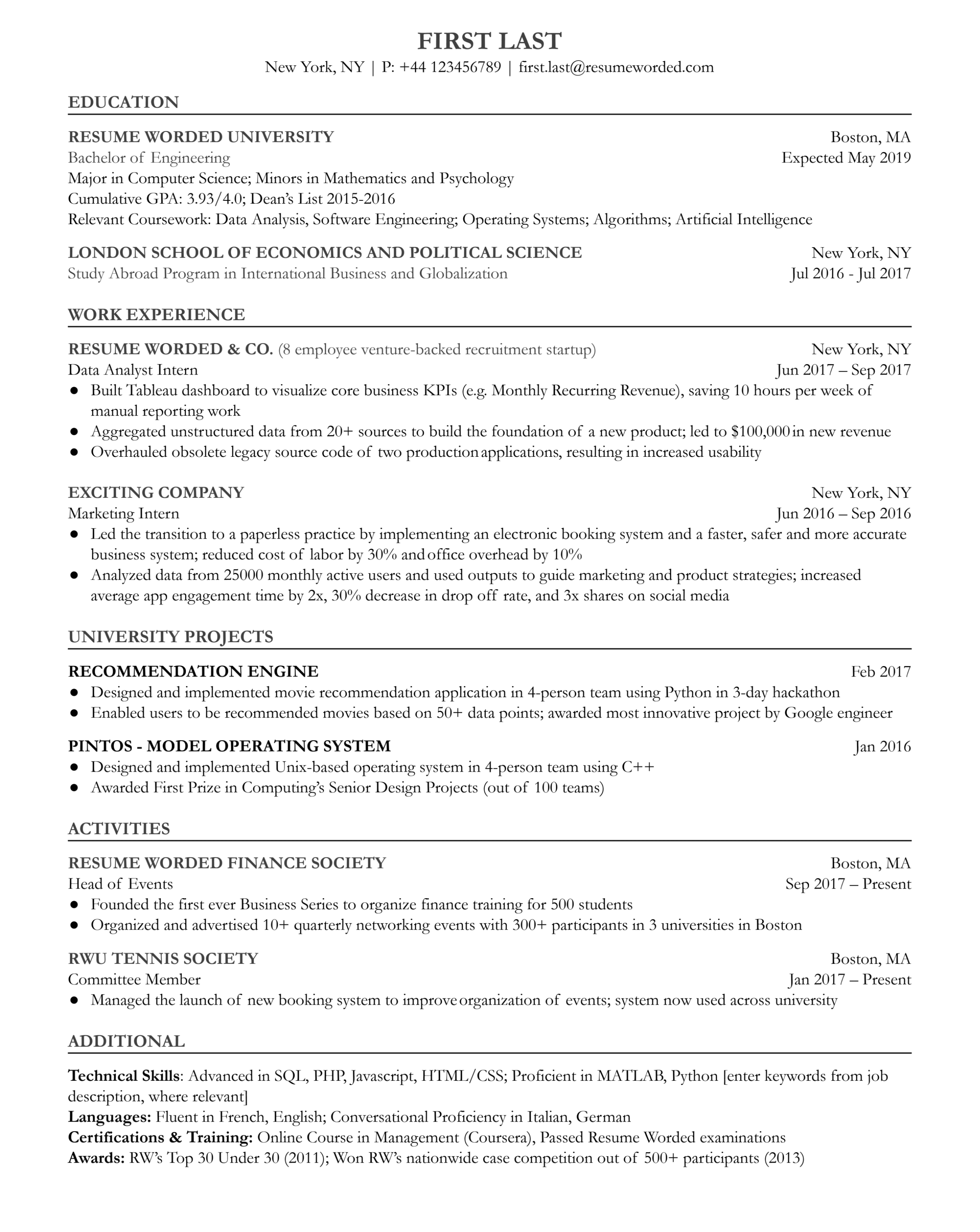
Choose a category to browse Entry Level resumes
We've put together a number of free Entry Level resume templates that you can use. Choose a category depending on your field, or just scroll down to see all templates.
Entry Level Resumes
Entry level data analyst.

Entry Level Project Manager
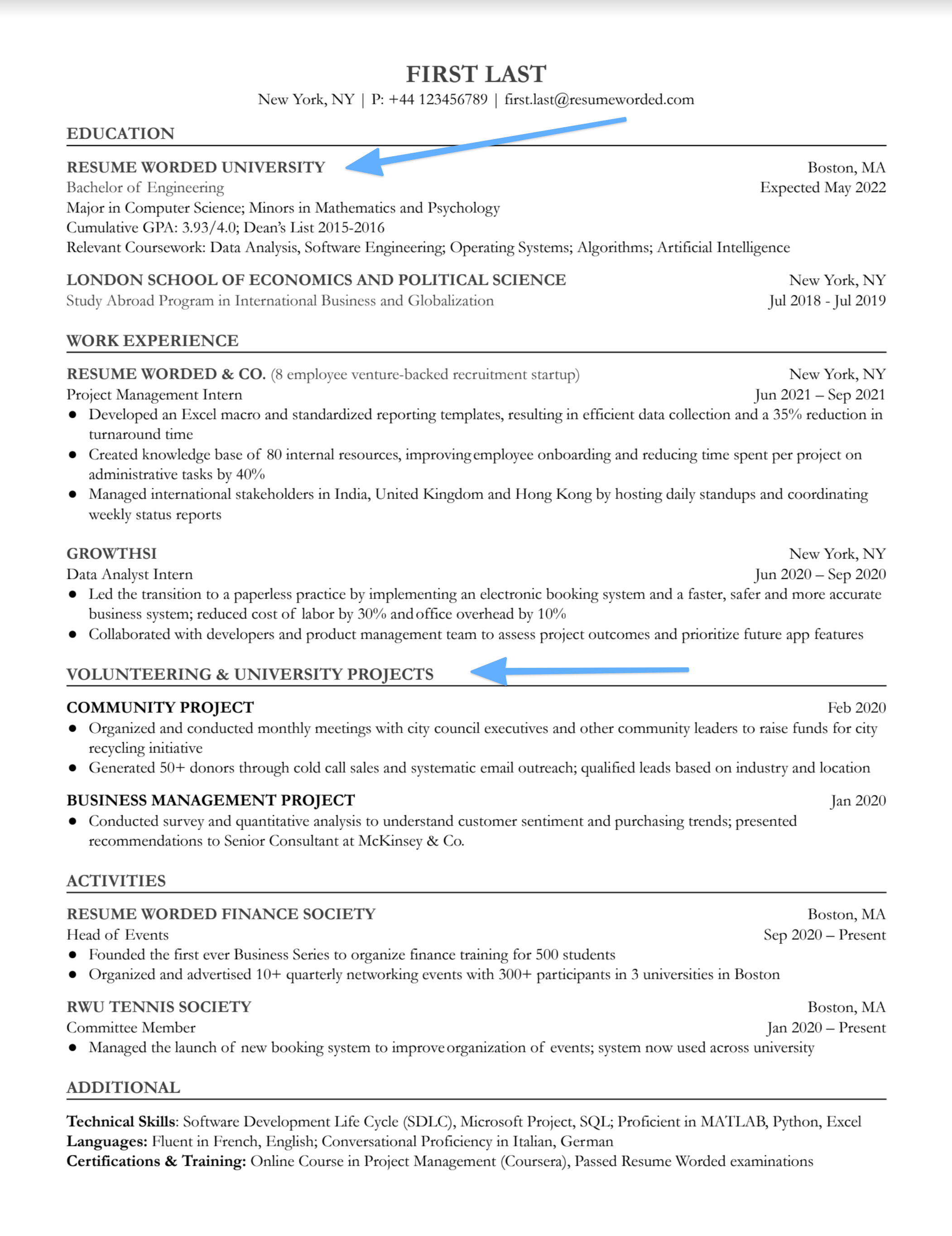
Entry-Level Program Manager
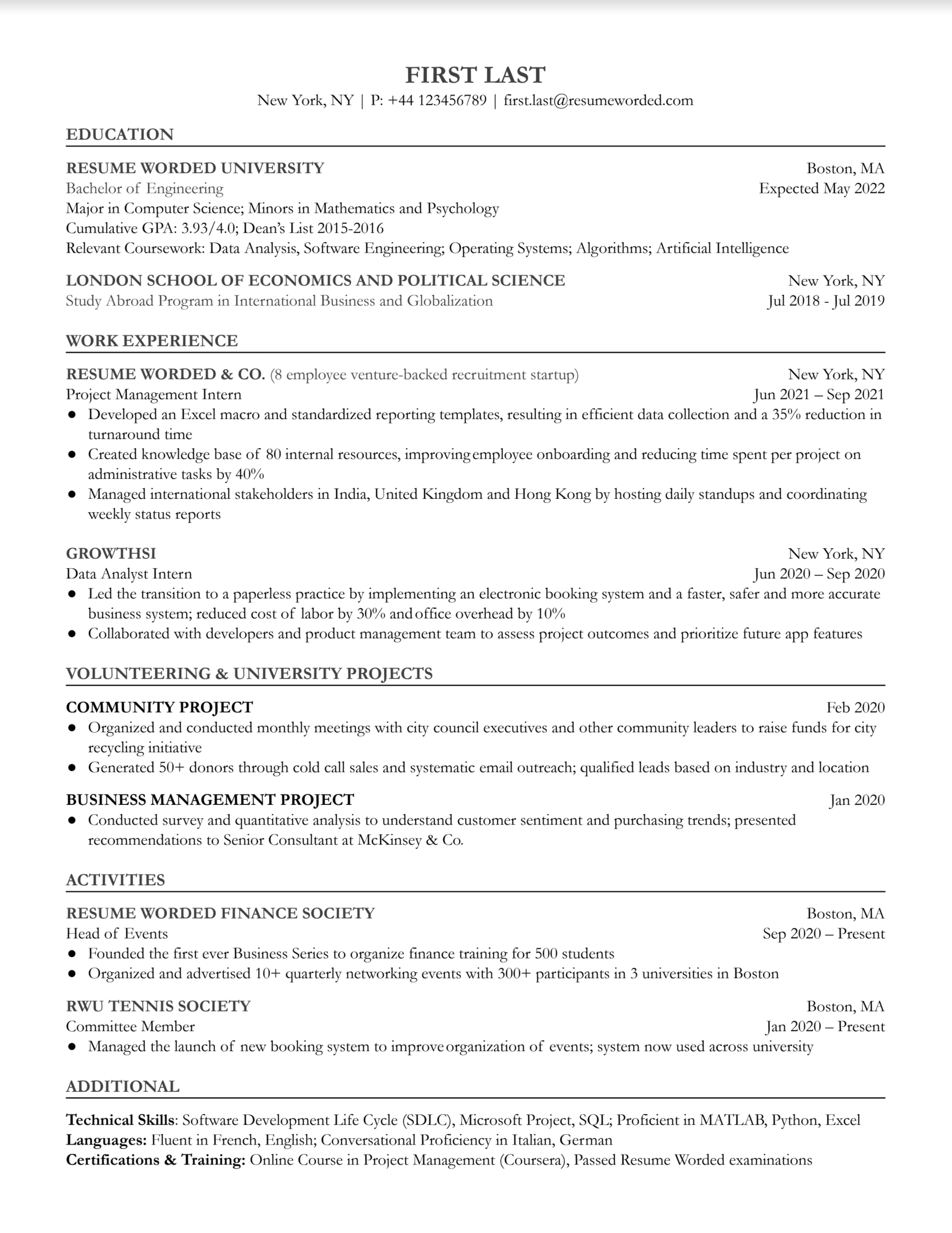
Entry Level Business Analyst
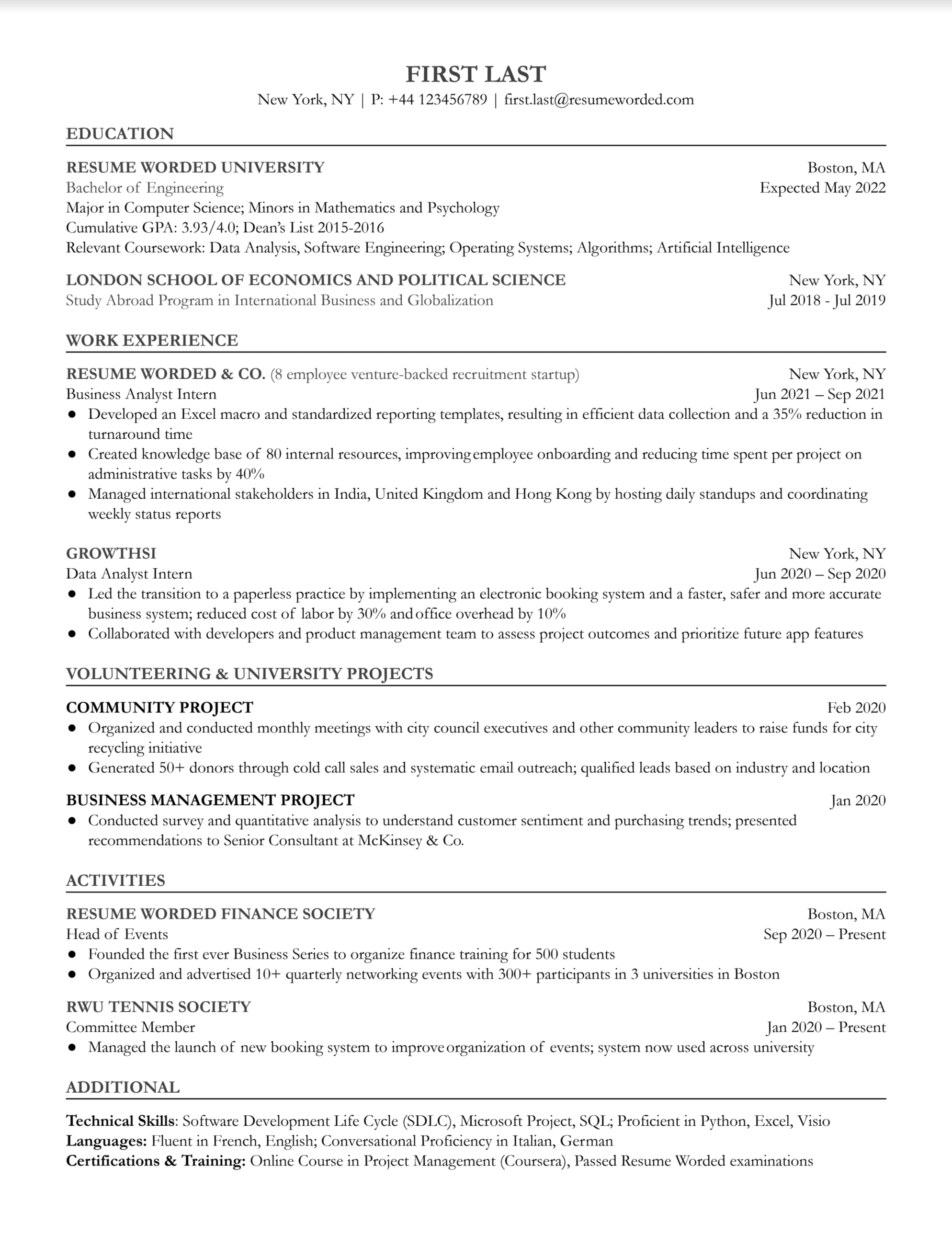
Entry Level Product Manager
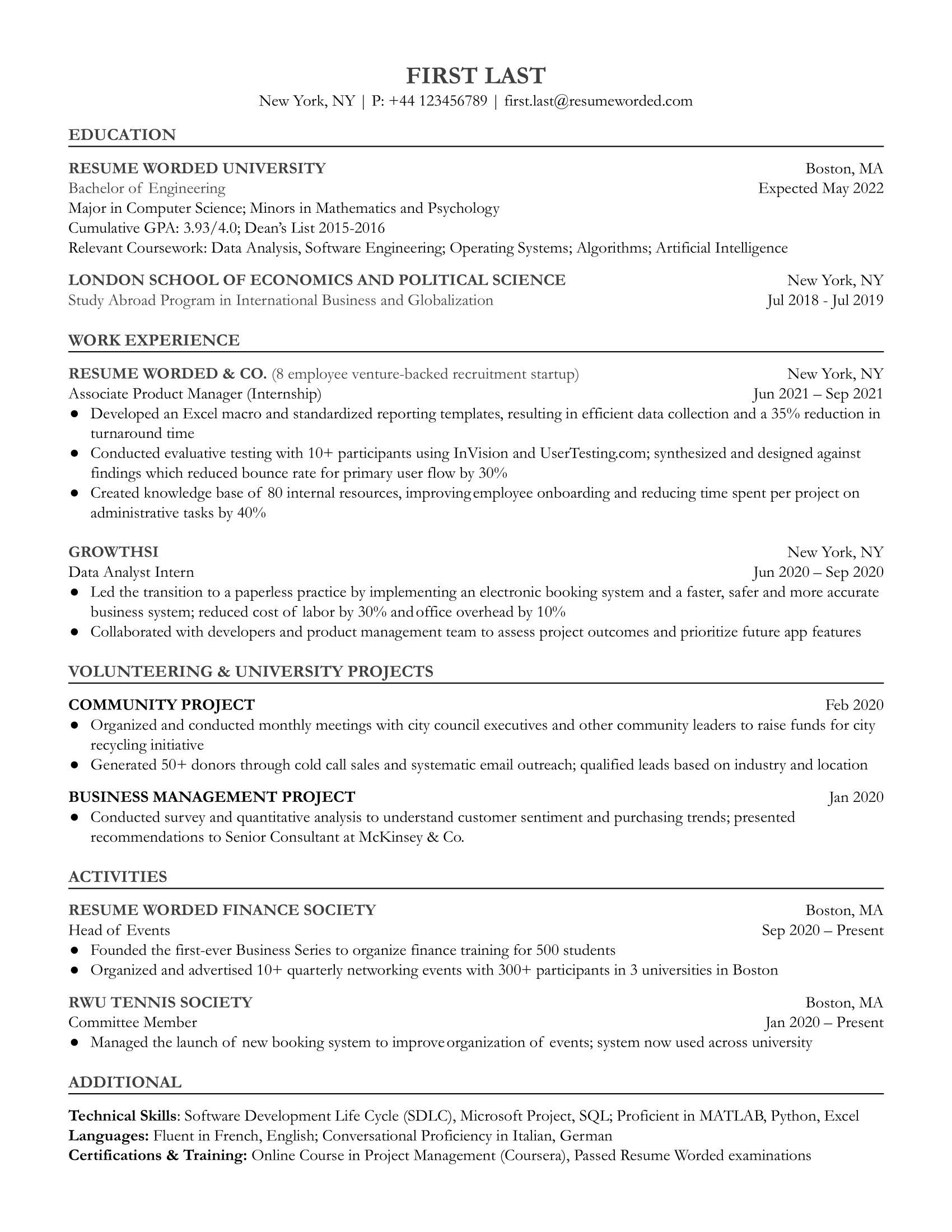
Entry Level Data Engineer
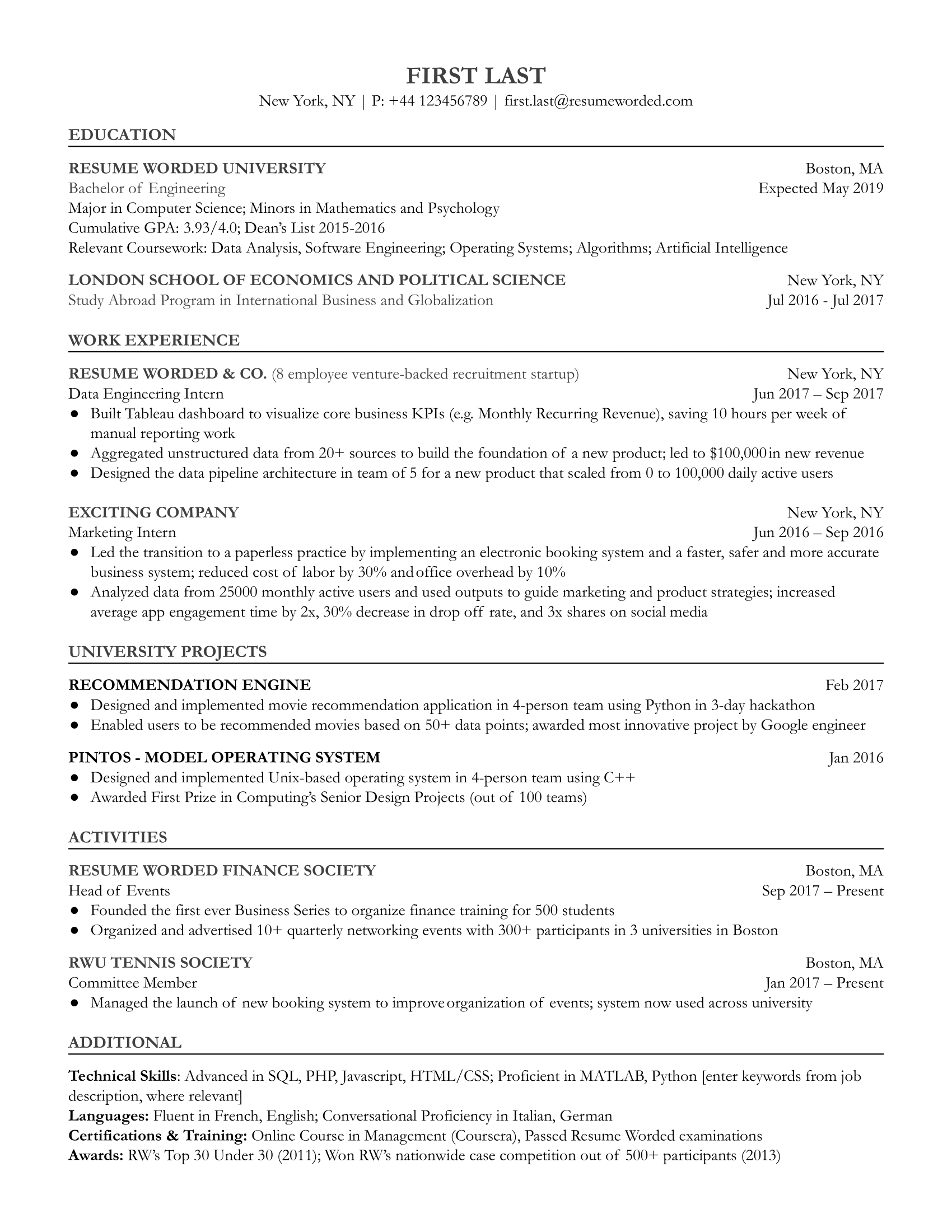
Entry Level Social Media Manager
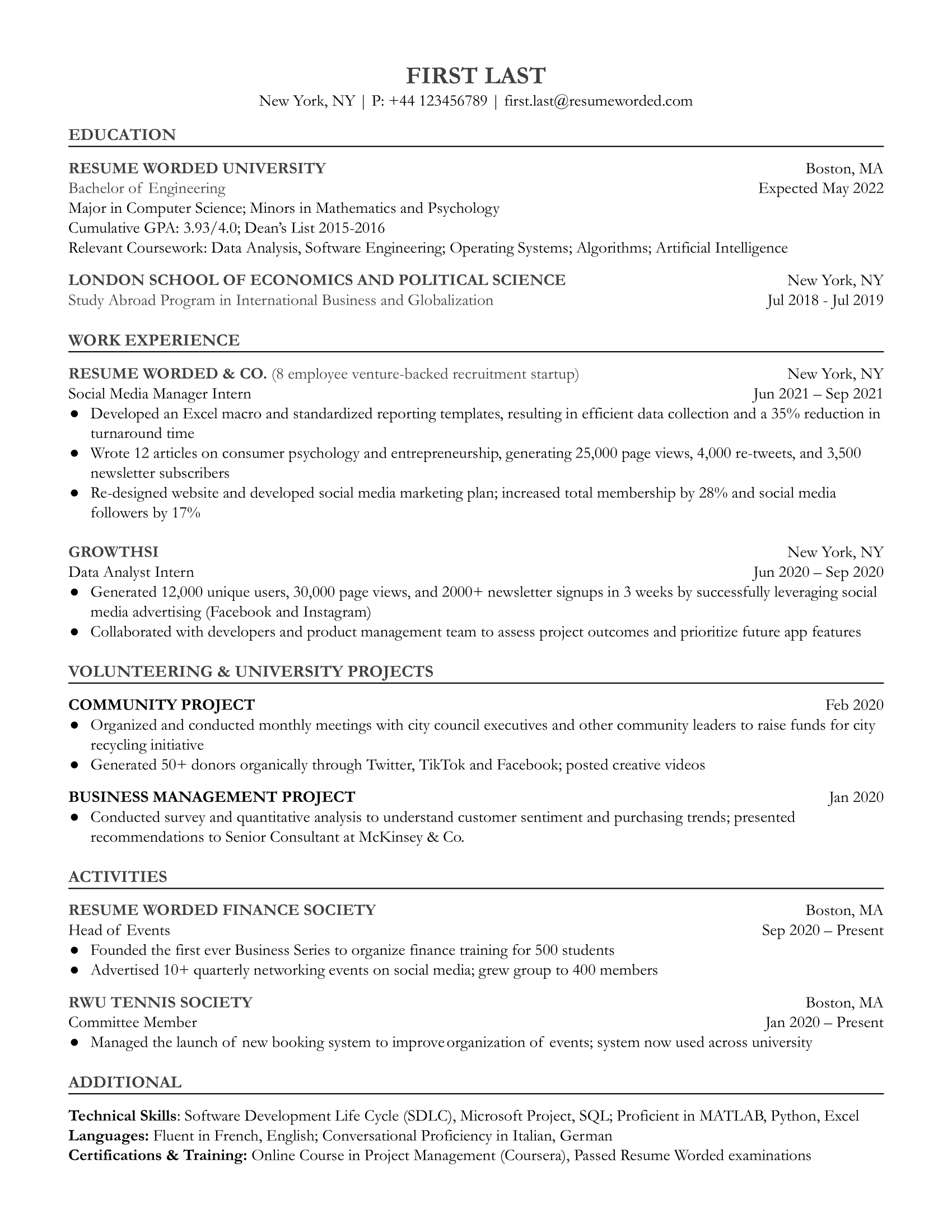
Entry Level Software Engineer
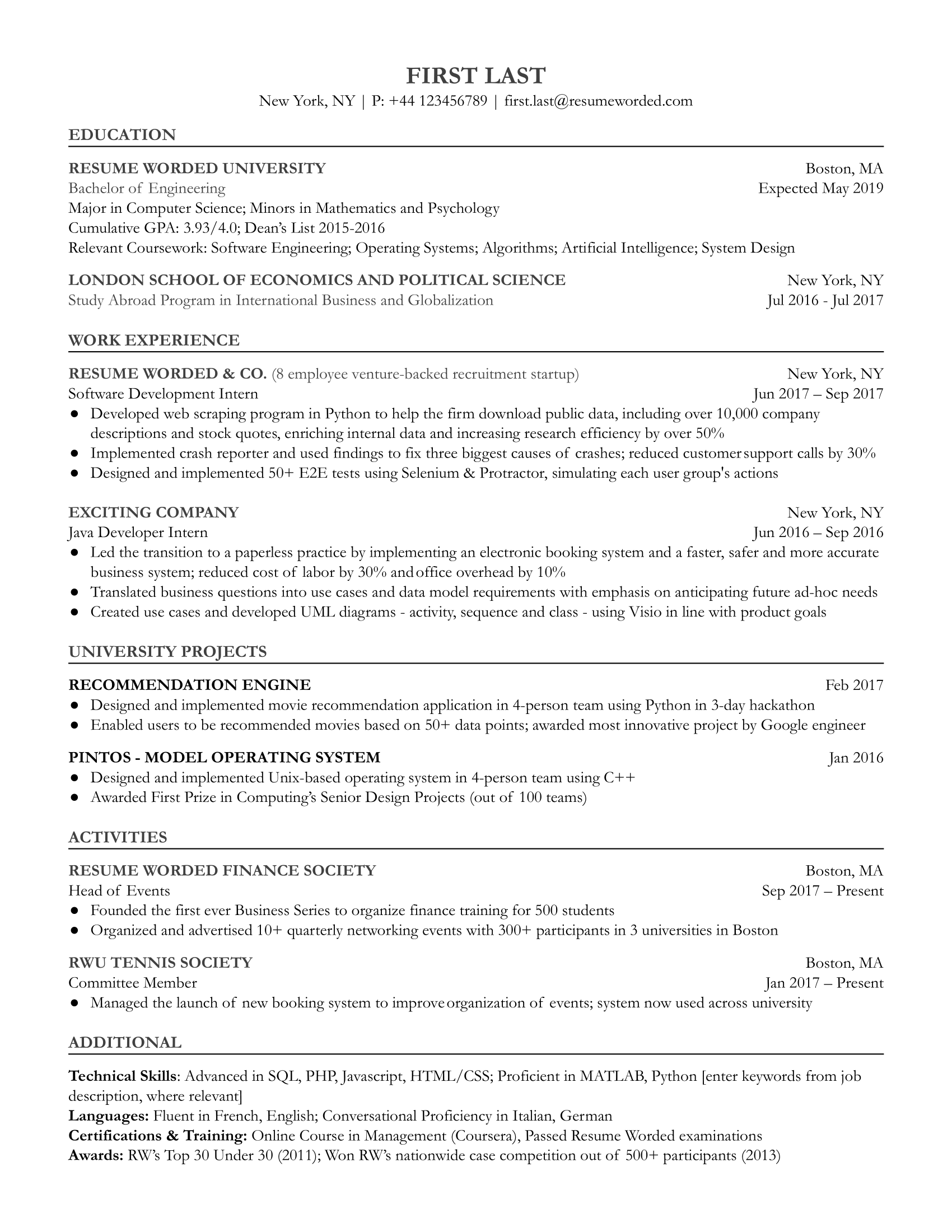
Operations Associate (Entry Level Operations Manager)
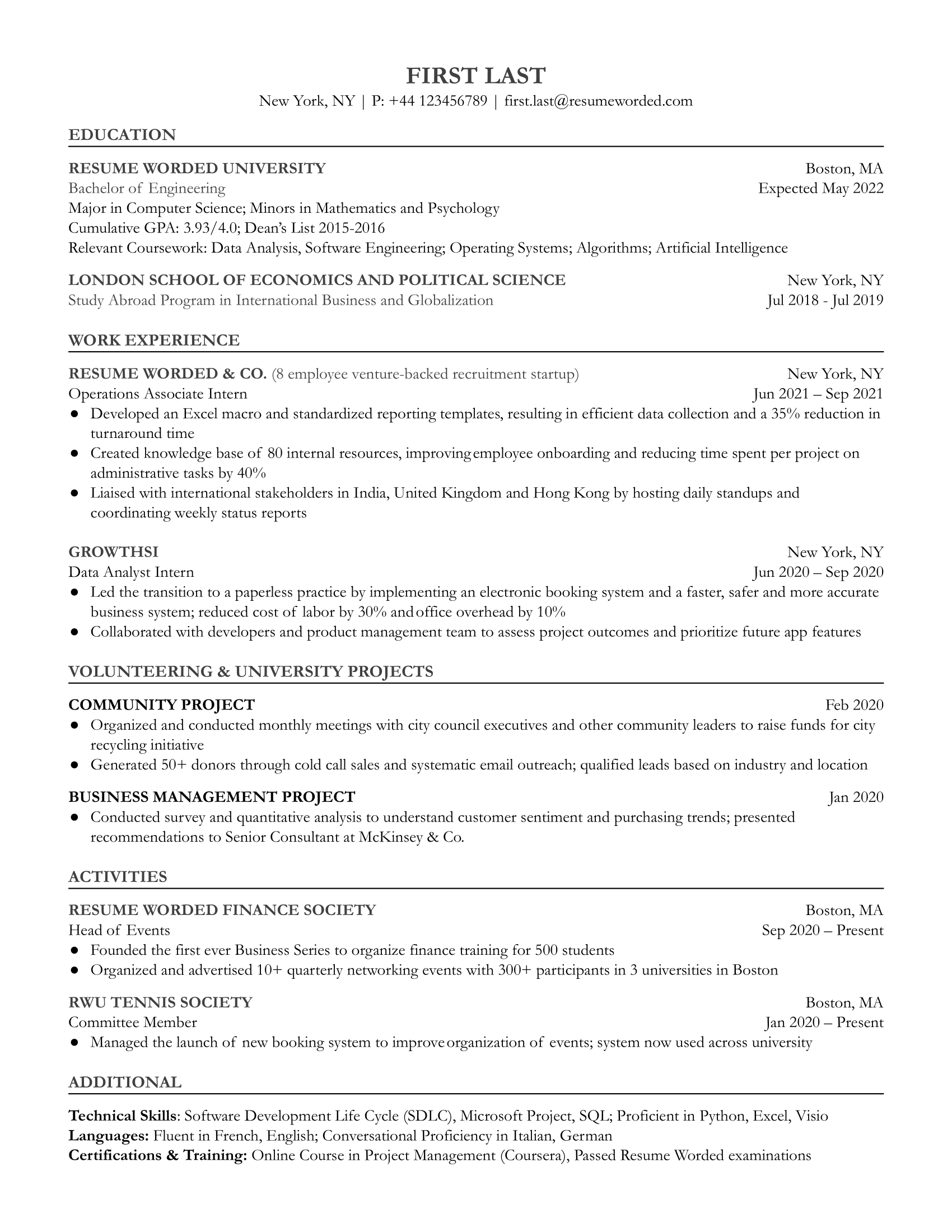
Entry Level Scrum Master
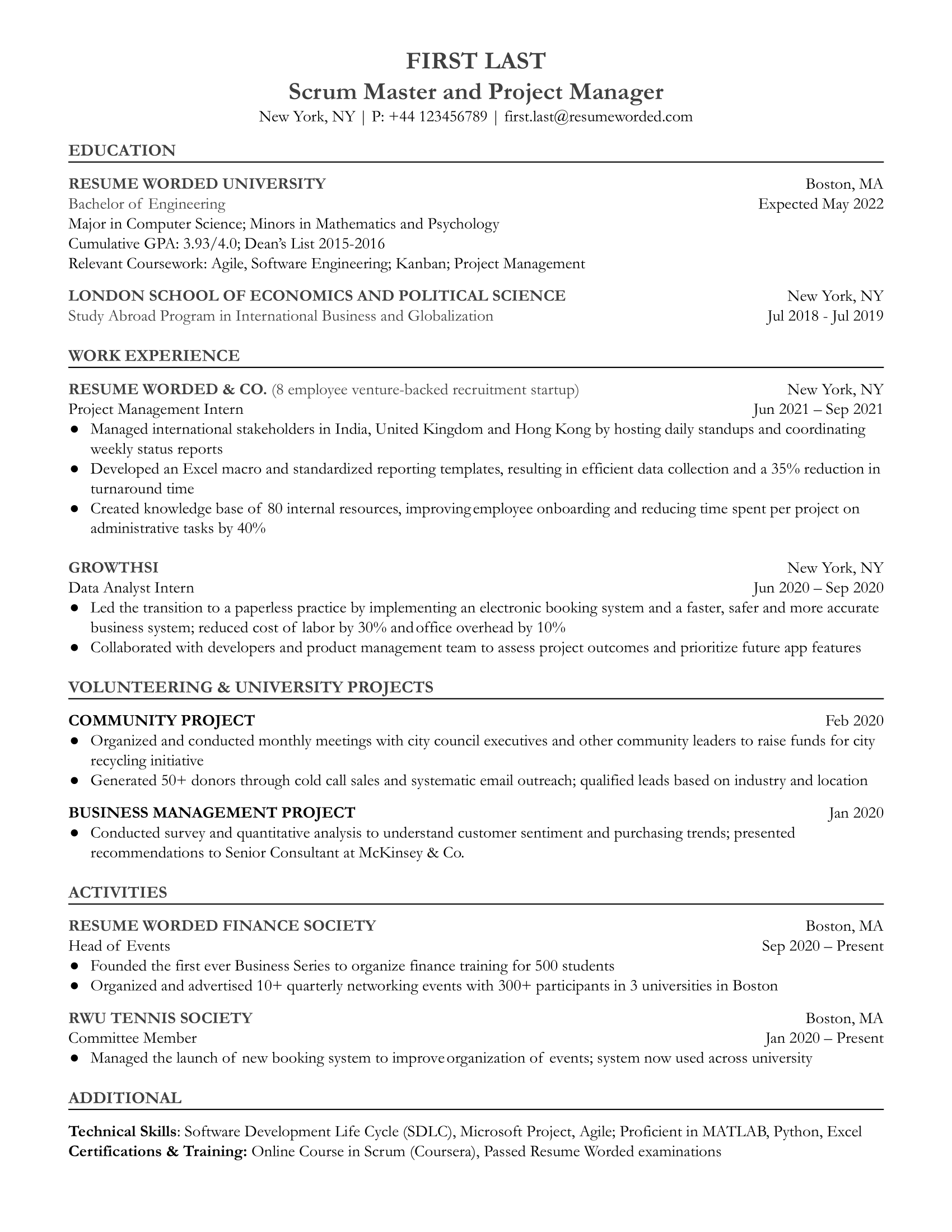
Entry Level Web Developer
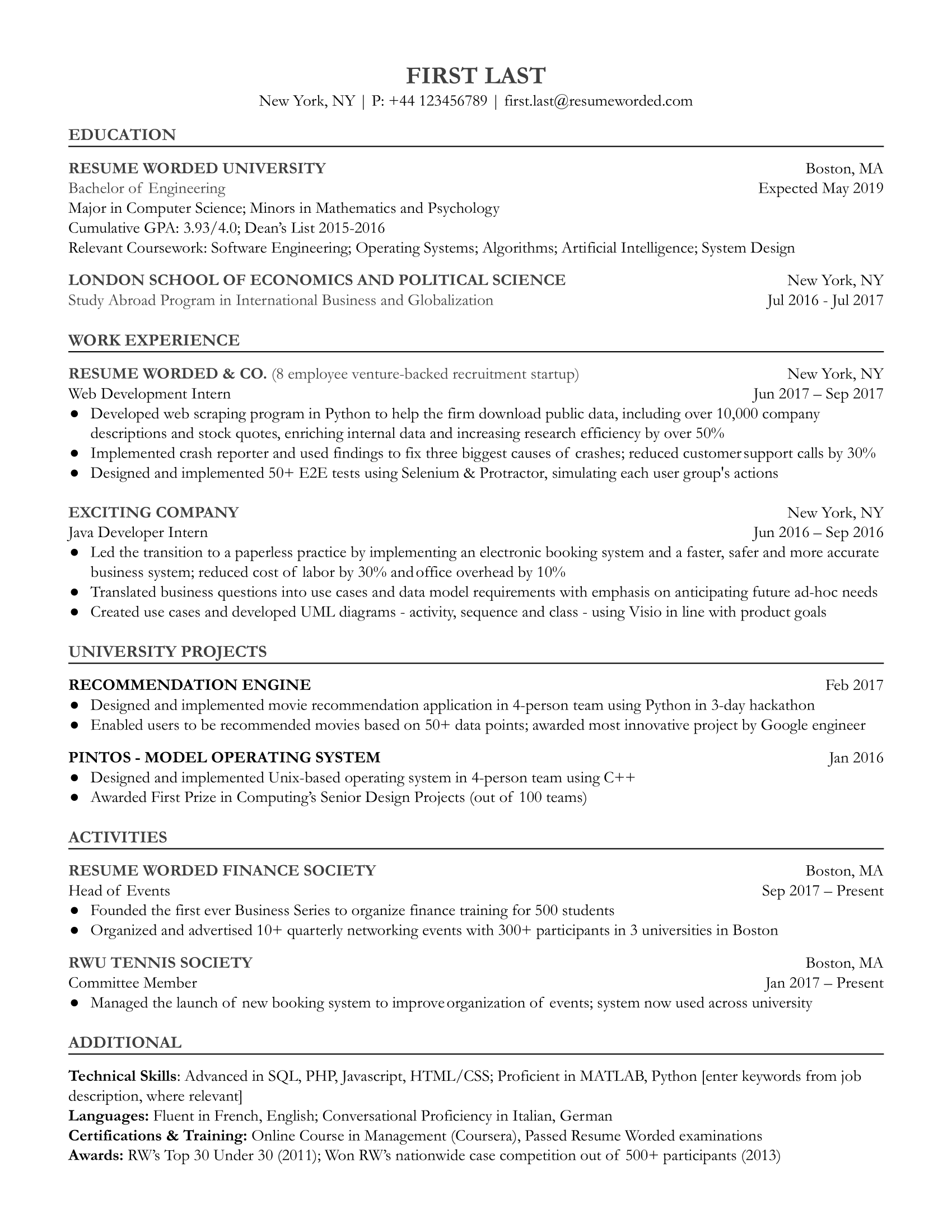
Entry Level Human Resources (HR)
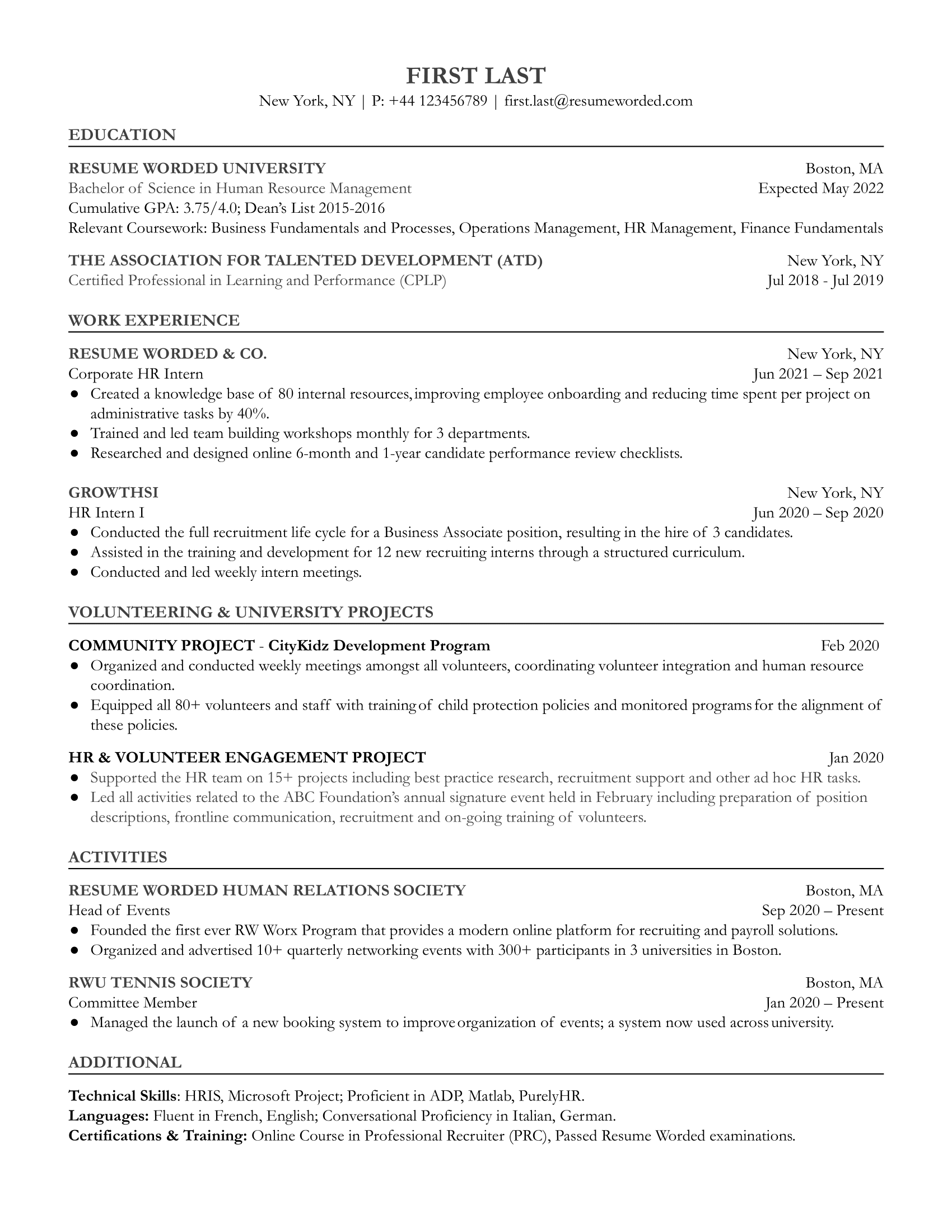
Entry Level Bookkeeper
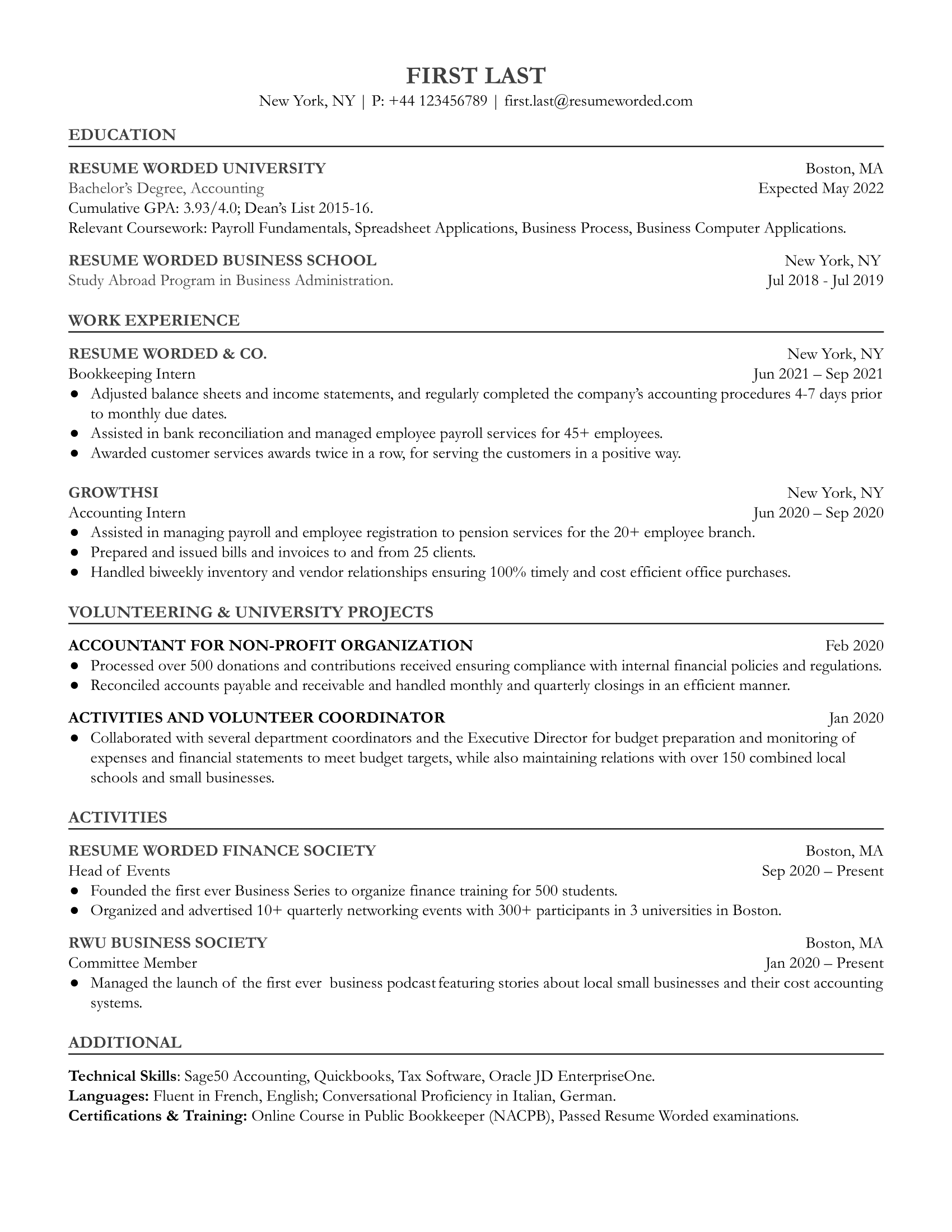
Entry Level Customer Service Representative
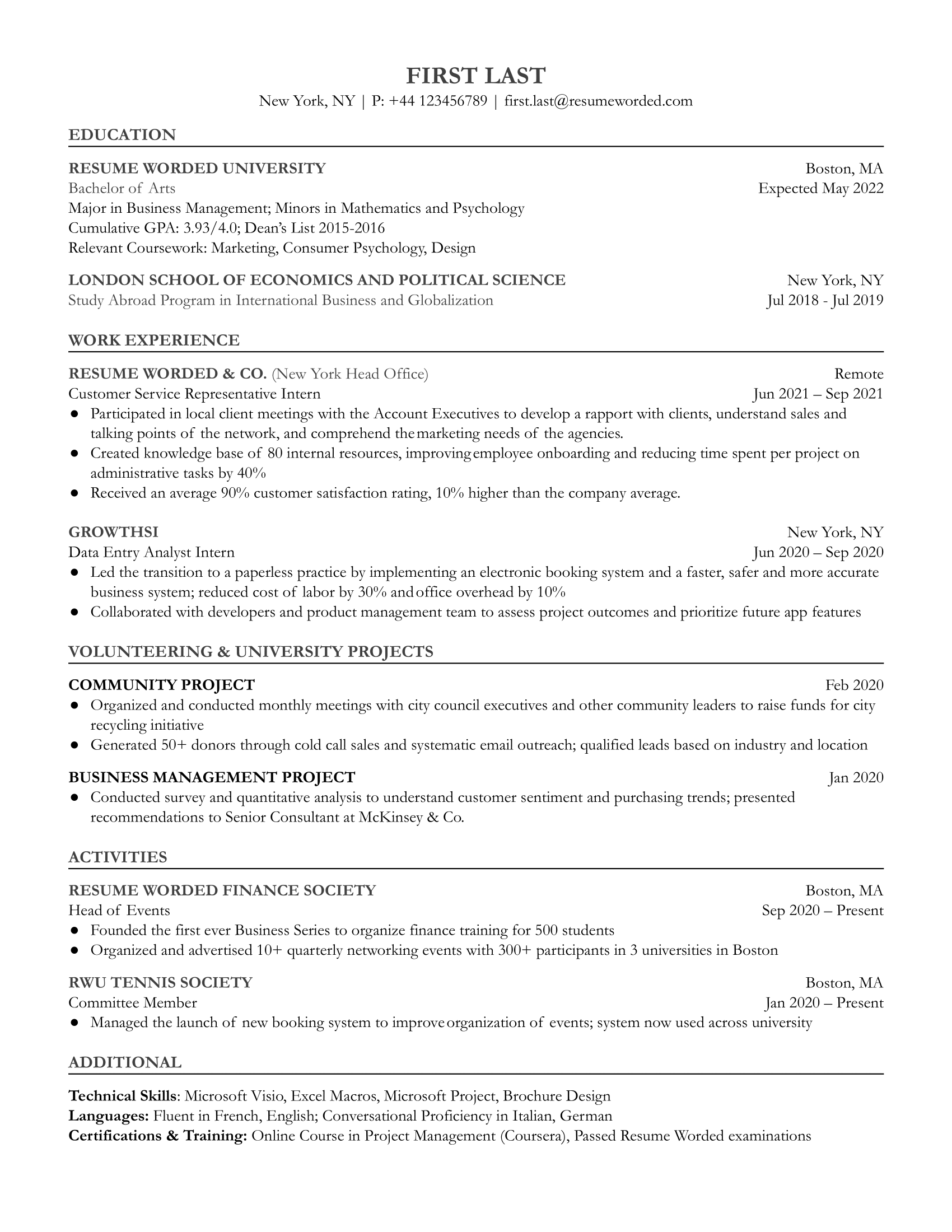
Entry Level Data Scientist
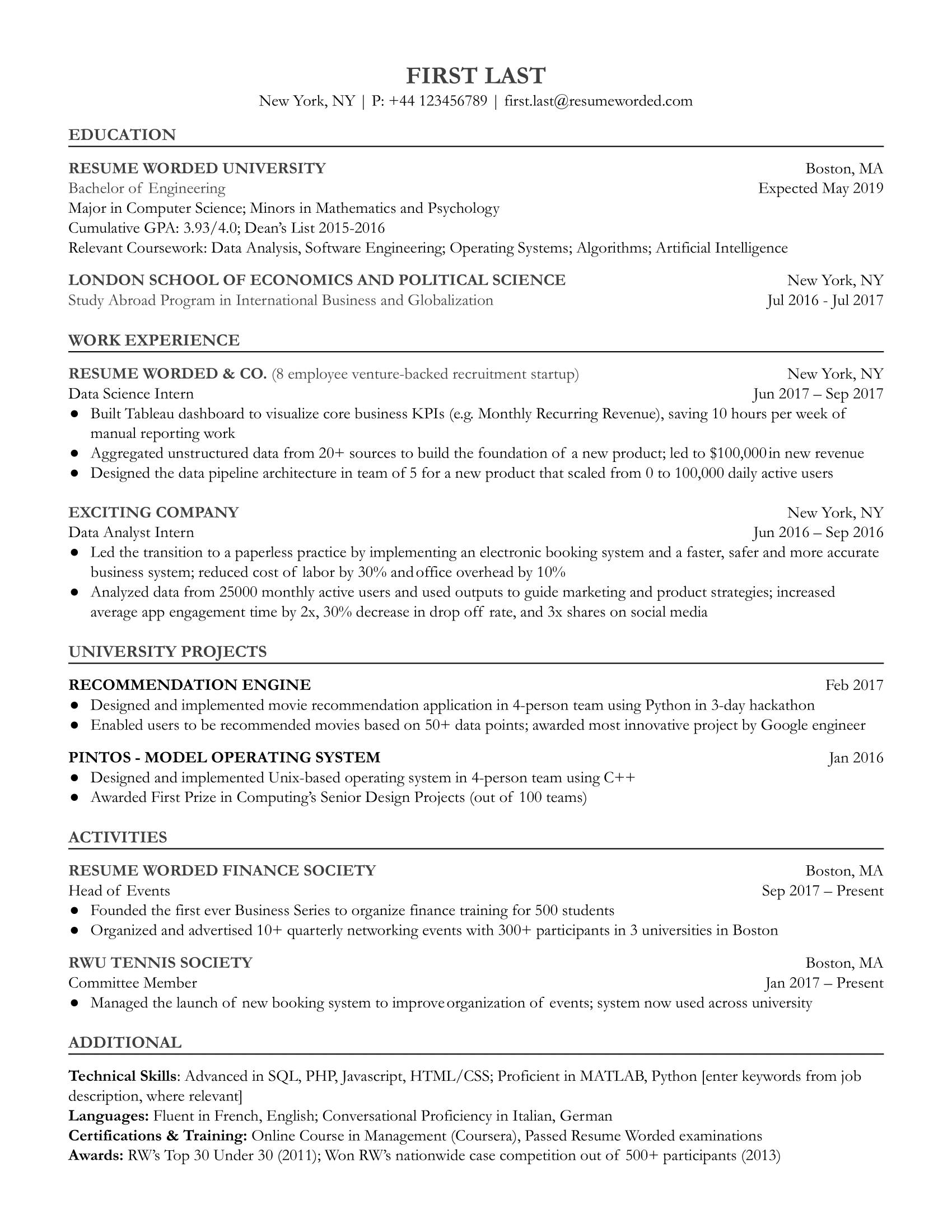
Entry Level Front End Developer
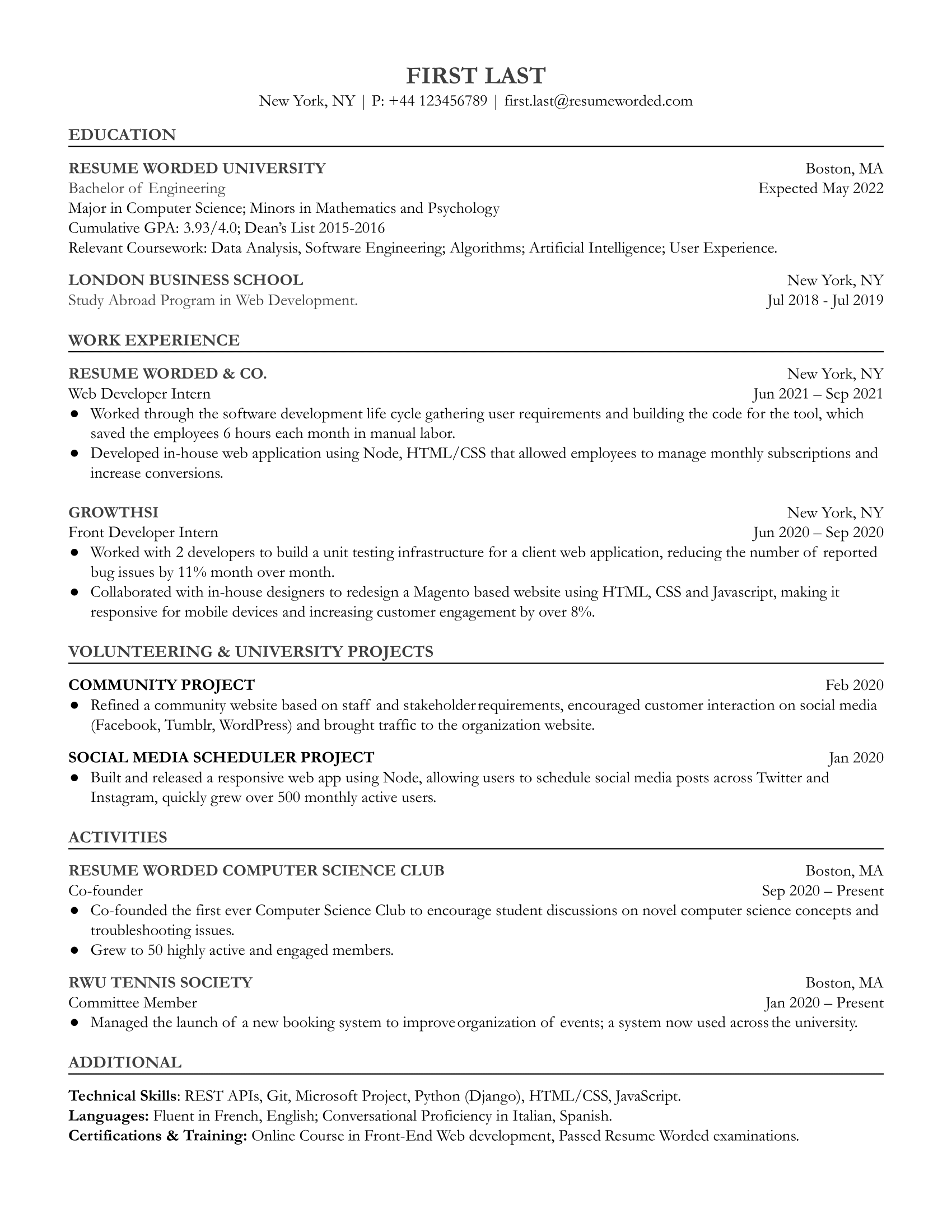
Entry Level Administrative Assistant
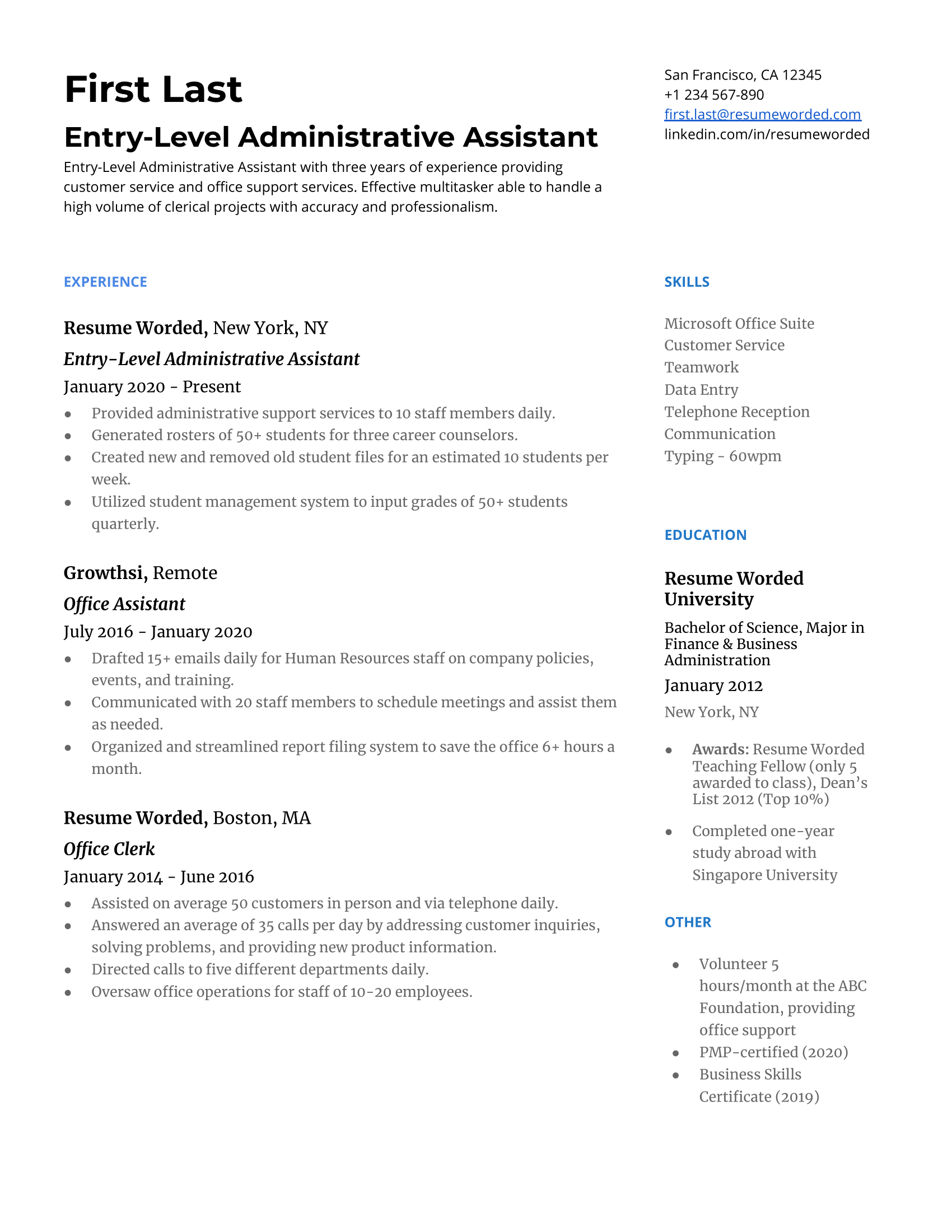
Entry Level Data Entry Analyst
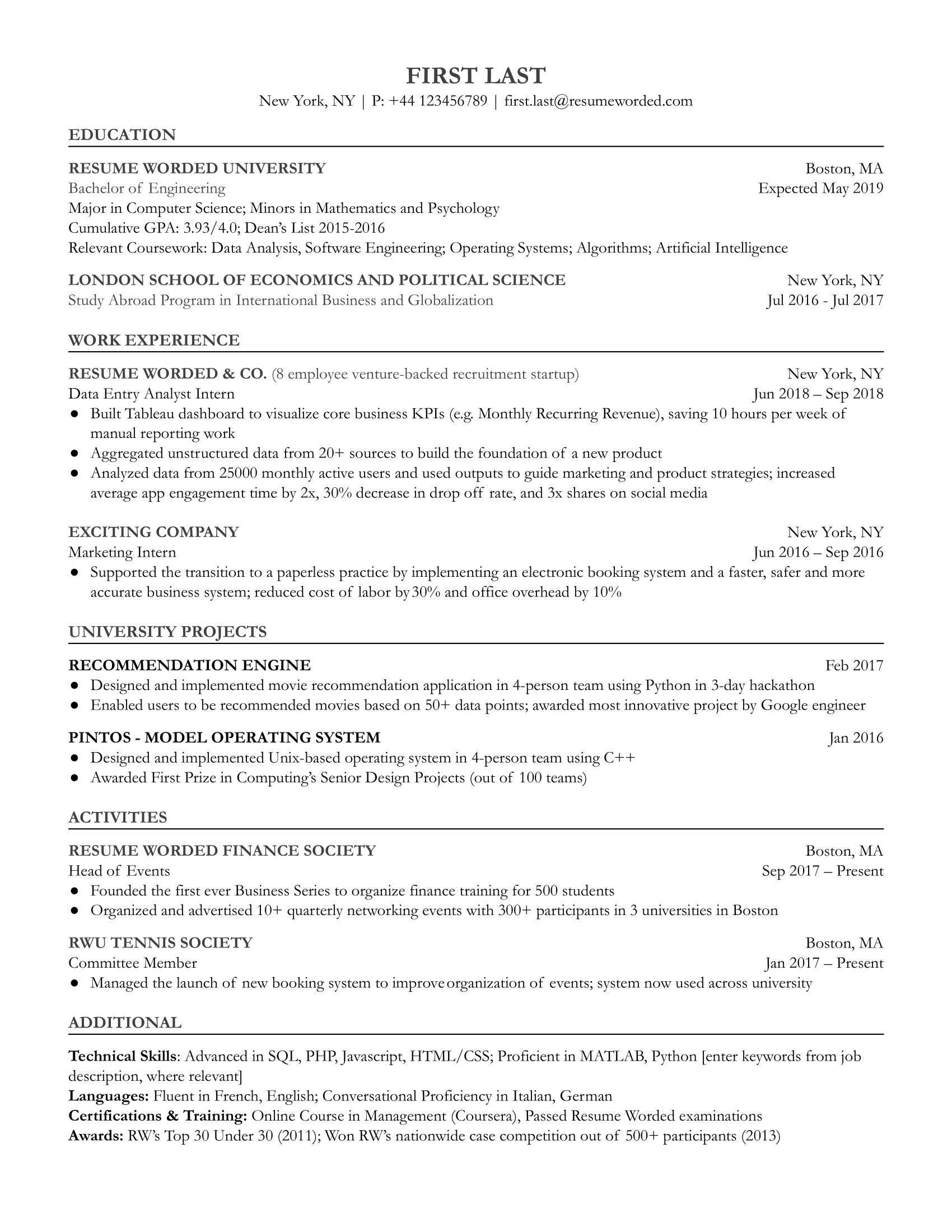
Entry Level/Junior Financial Analyst
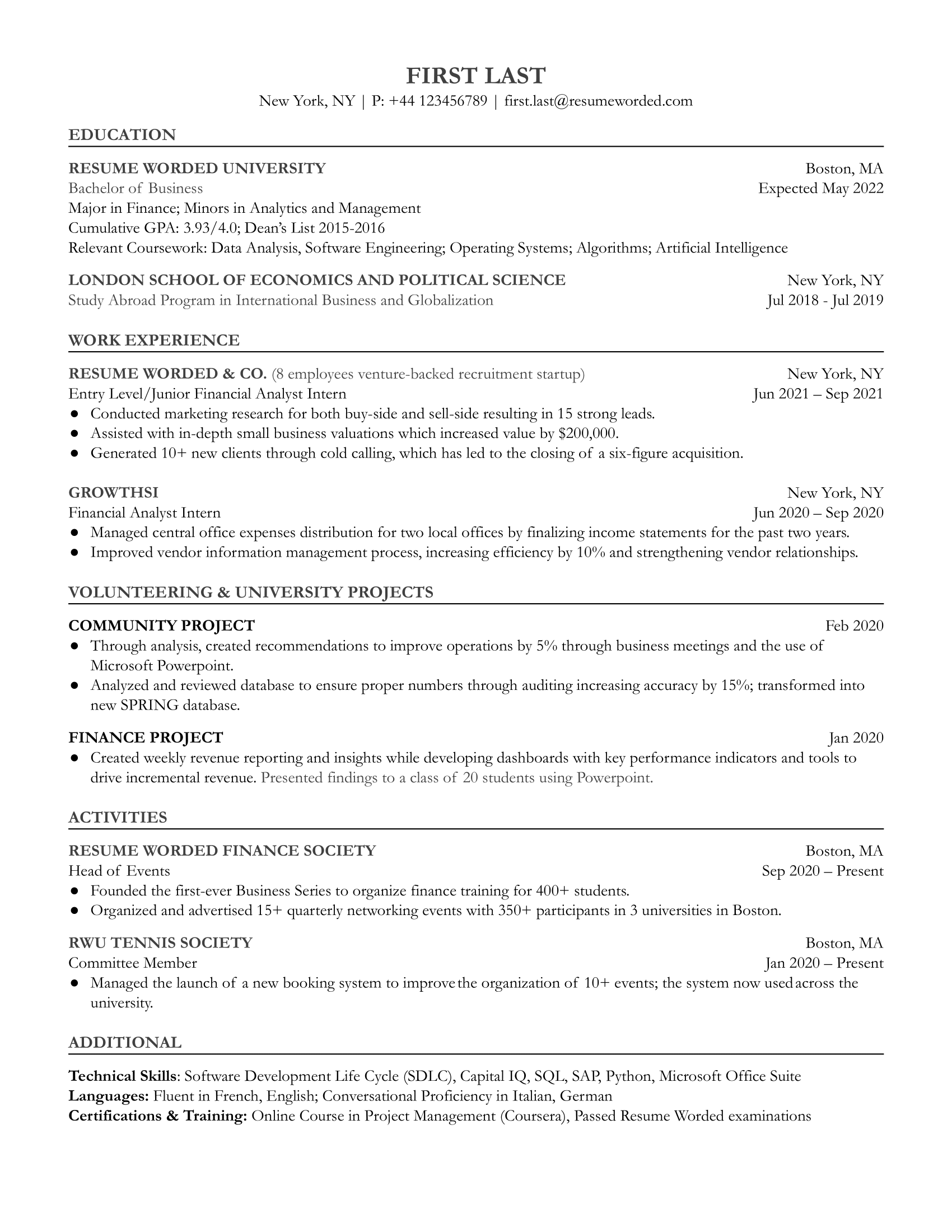
Entry-Level Business Development Manager
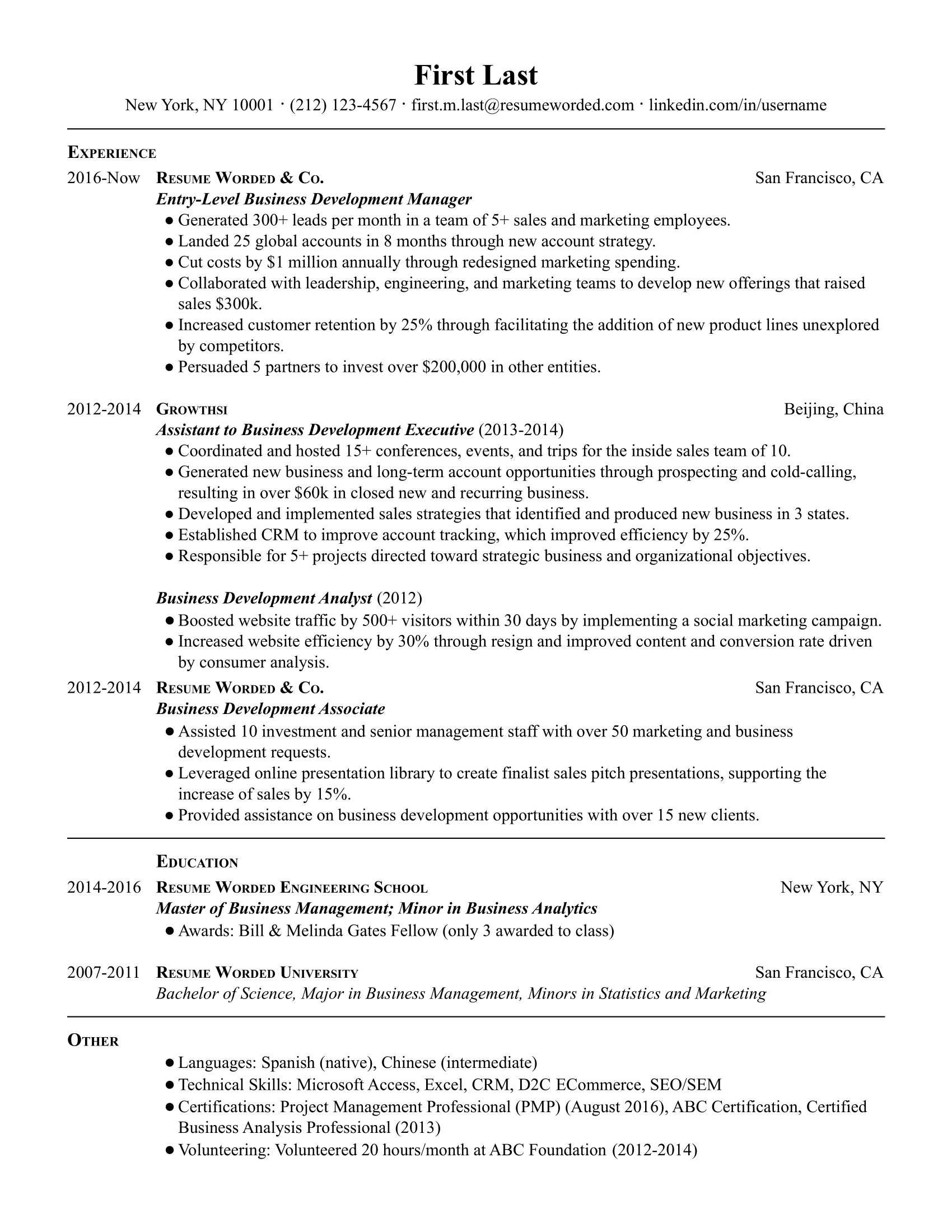
Entry Level Digital Marketing
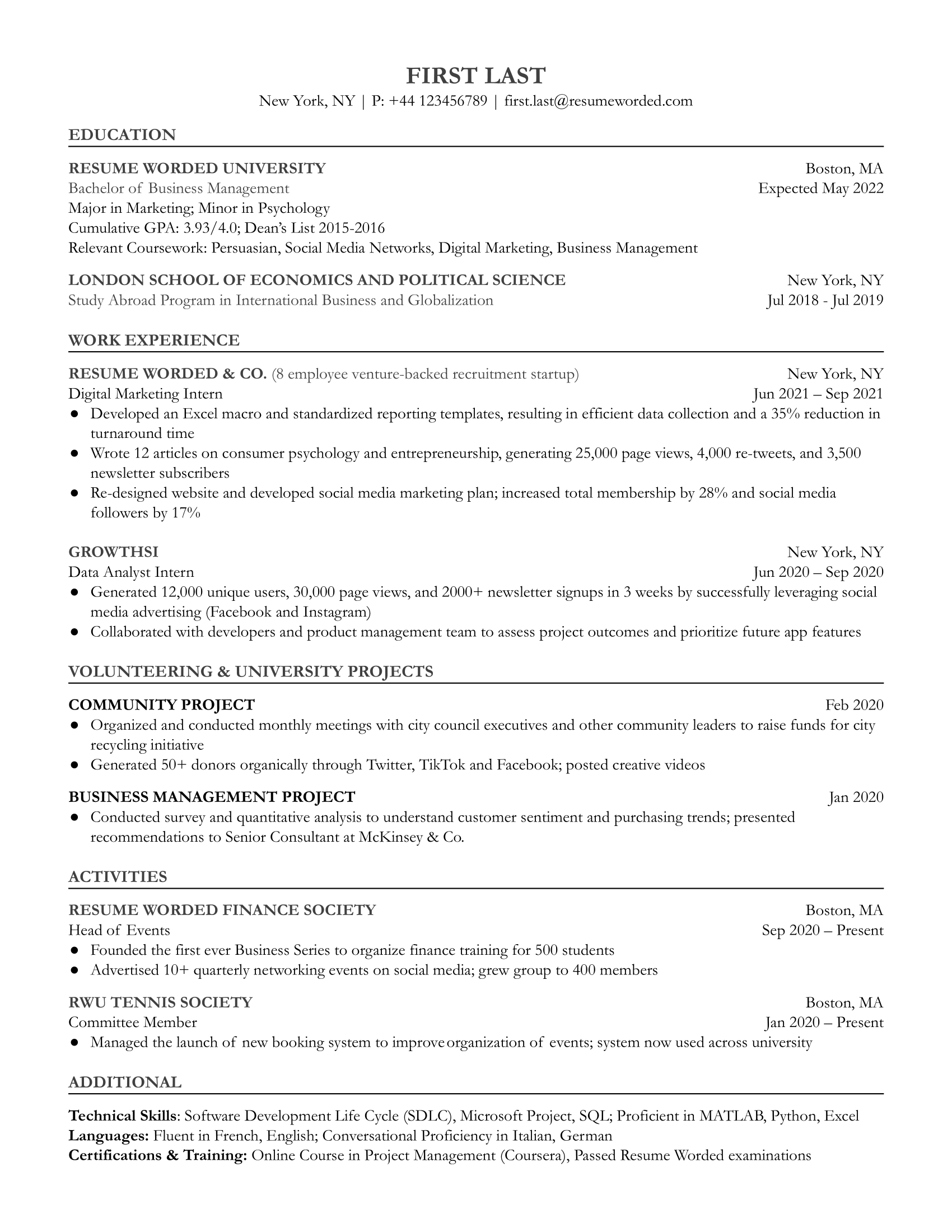
Entry Level UX Designer
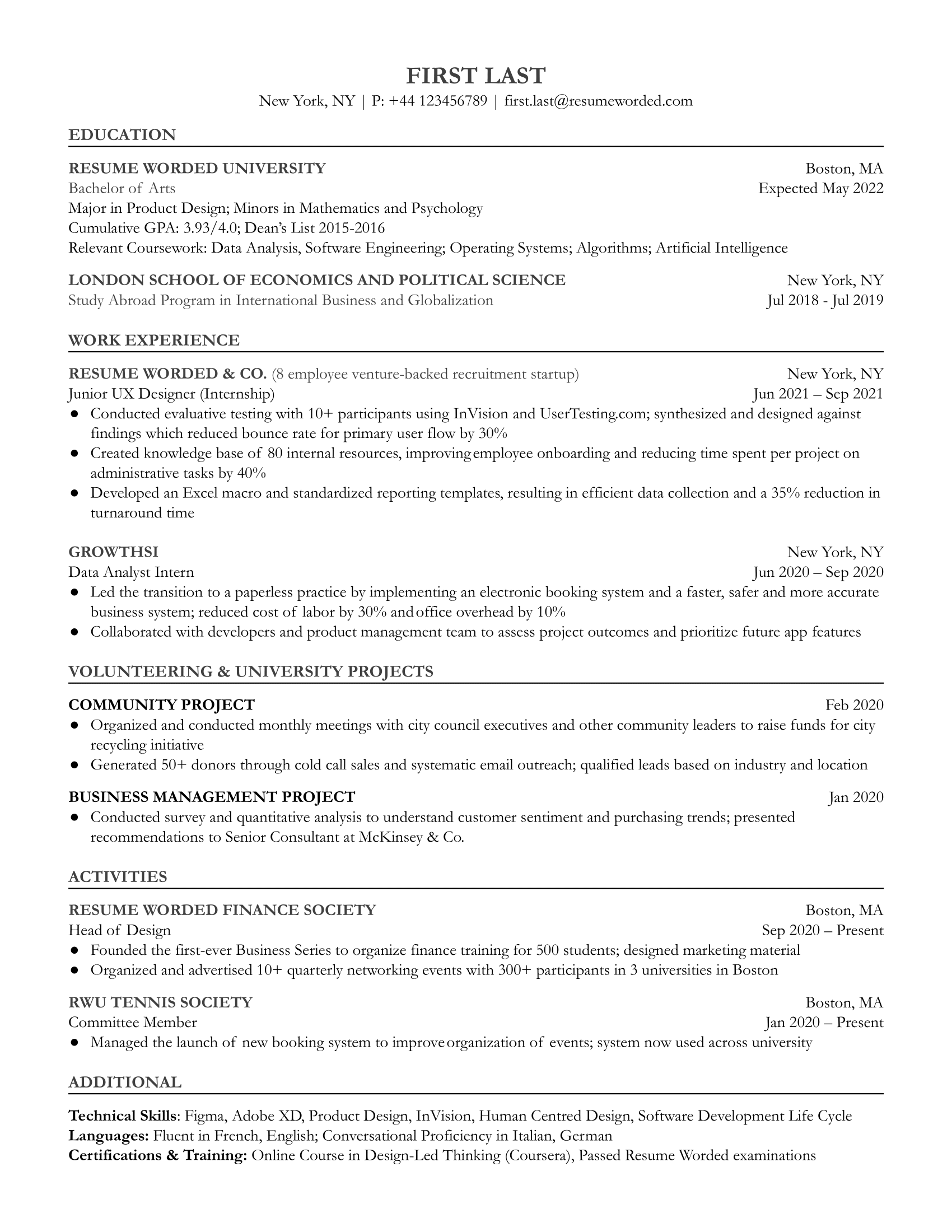
Entry Level Account Manager
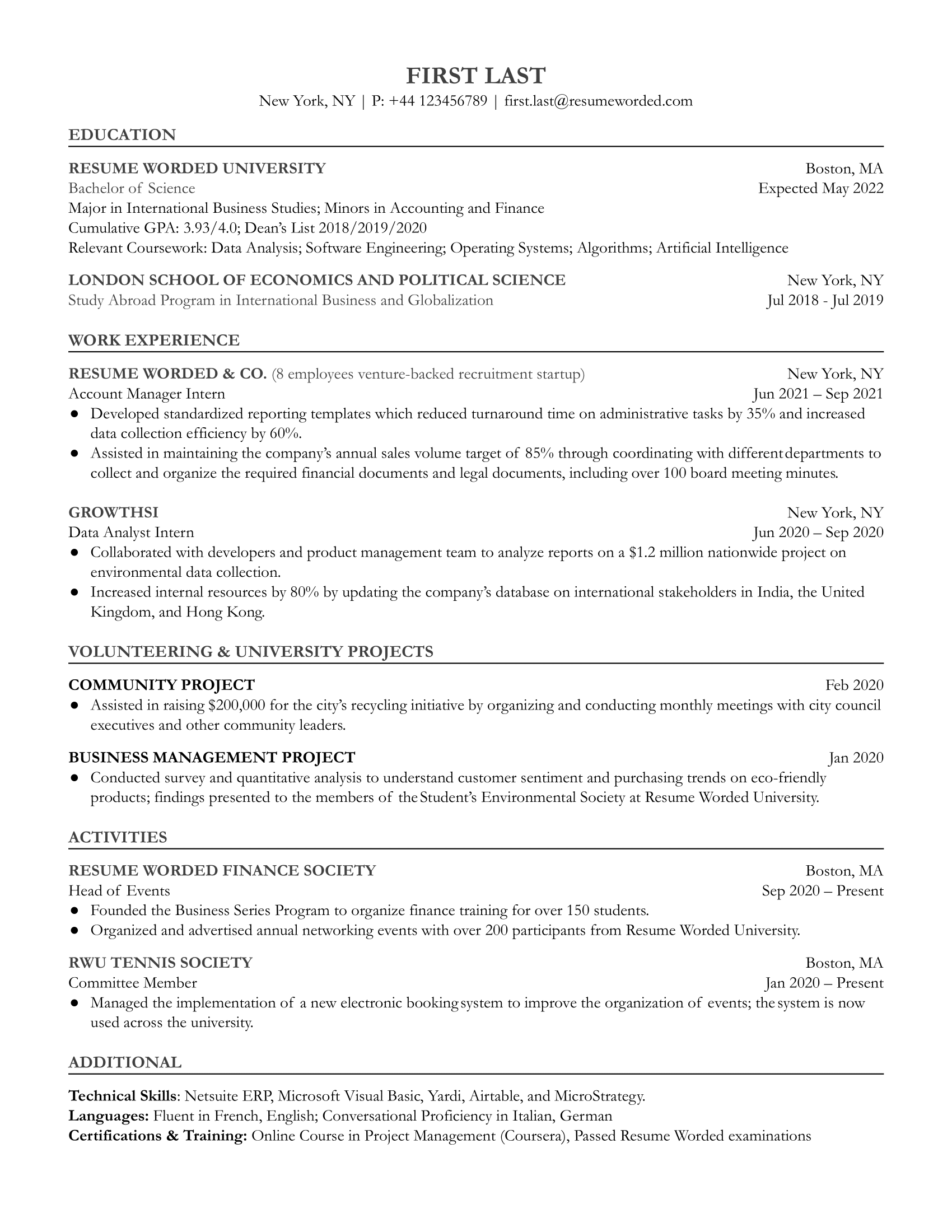
Junior Graphic Designer
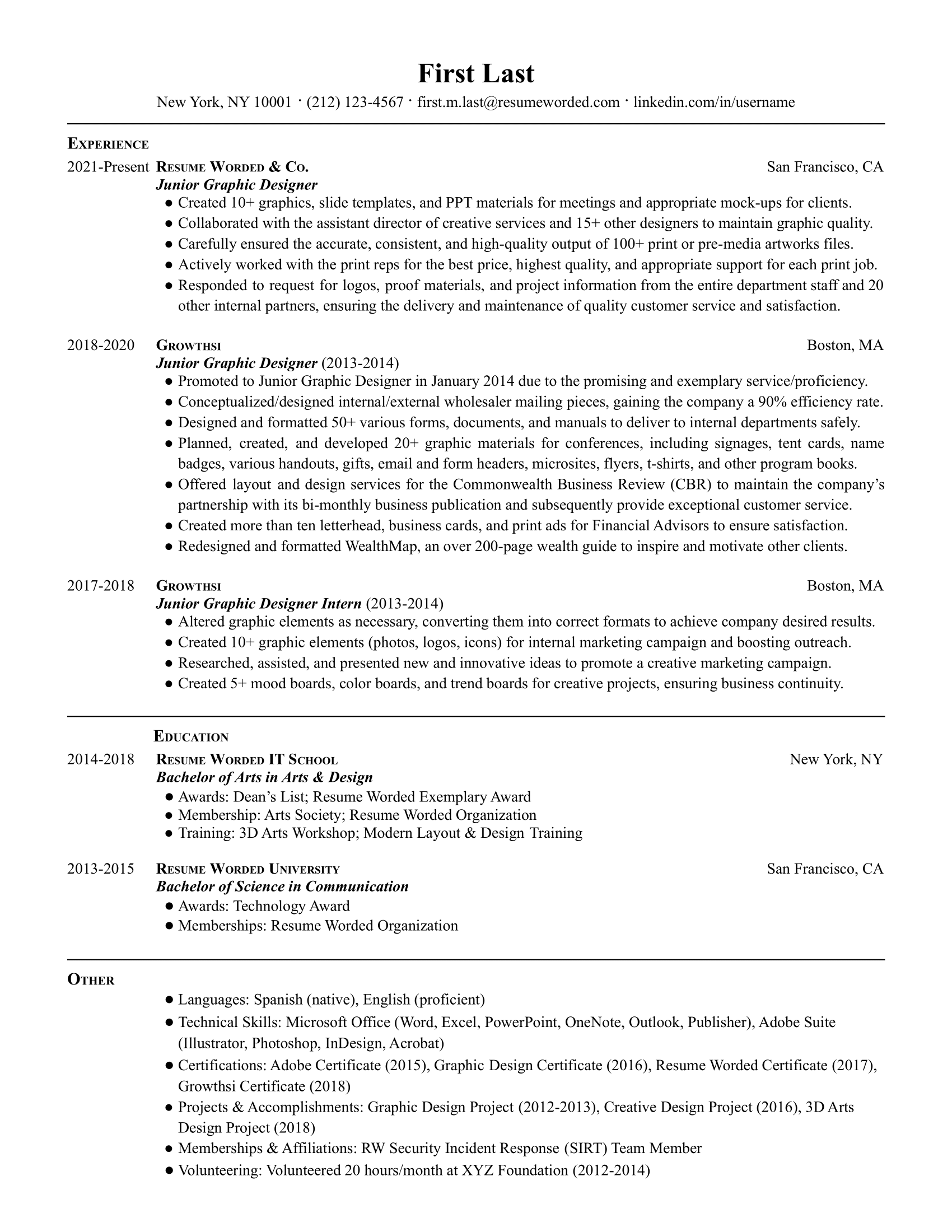
Entry Level Accountant
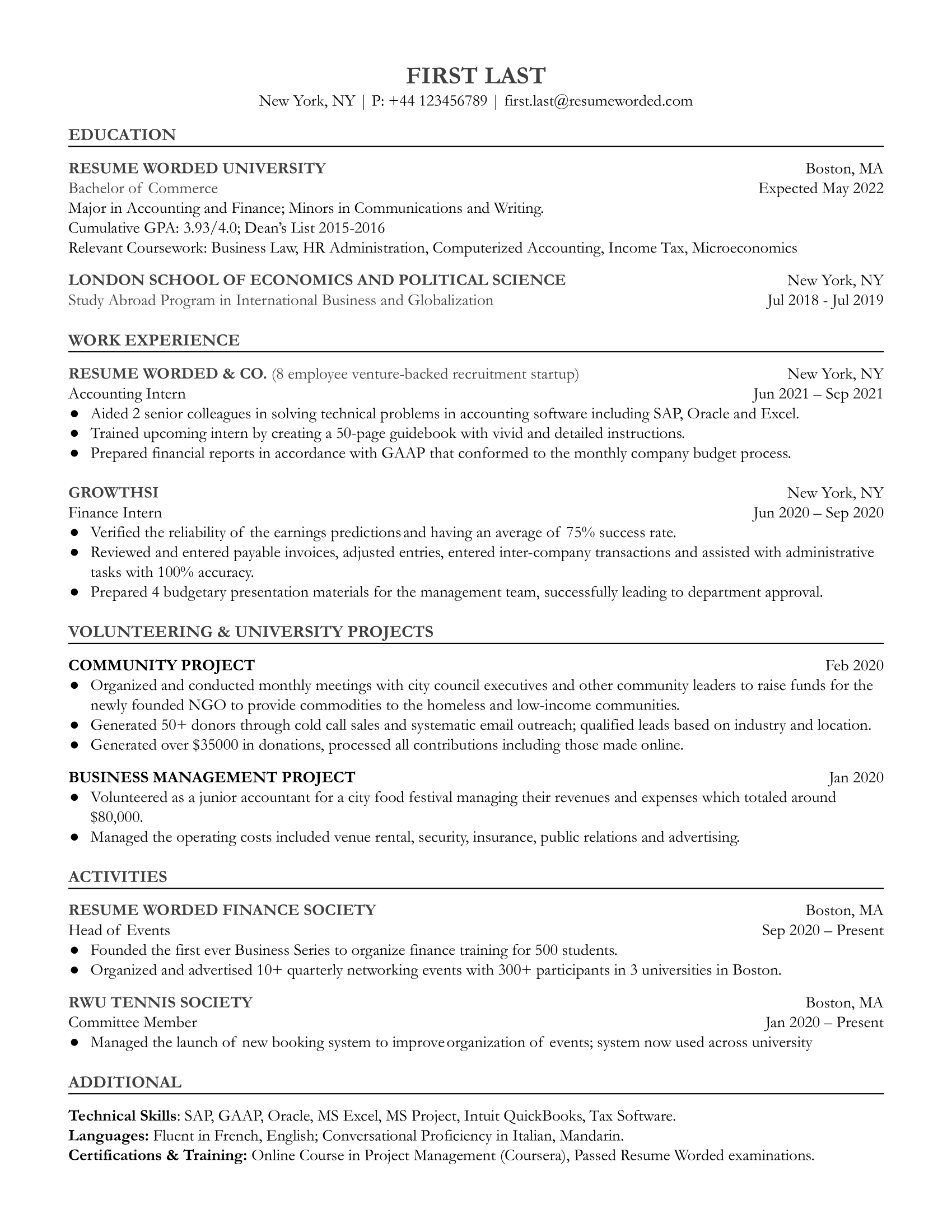
Junior Python Developer
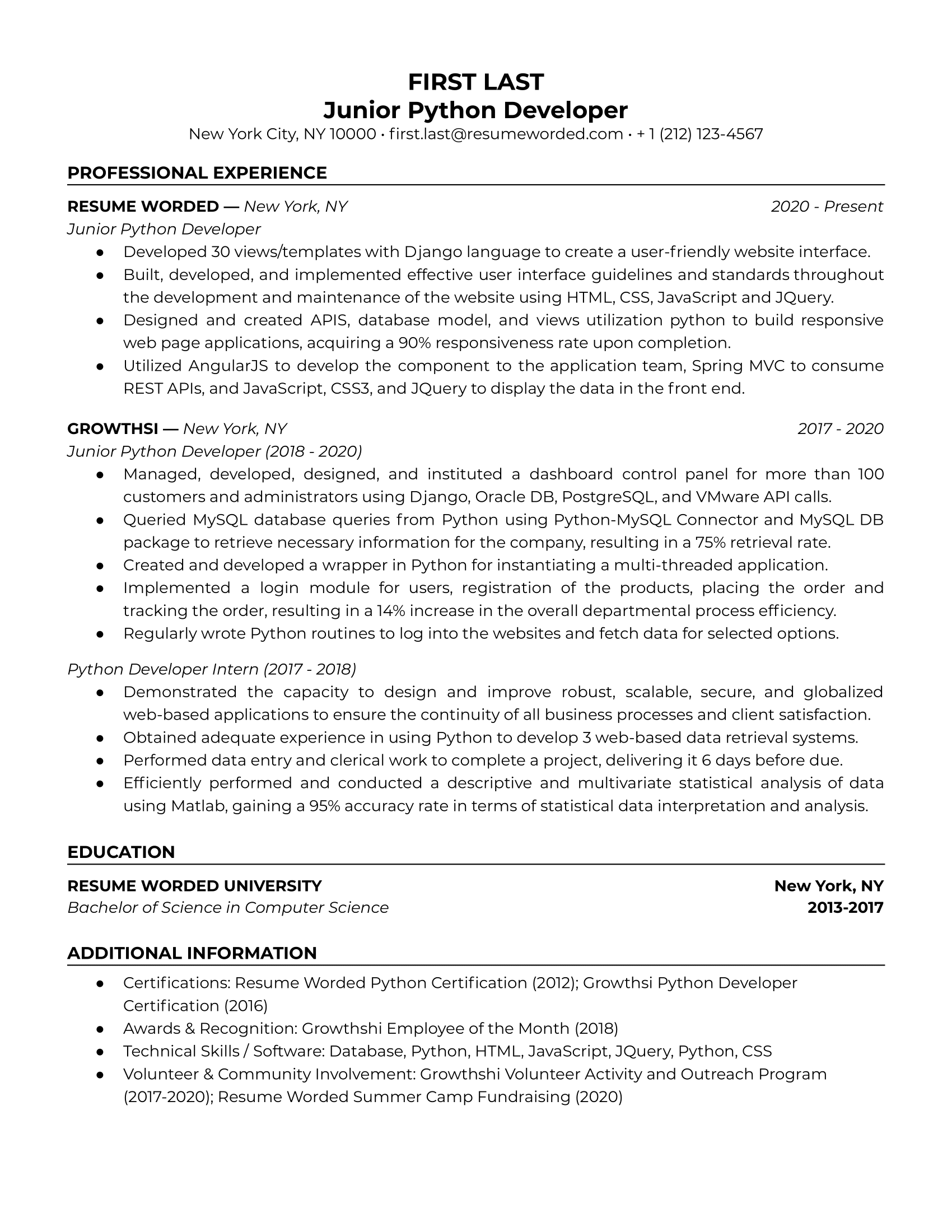
Junior Full Stack Developer
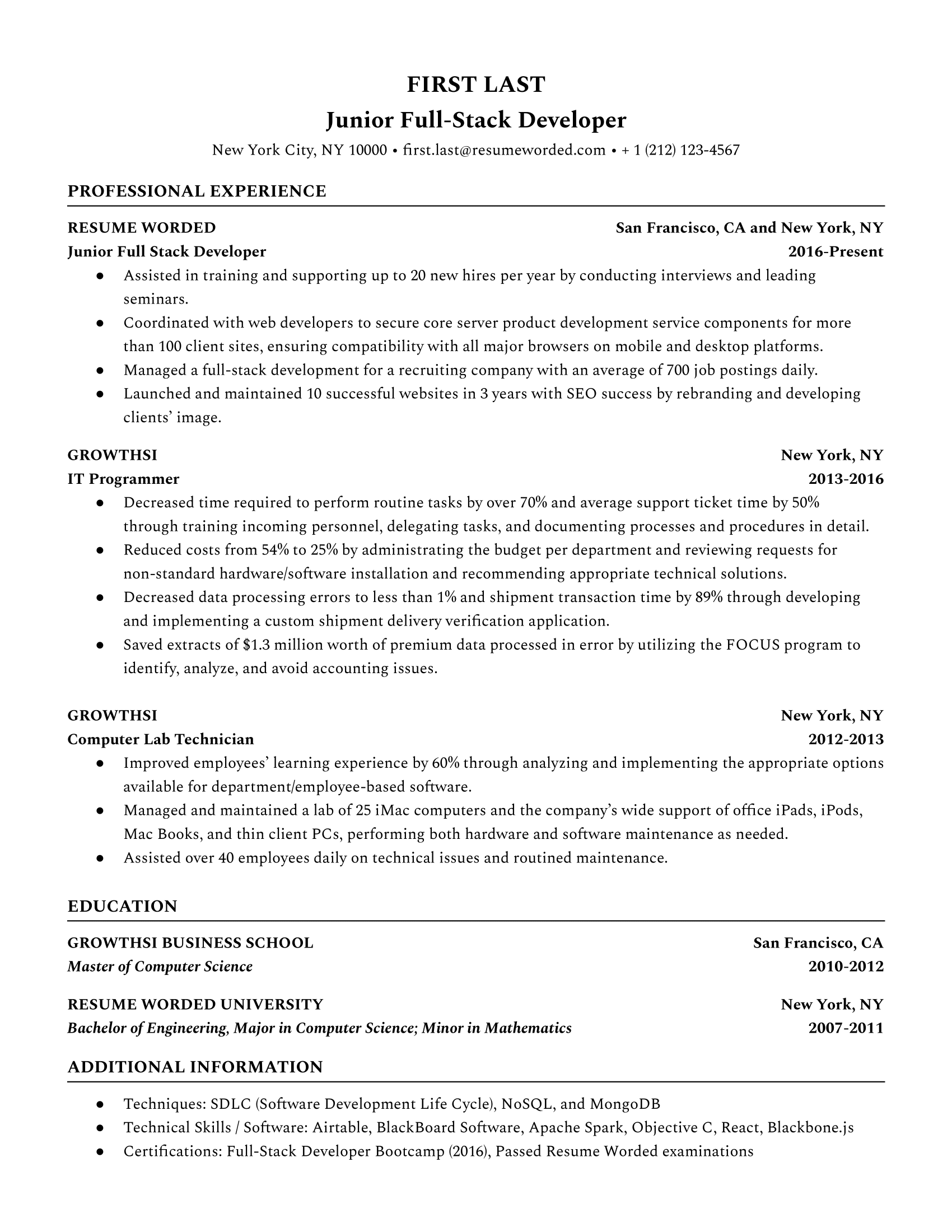
Entry Level Full Stack Developer
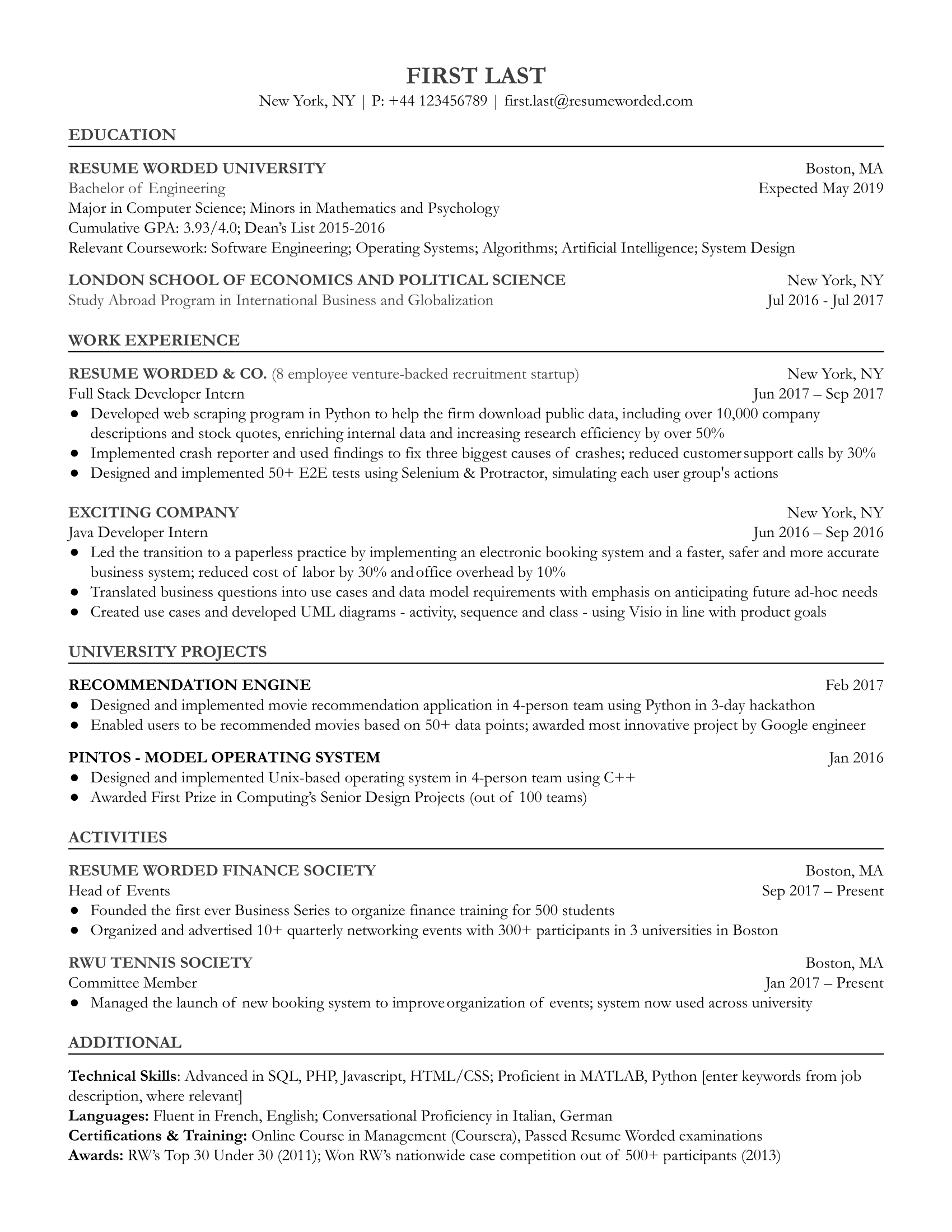
Entry-Level Sales Associate
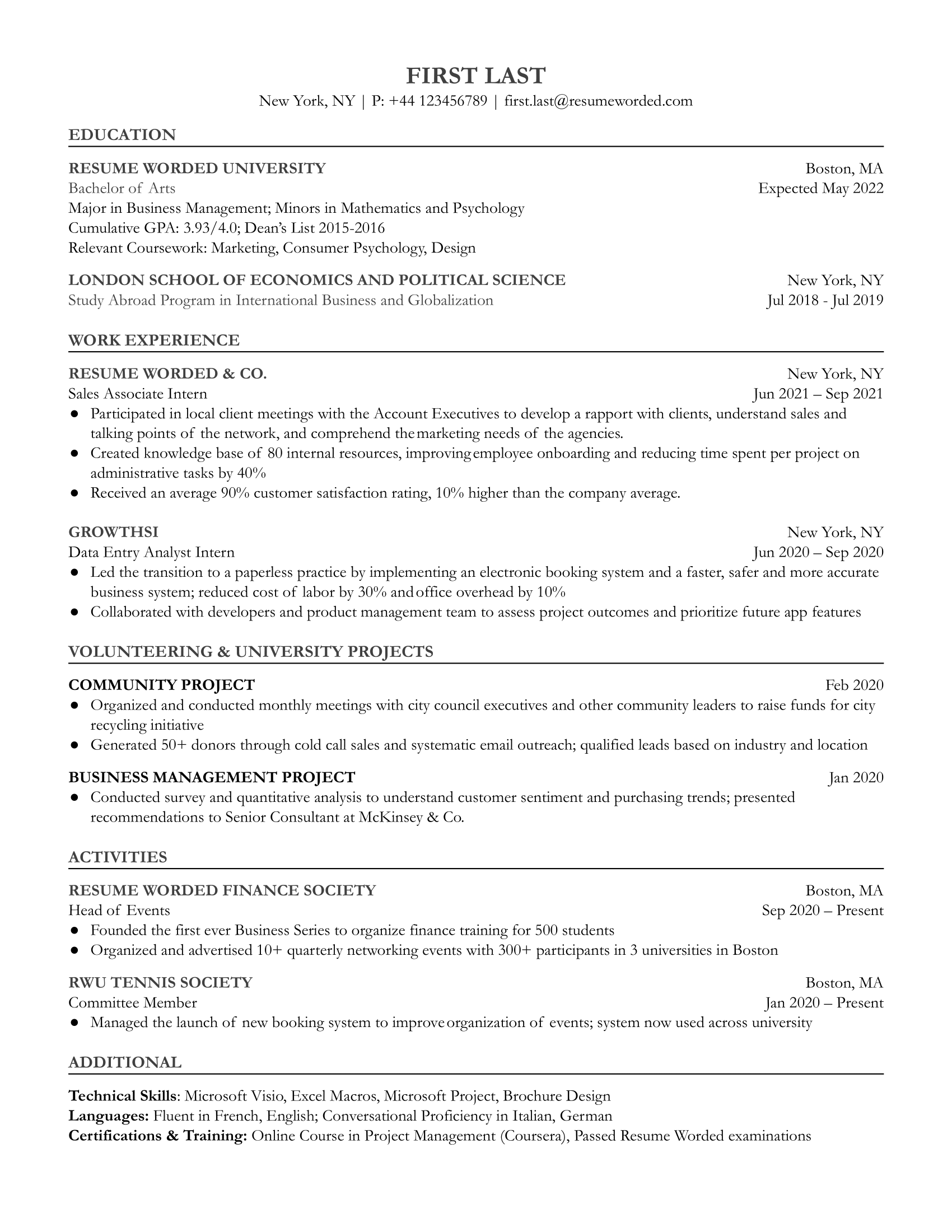
Entry Level Cyber Security Analyst
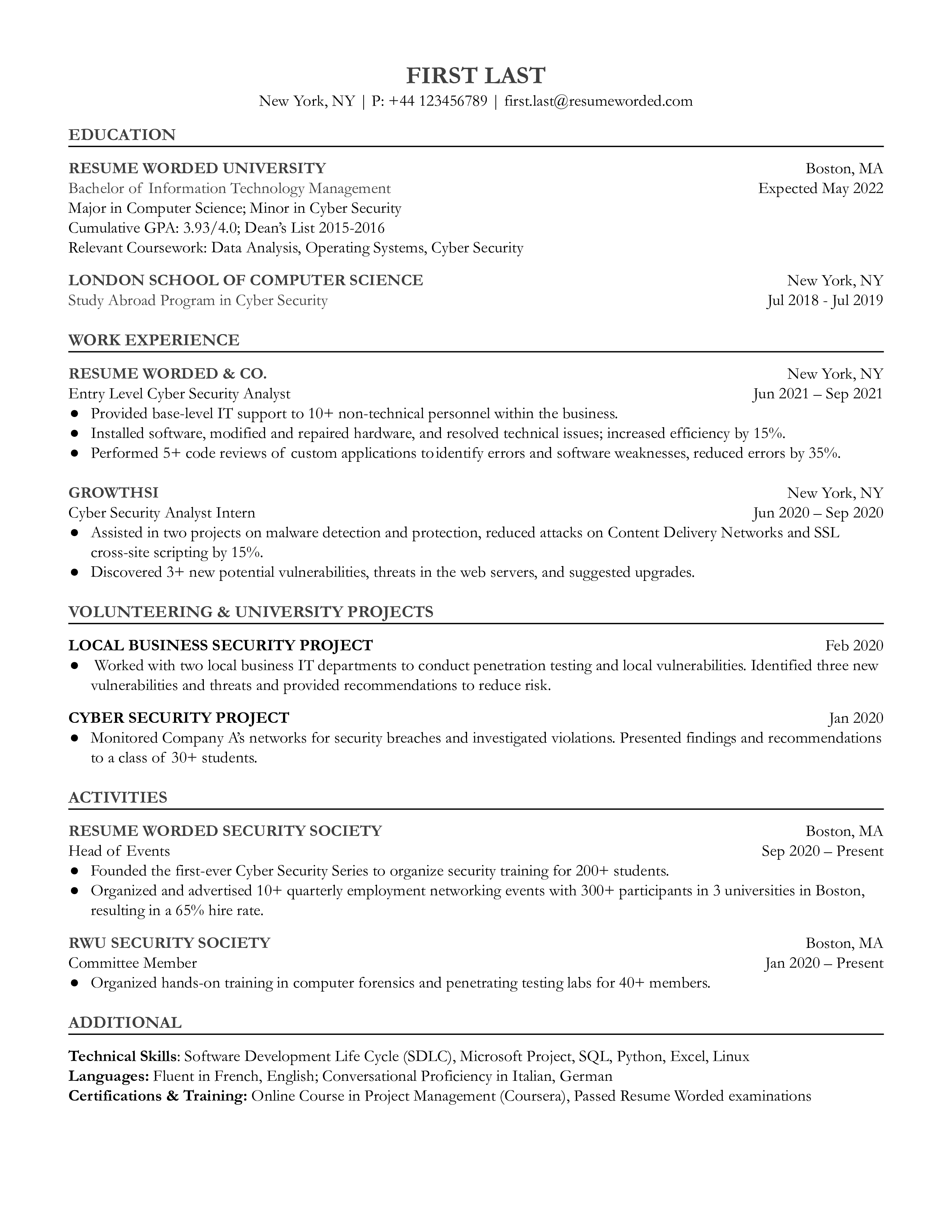
Entry Level Supply Chain Analyst
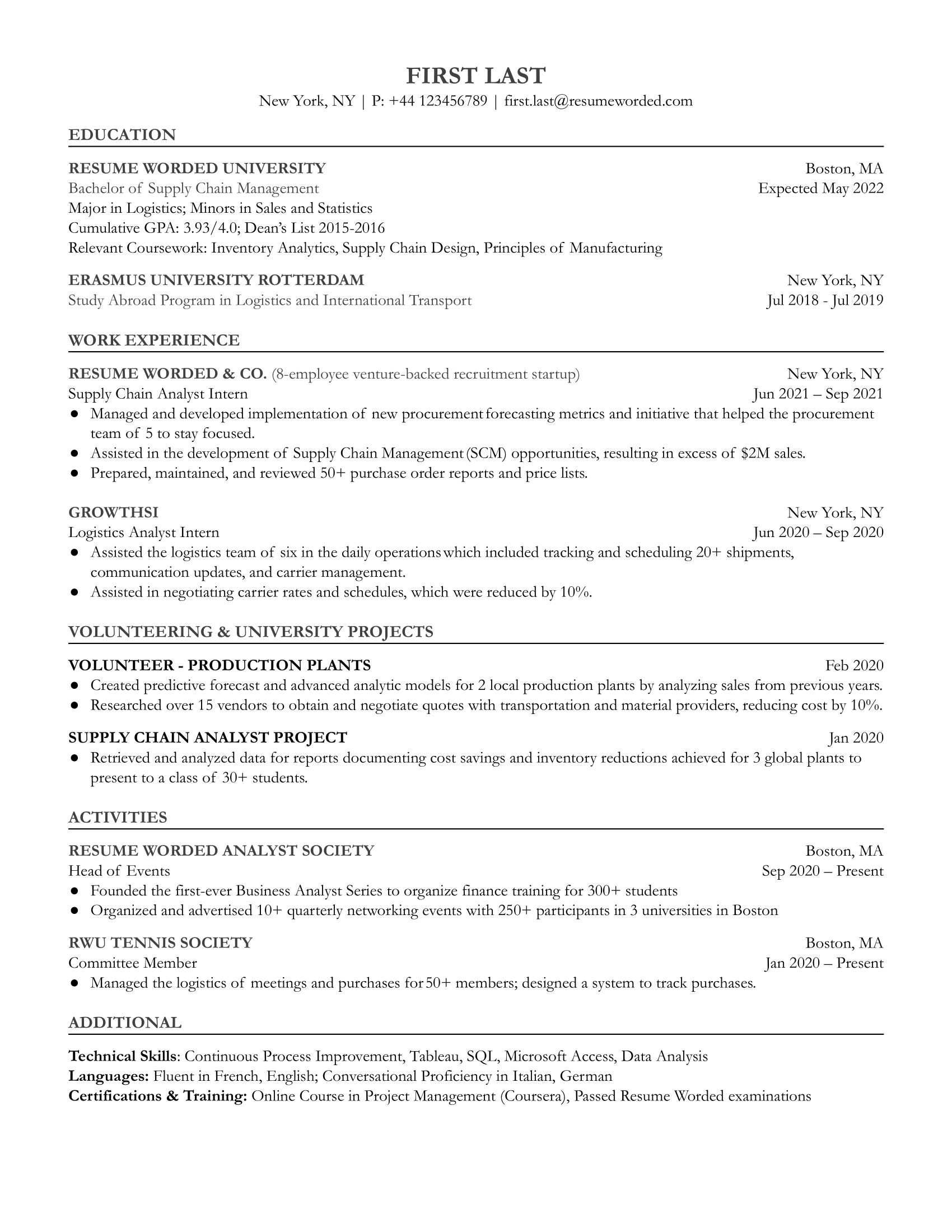
Entry Level Financial Advisor
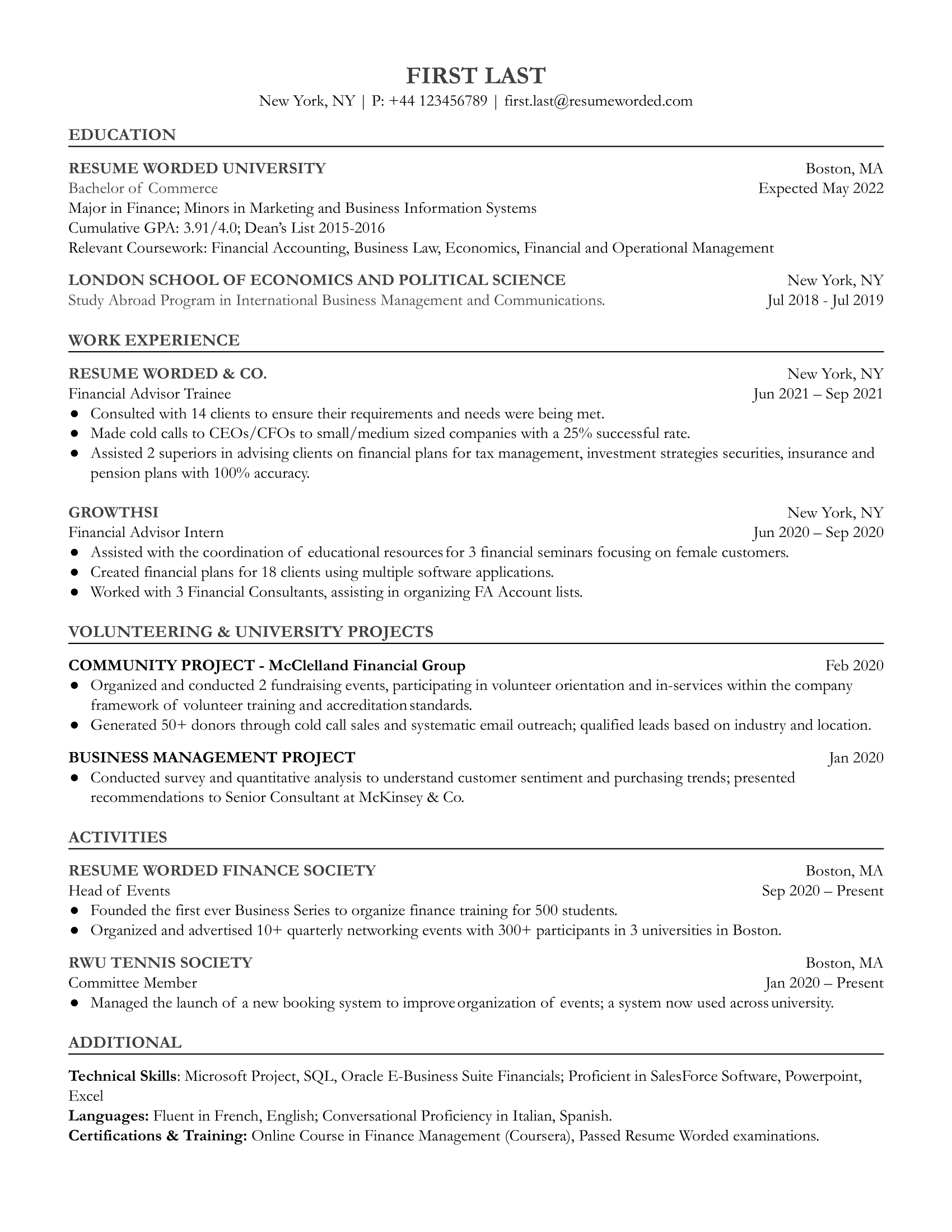
Entry Level Electrical Engineer
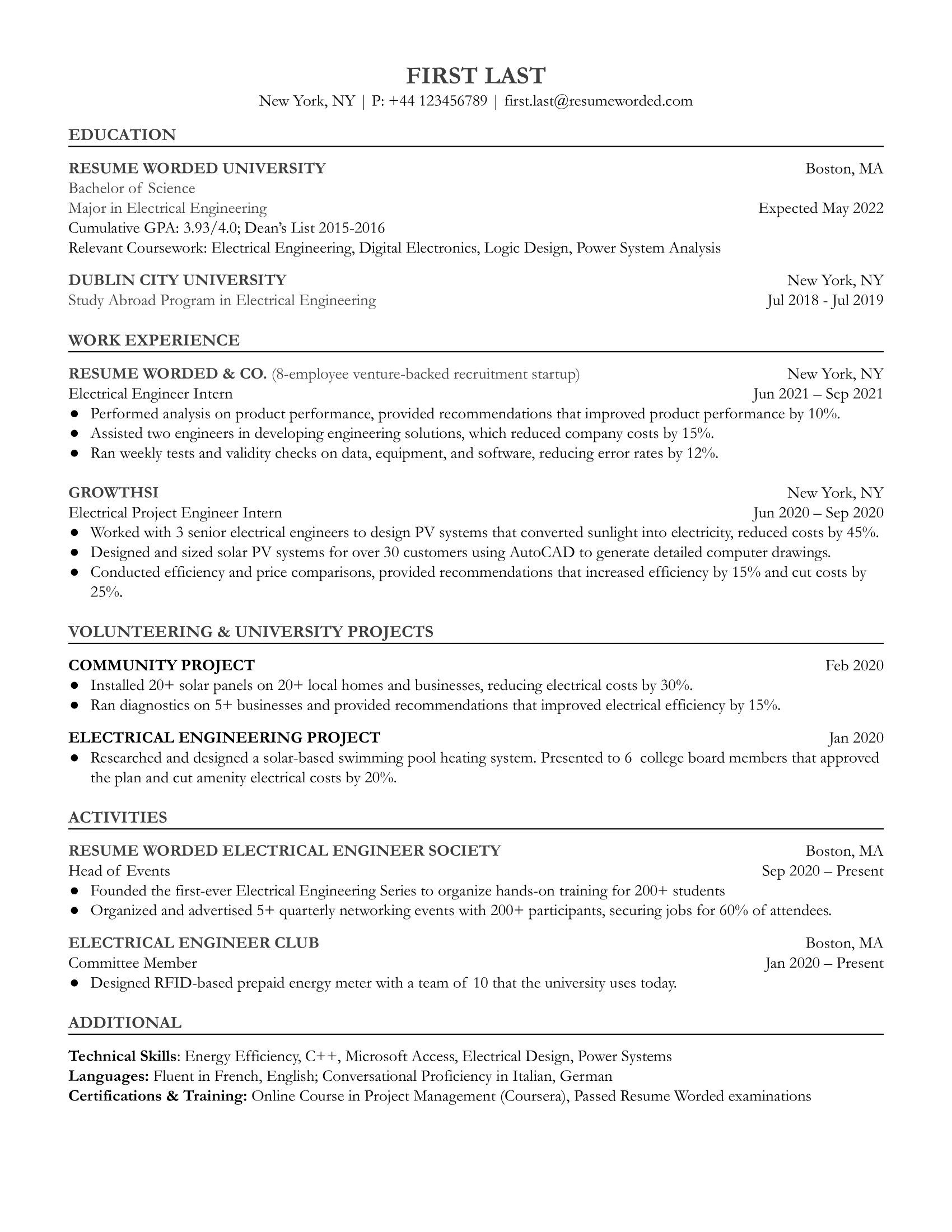
Junior System Administrator
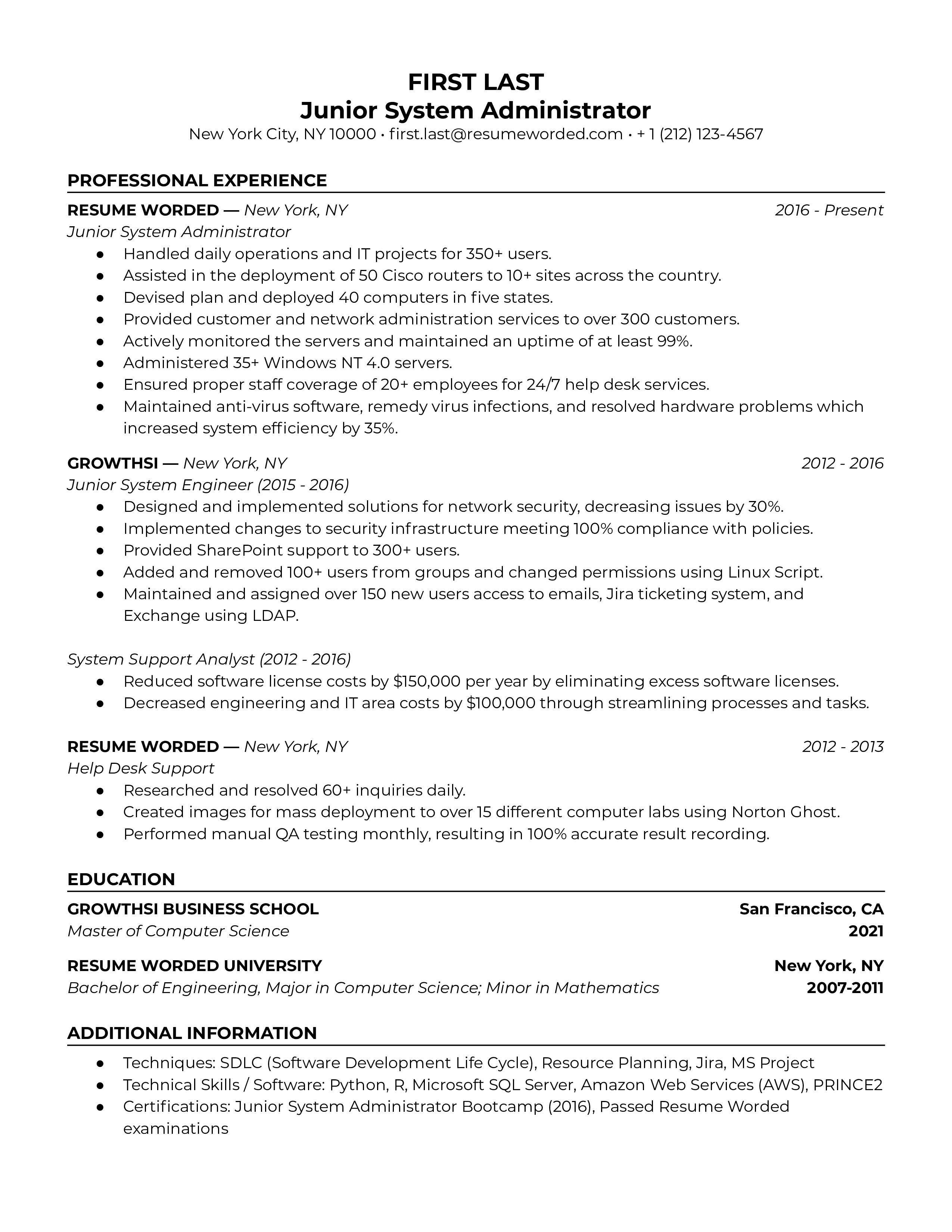
Entry Level Interior Designer
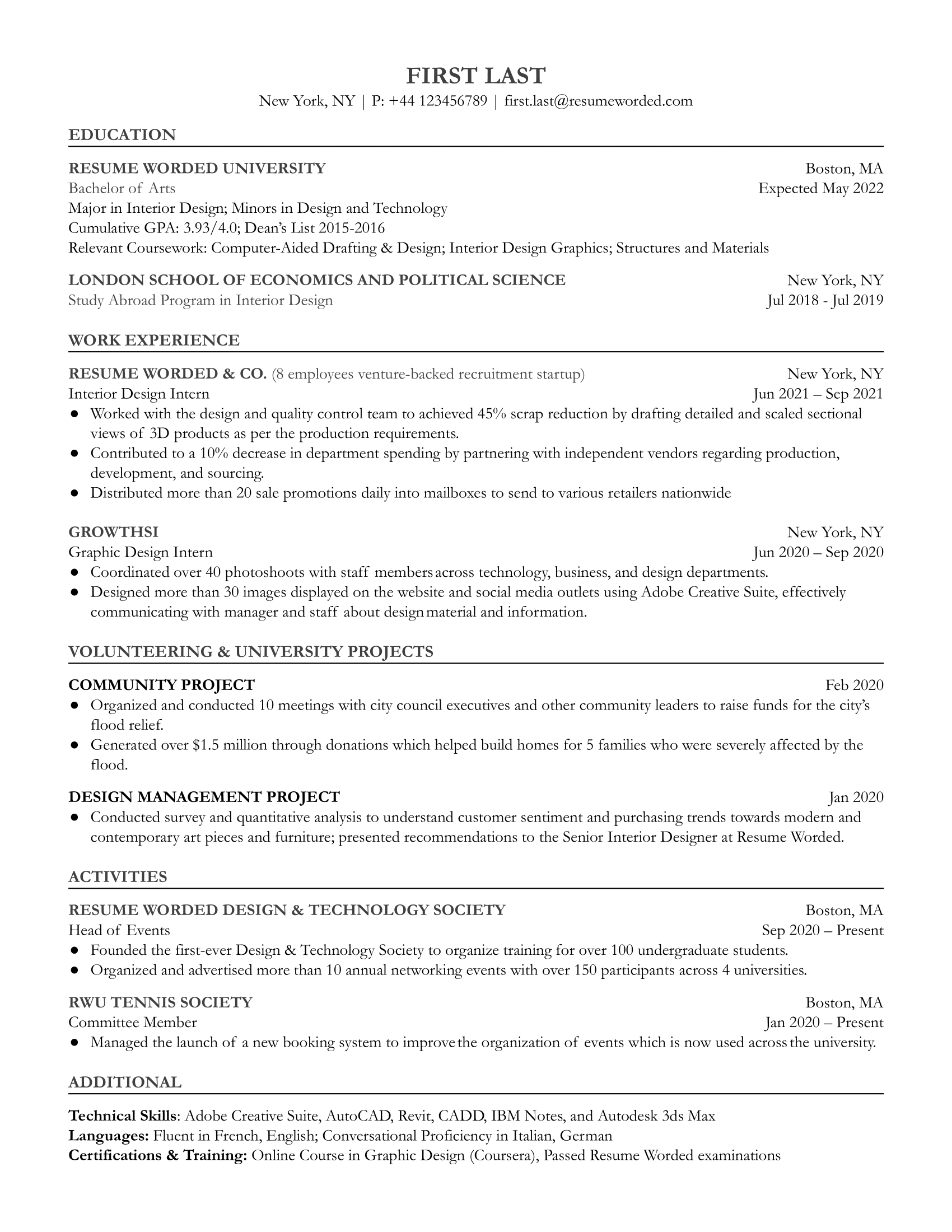
Entry Level Civil Engineer
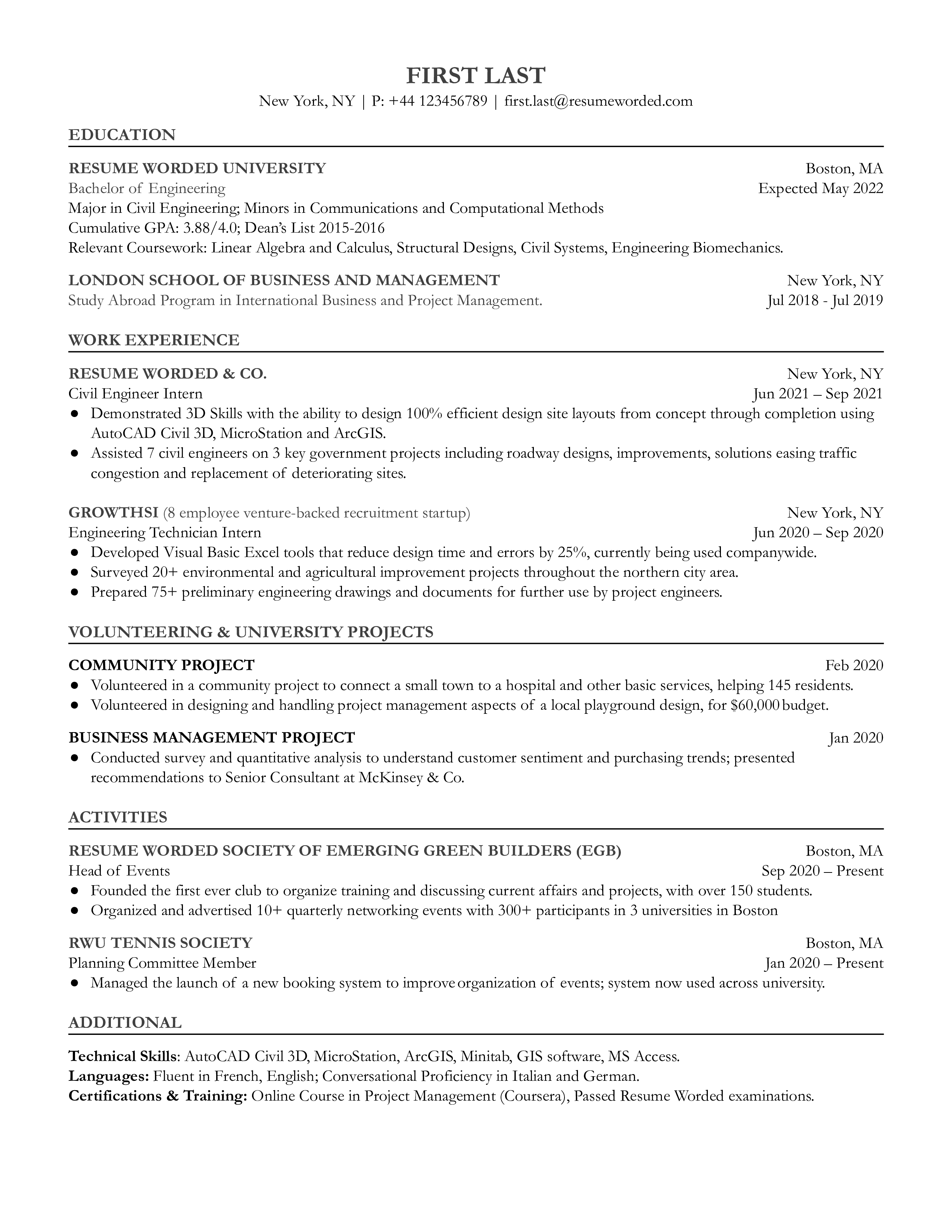
Entry-Level Civil Engineer

Entry Level Legal Assistant
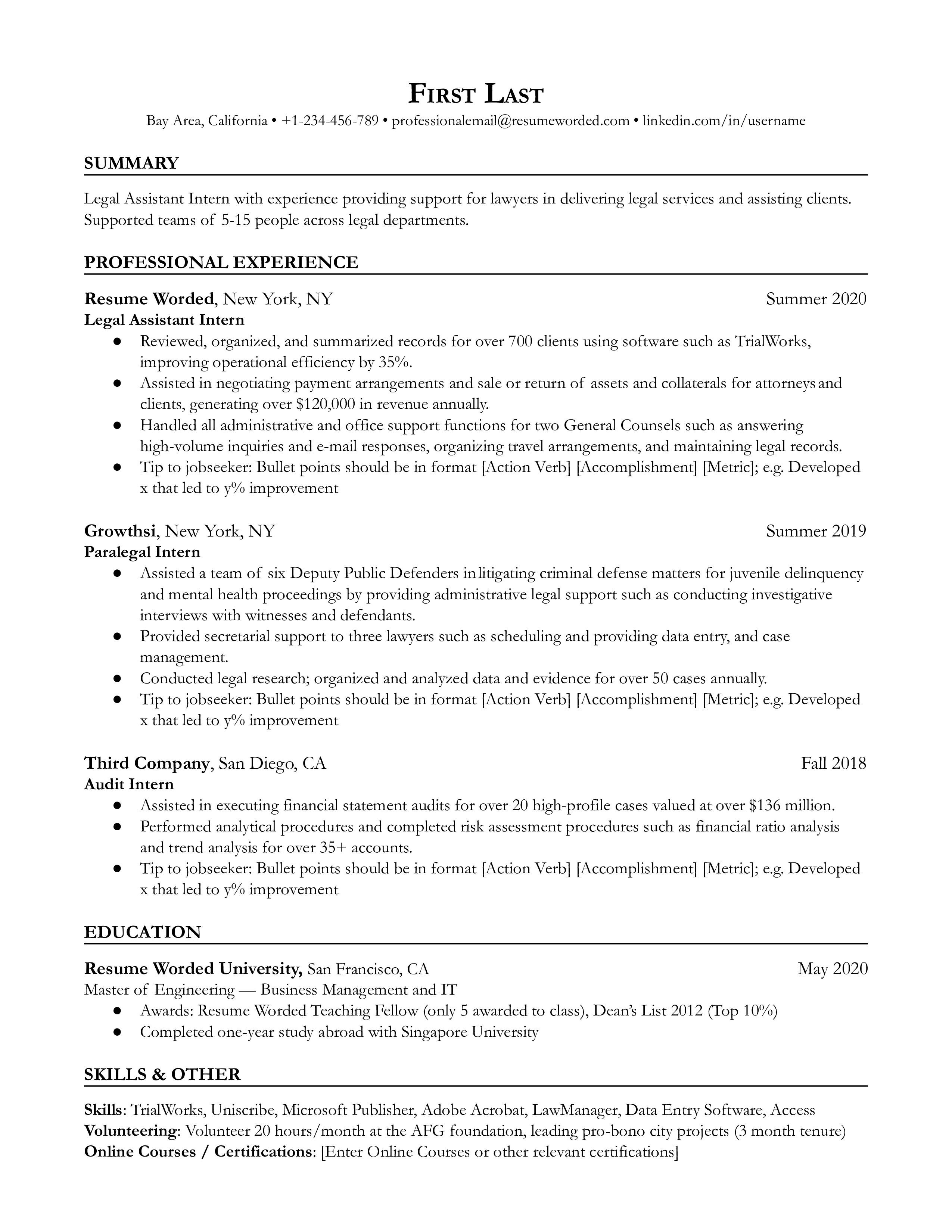
Entry Level QA (Quality Assurance) Tester
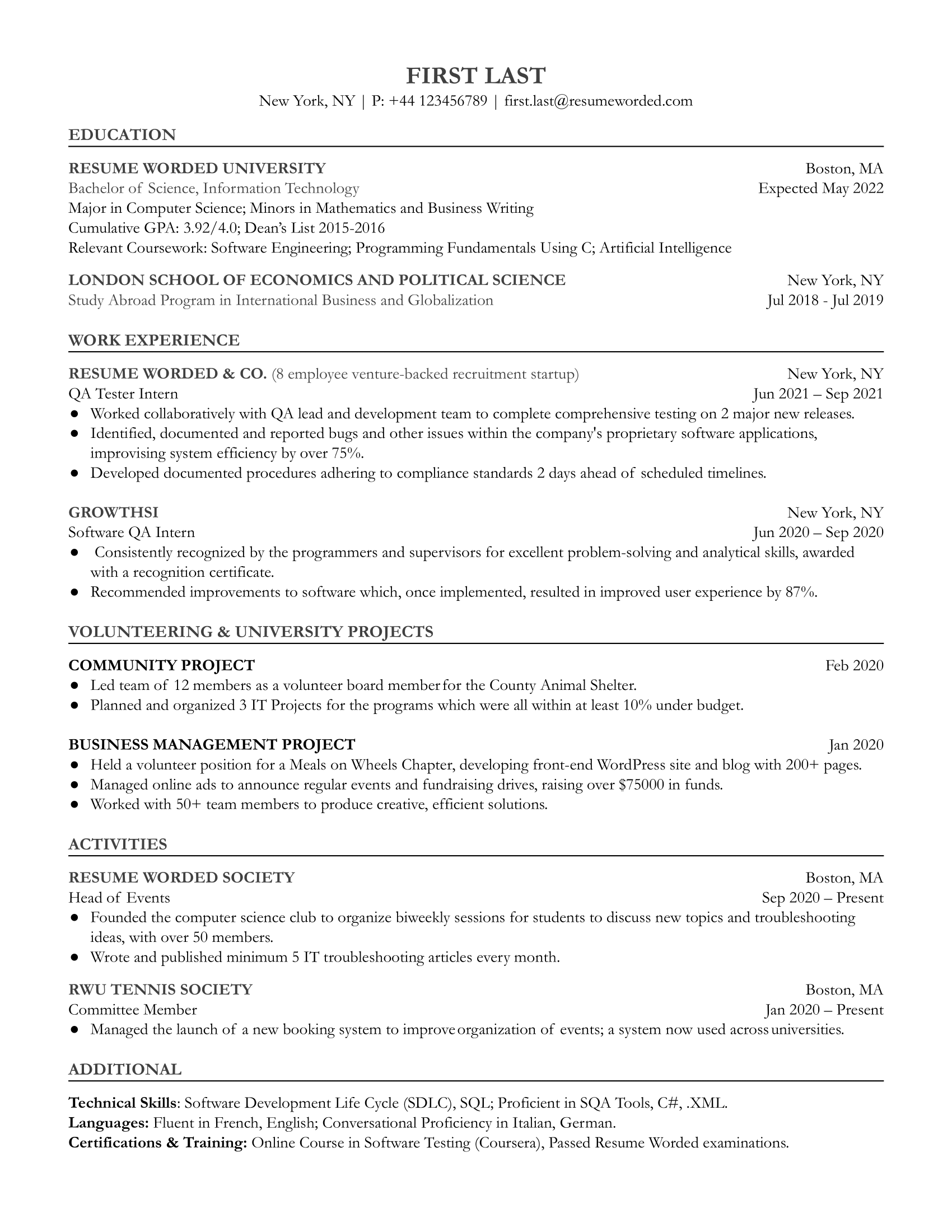
Junior Network Administrator
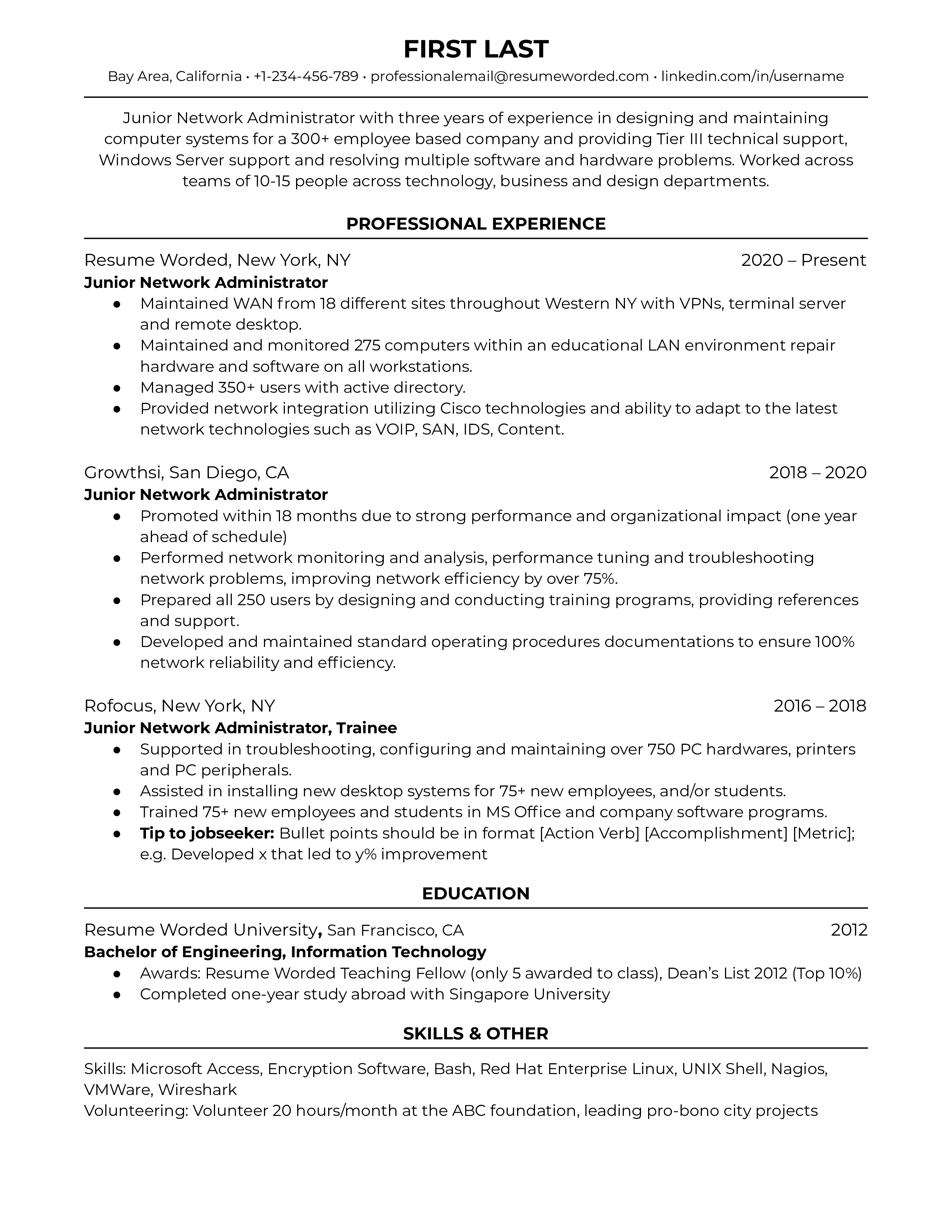
Entry Level Network Administrator
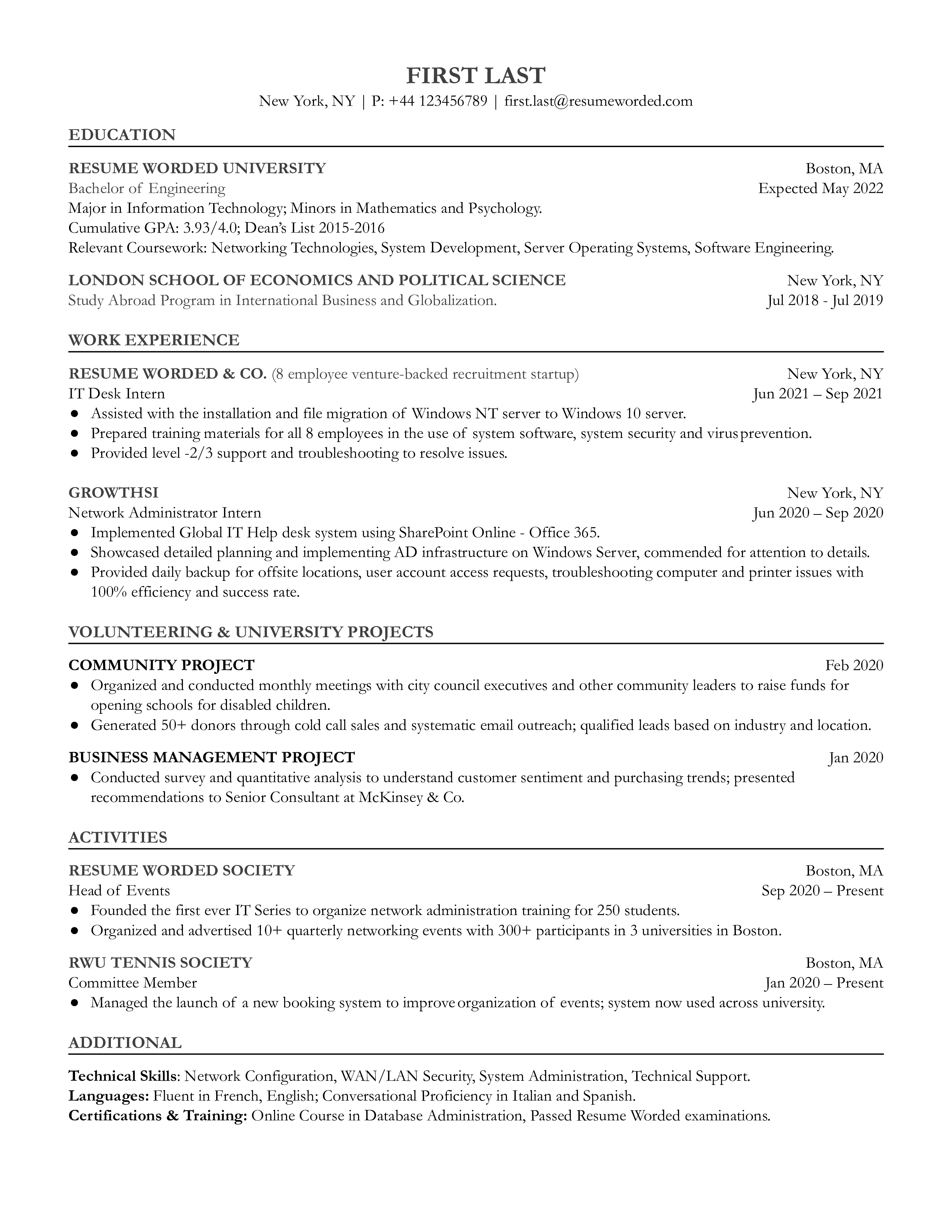
Junior Mechanical Engineer
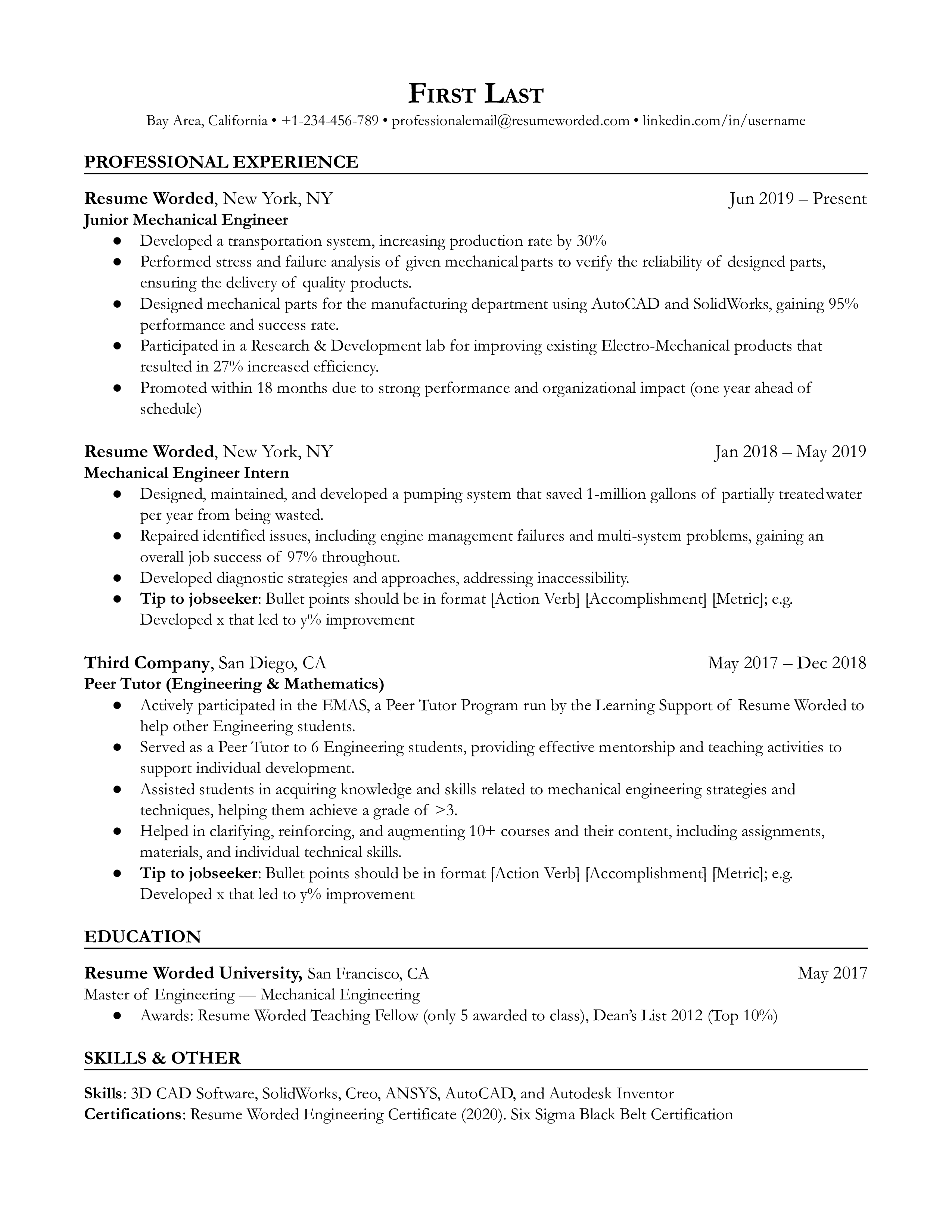
Entry Level Manufacturing Engineer
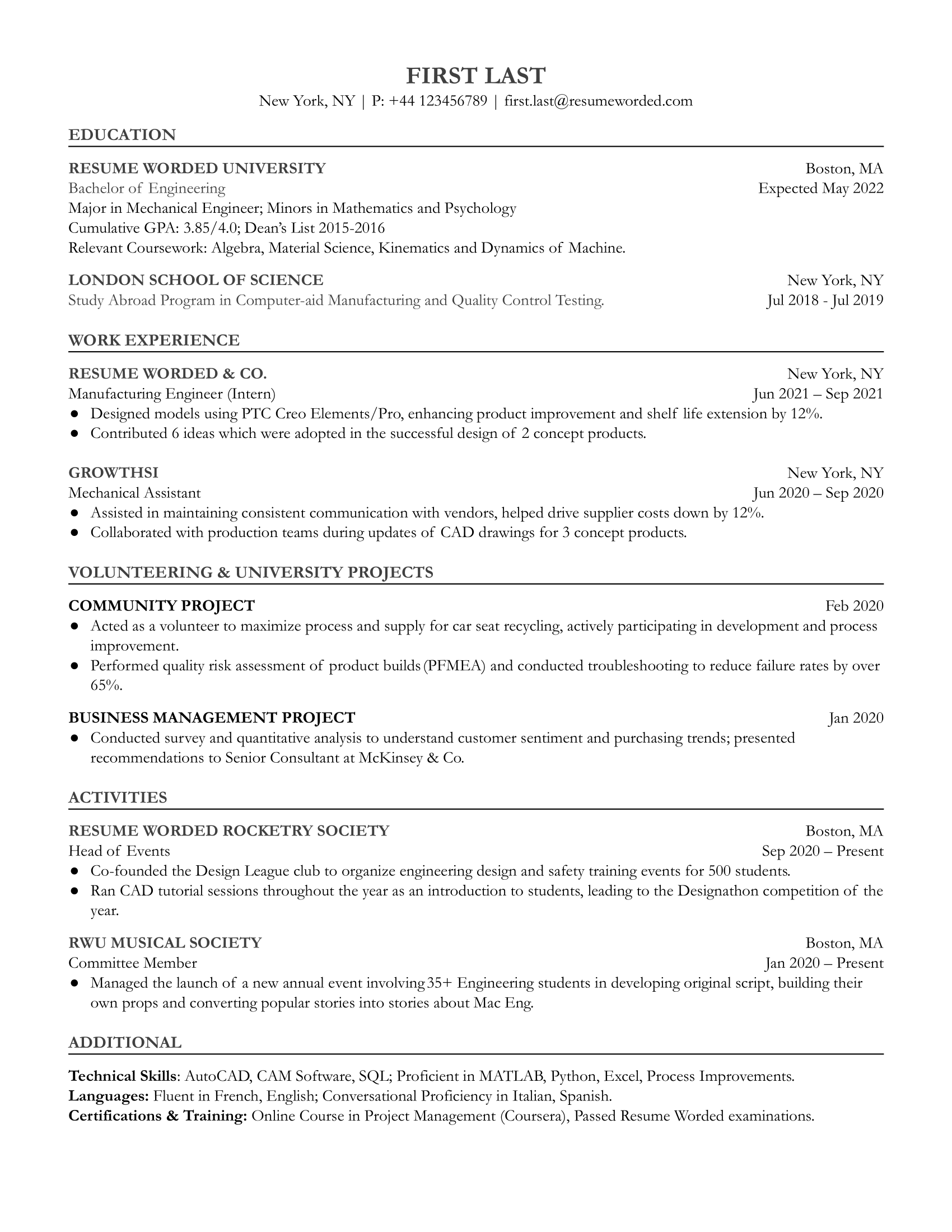
Entry Level Network Engineer
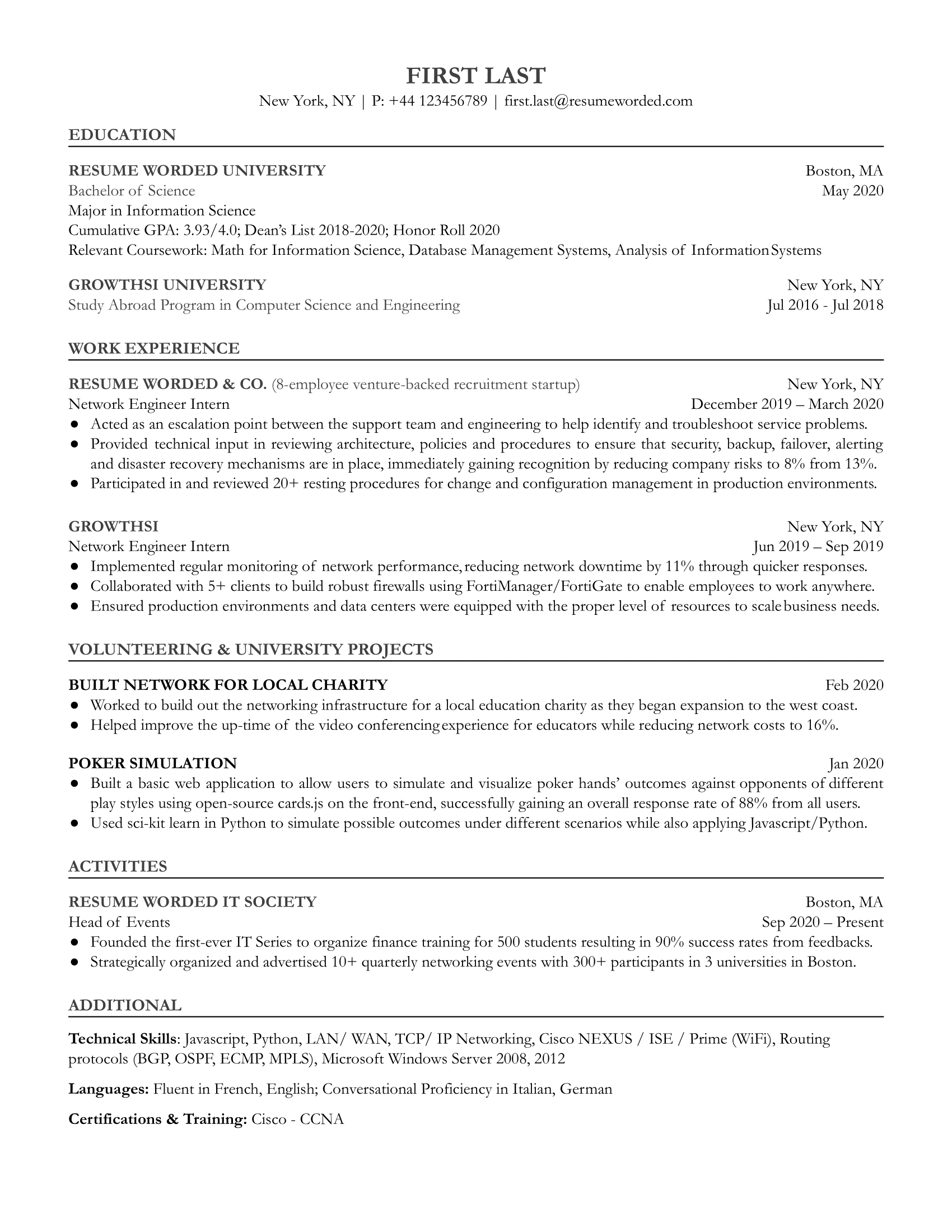
Junior SQL Developer
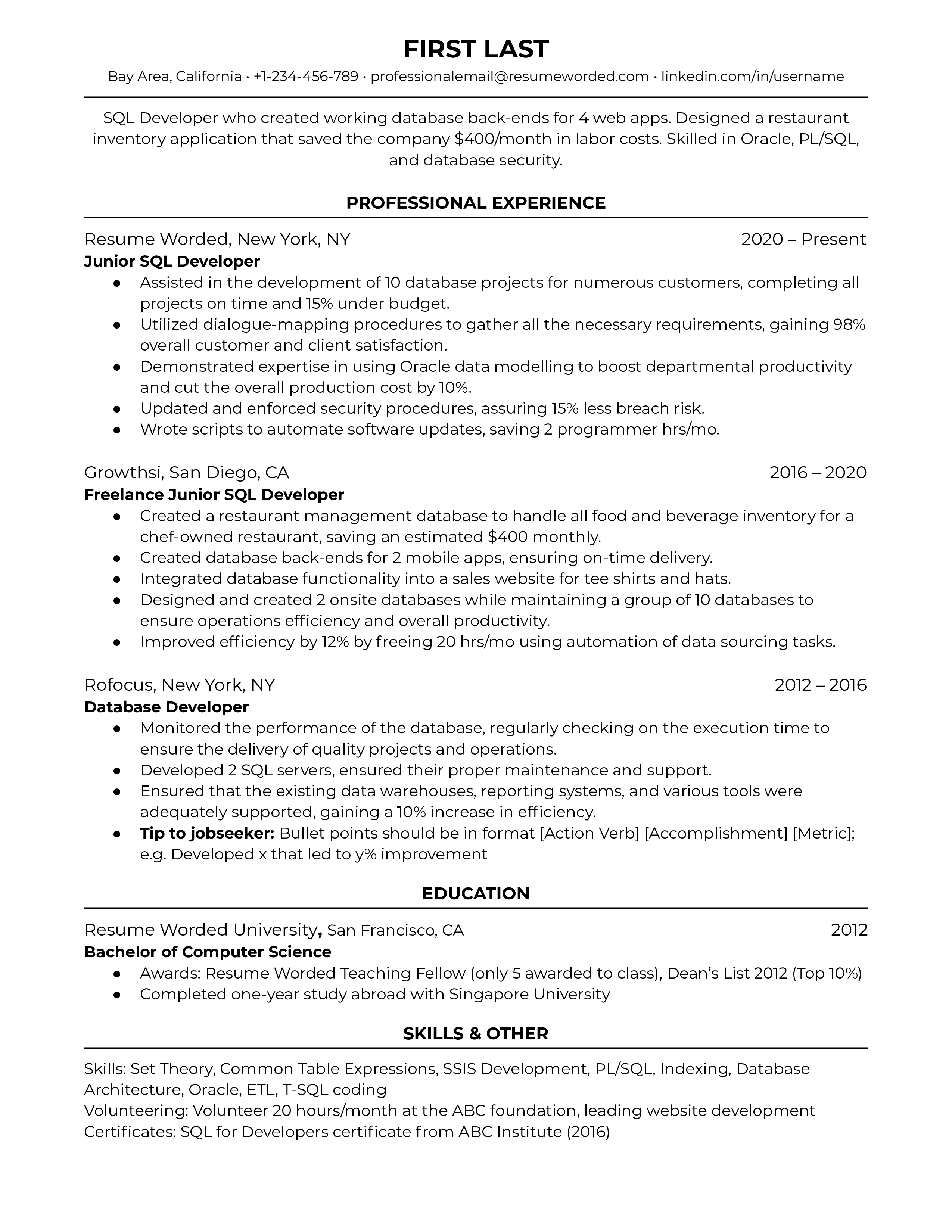
Junior Data Scientist
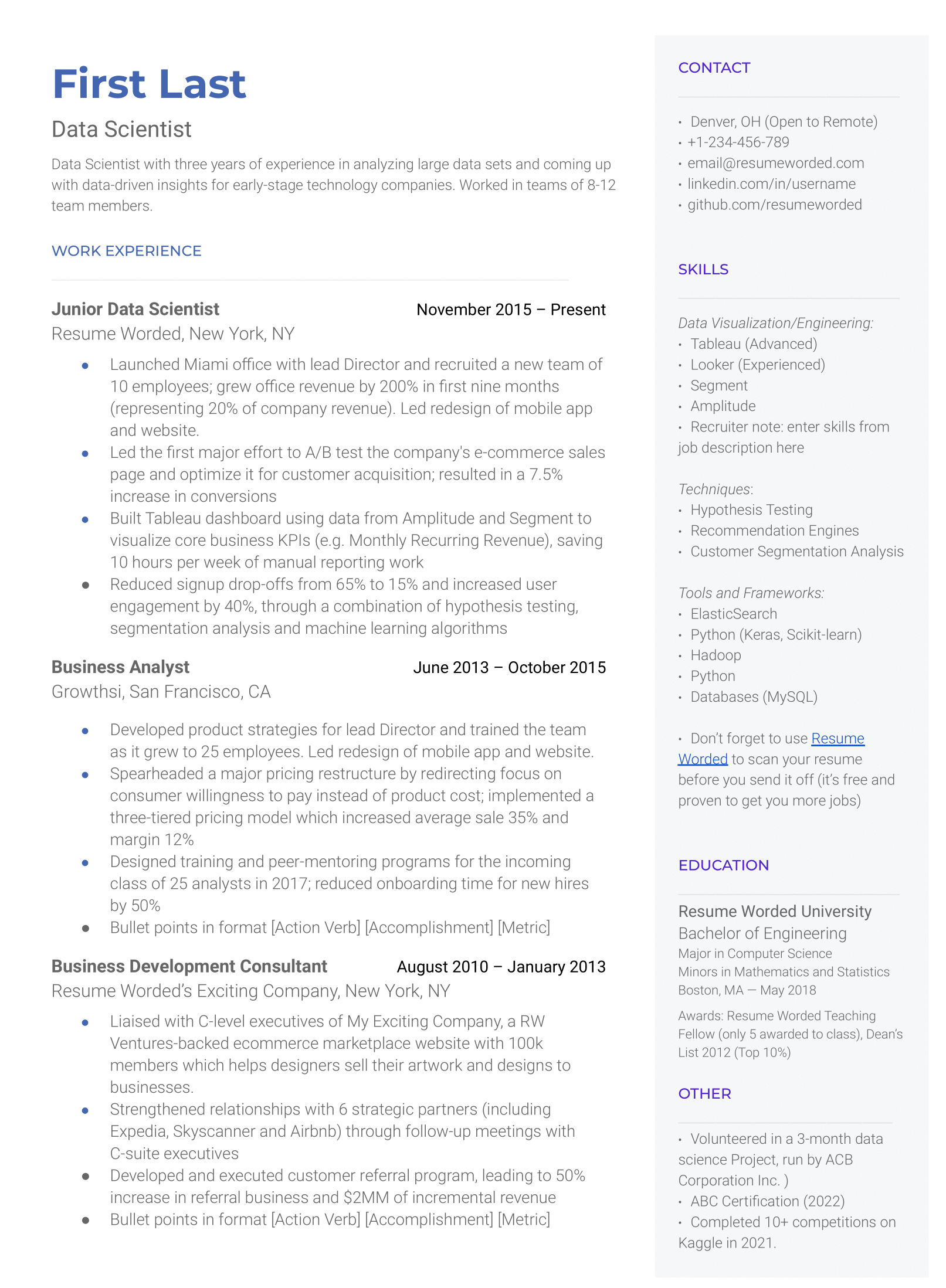
Modern Two-Column

Entry-Level (Free)

Entry Level Communications
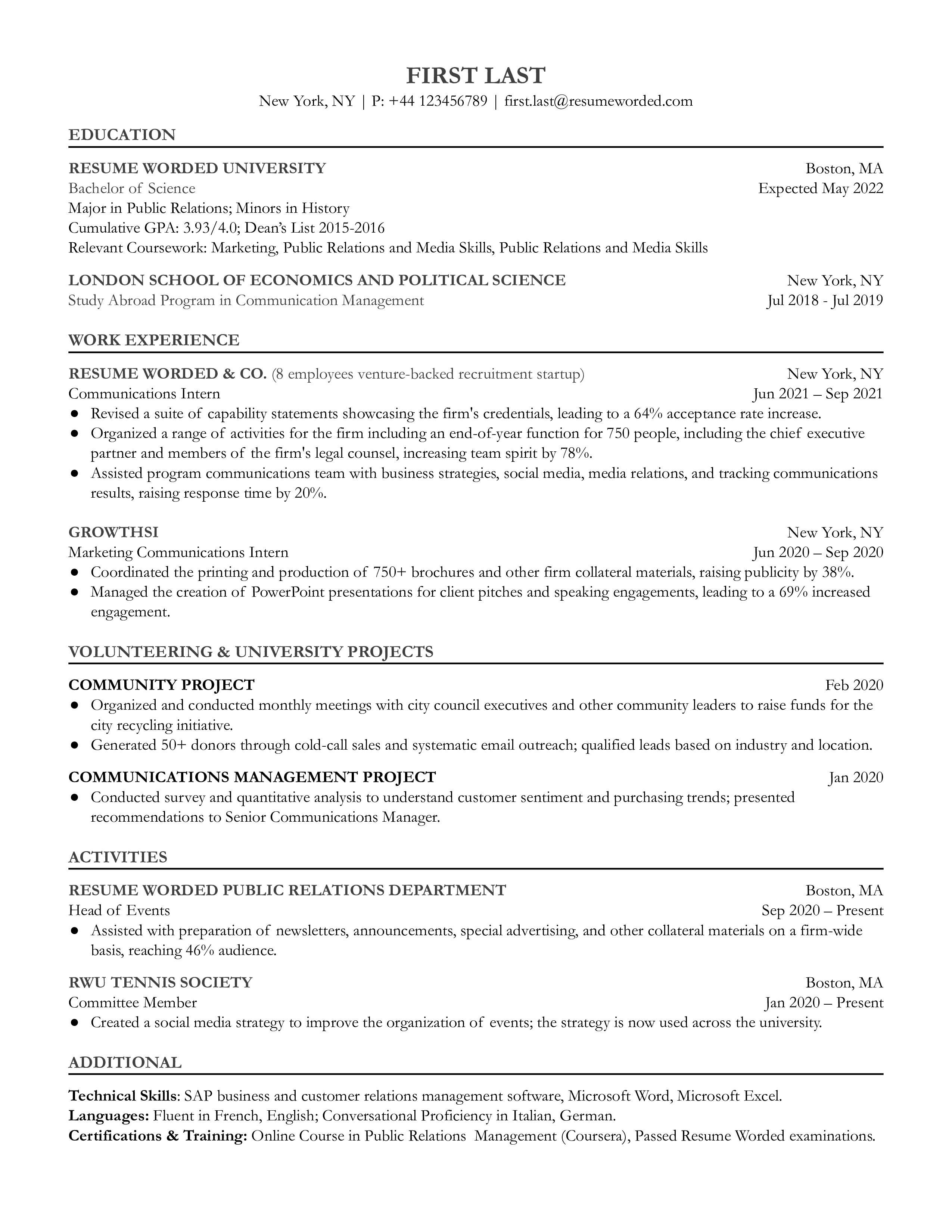
Junior Policy Analyst
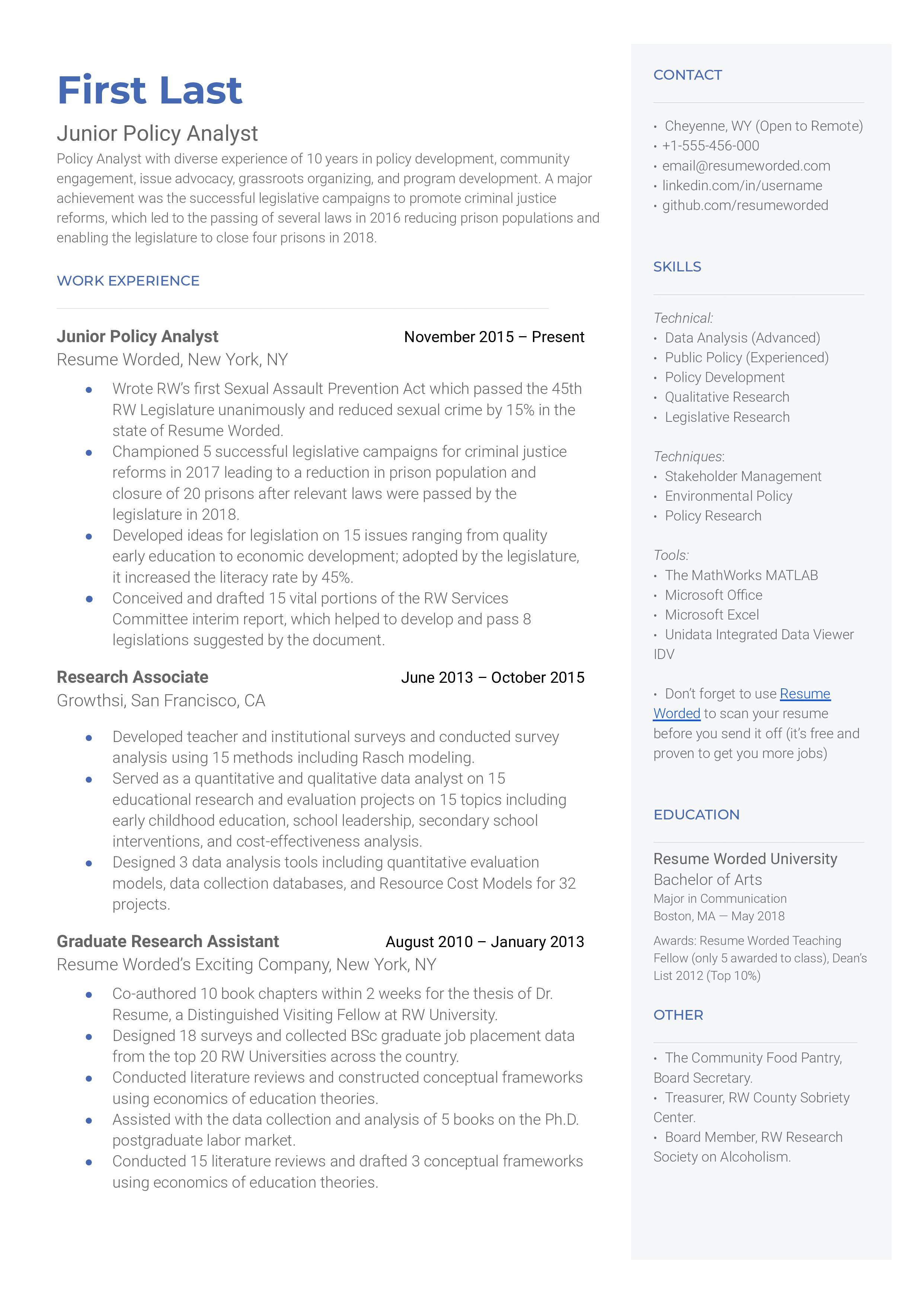
Entry-Level Journalist
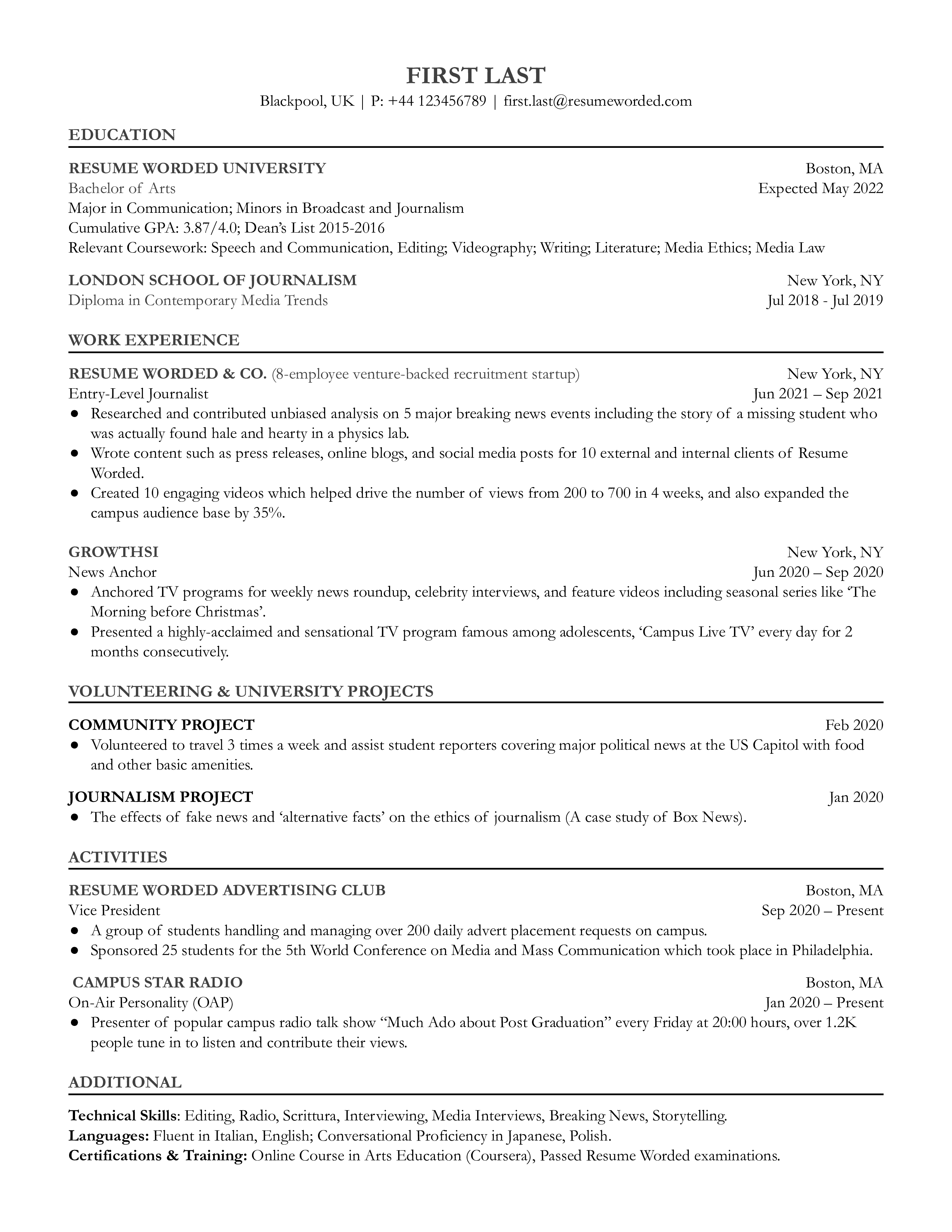
Junior Data Modeler
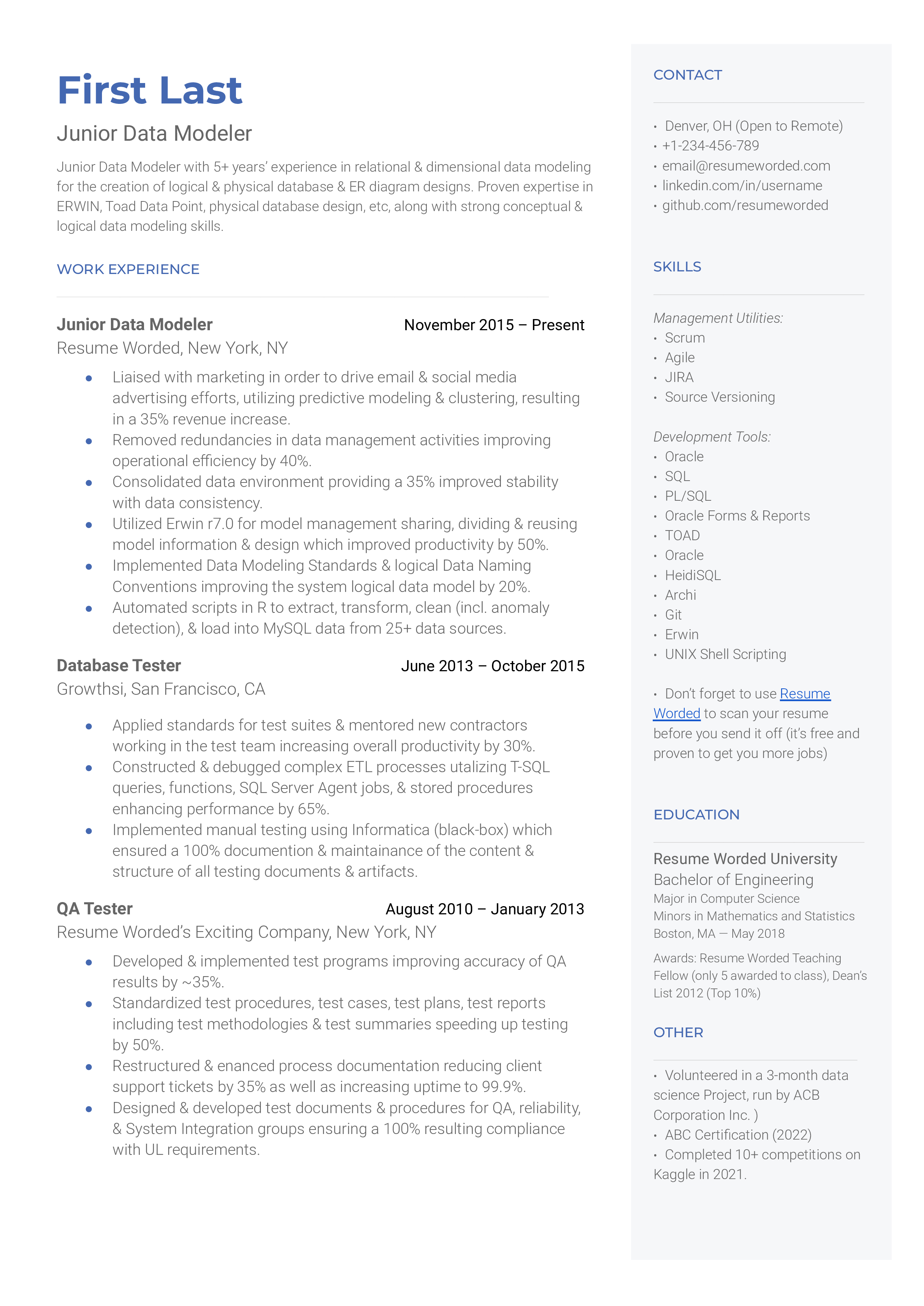
Entry-Level Copywriter
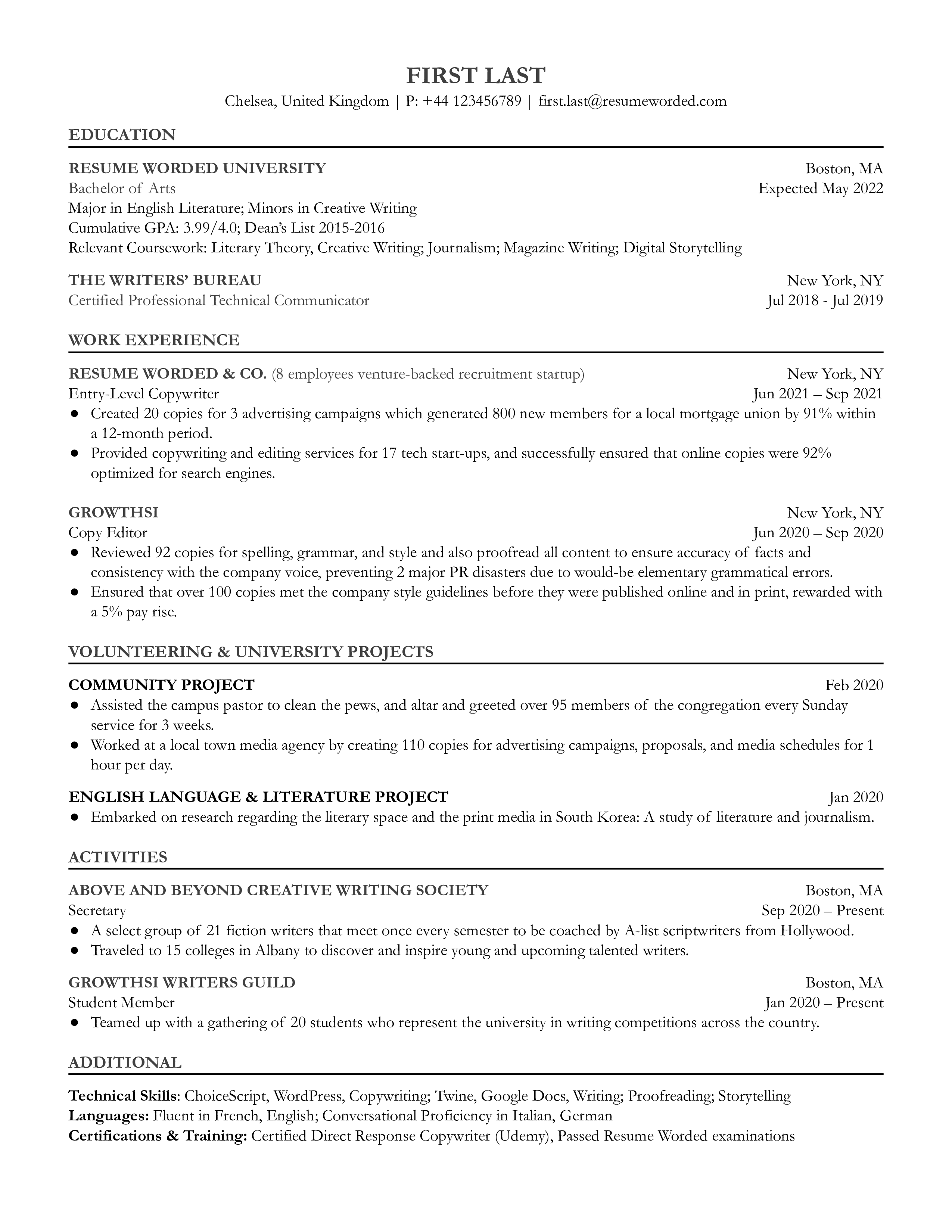
Junior Copywriter
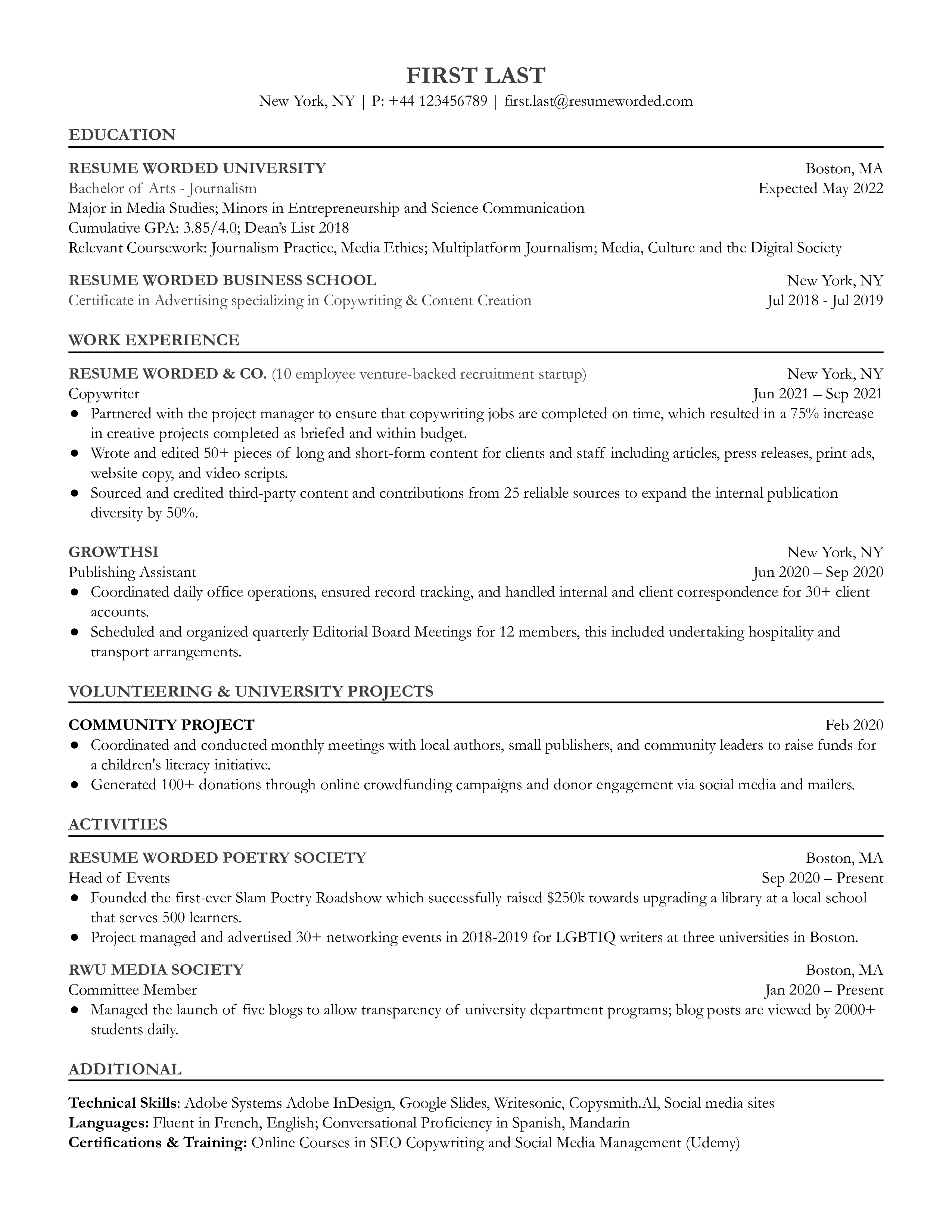
Entry-Level Virtual Assistant
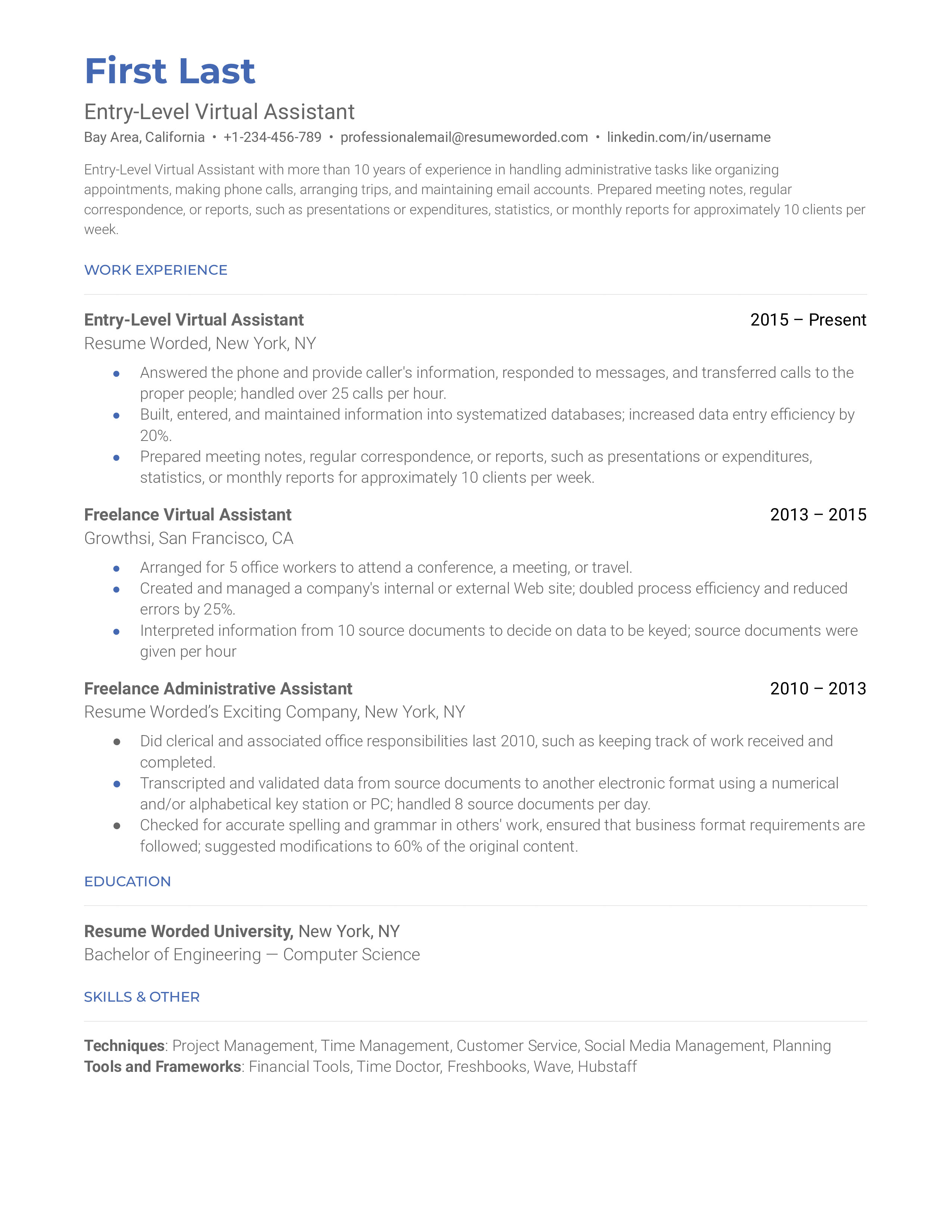
Entry-Level Recruiter
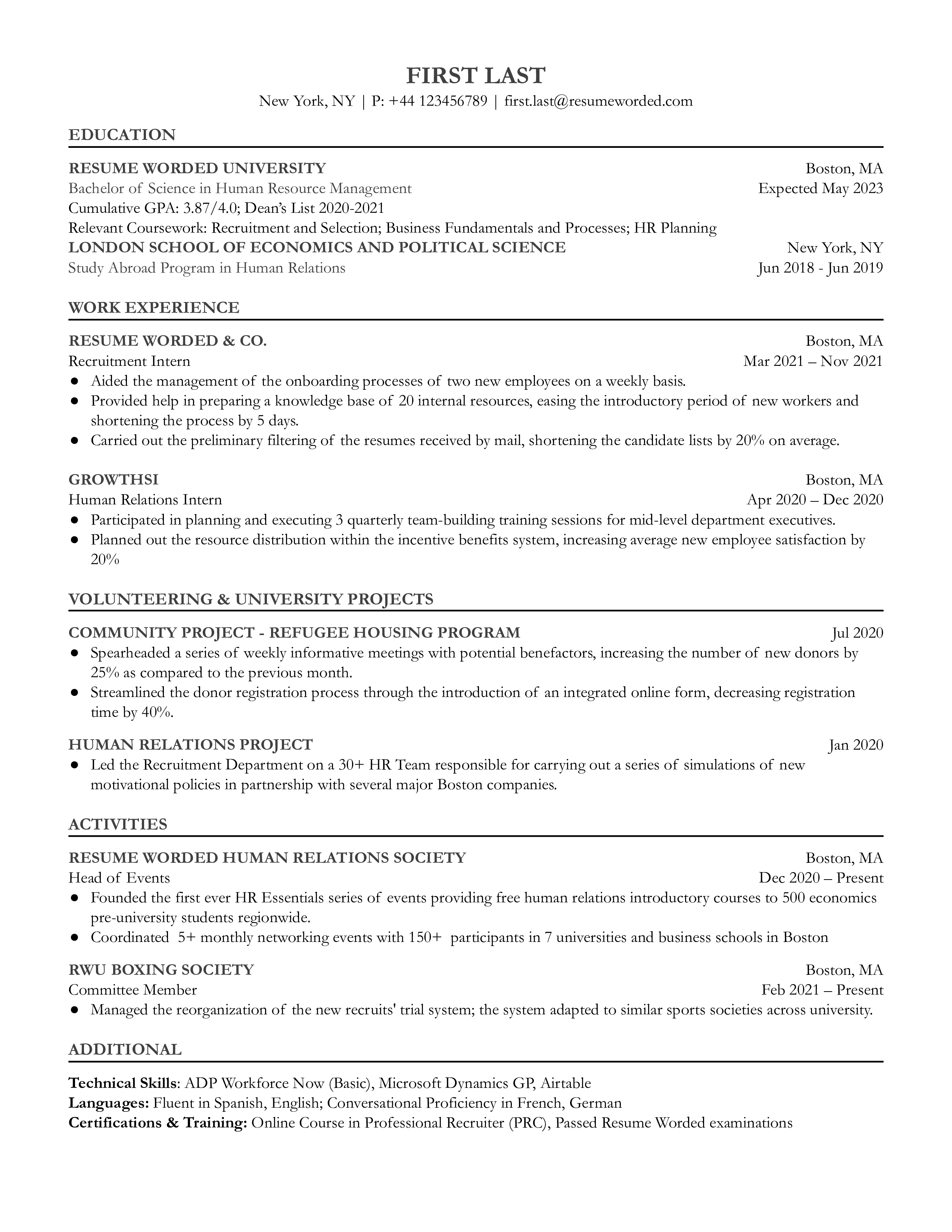
Junior Recruiter
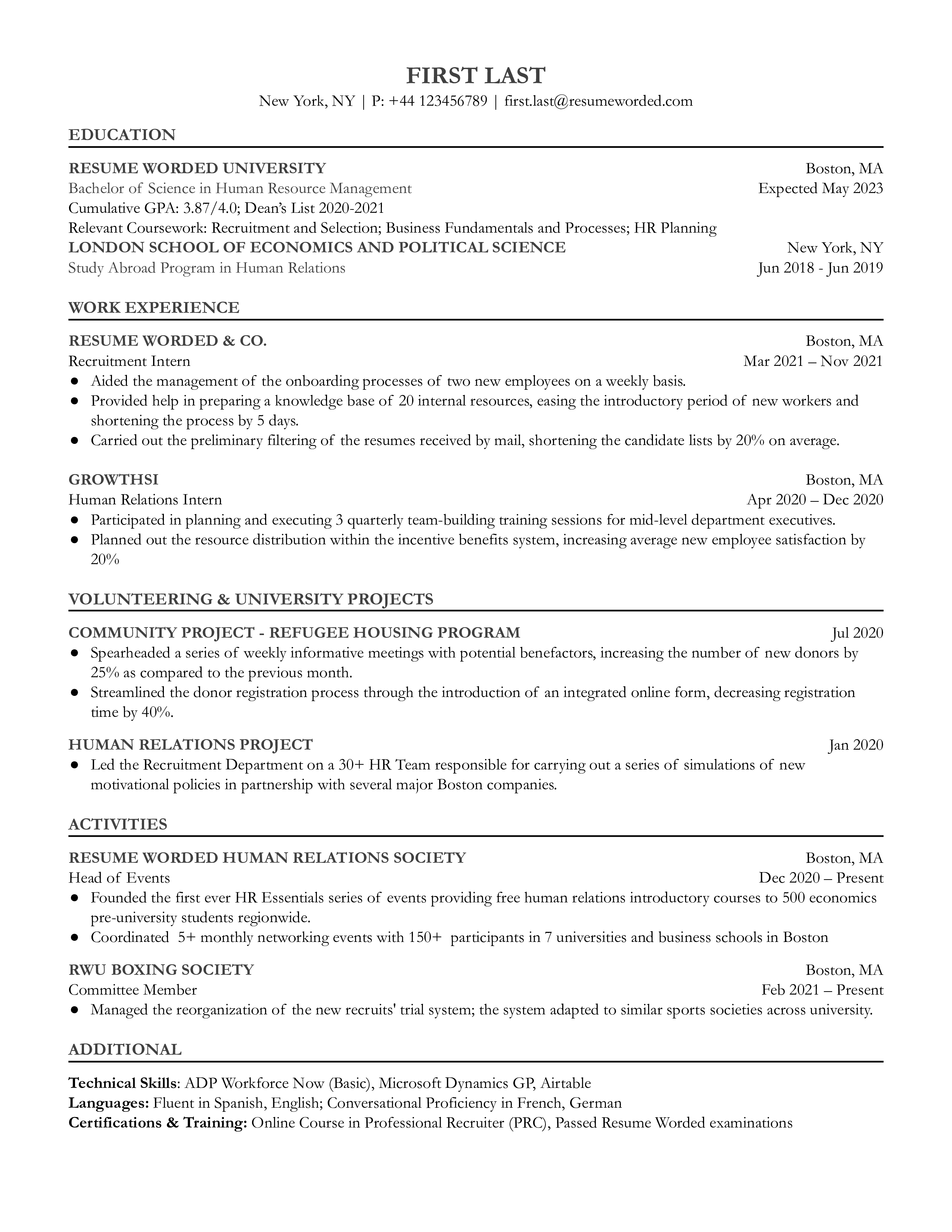
Junior Data Analyst
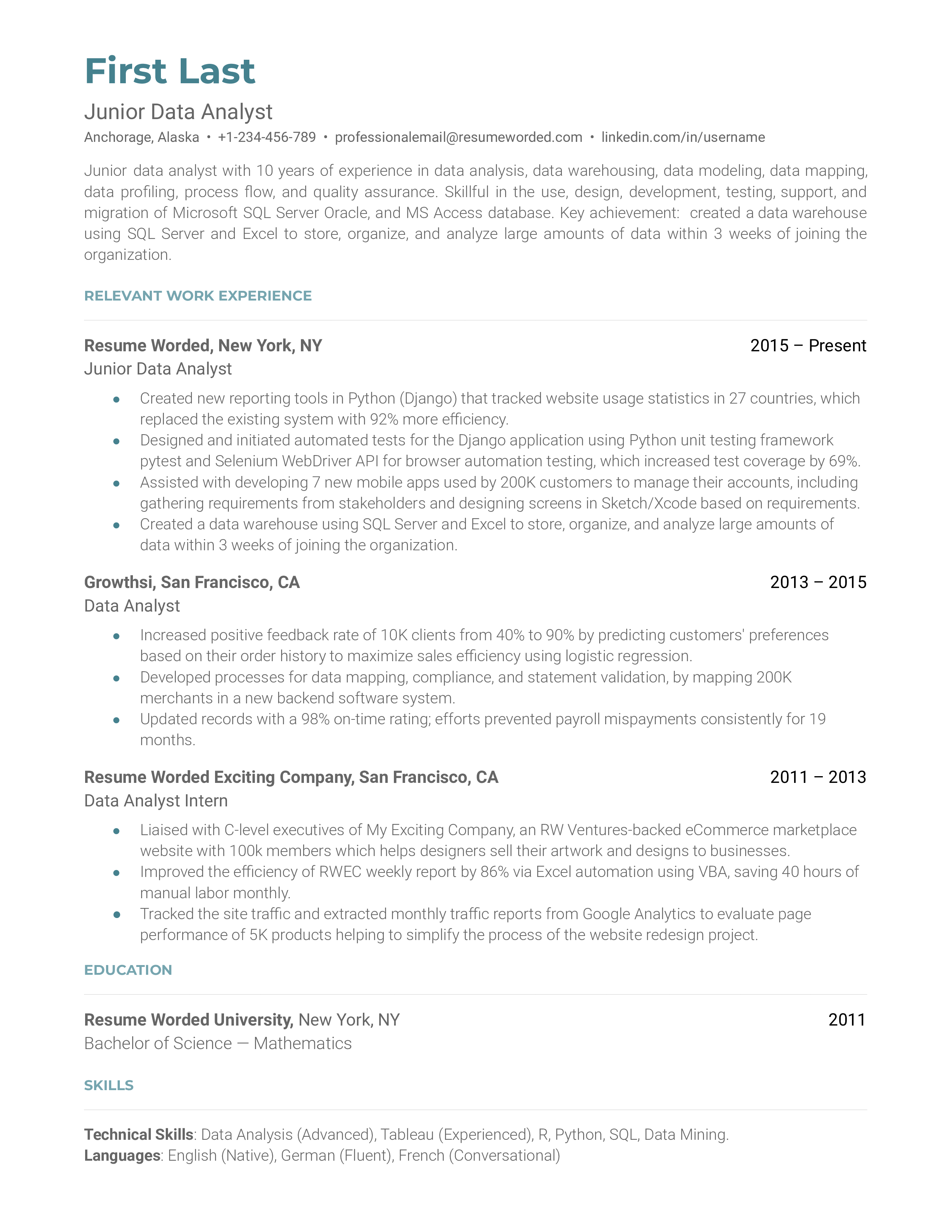
Junior Project Manager
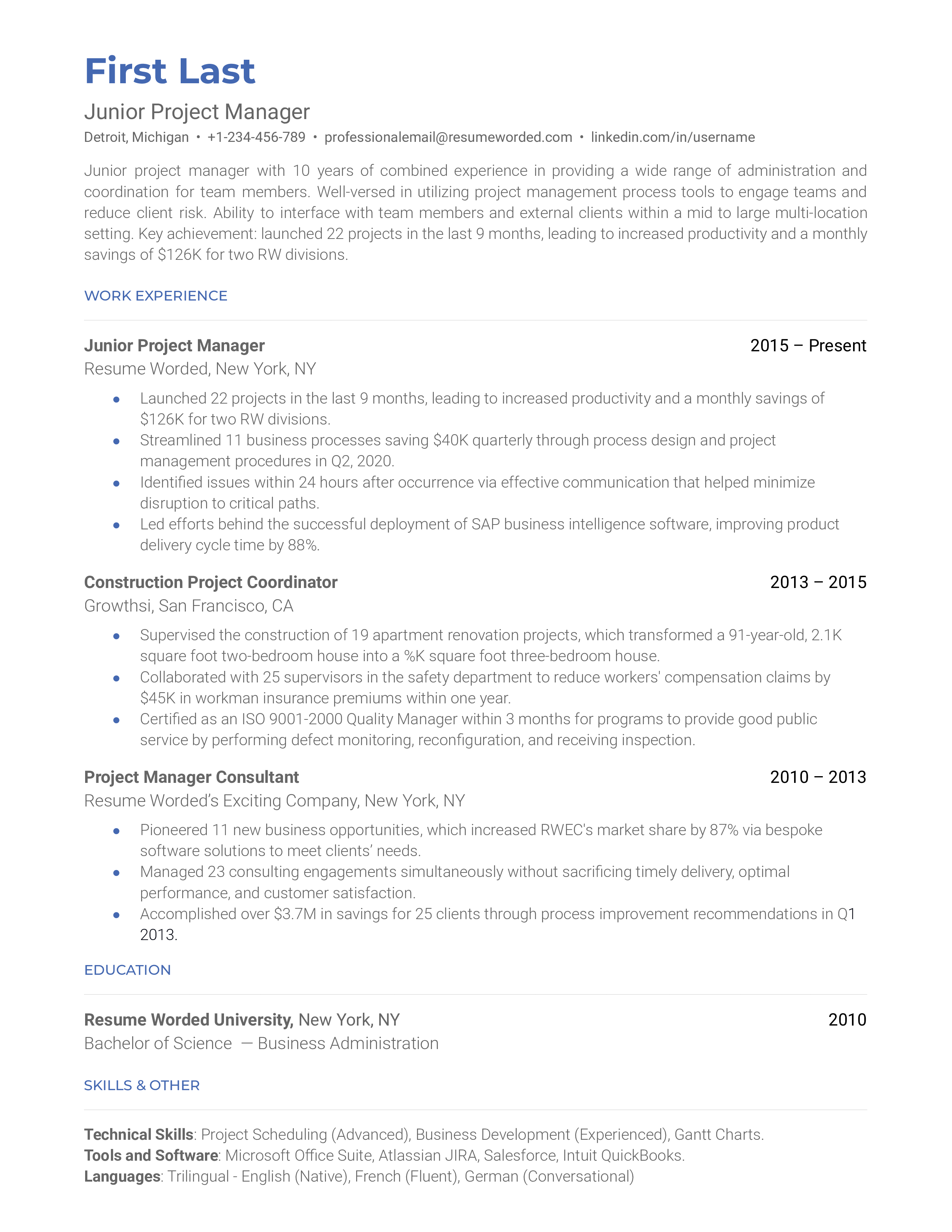
Junior C# Developer
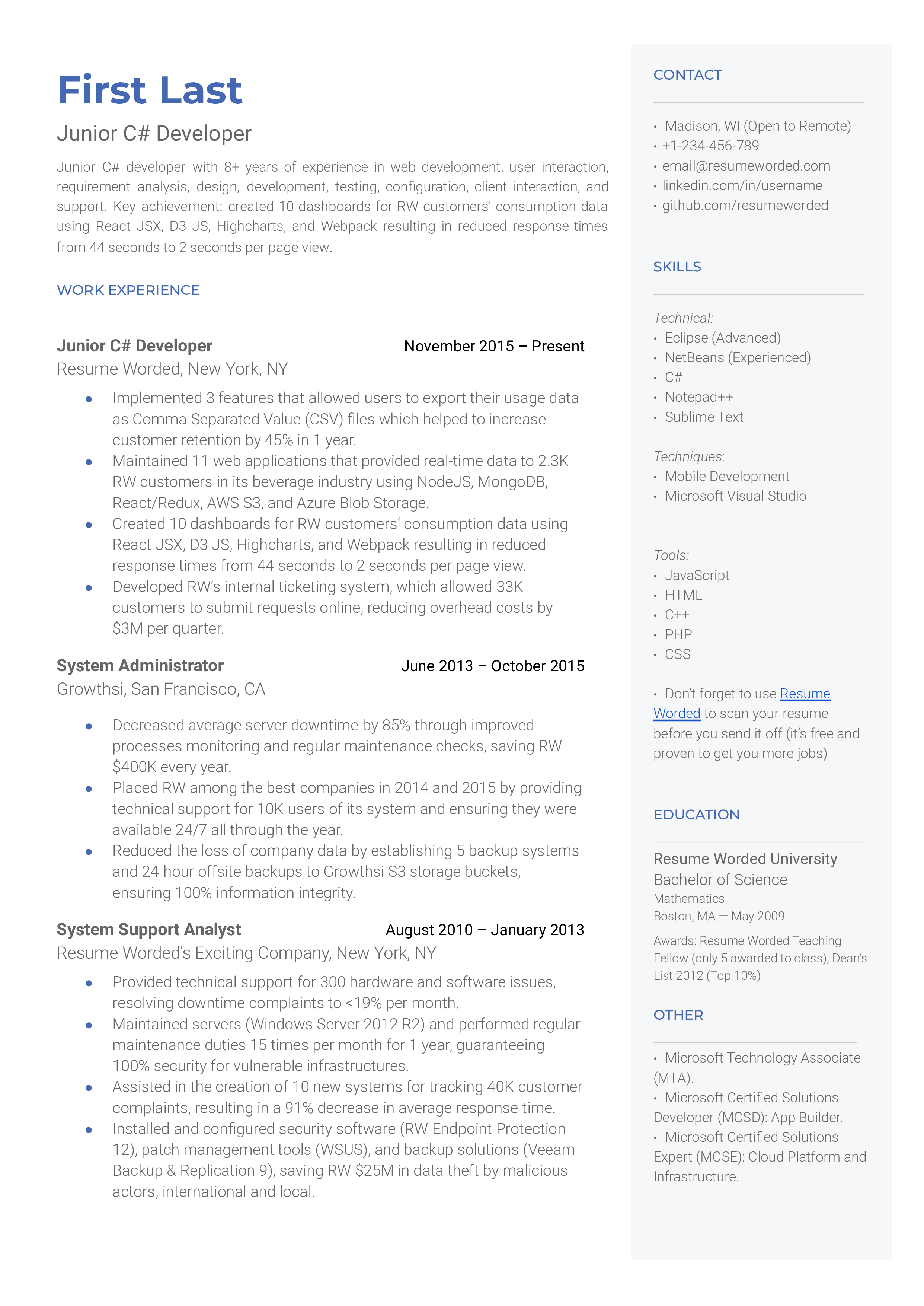
Entry-Level Programmer
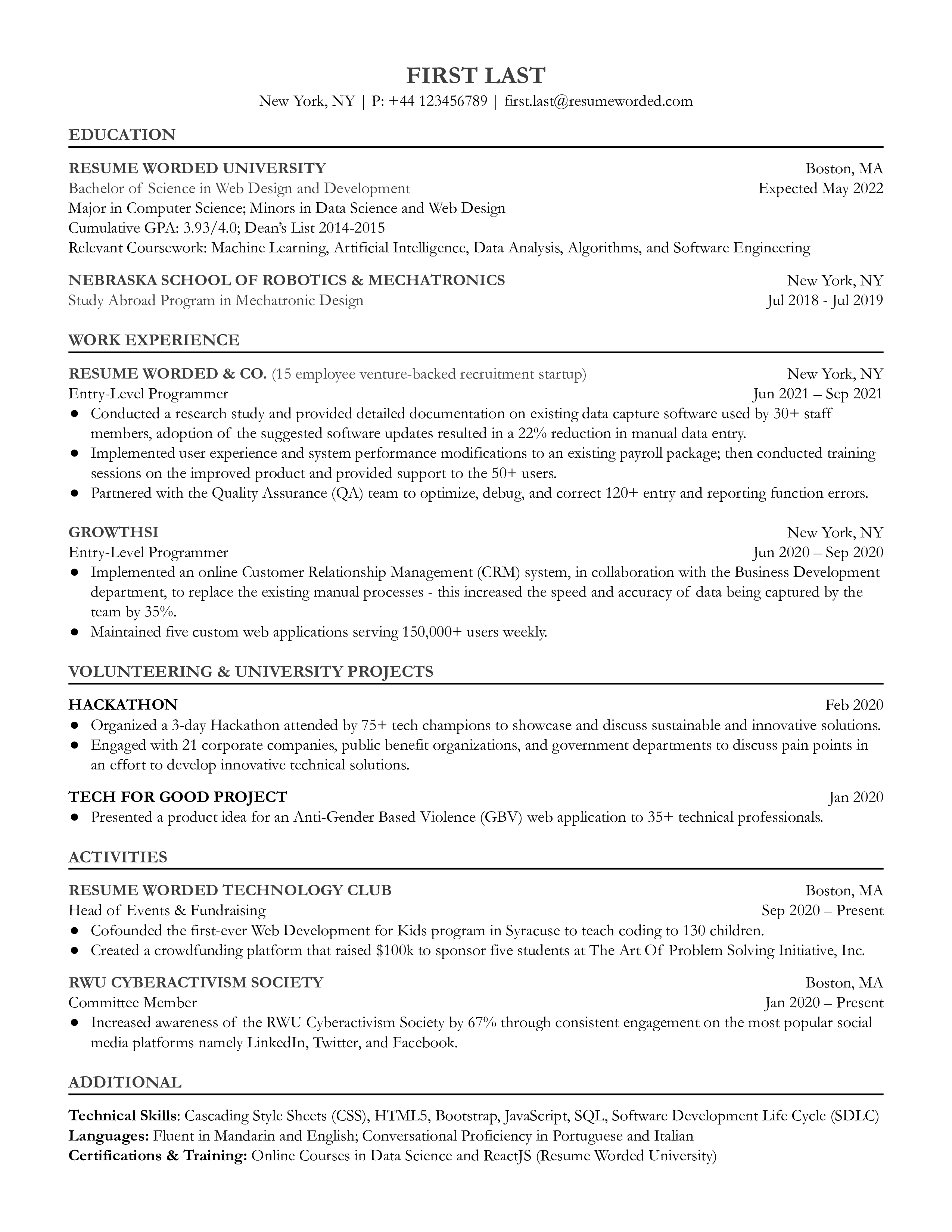
Junior Salesforce Administrator
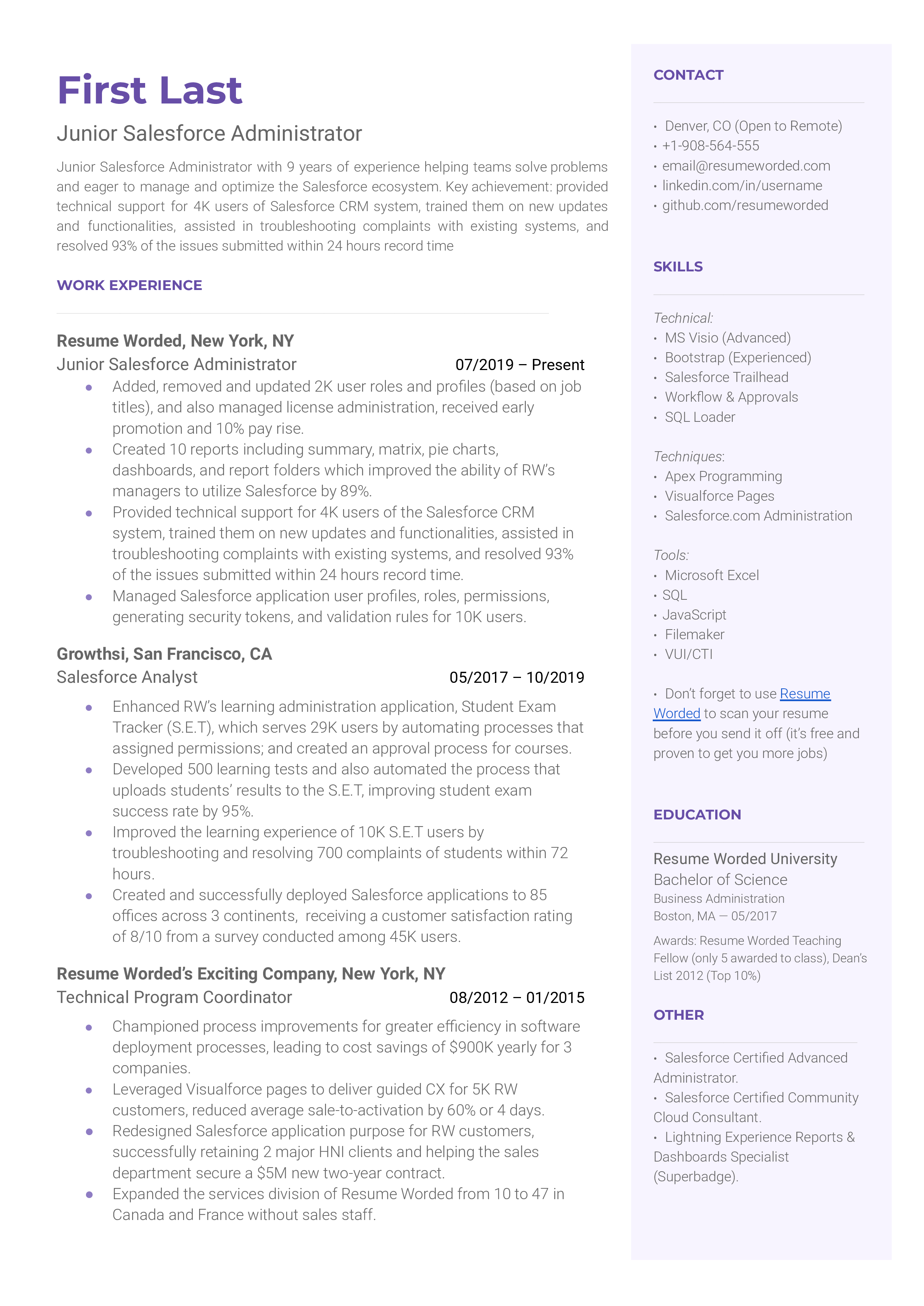
Junior Business Analyst
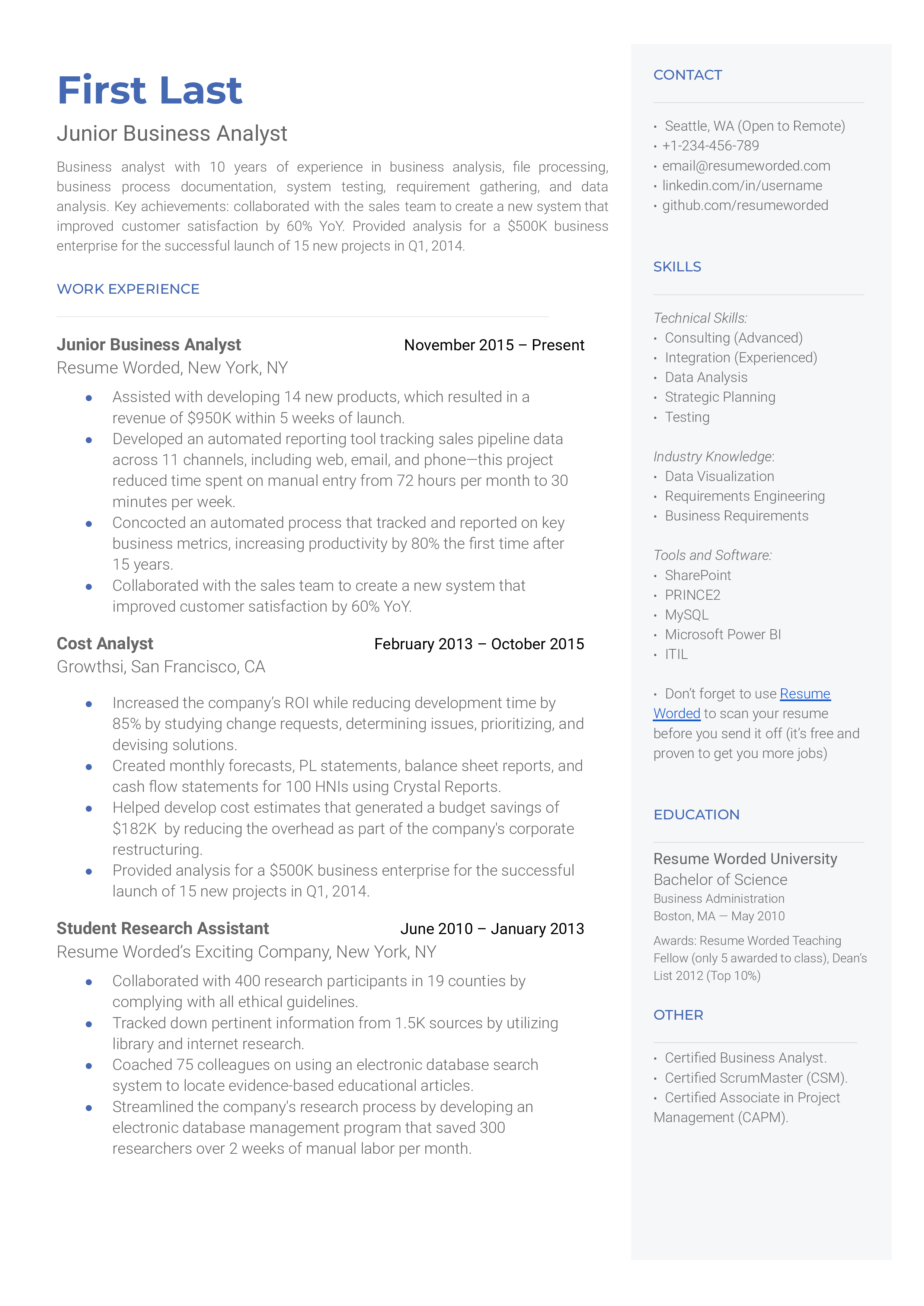
Entry-Level IT Support Specialist
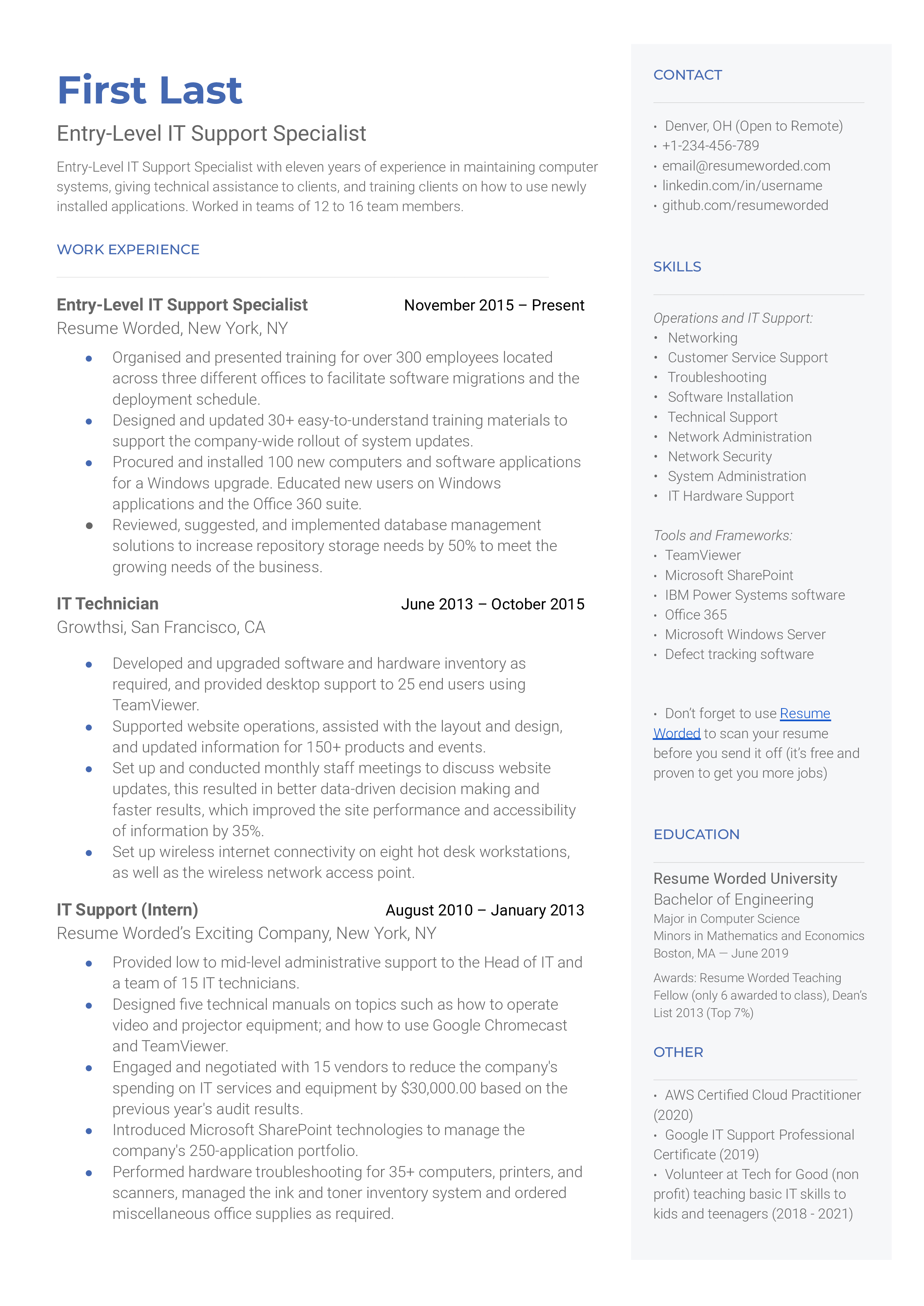
Regulatory Affairs Associate (Entry Level)
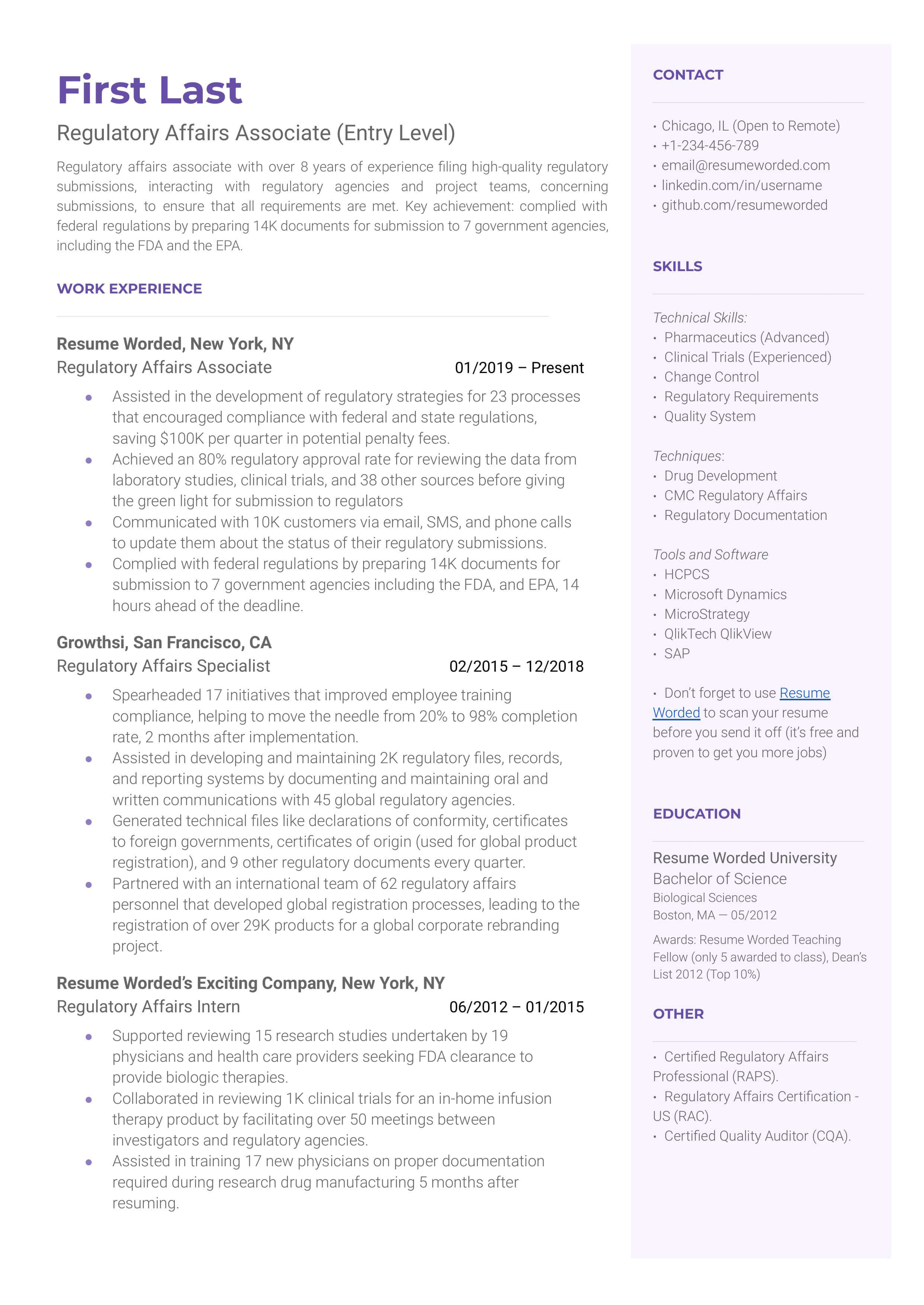
Junior Software Engineer
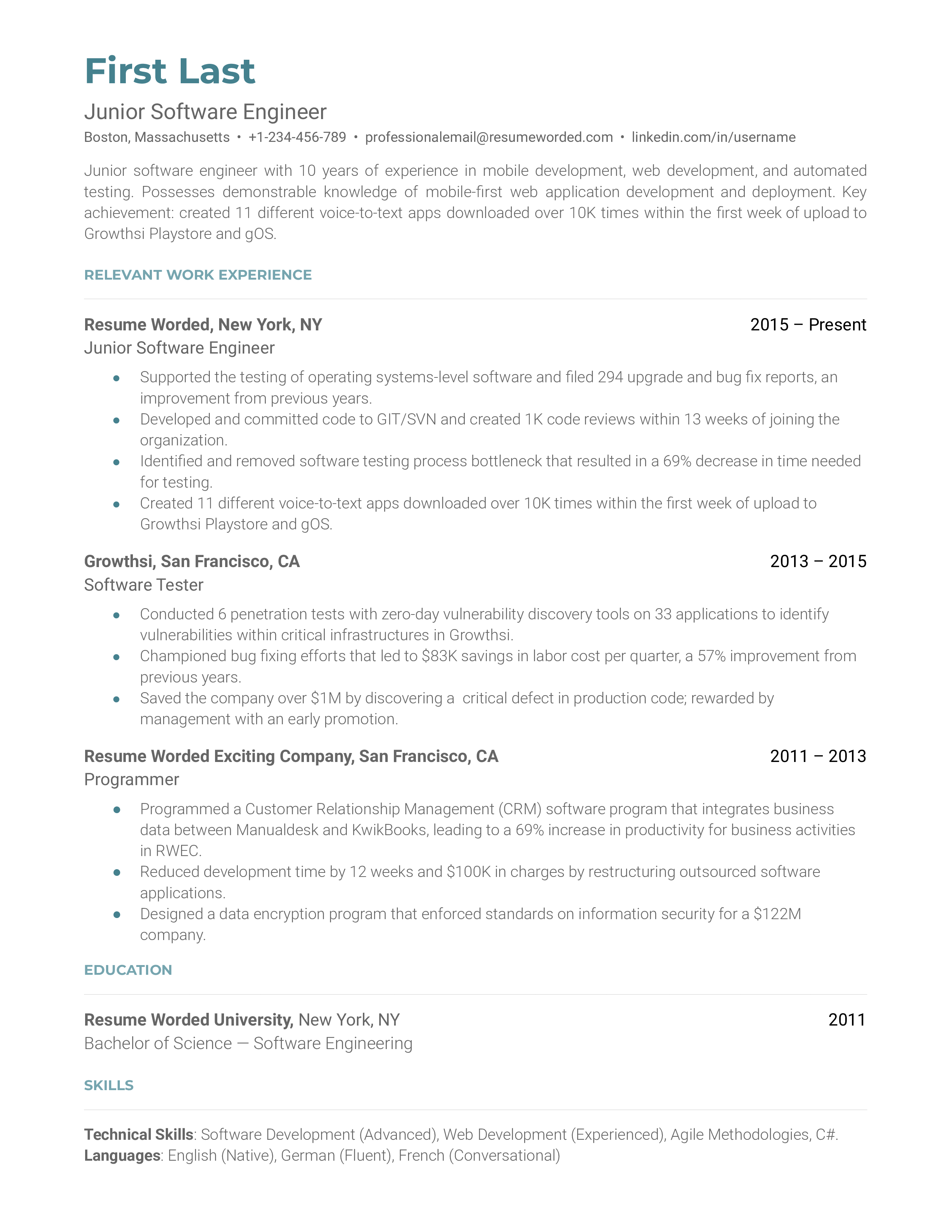
Entry-Level Loan Processor
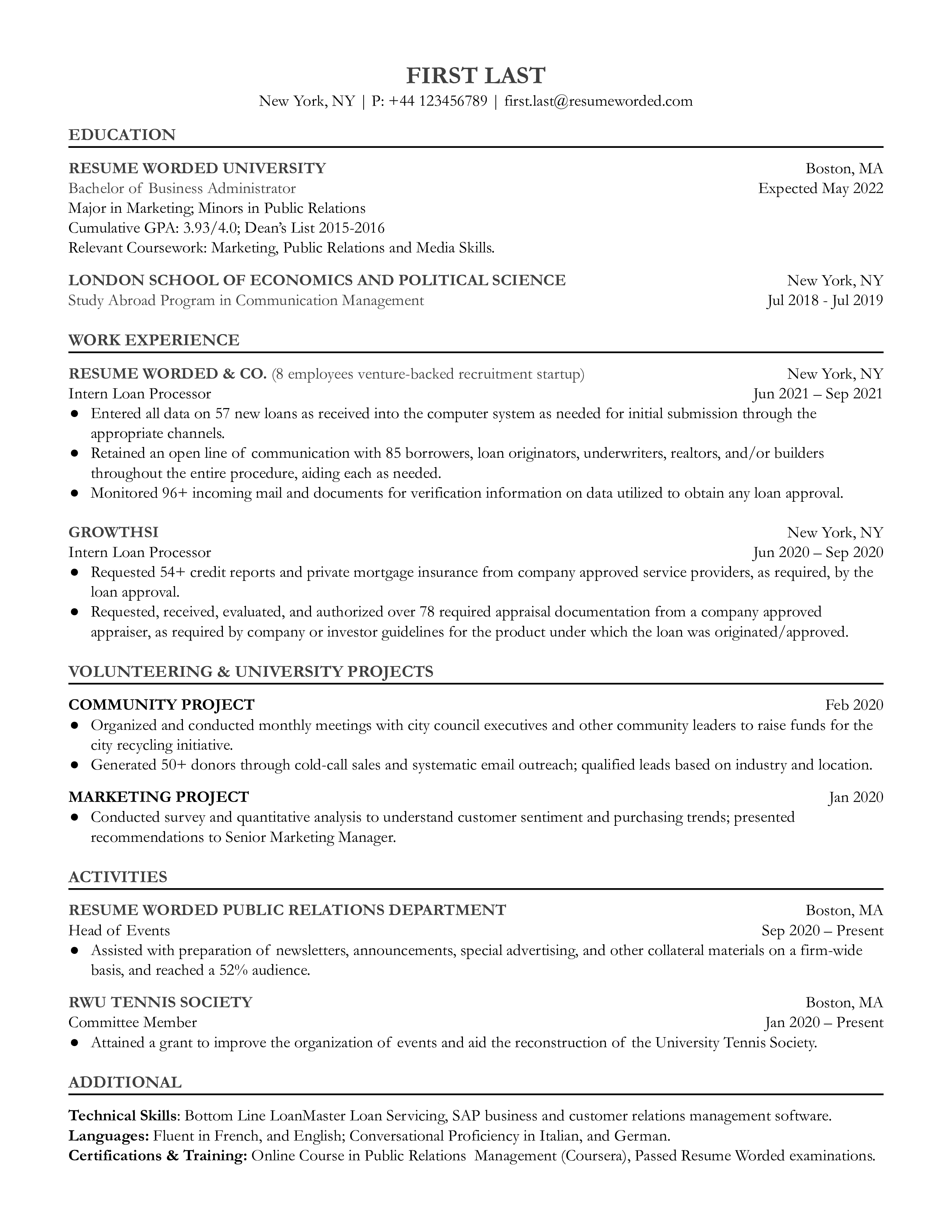
Junior Scrum Master
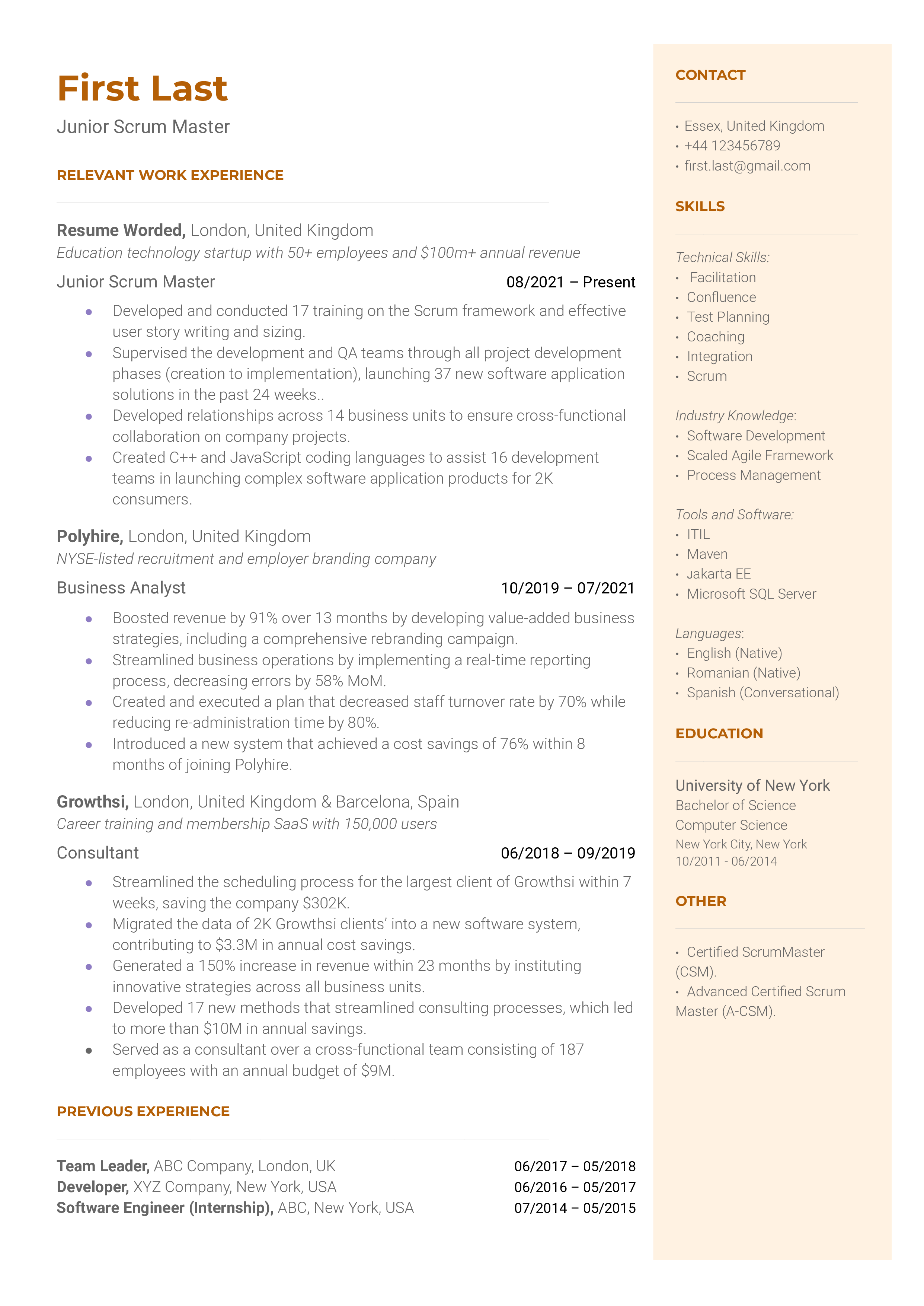
Junior Web Developer
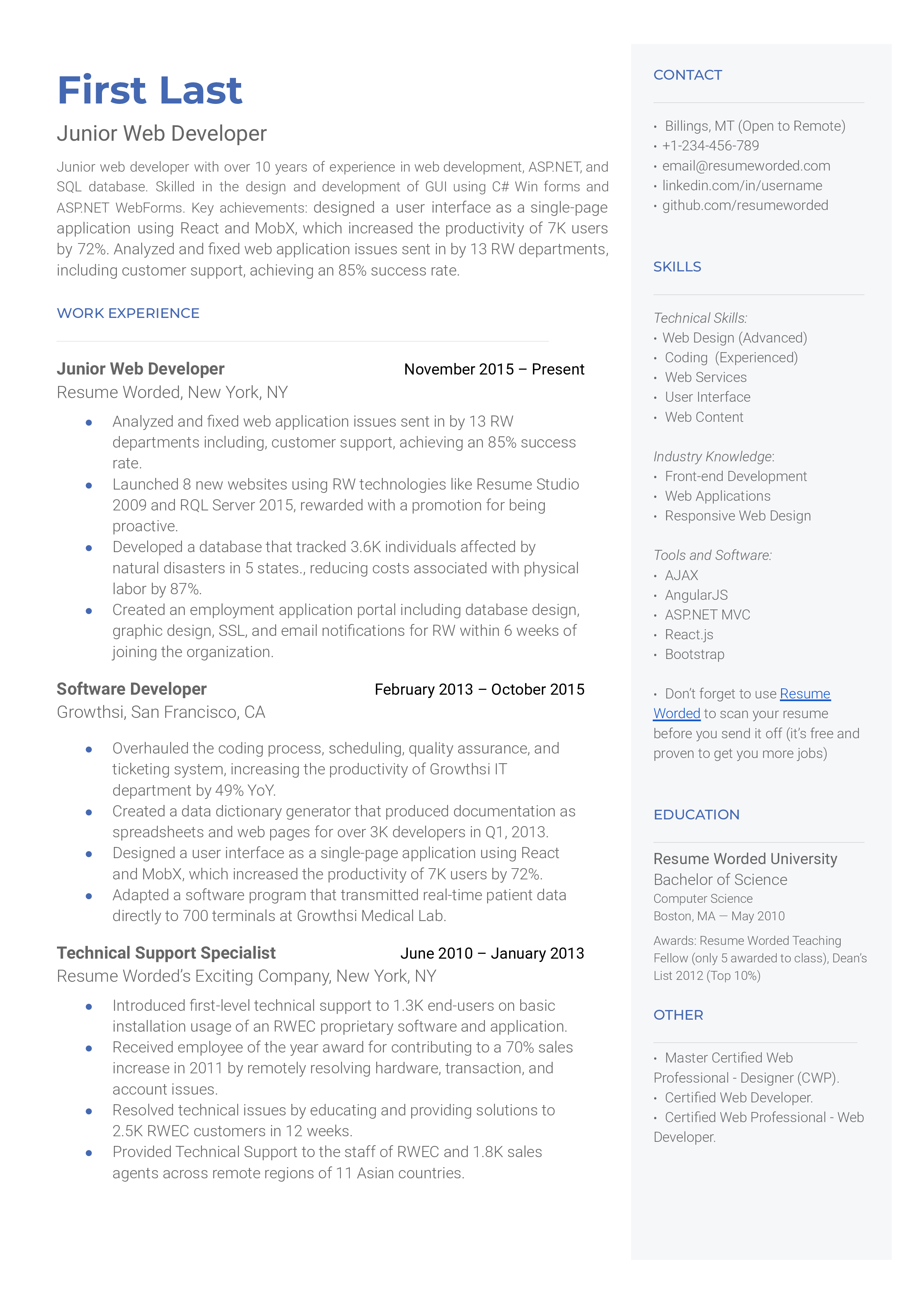
Junior ETL Developer
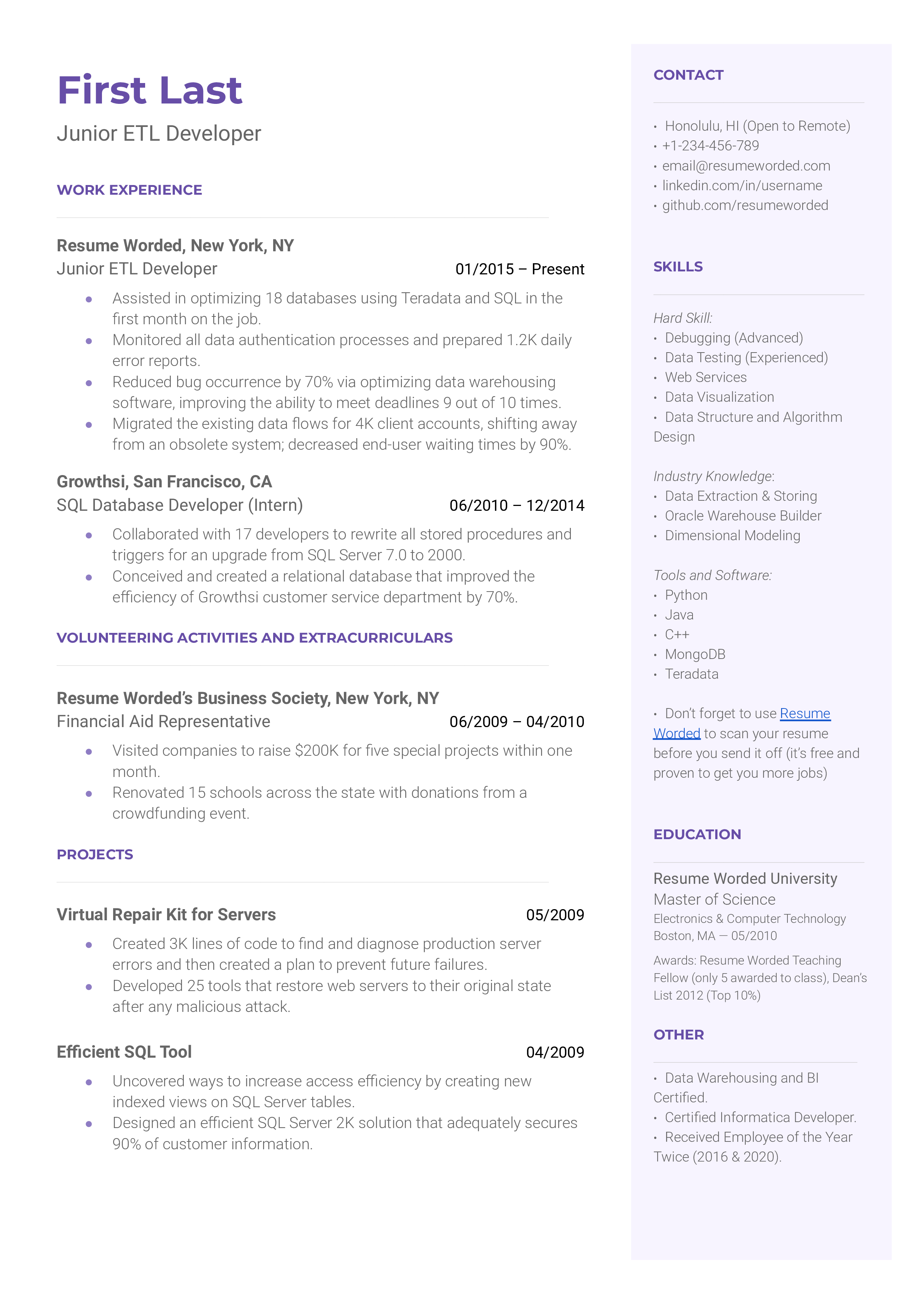
Junior Sharepoint Developer
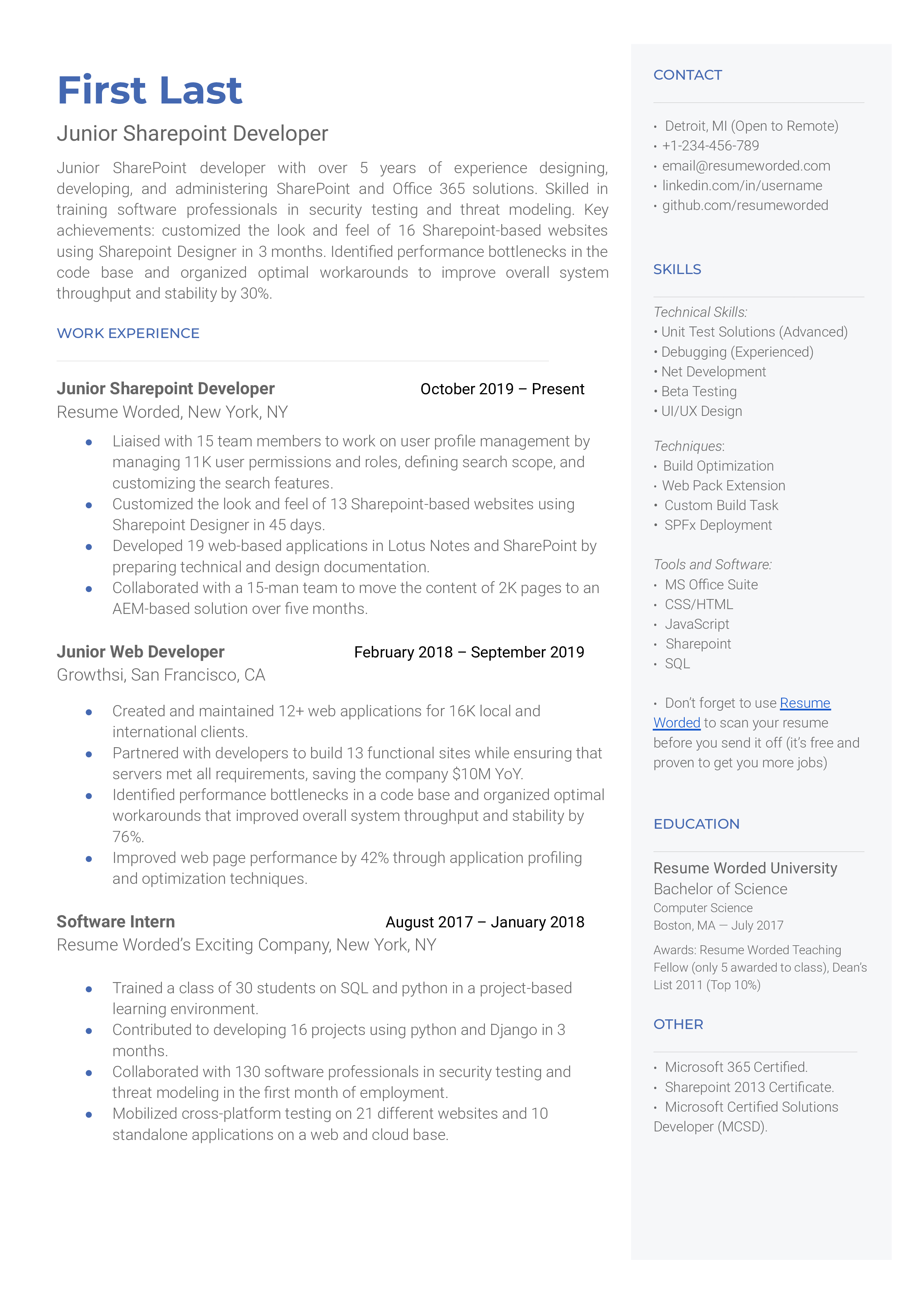
Junior Art Director
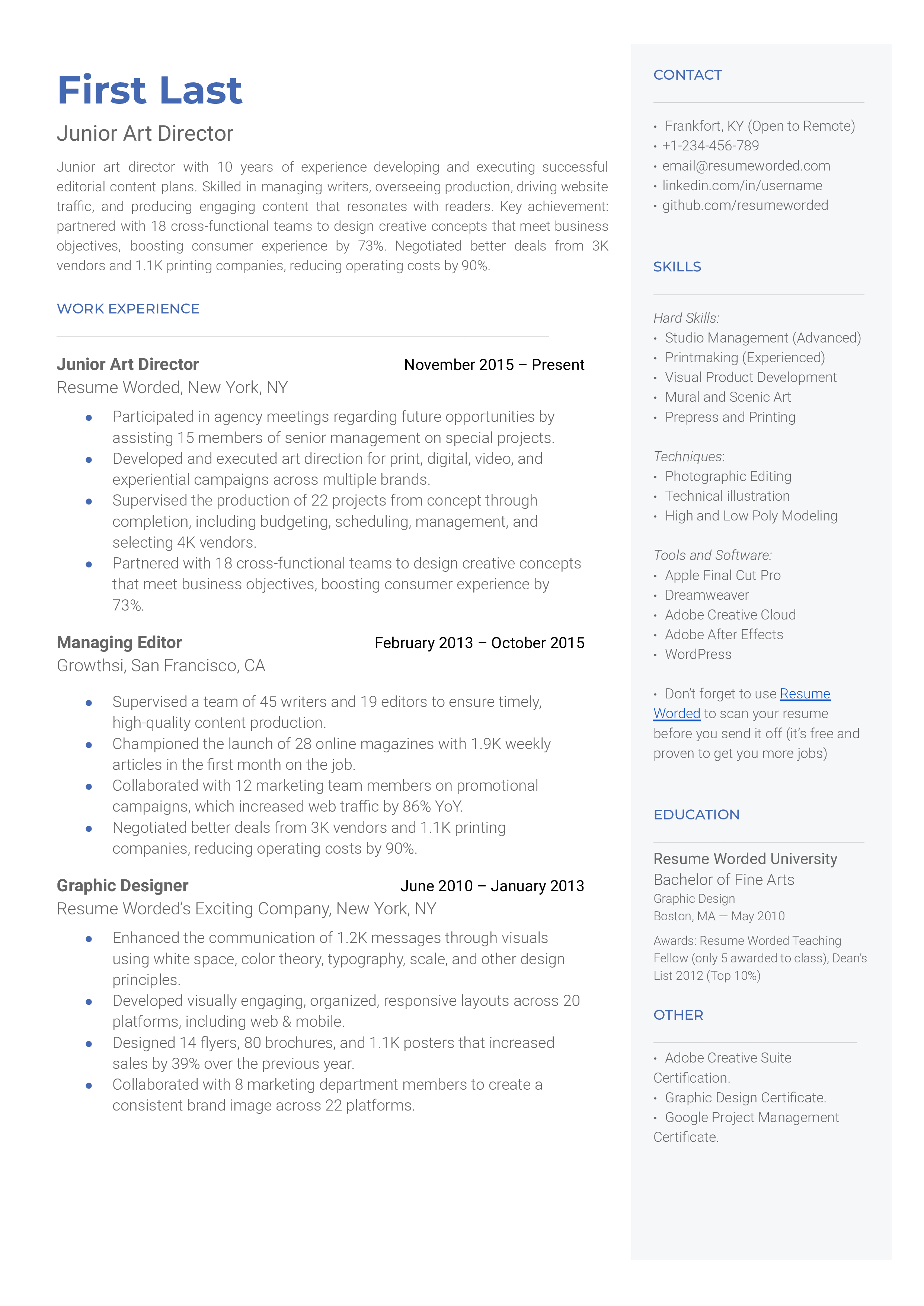
Junior Software Developer
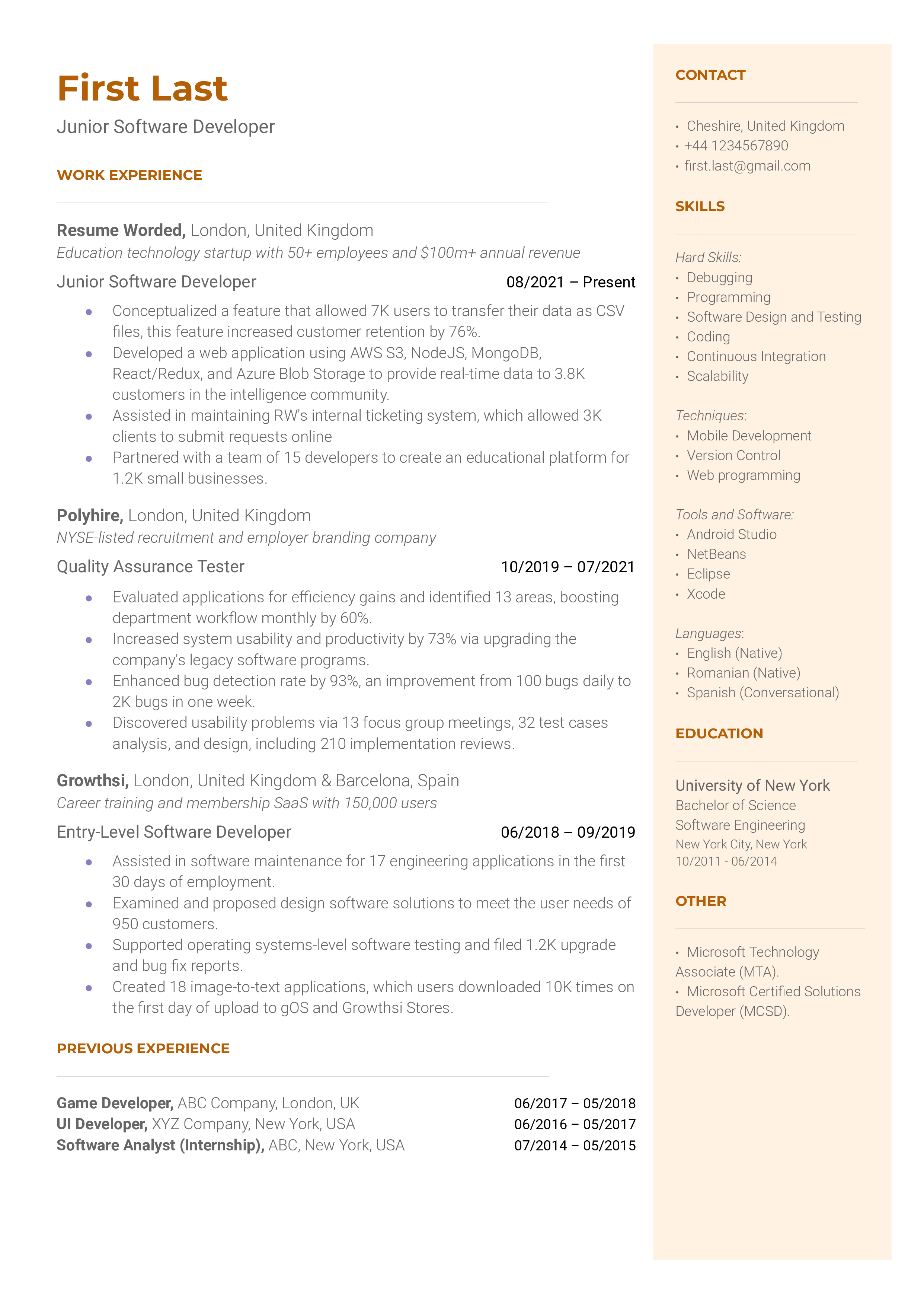
Entry Level Software Developer
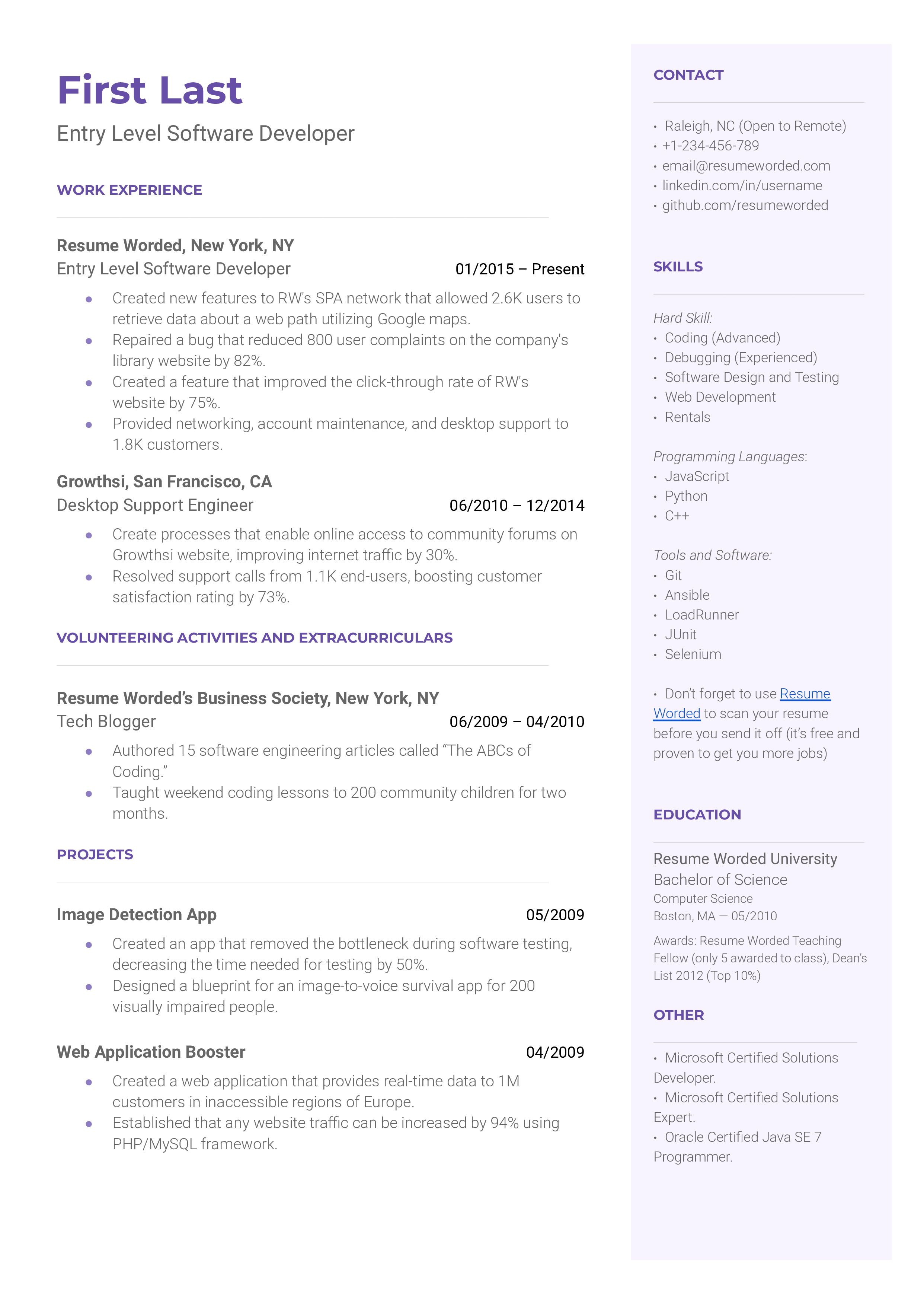
Entry Level Industrial Engineer
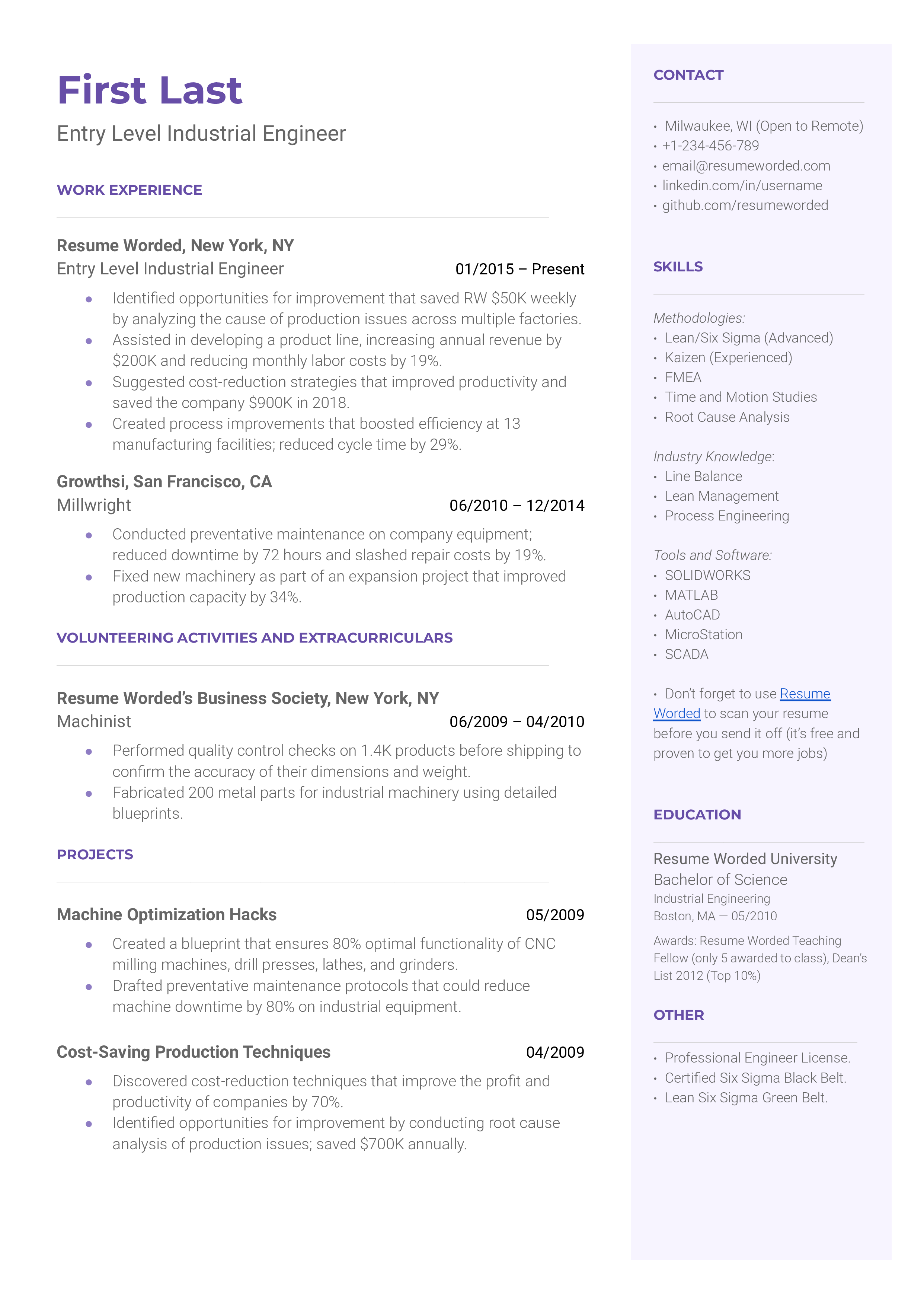
Junior Hadoop Developer
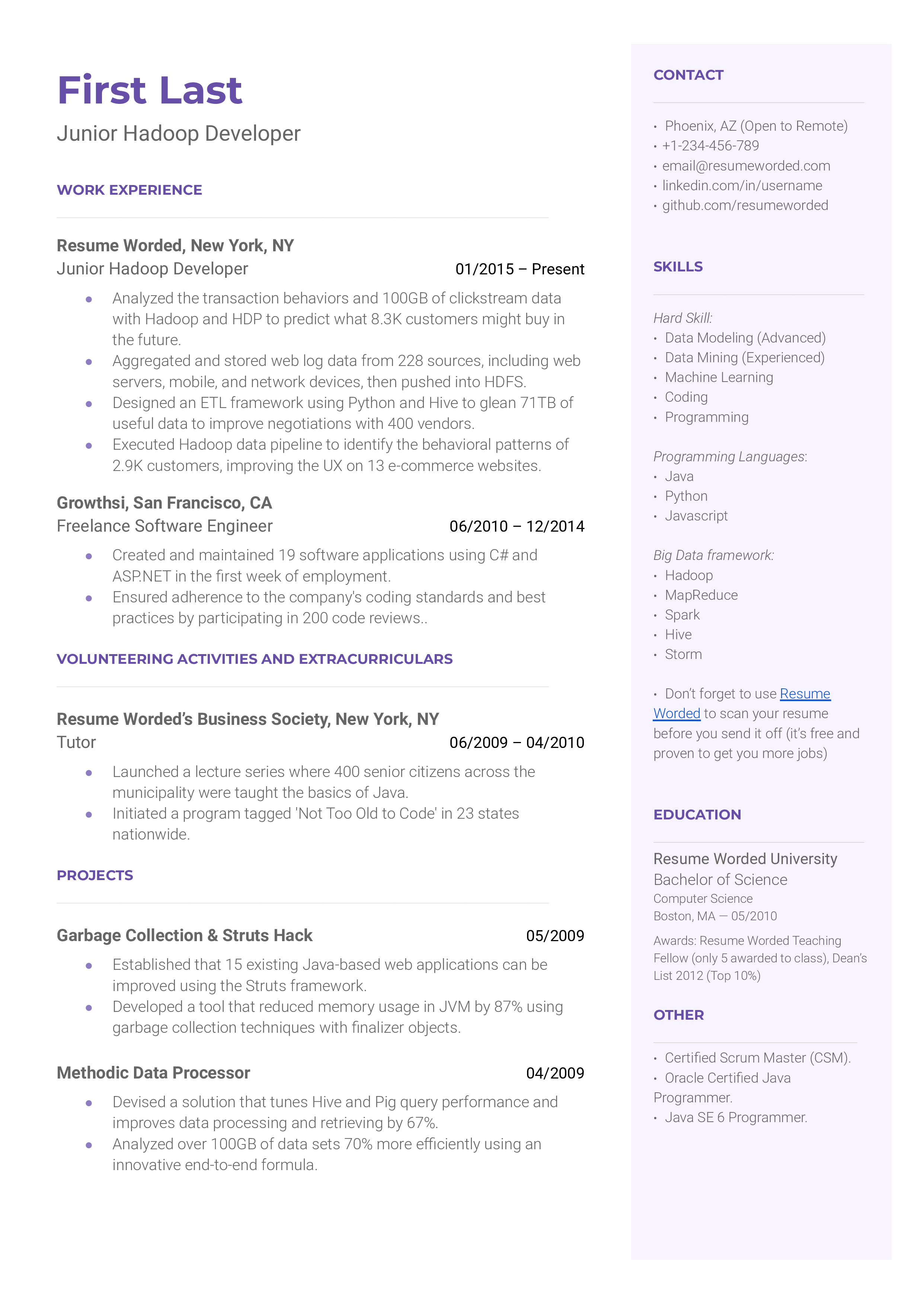
Junior Front End Developer
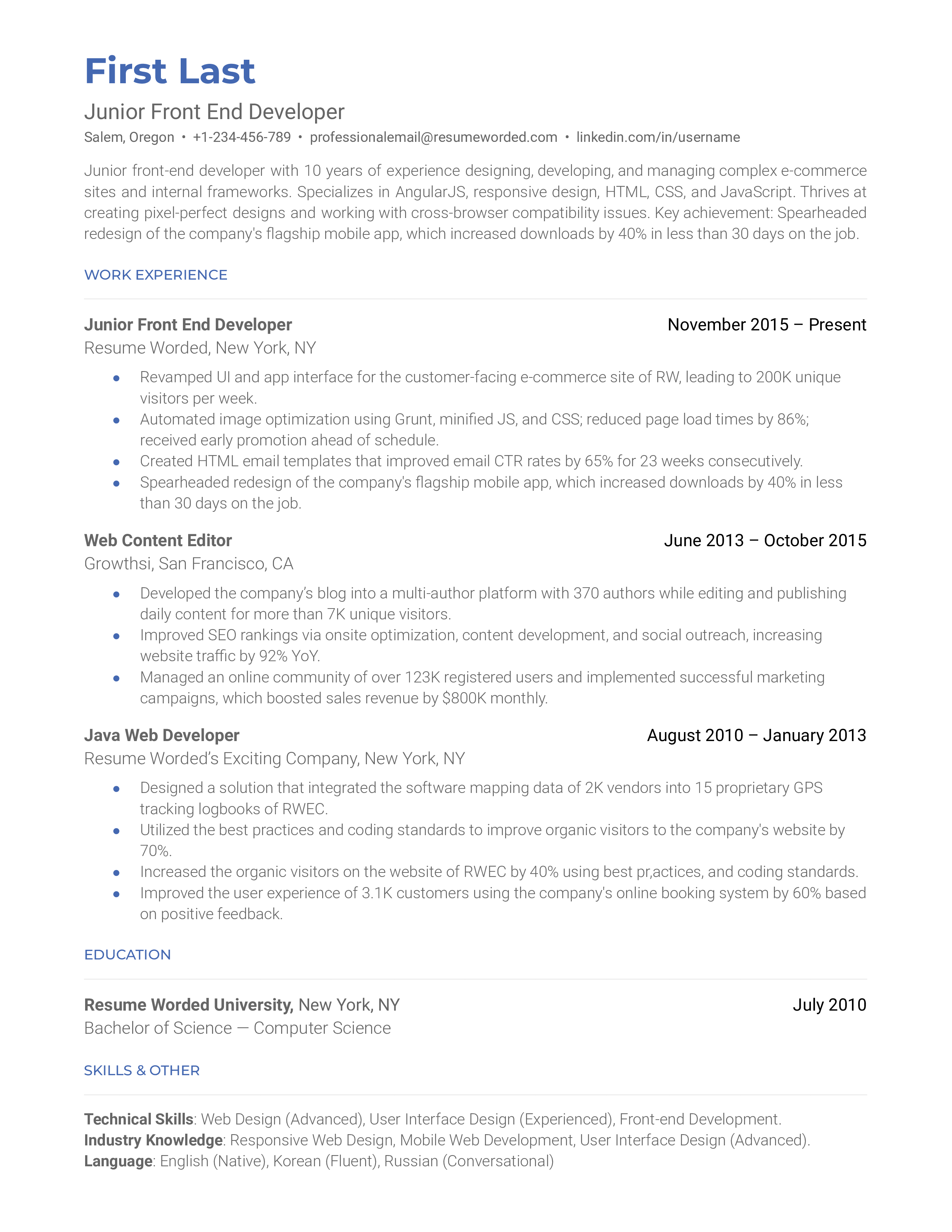
Entry Level Audio Engineer
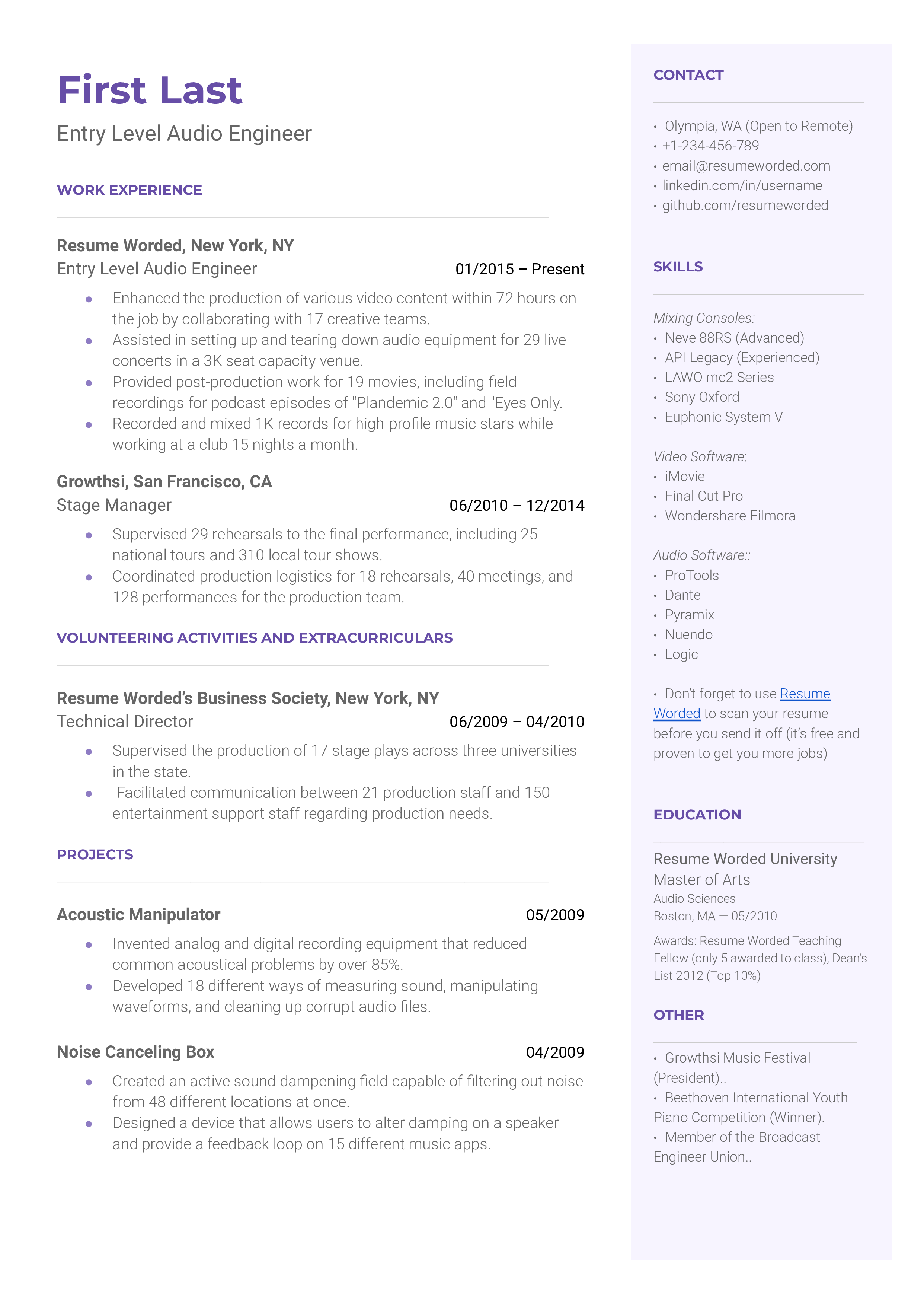
IT Help Desk (Entry Level)
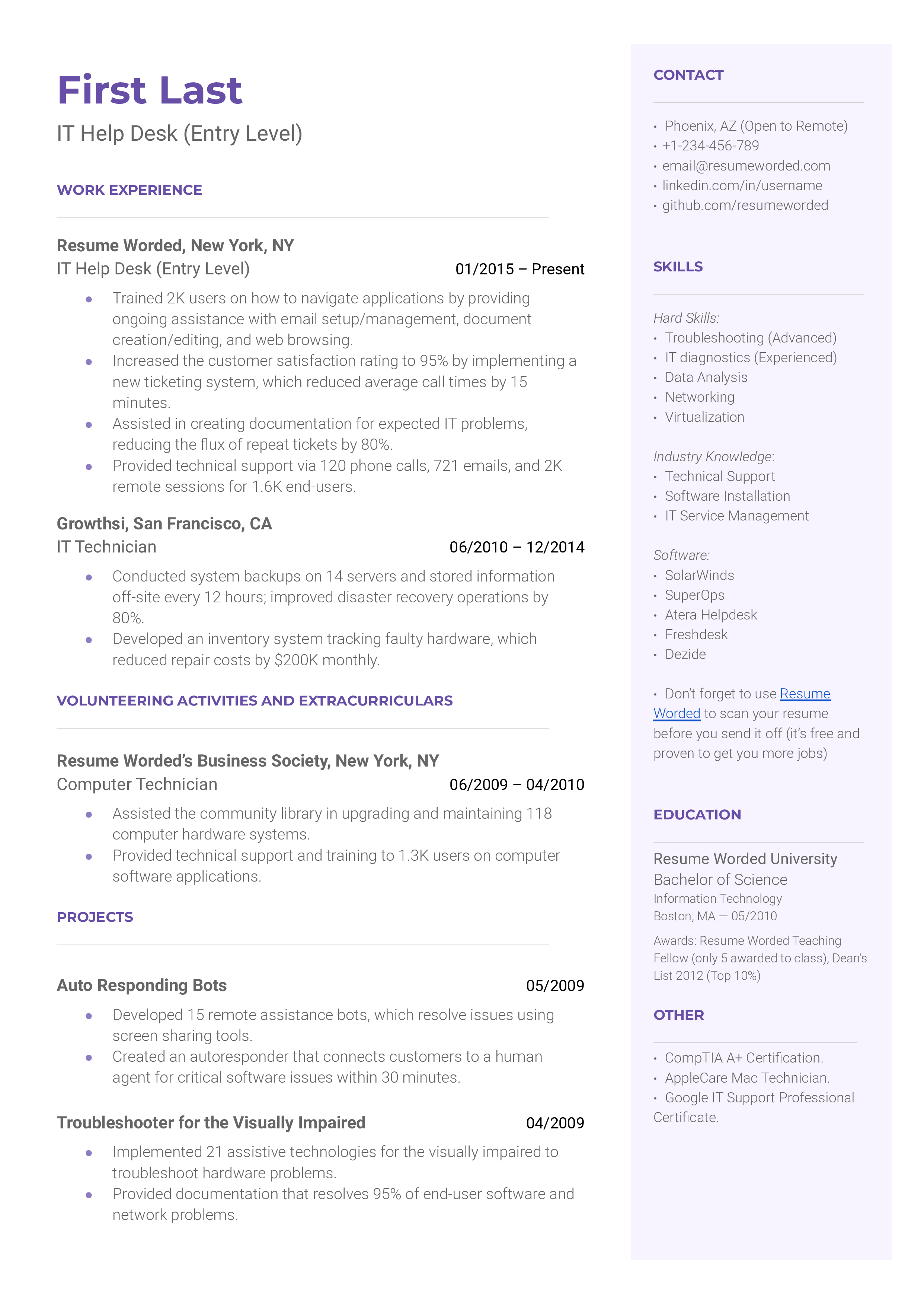
Entry-Level Executive Assistant
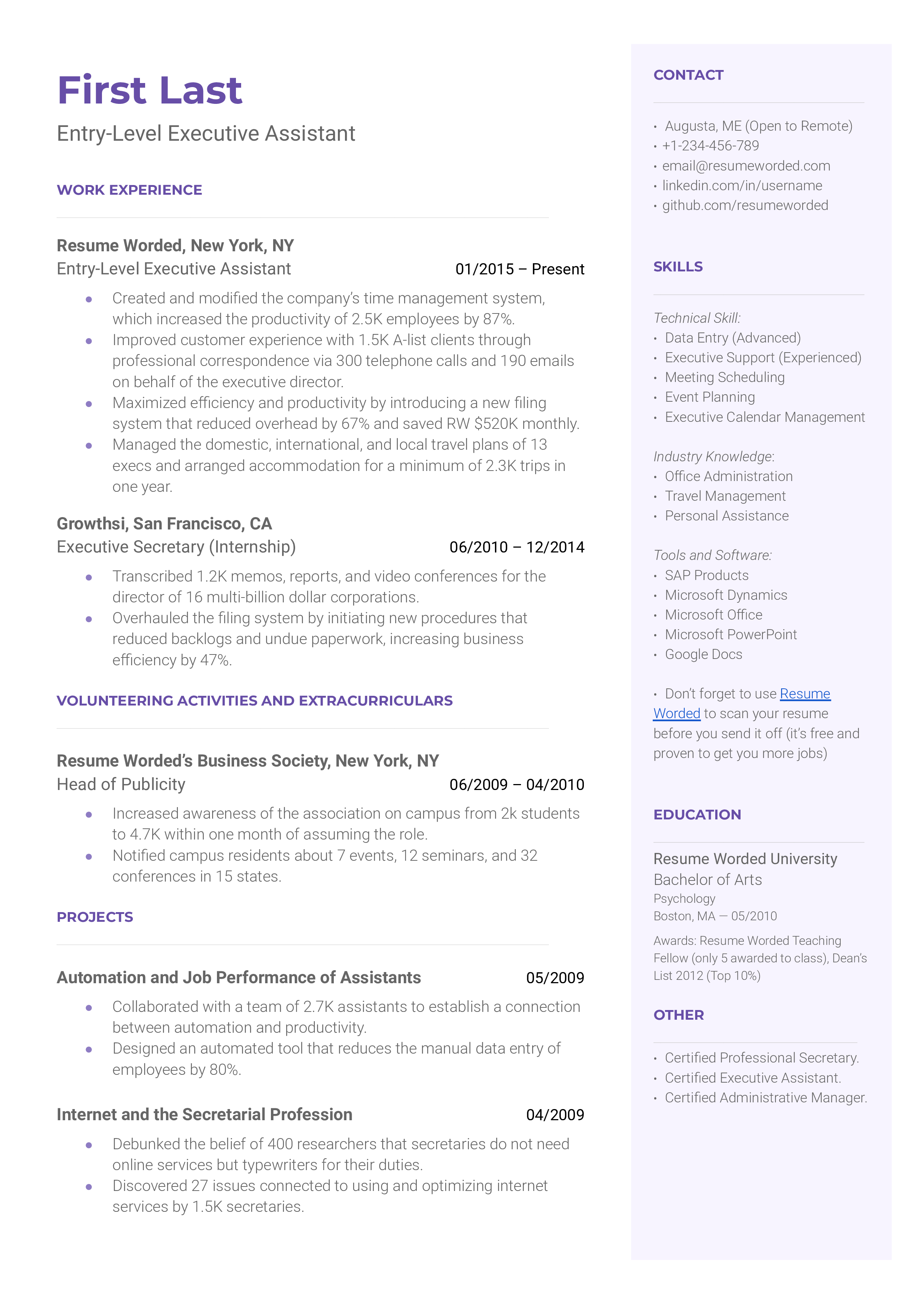
Entry-Level Occupational Therapist
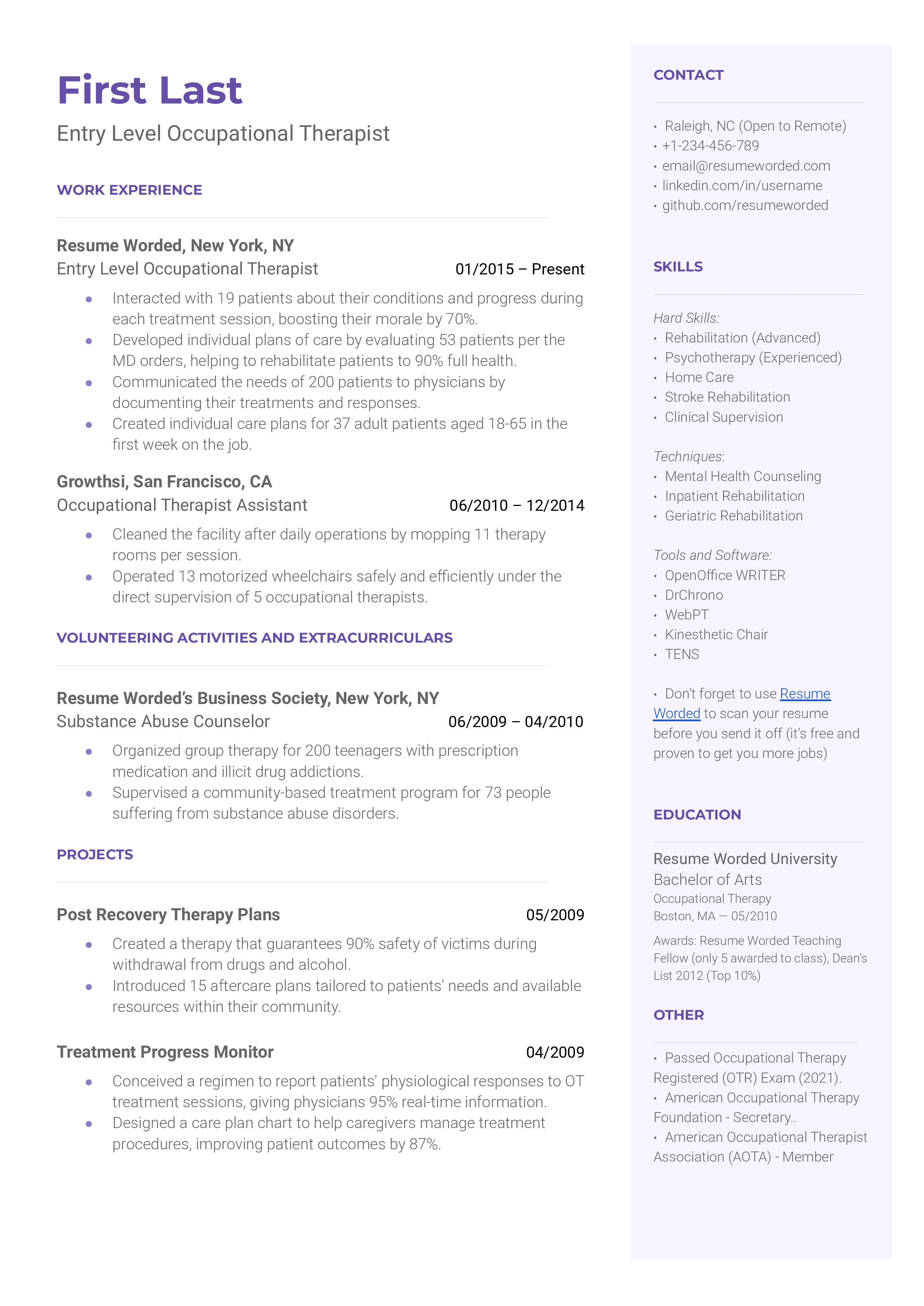
Entry-Level Product Owner
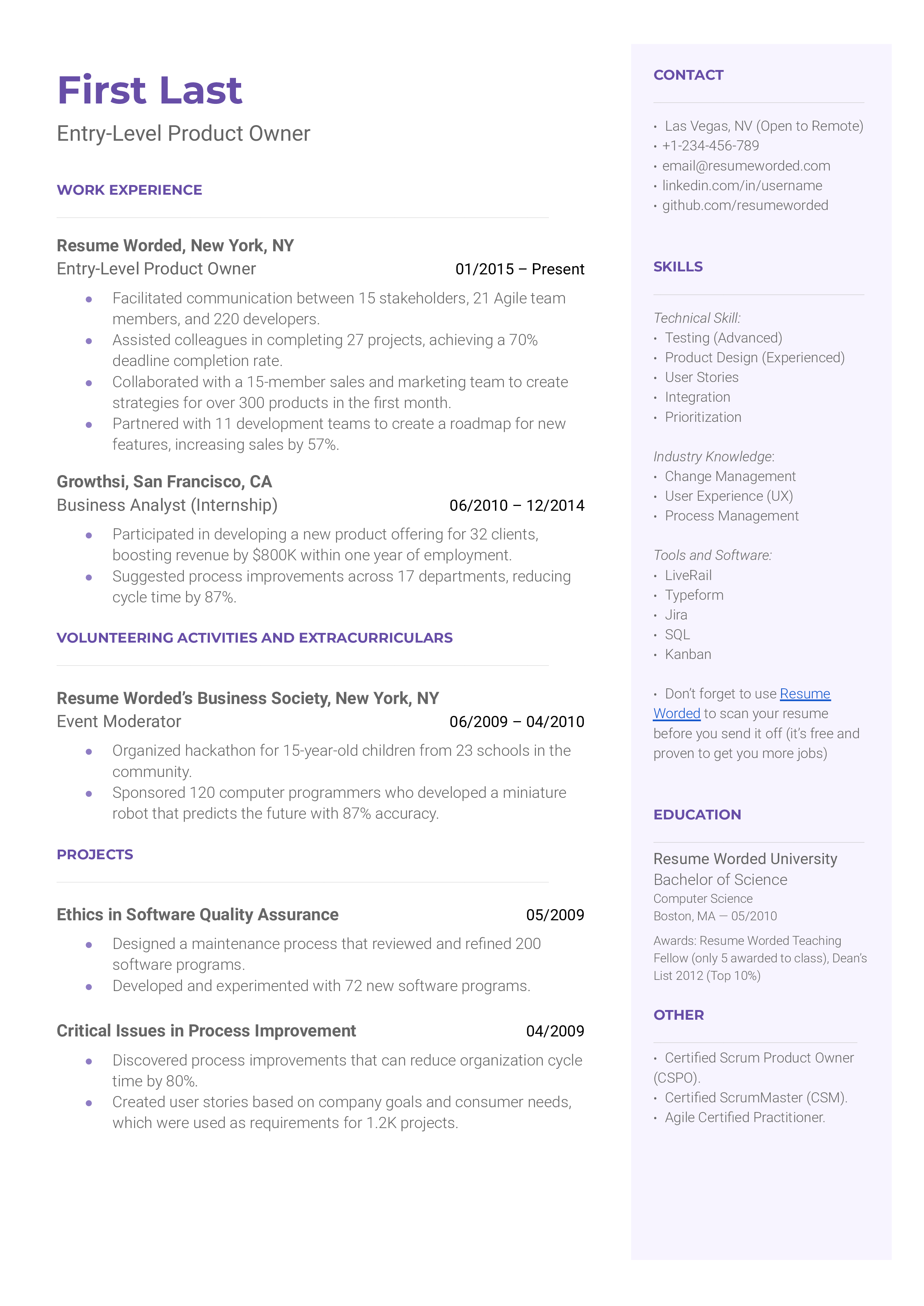
Junior Accountant
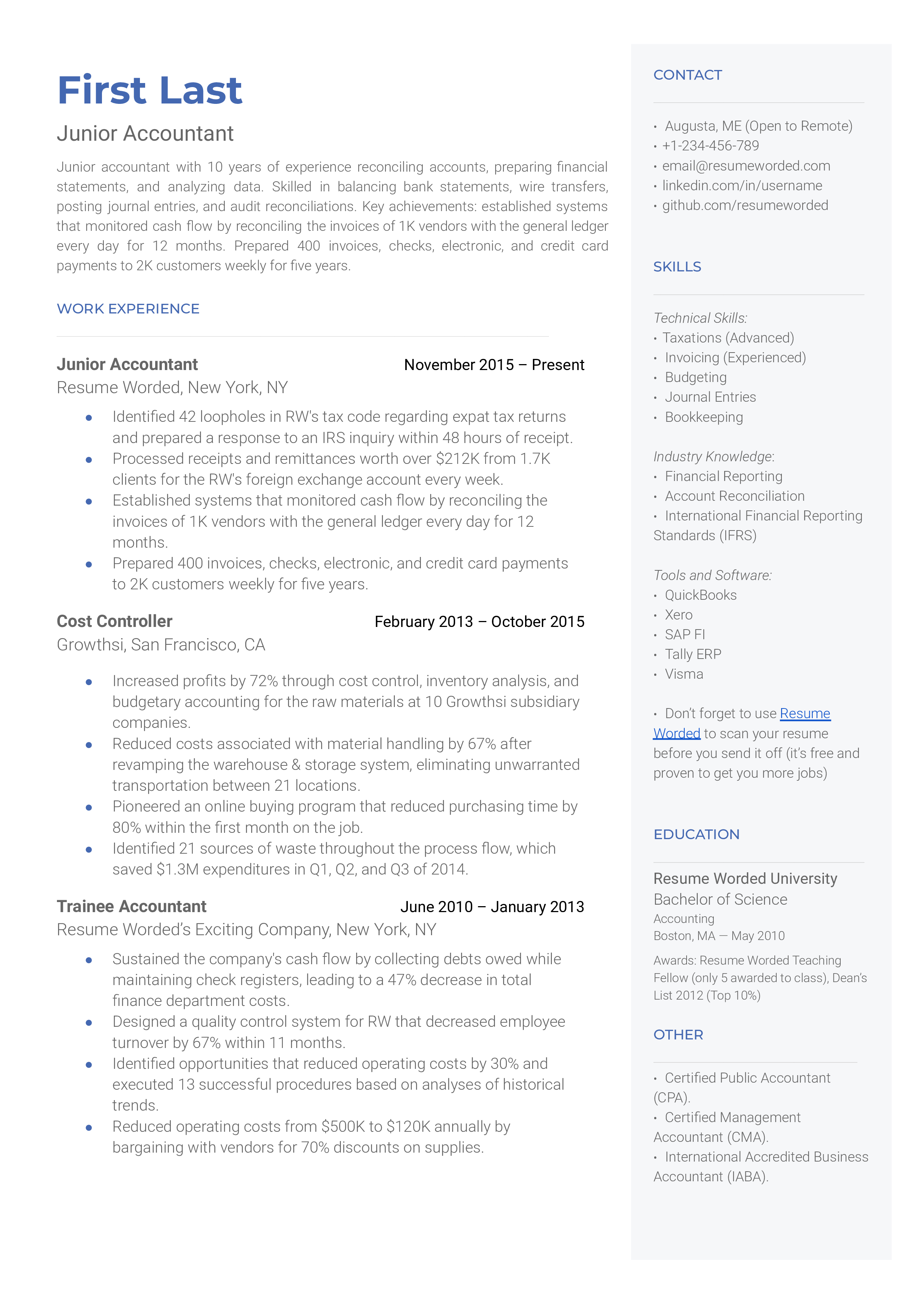
Junior Finance Executive
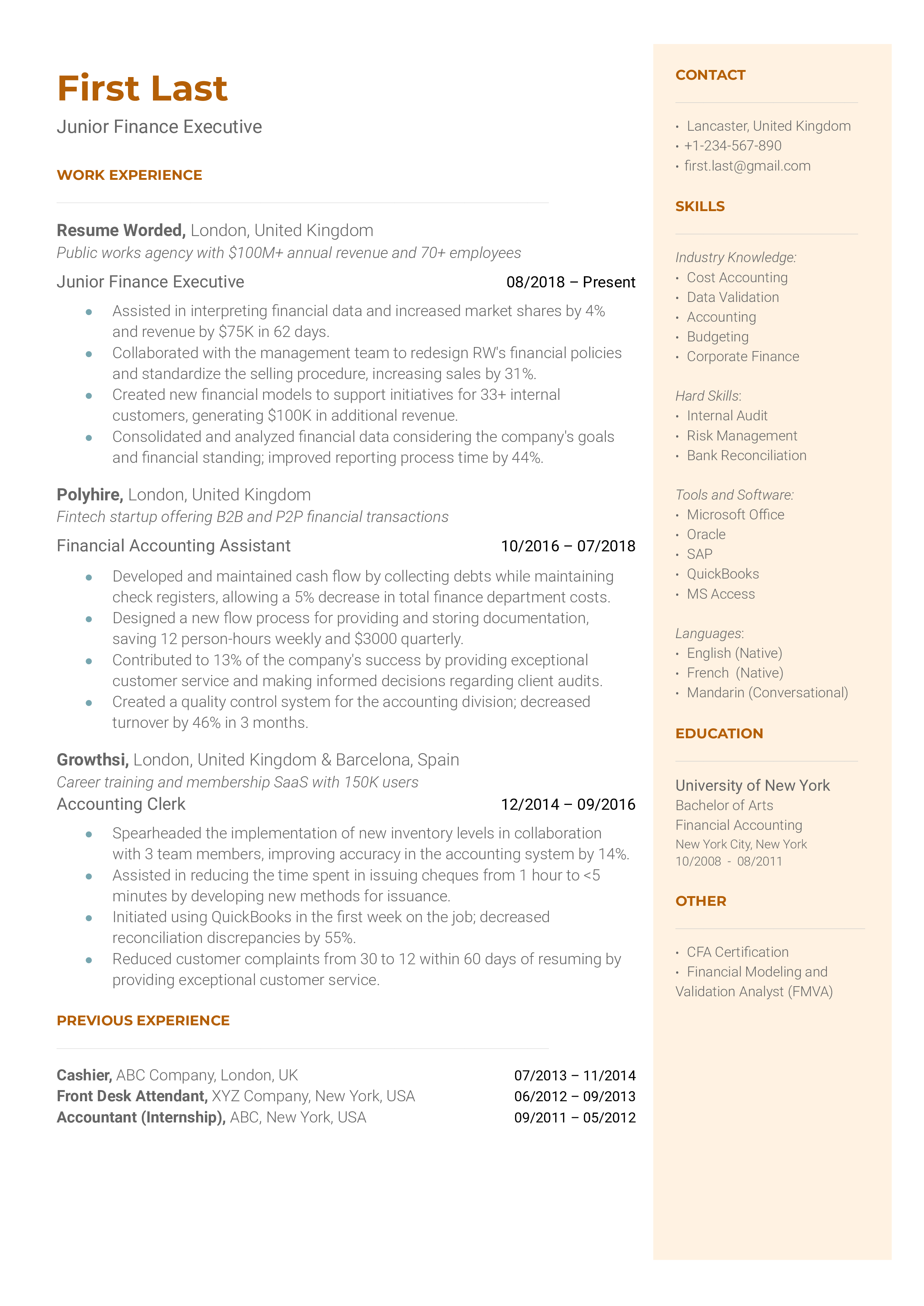
Entry-Level Technical Writer
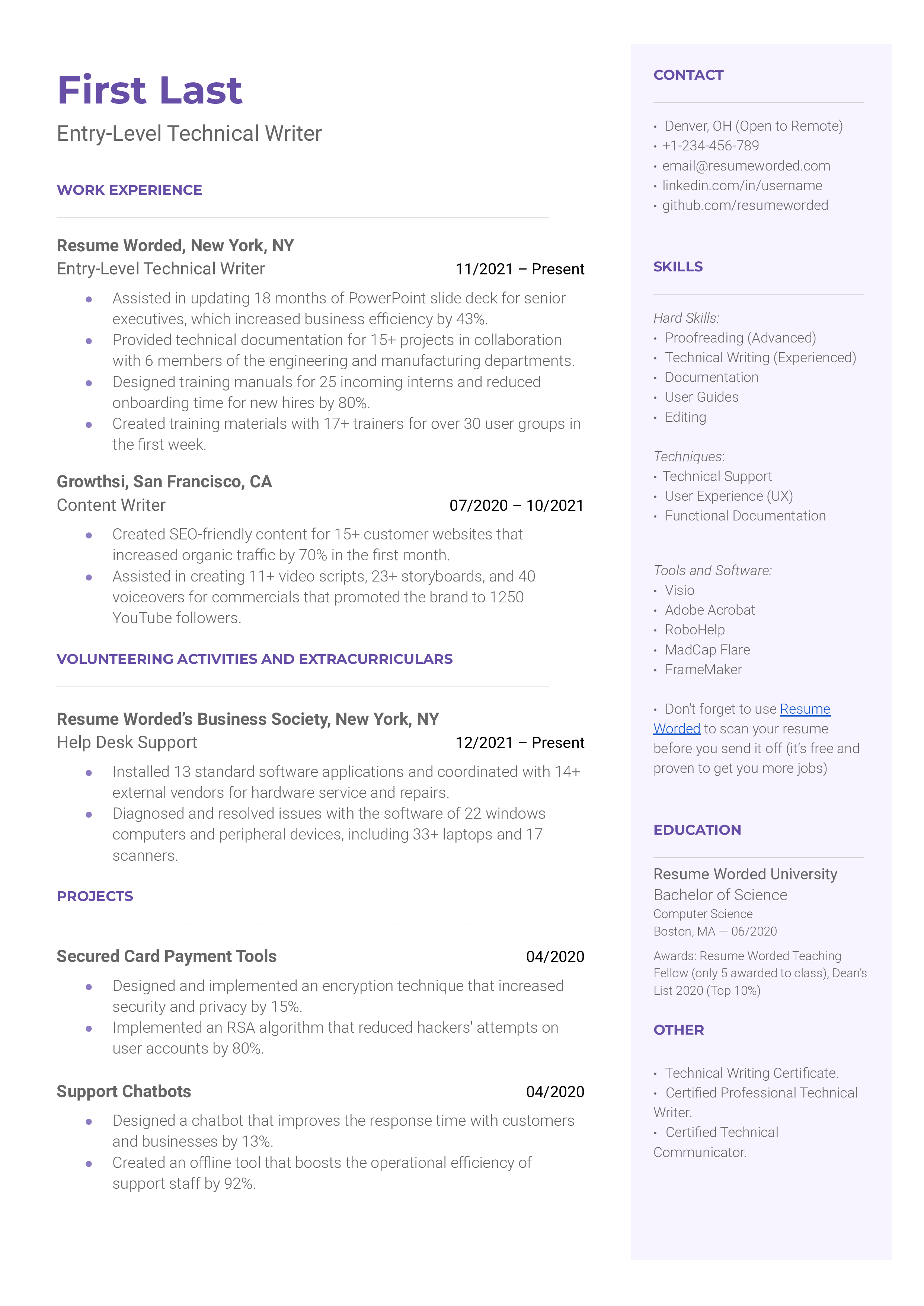

Entry Level Biomedical Engineer
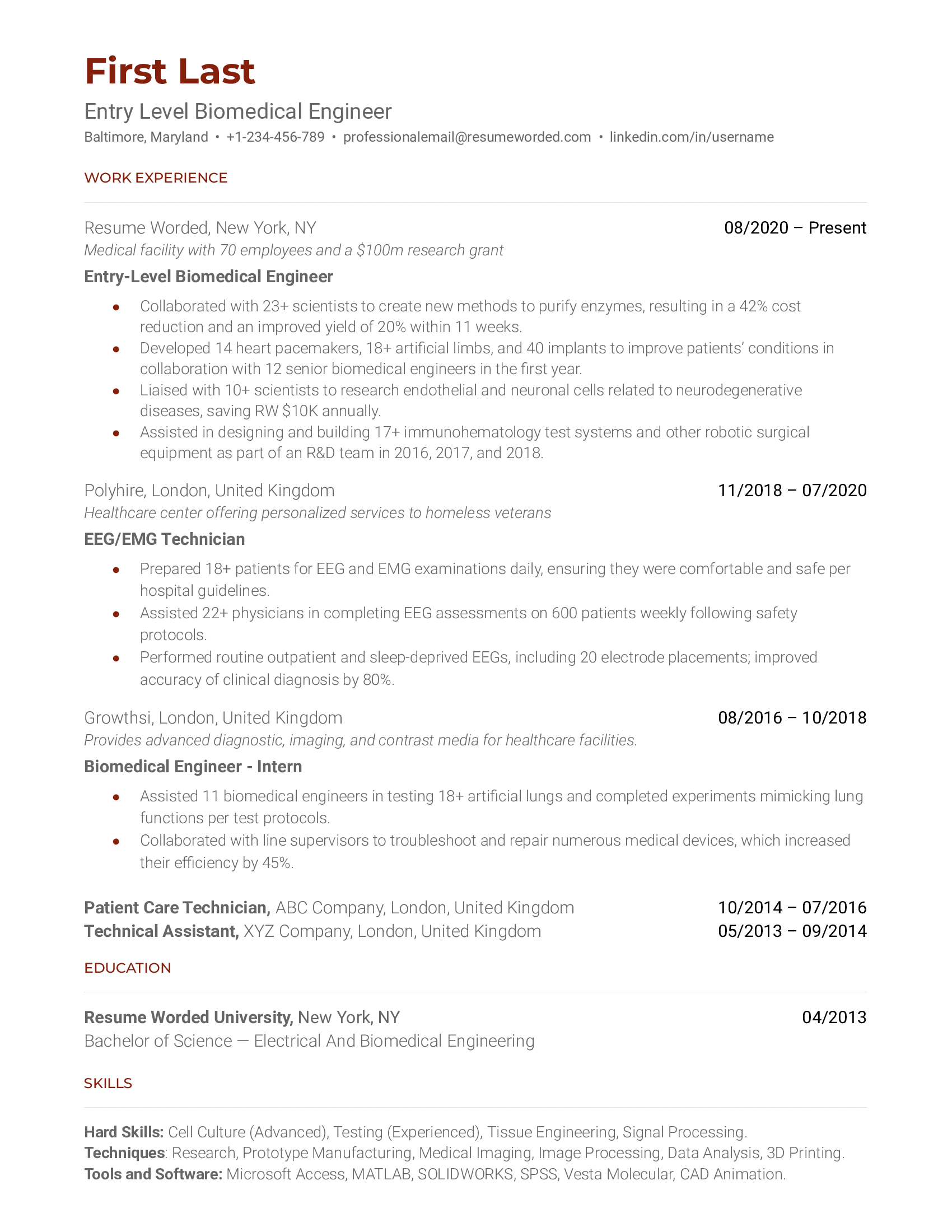
Entry-Level Radiologic Technologist
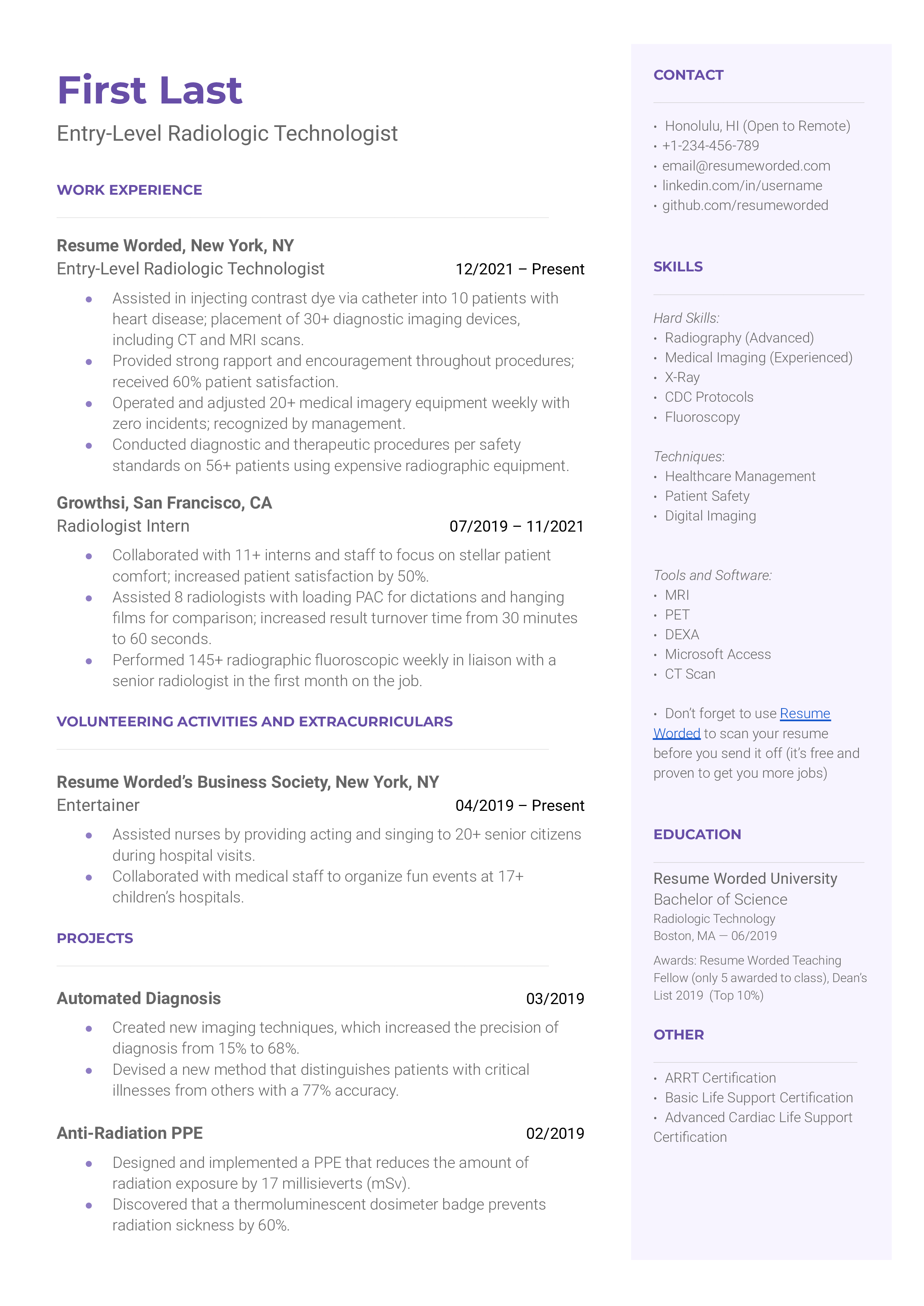
Entry-Level Attorney
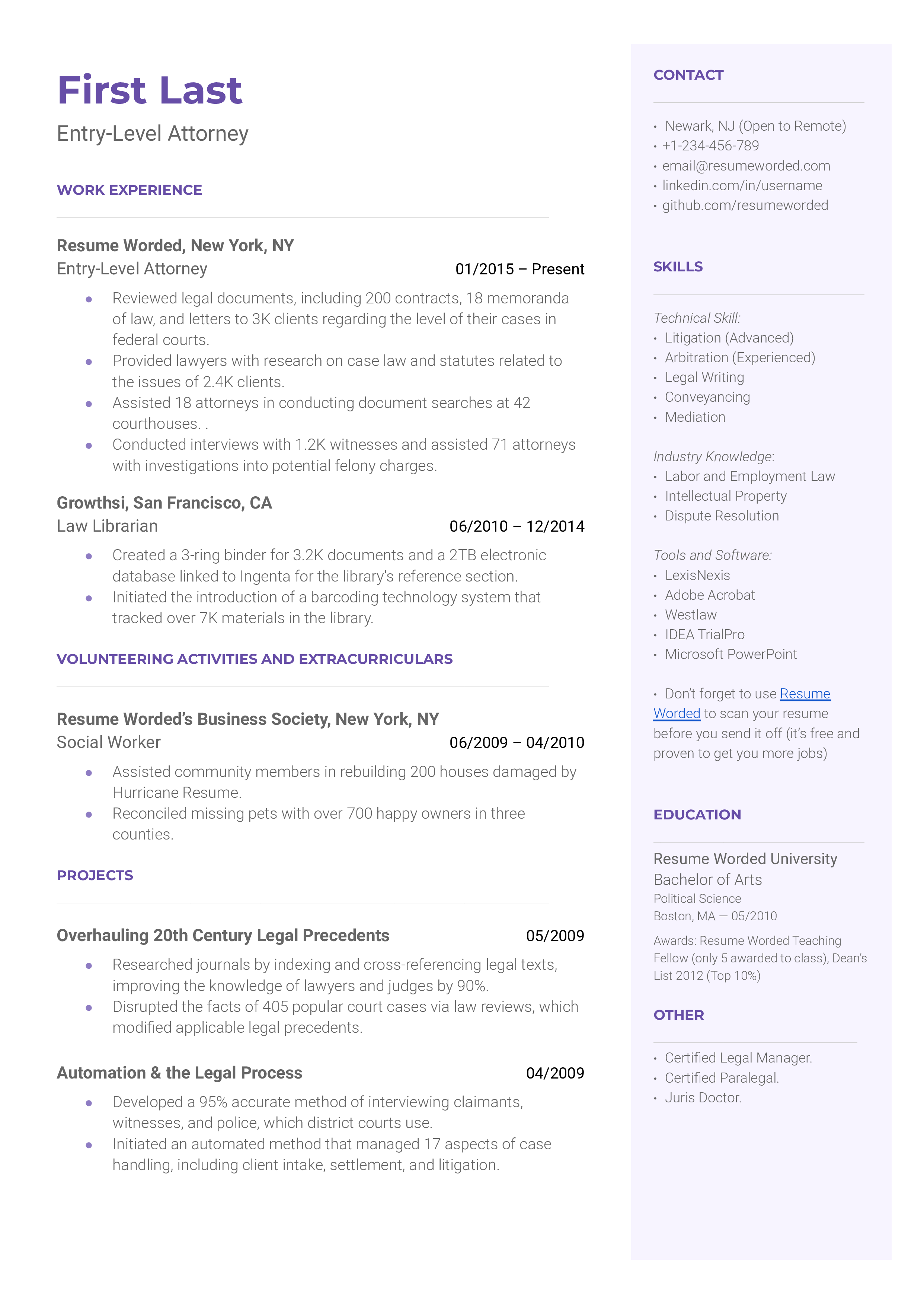
Entry-Level Project Coordinator
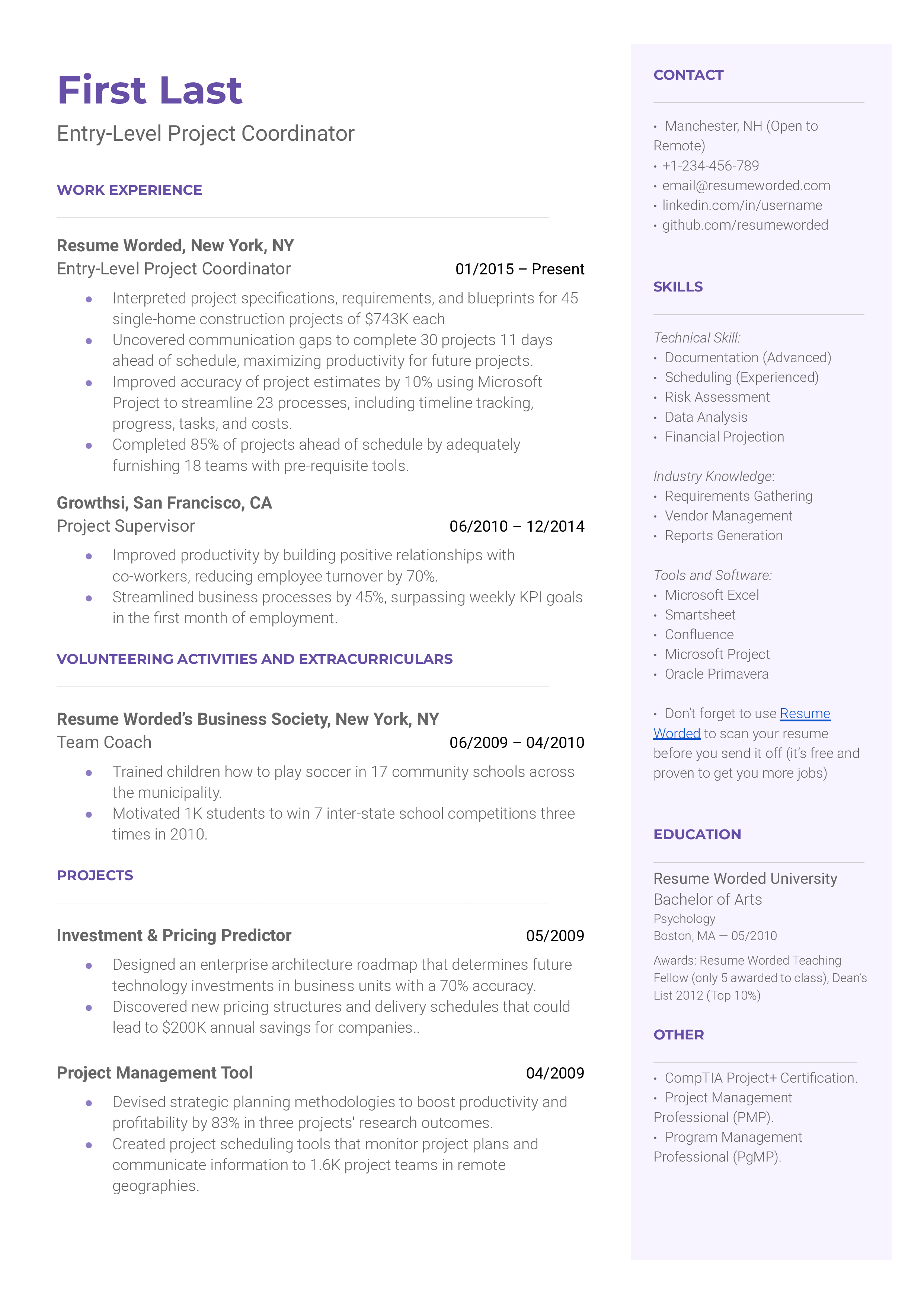
Entry Level Environmental Science
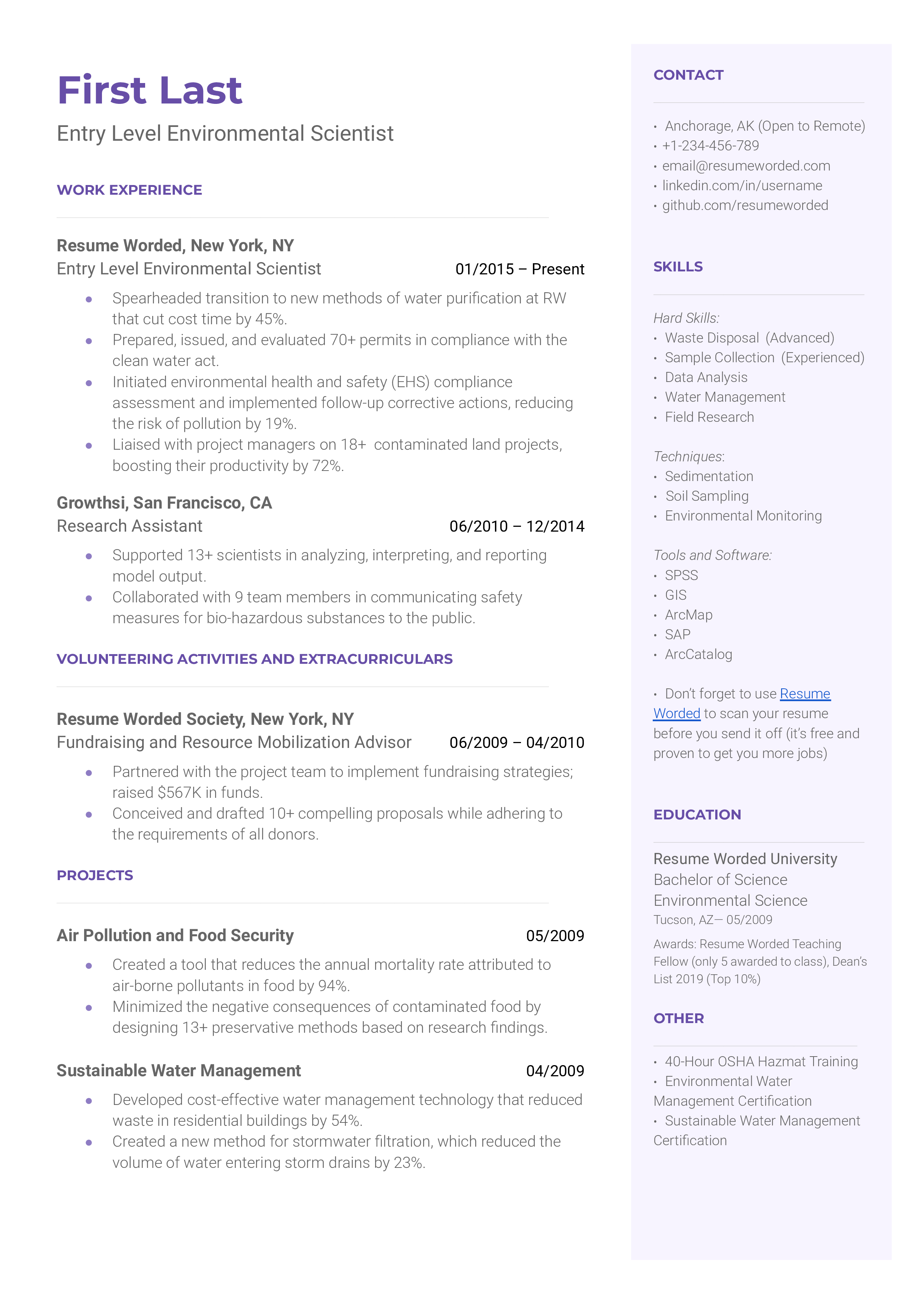
Junior Cyber Security Analyst
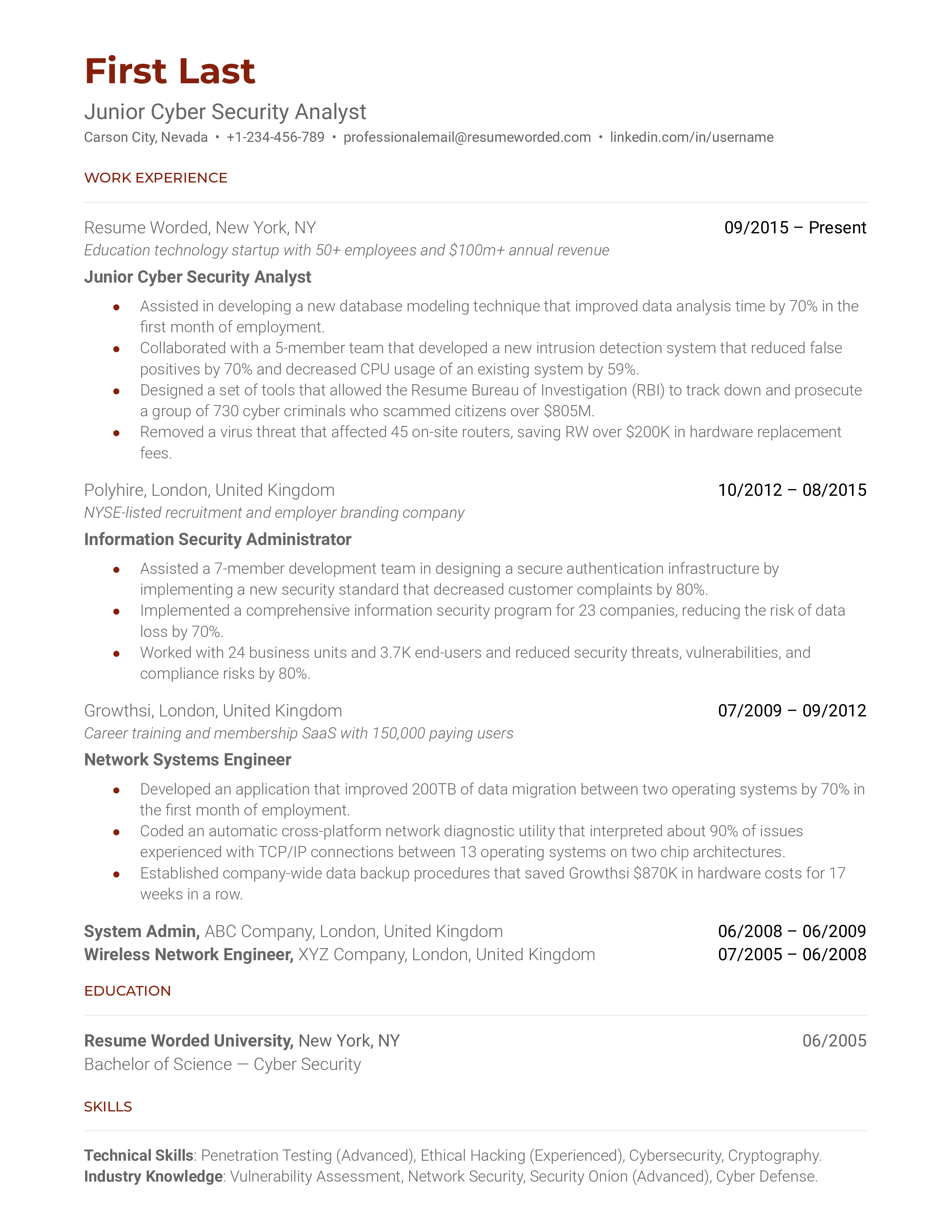
Entry Level Research Assistant
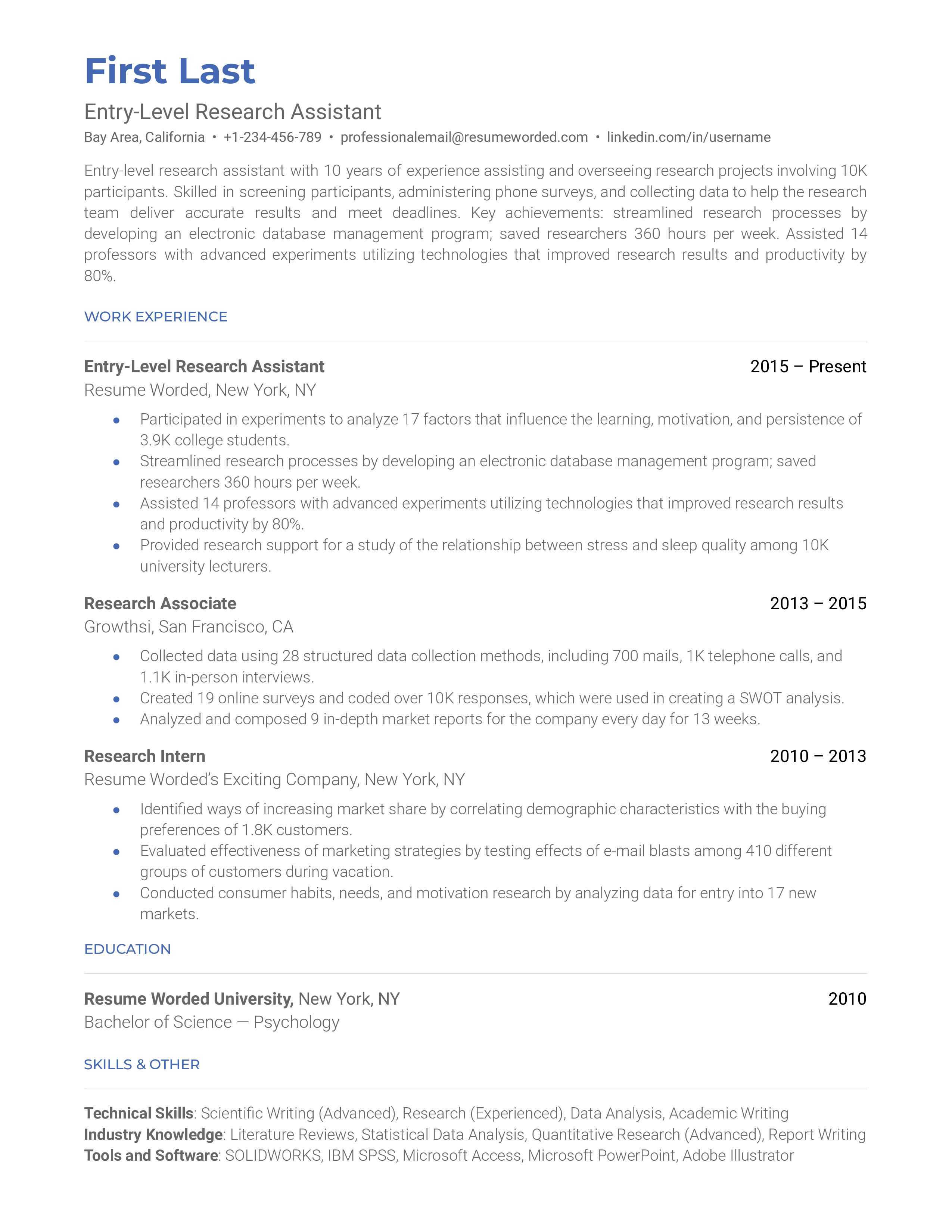
Junior Lawyer
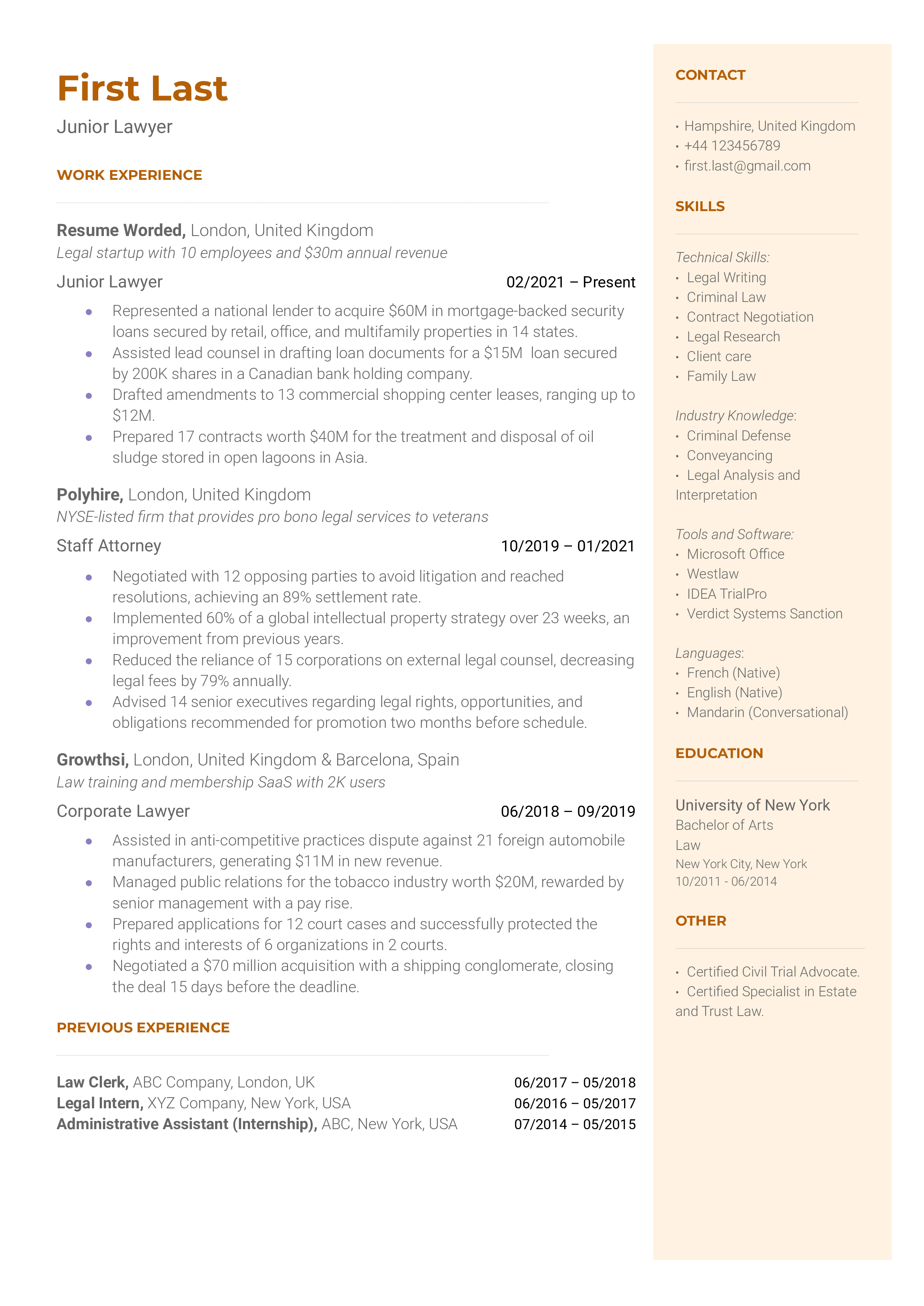
Entry-Level System Administrator
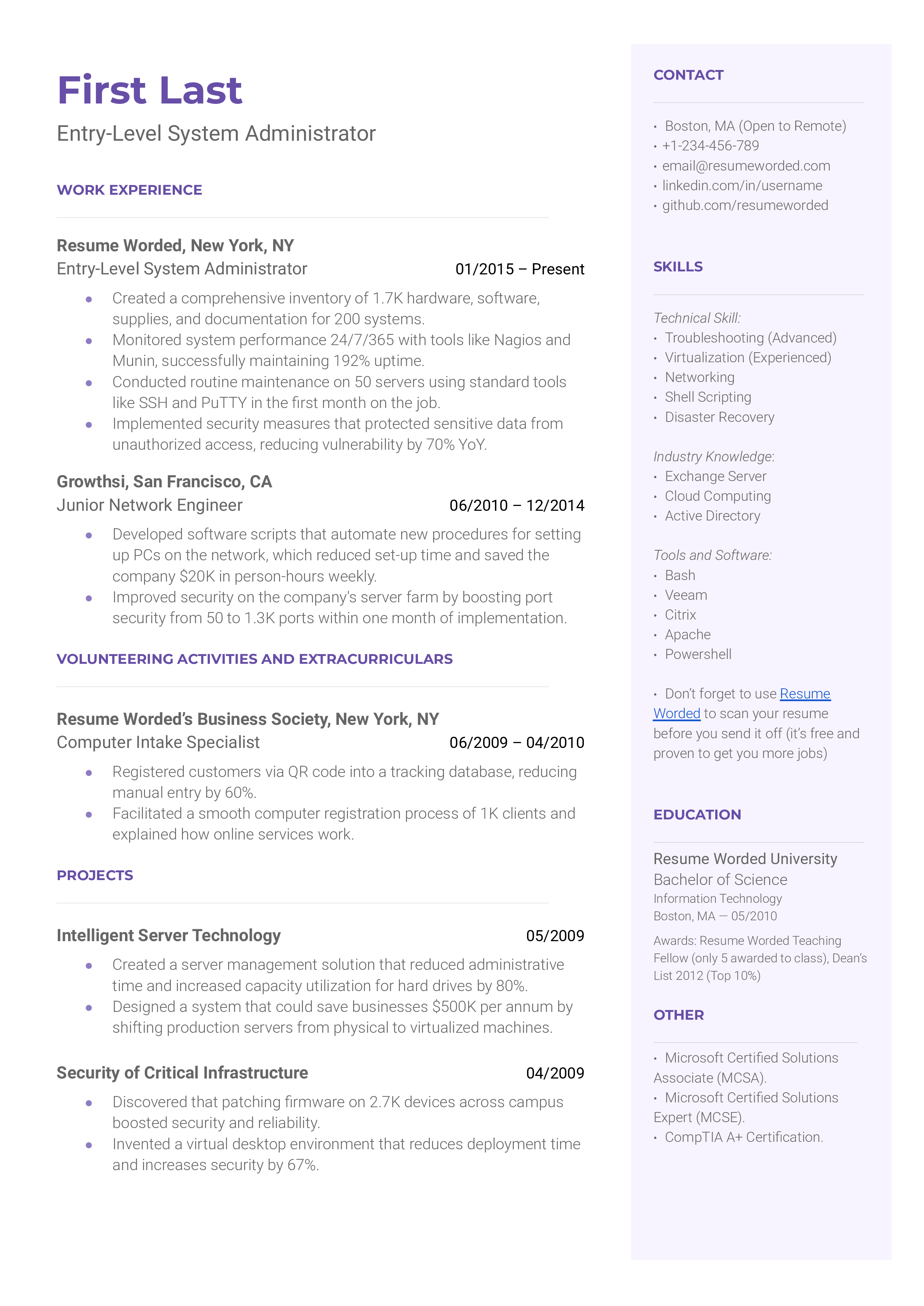
Junior Java Developer
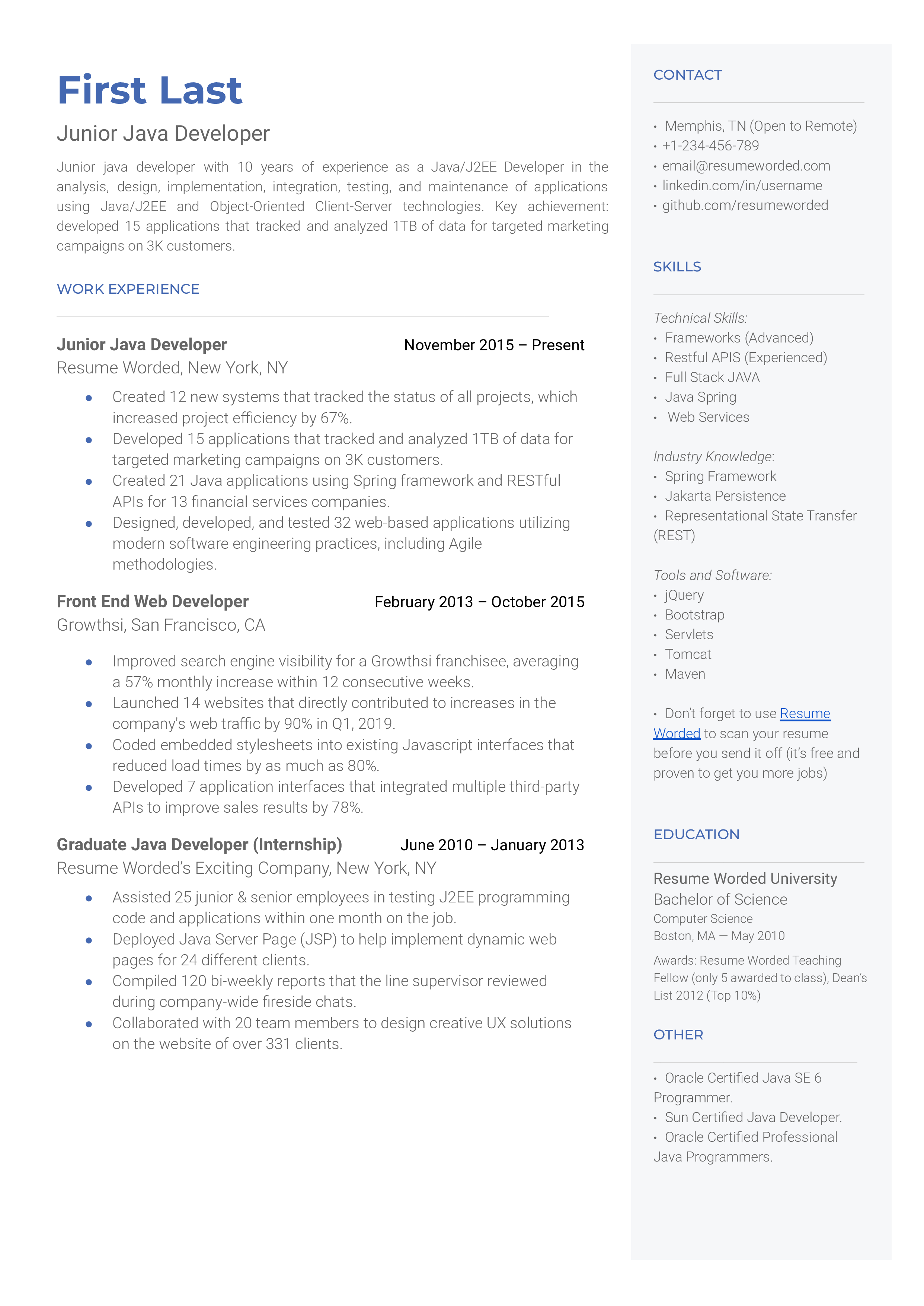
Entry-Level Java Developer
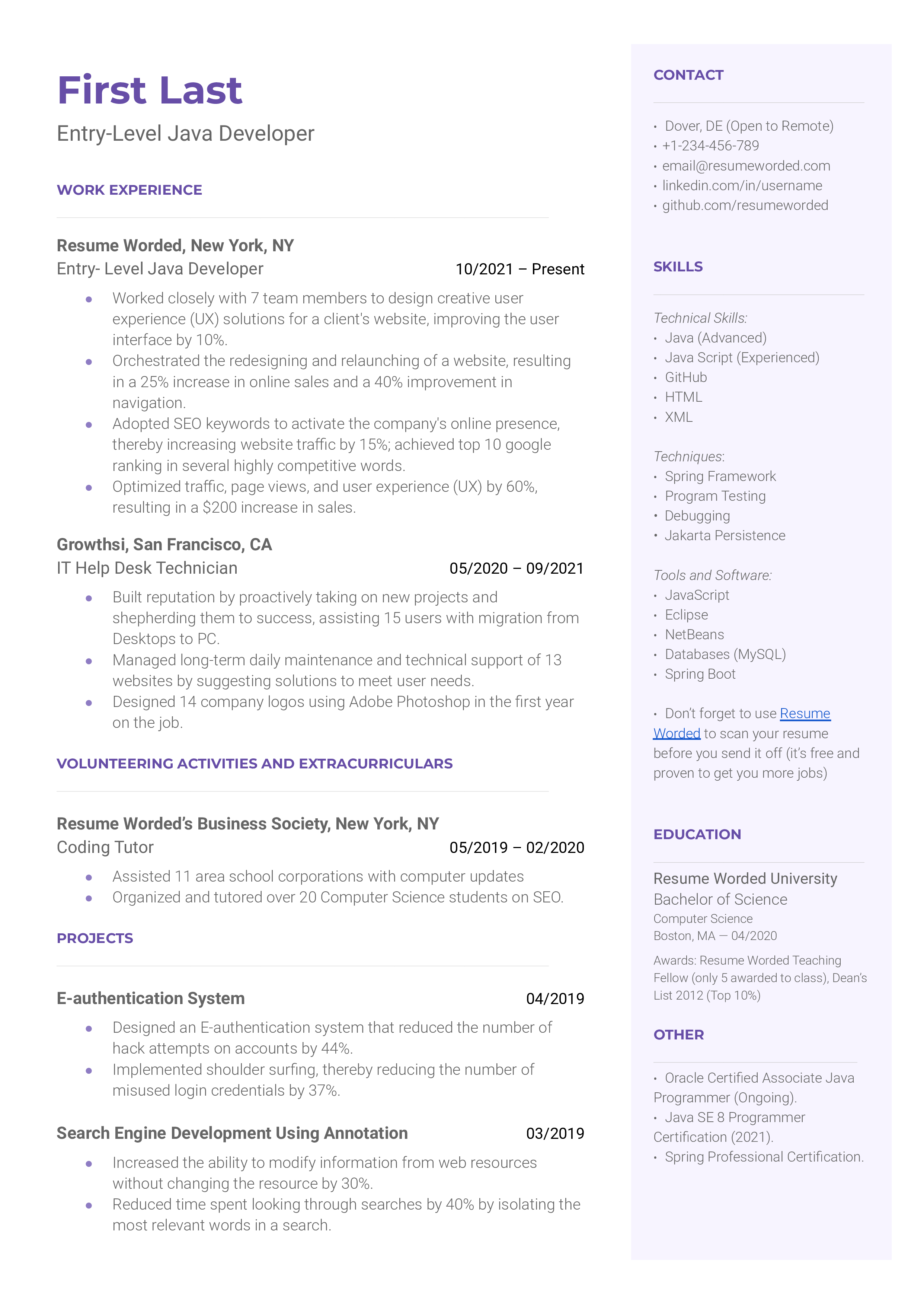
Entry Level Brand Ambassador
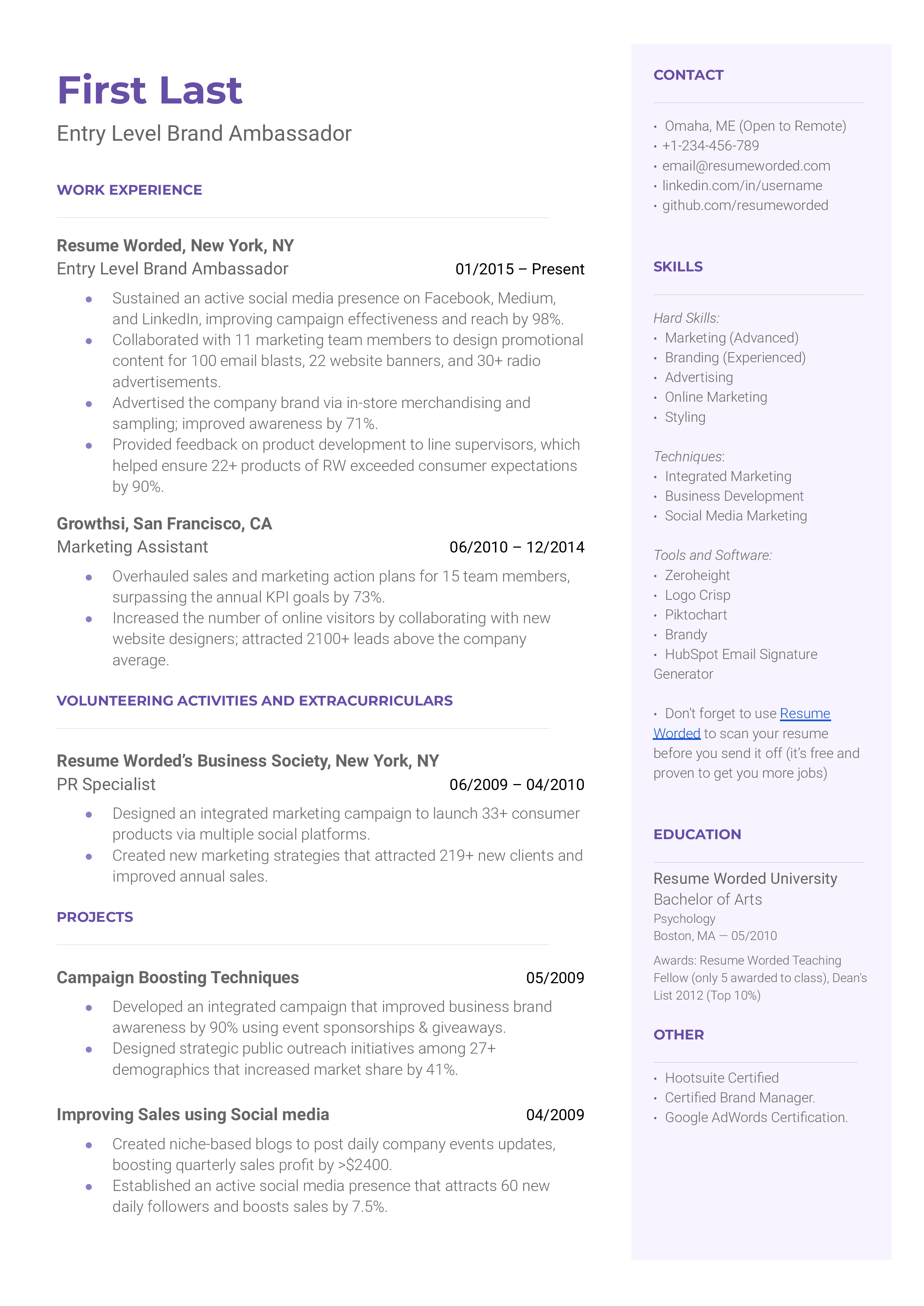
Entry-Level Mechanical Engineer
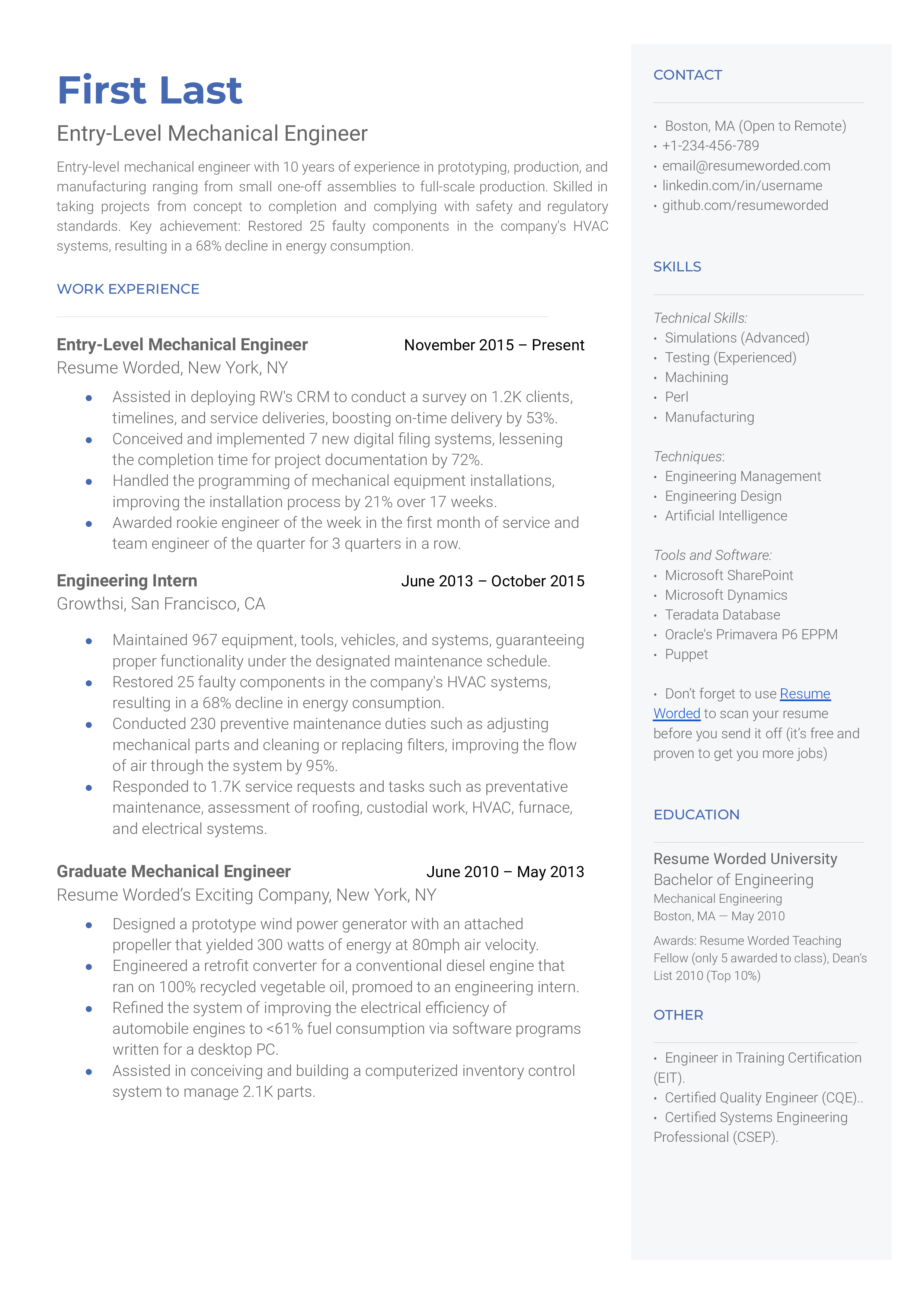
Entry Level Real Estate Agent
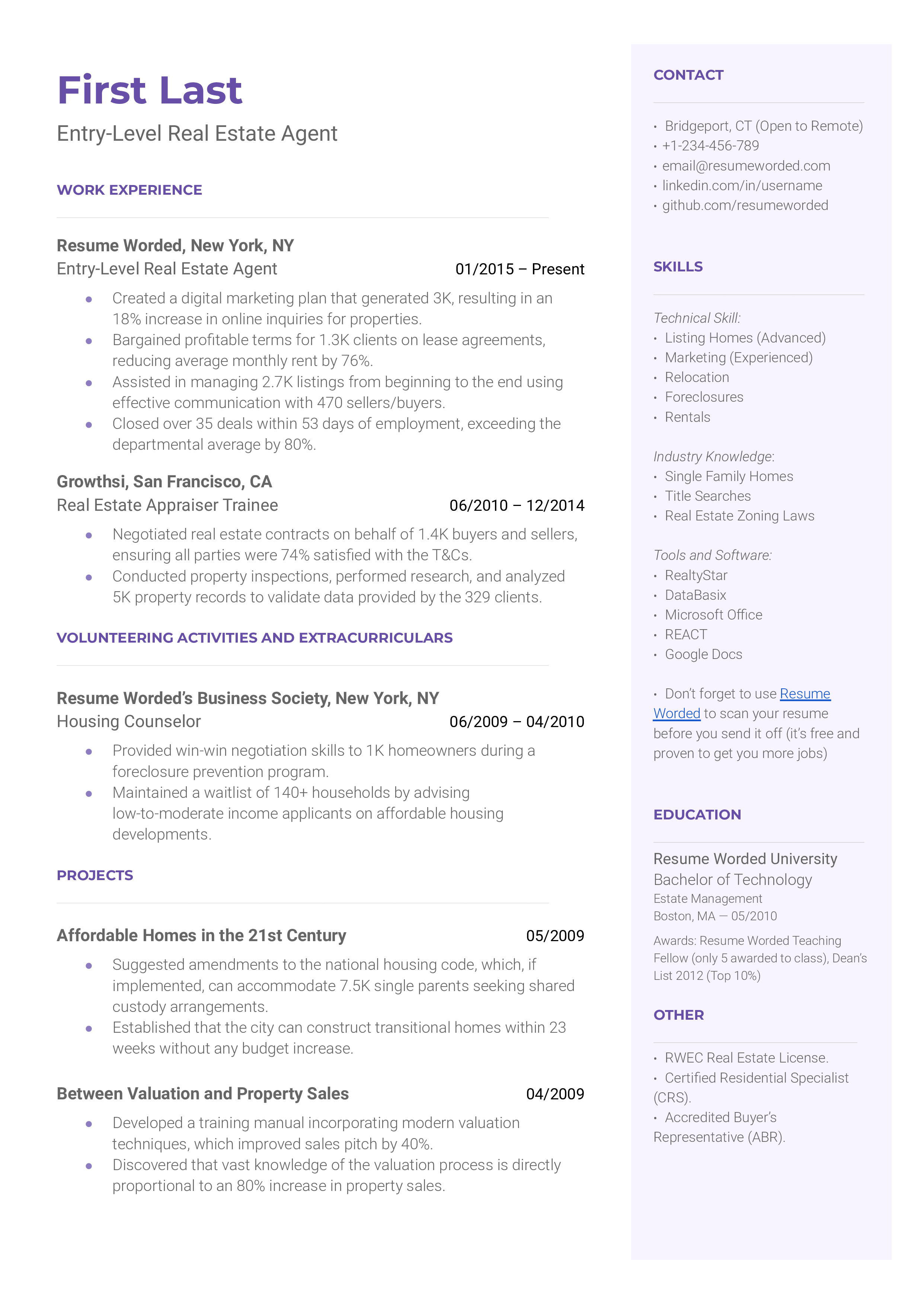
Entry Level Dental Assistant
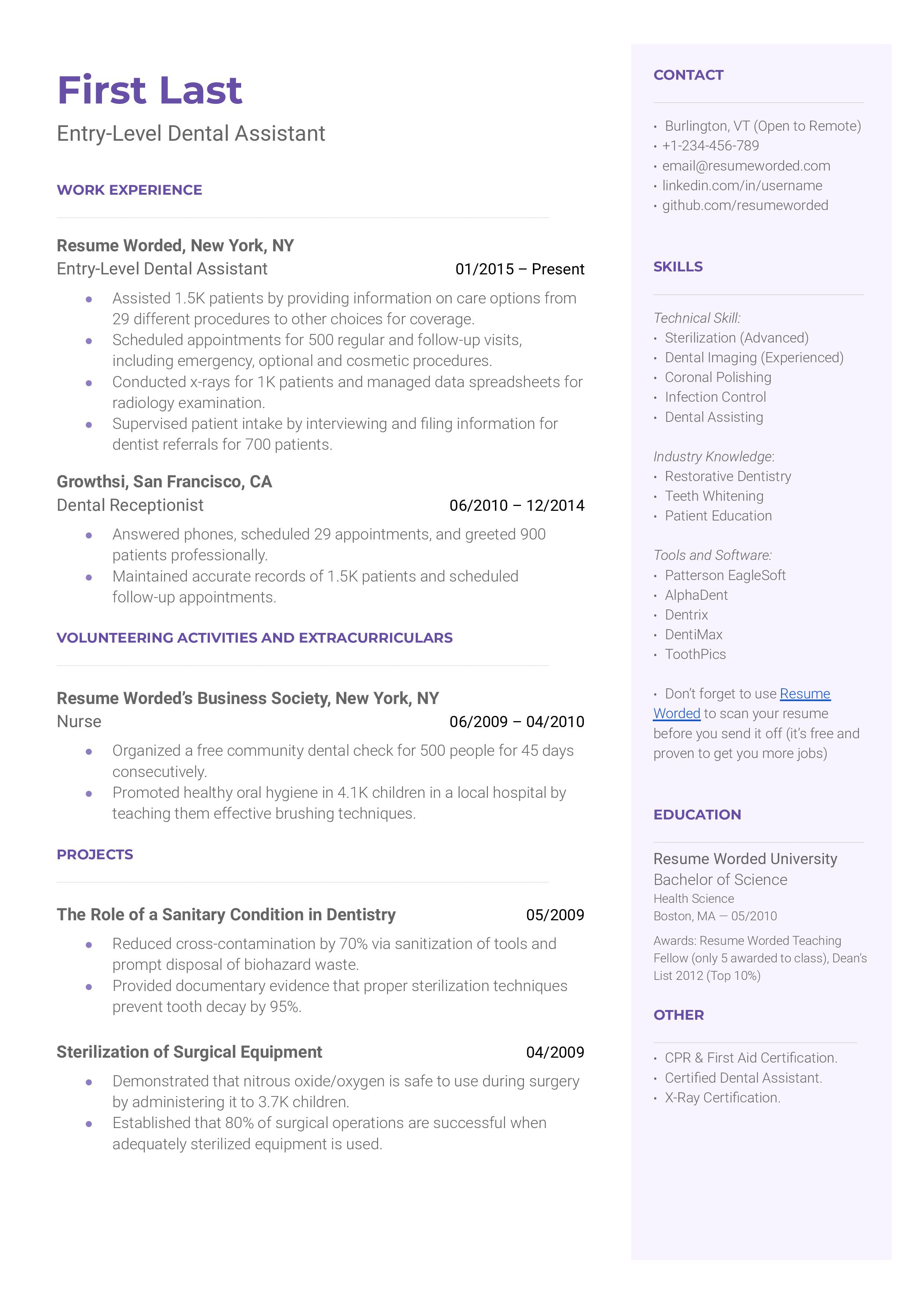
Entry Level Production Assistant
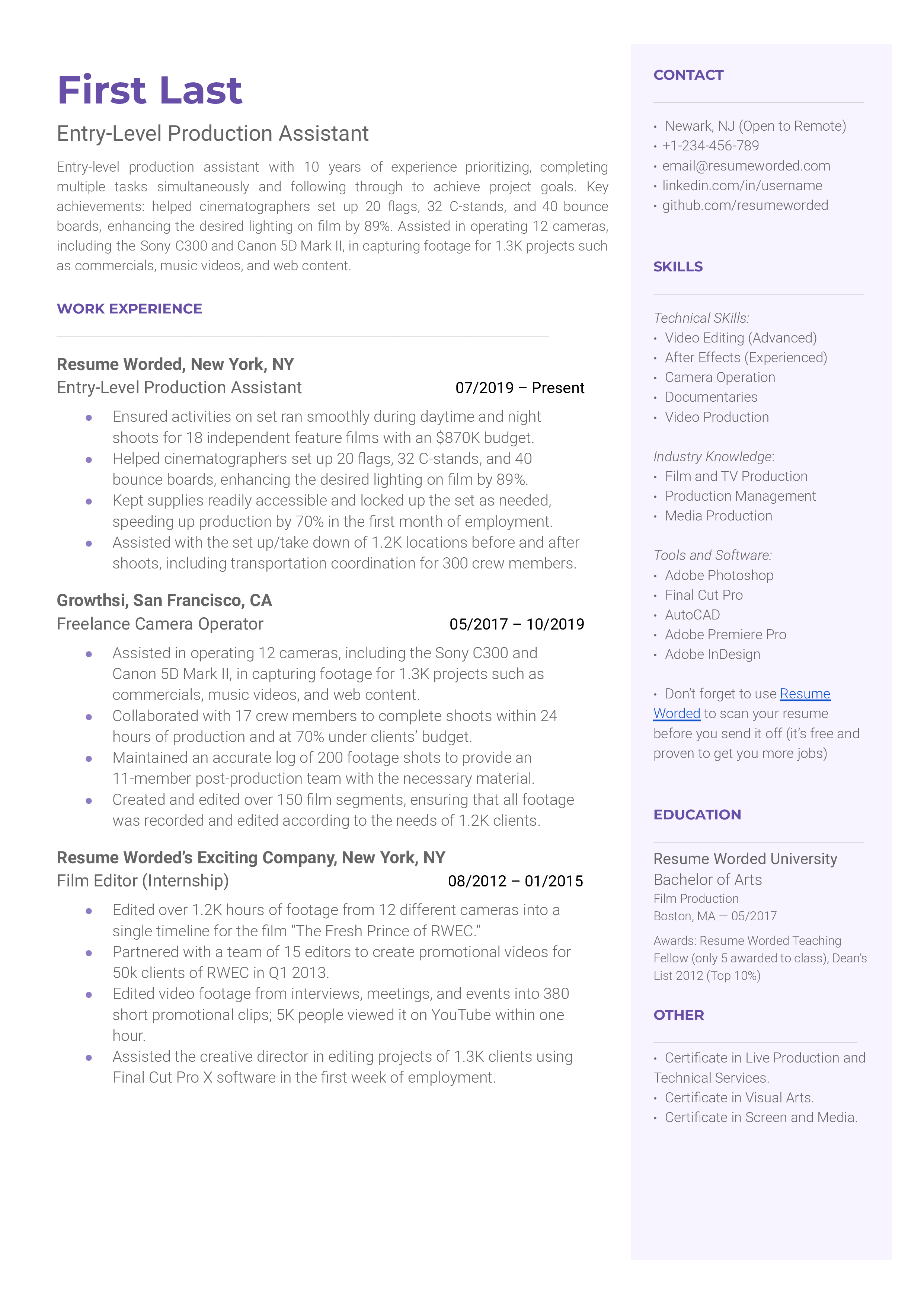
Entry Level Intelligence Analyst
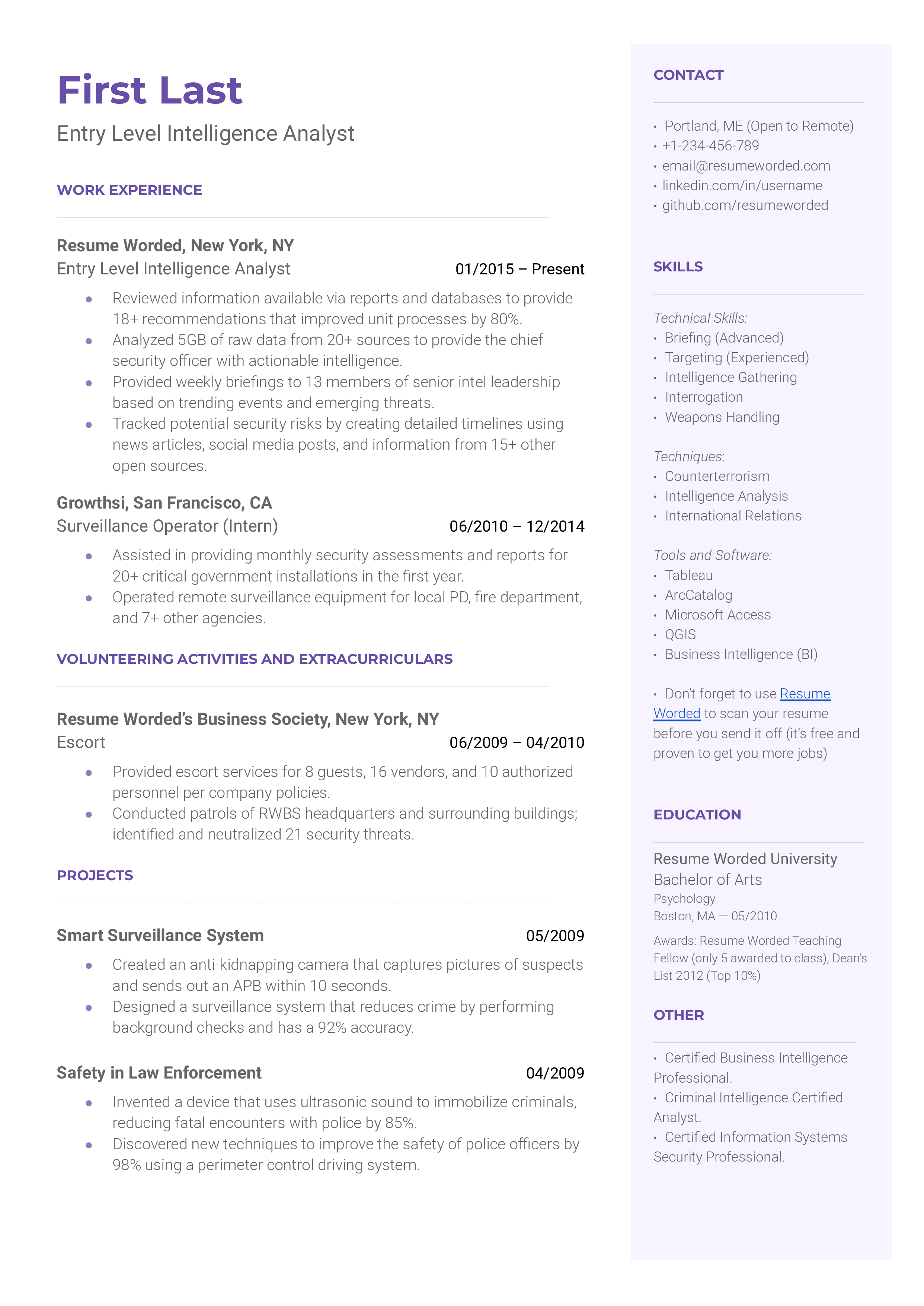
Entry Level IT Auditor
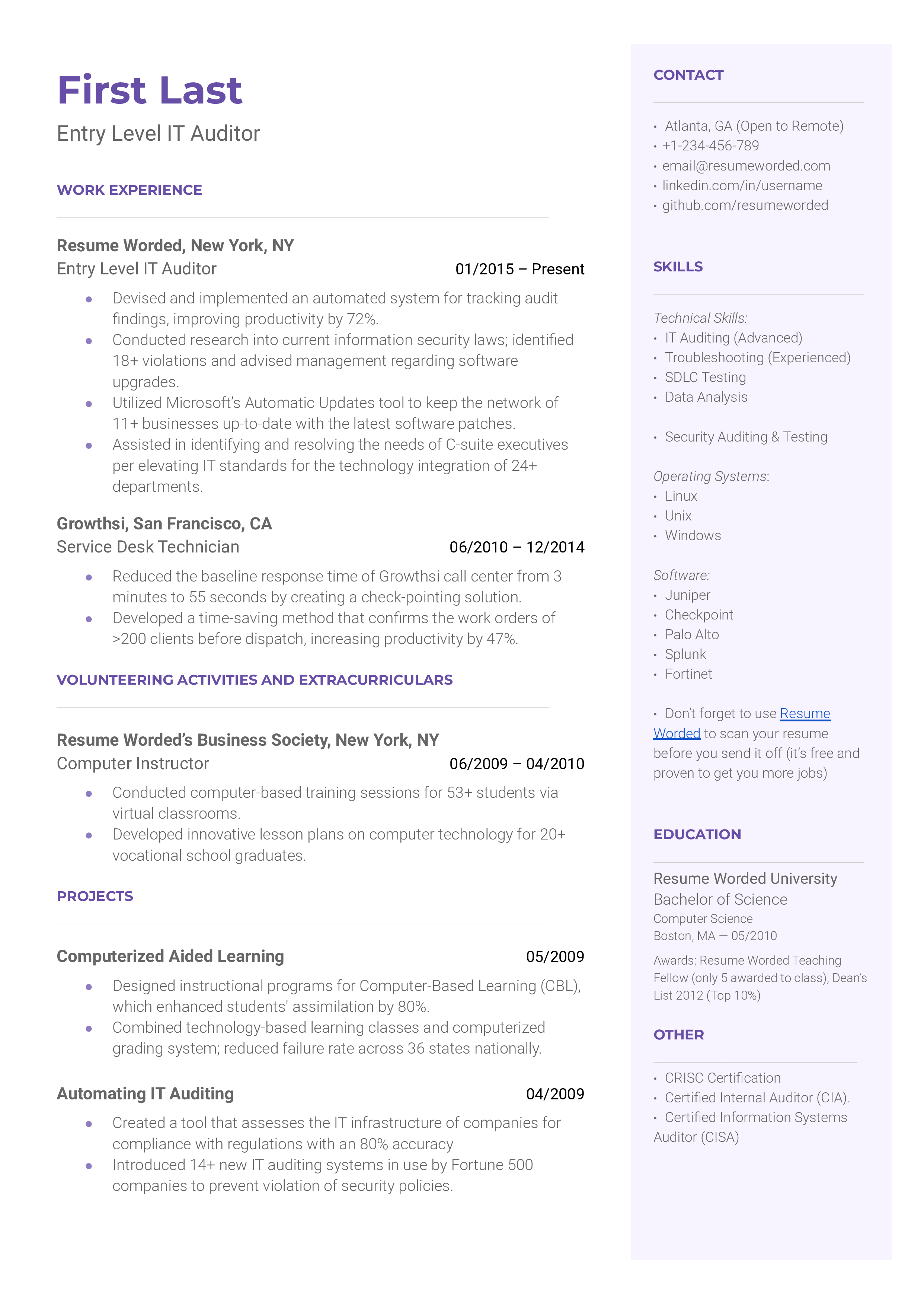
Entry-Level Case Manager
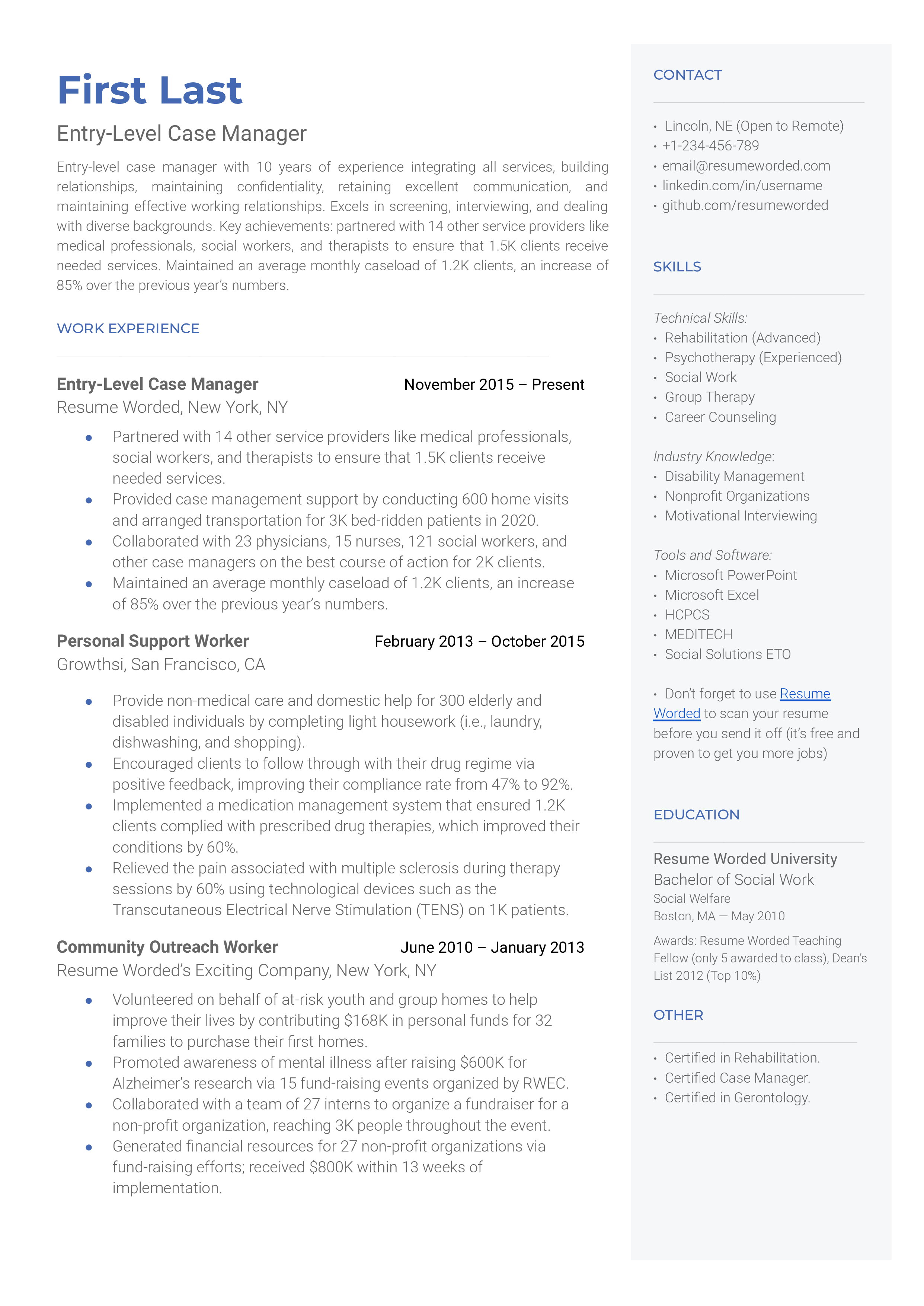
Entry-Level SQL Developer
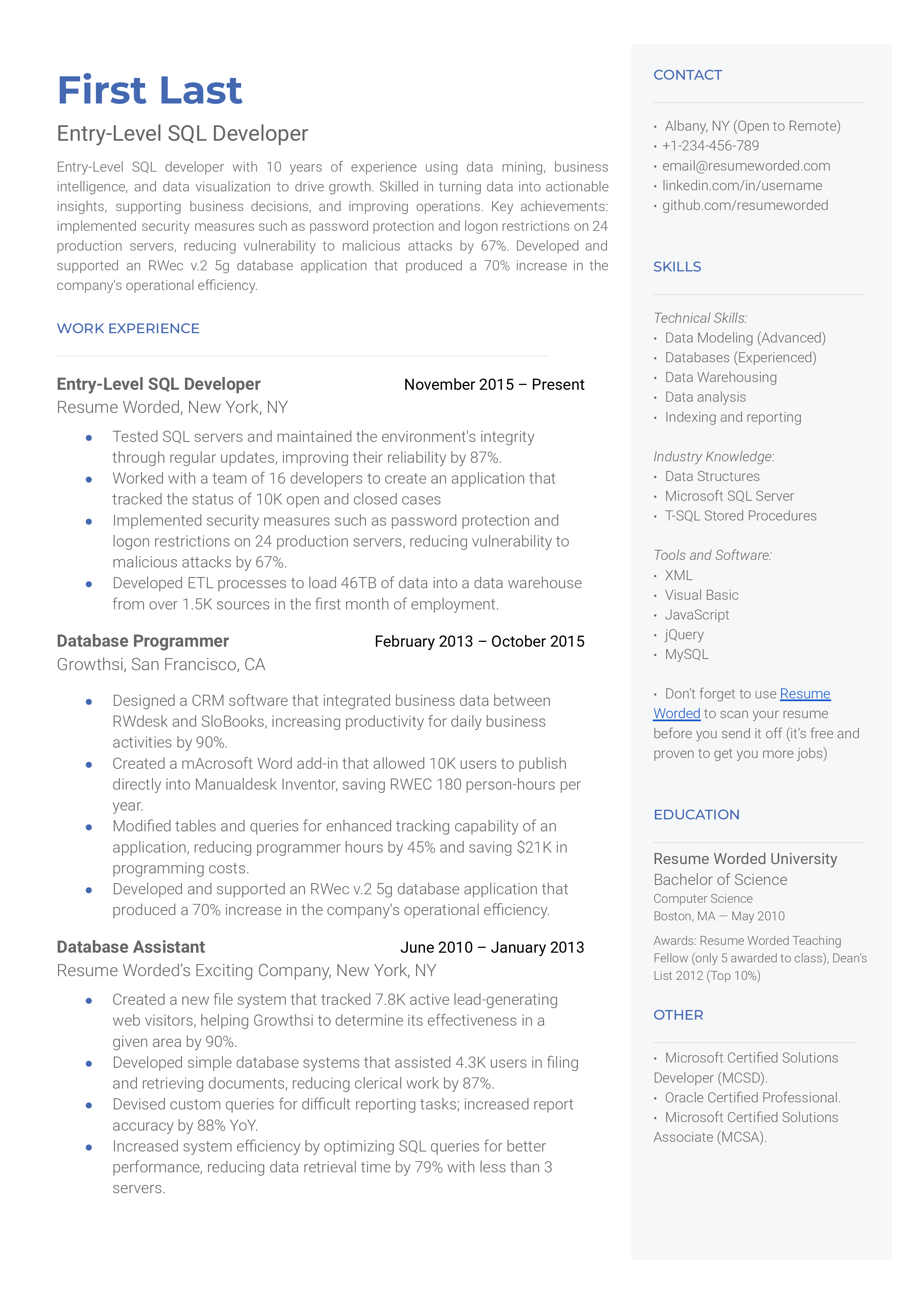
Entry-Level Pharmacy Technician
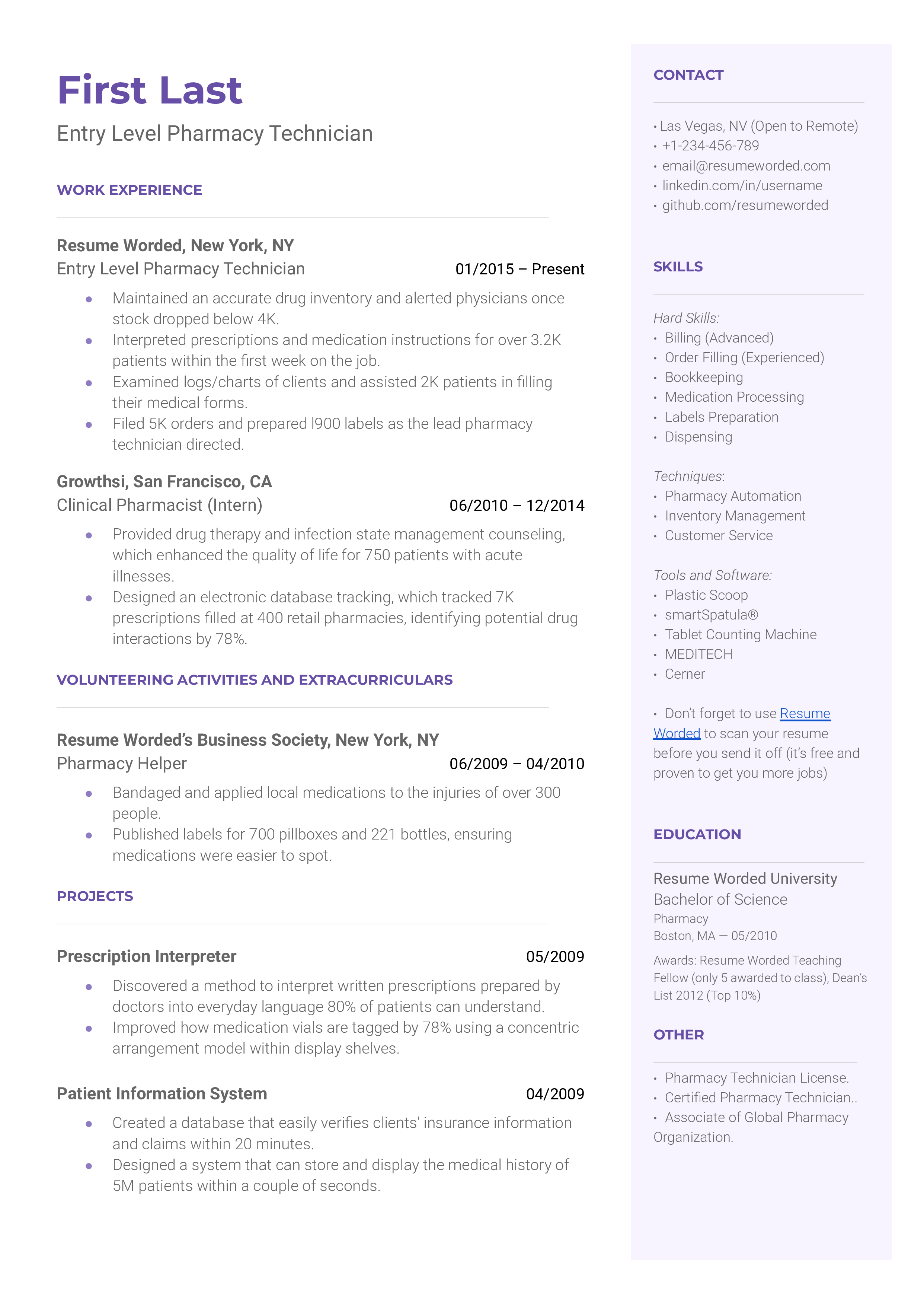
Entry Level Medical Coder
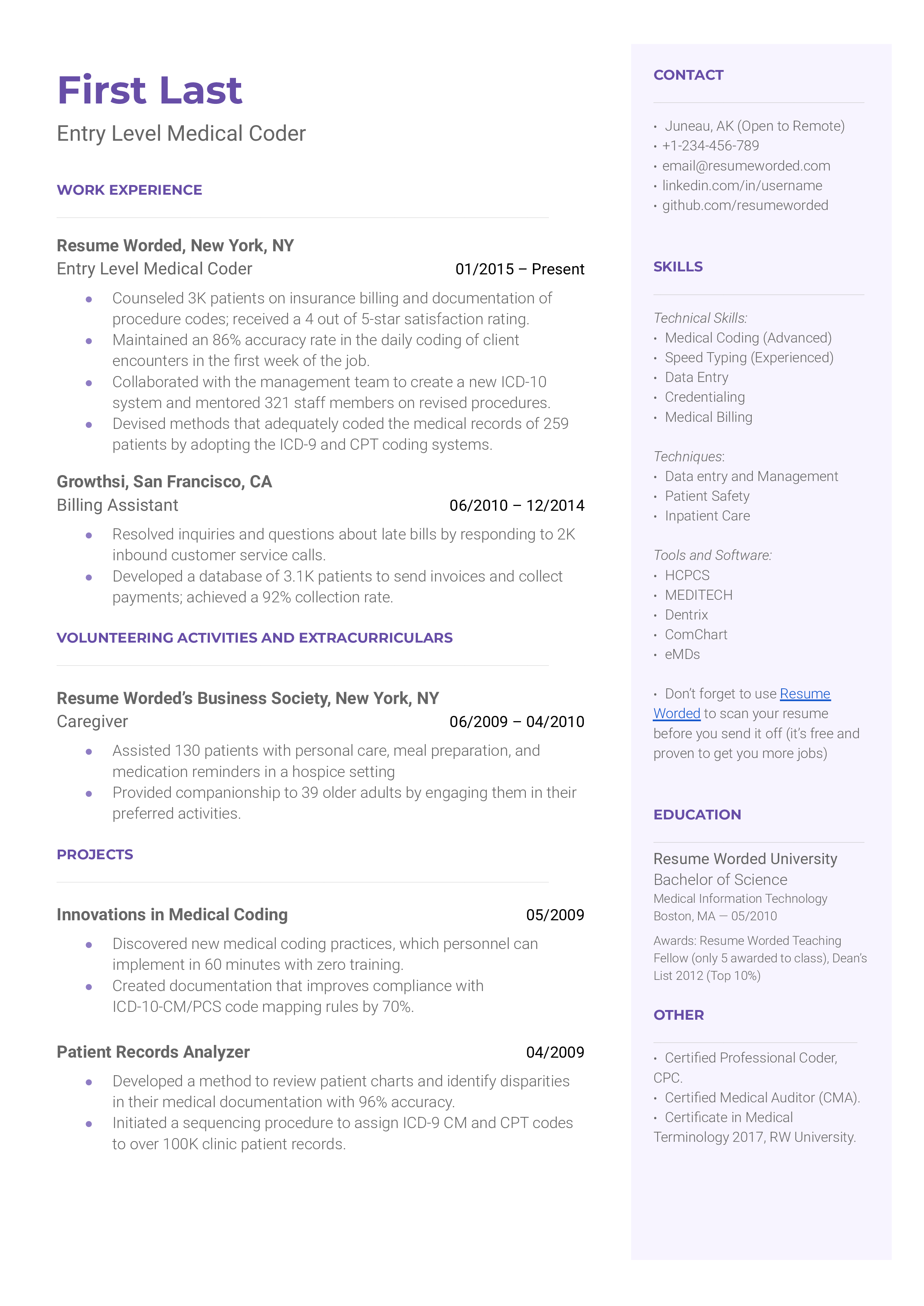
Architectural Intern/ Entry Level Architect
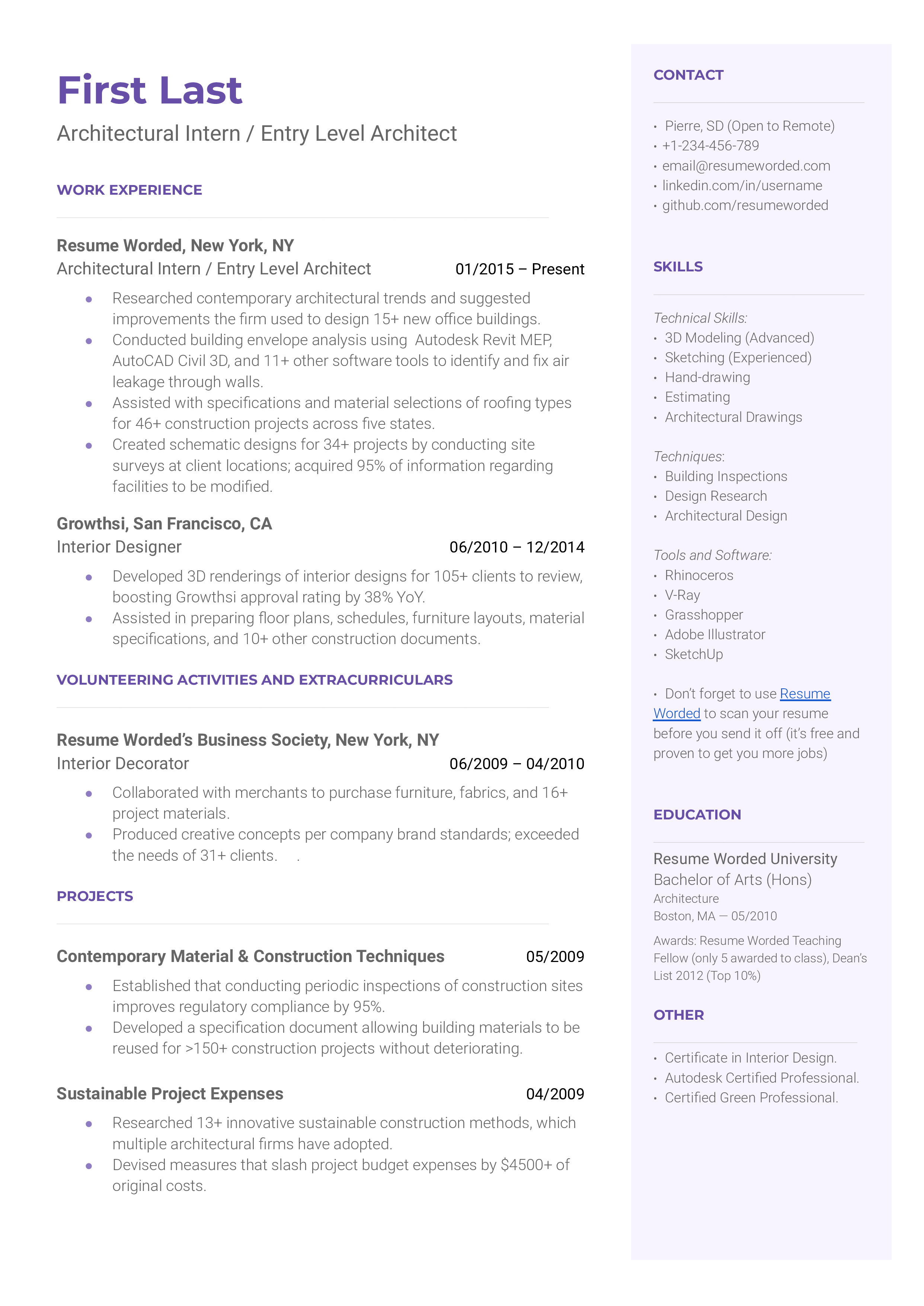
Entry Level Environmental Engineer
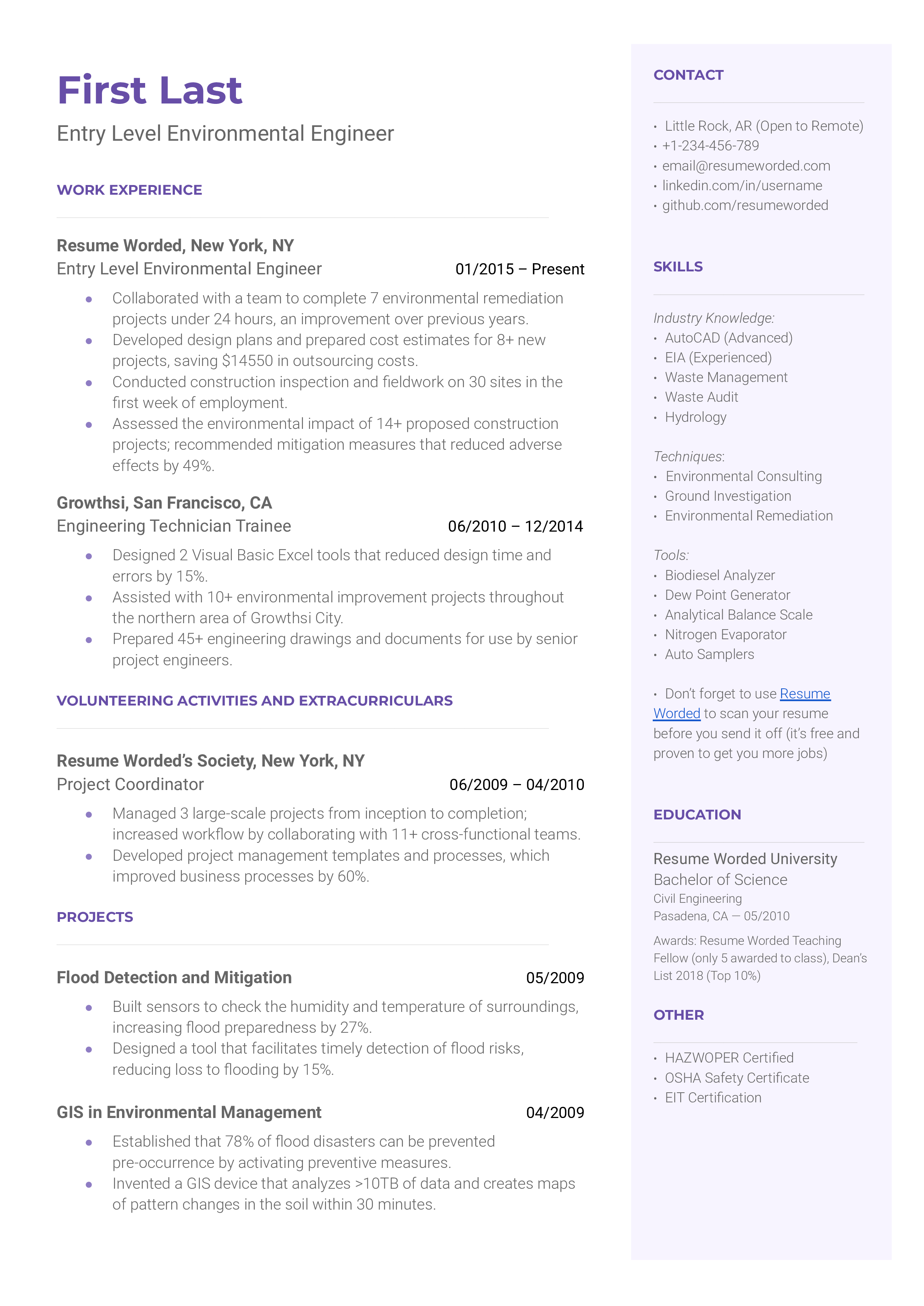
Entry Level Claims Adjuster
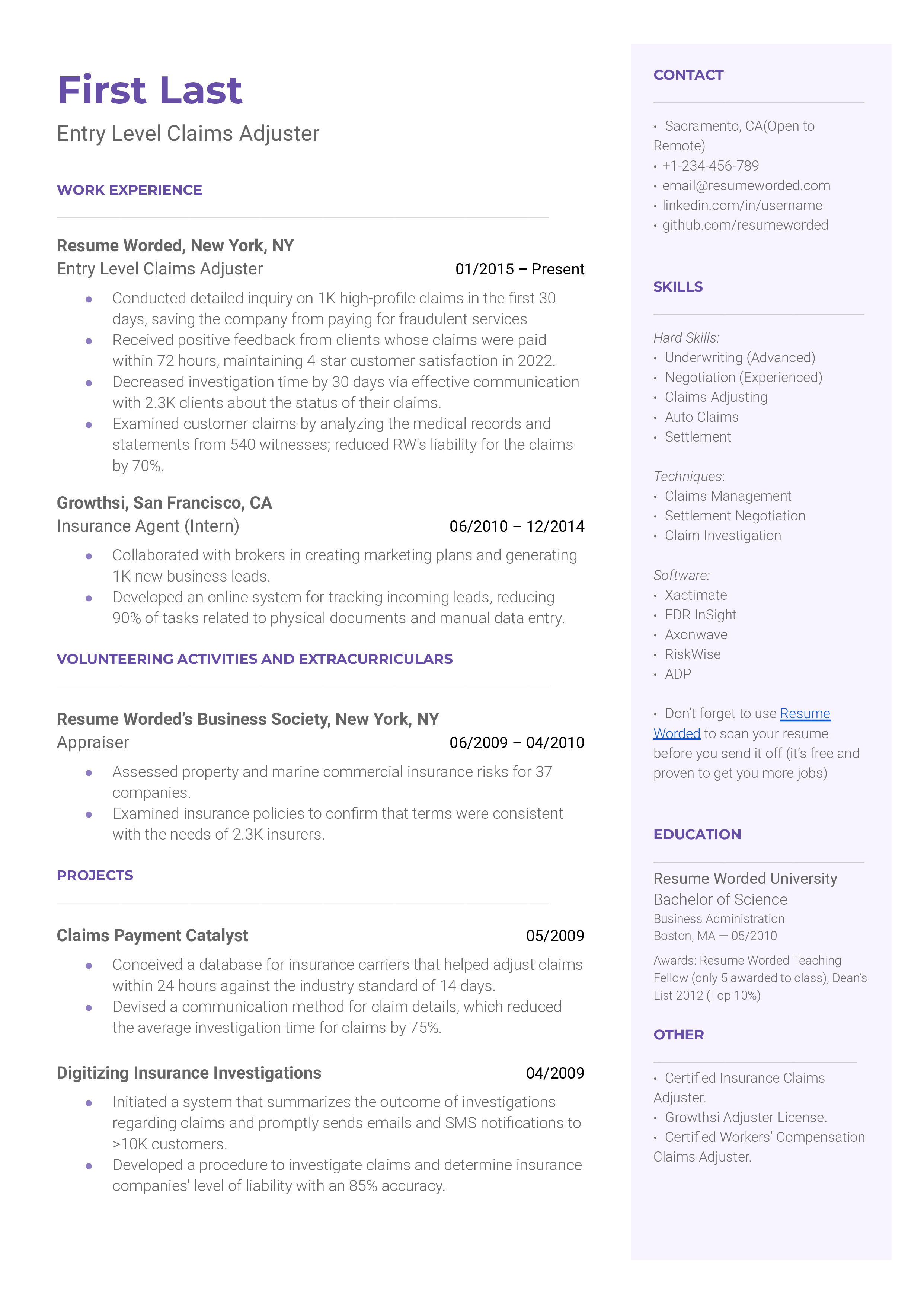
Entry-Level UX Researcher
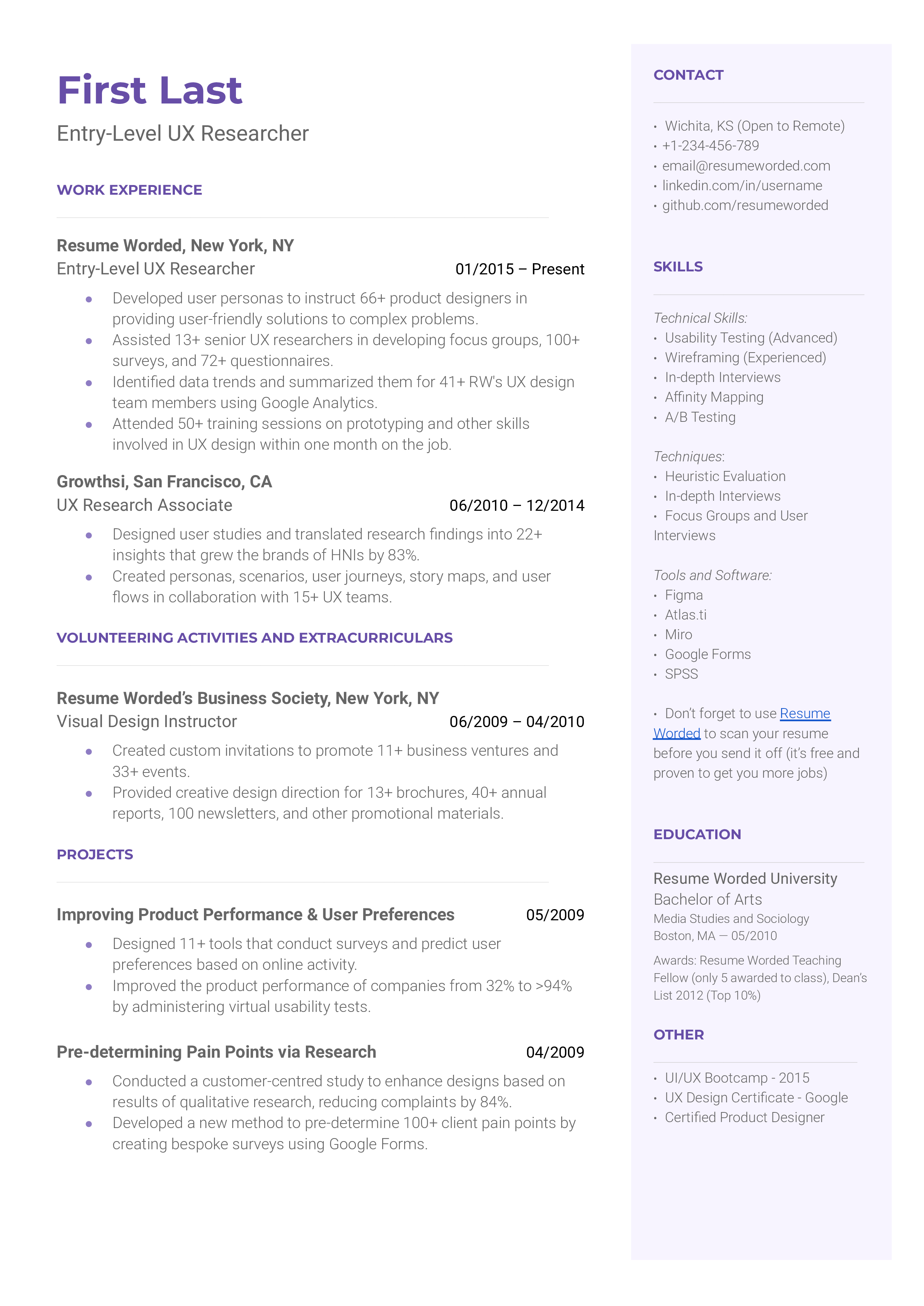
Entry Level Business Development Manager

Entry Level (Two Column)

Action Verbs For Entry Level Resumes
- Collaborated
- Established
How to use these action verbs?
When writing your resume, you should be using action verbs which effectively tell recruiters your role in specific accomplishments. As an entry-level or junior job seeker, you should focus on using action verbs that highlight your core soft skills like teamwork, communication, or initiative. Use action verbs like "Teamed", "Presented" or "Developed" to stress these skills. Additionally, refer to the resumes above for examples of how to put these skills into practice.
Entry Level Resume Guide
- Entry Level Action Verbs
- All Resume Examples
Download this template for free
Download this ats-compatible resume template in word or google docs format. edit it directly in google docs., access samples from top resumes, get inspired by real resume samples that helped candidates get into top companies., get a free resume review, get actionable steps to revamp your resume and land more interviews using our free ai-powered tool..
- Have an account? Sign in
E-mail Please enter a valid email address This email address hasn't been signed up yet, or it has already been signed up with Facebook or Google login.
Password Show Your password needs to be between 6 and 50 characters long, and must contain at least 1 letter and 1 number. It looks like your password is incorrect.
Remember me
Forgot your password?
Sign up to get access to Resume Worded's Career Coaching platform in less than 2 minutes
Name Please enter your name correctly
E-mail Remember to use a real email address that you have access to. You will need to confirm your email address before you get access to our features, so please enter it correctly. Please enter a valid email address, or another email address to sign up. We unfortunately can't accept that email domain right now. This email address has already been taken, or you've already signed up via Google or Facebook login. We currently are experiencing a very high server load so Email signup is currently disabled for the next 24 hours. Please sign up with Google or Facebook to continue! We apologize for the inconvenience!
Password Show Your password needs to be between 6 and 50 characters long, and must contain at least 1 letter and 1 number.
Receive resume templates, real resume samples, and updates monthly via email
By continuing, you agree to our Terms and Conditions and Privacy Policy .
Lost your password? Please enter the email address you used when you signed up. We'll send you a link to create a new password.
E-mail This email address either hasn't been signed up yet, or you signed up with Facebook or Google. This email address doesn't look valid.
Back to log-in

Thank you for the checklist! I realized I was making so many mistakes on my resume that I've now fixed. I'm much more confident in my resume now.

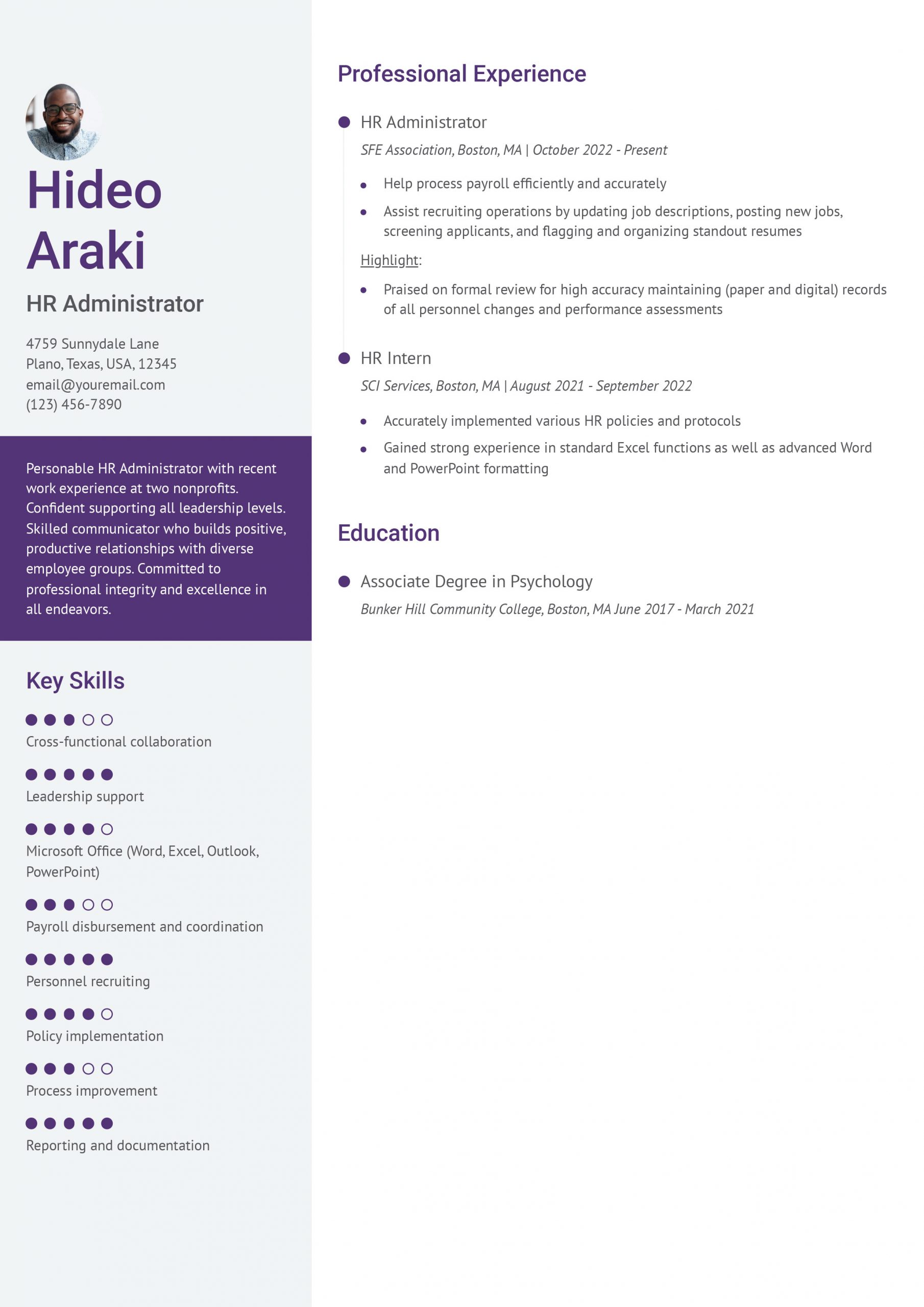
11 Entry-Level Resume Examples and Templates for 2024

Entry-Level Resume Templates and Examples (Download in App)
Most popular entry-level resumes, medical assistant resume with no experience, data entry resume with no experience, flight attendant resume with no experience, it resume with no experience, entry-level financial analyst resume example, entry-level human resource administrator resume example, student resume example, internship resume example.
- Resume Text Examples
- How To Write a Entry-Level Resume
- Entry-Level
- Senior-Level
Entry-Level Text-Only Resume Templates and Examples
Jane Smith (123) 456-7890 | [email protected] | Athens, OH 12345 | www.linkedin.com/example
- Recent internship experience supporting editorial operations of a popular magazine
- Completing Bachelor’s Degree in English and Creative Writing from Ohio University
- Co-curricular activities include helping write and publish the university’s main campus newspaper
- Committed to continually gaining and applying new skills
- Bilingual: Fluent in English and Spanish
- Efficiency improvement
- Fact-checking and proofreading
- Independent research
- Microsoft Office Suite (Word, Outlook, PowerPoint)
- Office administration
- Process streamlining
- Team collaboration
- Writing and editing
Internship Experience
Editorial Intern, Regional Floral Magazine, Lancaster, OH | May 2022 to August 2022
- Helped manage the magazine’s main email account, responding to feedback and providing subscription information as needed
- Answered and forwarded calls to the appropriate department
- Maintained and updated subscription rolls
- Organized meetings and verified sources for reporters
- Candidate: Bachelor of Arts (BA) – English, Creative Writing, Ohio University, Athens, OH | expected May 2023
Winner, Campus Award for Long-Form Fiction (2022) Runner-up, Campus Award for Excellence in Poetry (2021)
Select coursework :
- Children’s fiction
- Fiction workshopping
- Poetry and drama
- Prose and nonfiction
- Short story writing
Co-Curricular Activity
Staff Writer, OU News | 2021 to present [Biweekly college newspaper]
- Provide copy for various sections, including arts, athletics, and editorial
- Work with photo editors to determine placement with accompanying text
Fluency in Spanish
Hideo Araki Boston, MA 12345 | (123) 456-7890 | [email protected] | www.linkedin.com/example
Personable HR Administrator with recent work experience at two nonprofits. Confident supporting all leadership levels. Skilled communicator who builds positive, productive relationships with diverse employee groups. Committed to professional integrity and excellence in all endeavors.
- Cross-functional collaboration
- Leadership support
- Microsoft Office (Word, Excel, Outlook, PowerPoint)
- Payroll disbursement and coordination
- Personnel recruiting
- Policy implementation
- Process improvement
- Reporting and documentation
Professional Experience
HR Administrator, SFE Association, Boston, MA | October 2022 to present
- Help process payroll efficiently and accurately
- Assist recruiting operations by updating job descriptions, posting new jobs, screening applicants, and flagging and organizing standout resumes
Highlight :
- Praised on formal review for high accuracy maintaining (paper and digital) records of all personnel changes and performance assessments
HR Intern, SCI Services, Boston, MA | August 2021 to September 2022
- Accurately implemented various HR policies and protocols
- Gained strong experience in standard Excel functions as well as advanced Word and PowerPoint formatting
Associate Degree – Psychology, Bunker Hill Community College, Boston, MA | 2021
Liam Greene (555) 789-1234 | [email protected] | Boston, MA 20138 | www.linkedin.com/example
Engineering graduate with strong knowledge base centered on robotics, biotechnology, nanotechnology, and artificial intelligence. Passionate about streamlining work processes and finding novel solutions to complex problems. Quickly adapt to new work challenges and conditions.
- Data modeling
- Human-technology interfaces
- Ruby on Rails
- Structural analysis
Bachelor of Science (BS) — Engineering, Boston University, Boston, MA | December 2022 3.7 GPA | Dean’s List | cum laude
Co-Curricular Experience
Member, Robotics Club Competition Team | August 2020 to August 2022
- Helped design robot that won the intercollegiate competition in February 2021
Research Intern, Wallops NASA Flight Facility, Wallops Island, VA | Summers 2021 and 2022
- Created a program to detect conductivity that may impact satellite launch times
- Studied under NASA flight engineers
- Designed prototype of Mars Mission with other research interns
Work Experience
Produce Clerk (part-time), Jumbo Grocery Stores, Boston, MA | June 2019 to May 2021
- Ensured store’s produce section was clean, organized, and well-stocked
- Praised for strong teamwork, high efficiency, and proactive equipment maintenance
How To Write an Entry-Level Resume
To write a good entry-level resume, show you can excel at the standard duties of your profession despite limited work experience. The tips and examples below will help you draft each section of your resume so it gets you interviews for a great entry-level opportunity.
1. Craft an outstanding profile with a summary of your entry-level qualifications
Your resume profile should catch hiring managers’ interest by displaying the top reasons you’d succeed as a junior employee.
It’s usually best to write this section last so you can look over all your career information and decide what those top reasons are. For instance, maybe you recently finished a relevant degree program with honors. Or perhaps you have hands-on experience as a result of several internships. You might also give details on your volunteer or extracurricular activities if they relate to your career path. Gathering these highlights at the top of your resume shows hiring managers you’re ready to advance their business goals.
Profile Example
Engineering graduate with a strong knowledge base centered on robotics, biotechnology, nanotechnology, and artificial intelligence (AI). Passionate about streamlining work processes and finding novel solutions to complex problems. Quickly adapt to new work challenges and conditions.
2. Showcase your entry-level experience
View the Experience section(s) as a chance to give examples of your success in carrying out the basic duties of your profession.
To generate these examples, outline any work, internship, volunteer, or extracurricular experience you have so far. Under each experience or position, brainstorm and jot down your primary duties and achievements first. Then, review your writing to find details about your target entry-level job. Emphasize these details on your resume, and leave out any details that don’t have relevance.
For instance, say you recently worked as an HR administrator. If the entry-level jobs you’re targeting focus on recruitment, emphasize that aspect of your HR administrator job. Spell out the various things you did to source and screen talented candidates, and hiring managers will see your skill set can serve their HR needs.
Note: if you lack relevant experience, you can still write a good entry-level resume. Focus on your education details instead — see the following section.
Internship Experience Example
Professional experience example, 3. list any education and certifications relevant to entry-level work.
Use the Education and Certifications sections to show you have a solid knowledge base in your field.
For entry-level applicants, citing relevant awards, coursework, papers, or projects under each school degree is often a good idea. This helps hiring managers see you are capable even if your hands-on experience is limited (especially important if you recently finished a master’s or doctorate.) For the same reason, flesh out any relevant licenses or certifications with a description of the skills you learned and could apply at the entry level.
Below are templates and examples to help you format your education and certification details. Note that optional template areas appear in [brackets].
- Degree Name — [Major, Minor], School Name, City, ST | [Year]
- [Academic honors or awards]
- [Relevant coursework]
- [Dissertation]
- [Key projects]
- Winner, Campus Award for Long-Form Fiction (2022)
- Runner-up, Campus Award for Excellence in Poetry (2021)
- Select Coursework:
Certification
- Certification Name or Title, [Awarding Organization] | [Year]
- [Description of training]
- Service Excellence Certificate, VCU Advanced Solutions | 2023
4. List key entry-level skills and proficiencies
Add a Key Skills section to highlight the various ways you can apply yourself in your chosen profession.
This section is helpful for entry-level job seekers because it shows you have the core skills to work in your target job, even if you’ve never held that job before. The keywords you include will mostly depend on the role you’re after, but below are some broader work skills to consider adding.
| Key Skills and Proficiencies | |
|---|---|
| Cross-functional coordination | Customer service and relations |
| Efficiency improvement | Independent research |
| Leadership support | Microsoft Office Suite (Word, Excel, Outlook, PowerPoint) |
| Office administration | Policy implementation |
| Process redesign and improvement | Reporting and documentation |
| Task prioritization | Teamwork and collaboration |
| Time management | Writing, editing, and proofreading |
How To Pick the Best Entry-Level Resume Template
A clear and straightforward resume template is usually best for entry-level job seekers. Opt for a visual design that lets the hiring manager quickly review your best career details. Select a traditional resume font , and avoid any template with a colorful or elaborate design. Also, make sure the template is compatible with applicant tracking systems (ATS) employers use to screen resumes.
Frequently Asked Questions: Entry-Level Resume Examples and Advice
What are common action verbs for entry-level resumes -.
One of the best ways to enhance your resume is by starting each bullet point with a strong action verb. Dynamic verbs help you keep the hiring manager’s attention and show the impact of your experience. The following list can help you find a good mix of action verbs for your entry-level resume.
| Action Verbs | |
|---|---|
| Assisted | Collaborated |
| Coordinated | Created |
| Decreased | Delivered |
| Developed | Distributed |
| Documented | Edited |
| Enhanced | Established |
| Gathered | Generated |
| Grew | Helped |
| Implemented | Improved |
| Increased | Initiated |
| Introduced | Launched |
| Lowered | Managed |
| Partnered | Produced |
| Proofread | Provided |
| Raised | Reduced |
| Reinforced | Reported |
| Researched | Responded |
| Served | Spearheaded |
| Started | Streamlined |
| Strengthened | Supported |
| Worked | Wrote |
How do you align your entry-level resume with a job posting? -
The Bureau of Labor Statistics forecasts entry-level jobs will increase by about 5% between 2021 and 2031.
You can get more entry-level job interviews by tailoring your resume for each application. Start by looking at the job post and noting words or phrases that are repeated, emphasized, or otherwise seem important. Compare these phrases against the language you’re using in your resume, particularly the Profile and Key Skills sections. Then look for ways to align your resume language with the job post without copying text or misstating your background.
For example, if the company wants someone collaborative, you may want to call out that aspect of your experience in your Profile. Or say the company has many non-English speaking customers. Highlight your foreign language skills both in your profile and as a separate section farther down the document. With adjustments like these, you can make your resume more relevant to each job opportunity.
What is the best entry-level resume format? -
In nearly all cases, use a Combination (or Hybrid) resume because it’s simplest for hiring managers to learn about your pertinent skills and experience. It’s also easiest for you to align with your job goals.
With the Combination format, you highlight your most relevant skills and background in your Experience or Work History section and an intro. (This combination of work history and intro content is where the format gets its name.) Your resume intro should include a Profile summary and Key Skills section, but you may also add a Career Highlights or Awards section. By carefully choosing the details for these intro sections, you can (a) position yourself for your target job and (b) give hiring managers a clear, quick view of what you offer.
Craft your perfect resume in minutes
Get 2x more interviews with Resume Builder. Access Pro Plan features for a limited time!
To increase your chances of an interview, write and submit a strong cover letter. The key to an effective letter is customizing it based on each job opening. Read our Cover Letter Guide to learn how. See our Entry-Level Nurse and Entry-Level Counseling cover letter guides for related examples.

Jacob Meade
Certified Professional Resume Writer (CPRW, ACRW)
Jacob Meade is a resume writer and editor with nearly a decade of experience. His writing method centers on understanding and then expressing each person’s unique work history and strengths toward their career goal. Jacob has enjoyed working with jobseekers of all ages and career levels, finding that a clear and focused resume can help people from any walk of life. He is an Academy Certified Resume Writer (ACRW) with the Resume Writing Academy, and a Certified Professional Resume Writer (CPRW) with the Professional Association of Resume Writers & Career Coaches.
Check Out Related Examples

Entry-Level Financial Analyst Resume Examples and Templates

Entry-Level Human Resource Administrator Resume Examples and Templates
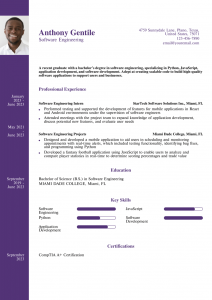
Student Resume Examples and Templates

Build a Resume to Enhance Your Career
- How To Include Extracurriculars on an Entry-Level Resume Learn More
- How To Include Personal and Academic Projects on Your Resume Learn More
- The Best Questions to Ask in a Job Interview Learn More
Essential Guides for Your Job Search
- How to Write a Resume Learn More
- How to Write a Cover Letter Learn More
- Thank You Note Examples Learn More
- Resignation Letter Examples Learn More


Build my resume
- Build a better resume in minutes
- Resume examples
- 2,000+ examples that work in 2024
- Resume templates
- Free templates for all levels
- Cover letters
- Cover letter generator
- It's like magic, we promise
- Cover letter examples
- Free downloads in Word & Docs
13 Entry-Level Resume Examples That Landed Jobs in 2024
Entry-Level Accounting

Best for senior and mid-level candidates
There’s plenty of room in our elegant resume template to add your professional experience while impressing recruiters with a sleek design.
Resume Builder
Like this template? Customize this resume and make it your own with the help of our Al-powered suggestions, accent colors, and modern fonts.
- Entry-Level Resumes A-L
- Entry-Level Resumes M-Z
- Writing Your Resume
Writing a resume for an entry-level anything can be stressful—luckily, Michael had a pretty good idea of how to spin college and internship experiences in his favor. But how should he showcase his skills on paper and build a resume that would lead him toward a bright future?
A bit nervous, but excited to take on the challenge of landing an entry-level accounting job, Michael reviewed some resume tips while researching his next steps. He loved the idea of including a “Projects” section to really highlight his ambition and investment in learning more about his field. And boy, was he excited when he landed that start date!
If you’re eager to build your own success story, read on for more advice and entry-level resume examples to go with your AI cover letter !

Entry-Level Accounting Resume
or download as PDF
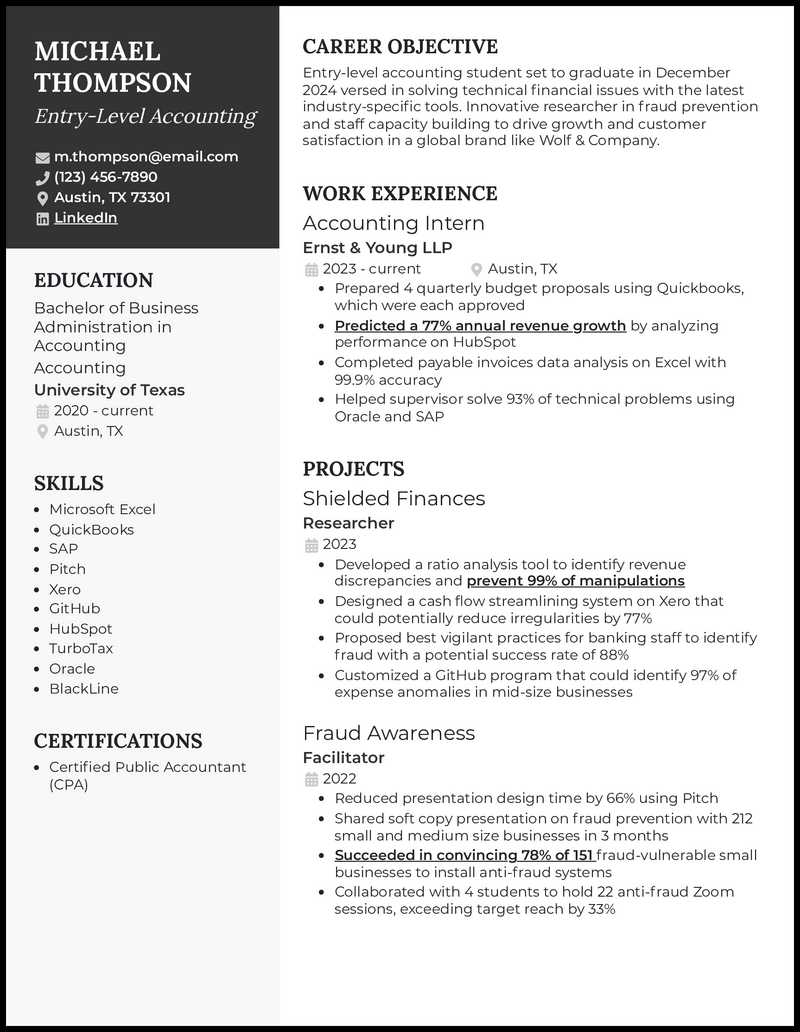
Why this resume works
- Highlight your numeracy and research skills and familiarity with accounting tools, such as QuickBooks and Excel.
Learn how to land a job
Get the free 4-day email course for college students and recent grads.
Entry-Level Data Analyst Resume Example

- These projects don’t have to be huge open-source types with thousands of users. Did you ever build a project to scratch your own itch? Then talk about it!
- Need more room? These story-telling details are a perfect storm for an effective entry-level cover letter .
- If you’ve had the chance to have an internship experience, then be sure to quantify the impact of that work on your entry-level data analyst resume. Did you save time? Increase revenue? Improve customer satisfaction? Any way to quantify your results will improve the quality of your resume .
Entry-Level Engineer Resume
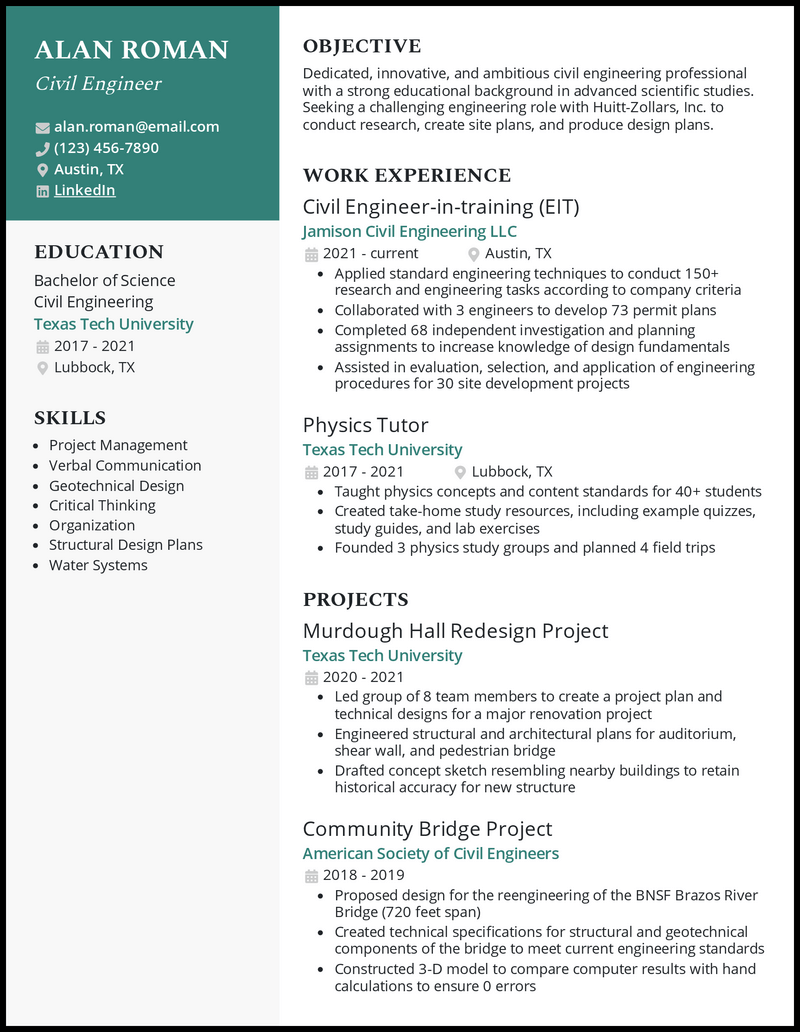
- Starting your engineering career is a classic catch-22. When you’re trying to get your first engineering job, employers say you need experience. But to get engineering experience, you have to get your first engineering job. Cue endless cycle.
- But although employers “require” you to have experience, what they really want is for you to have the skills to complete the job. More often than not, all you need is a degree and some soft skills like organization and project management in your resume’s skills section .
- Tailor it to match the job description’s keywords, including them in a few of your work experience bullet points and your resume objective (if you decide to use an objective).
- Lastly, if you’re freshly out of school, you can leverage any projects you worked on that apply to the listed requirements. They’re an excellent way to show your skills and initiative in place of work history.
Entry-Level Healthcare Resume
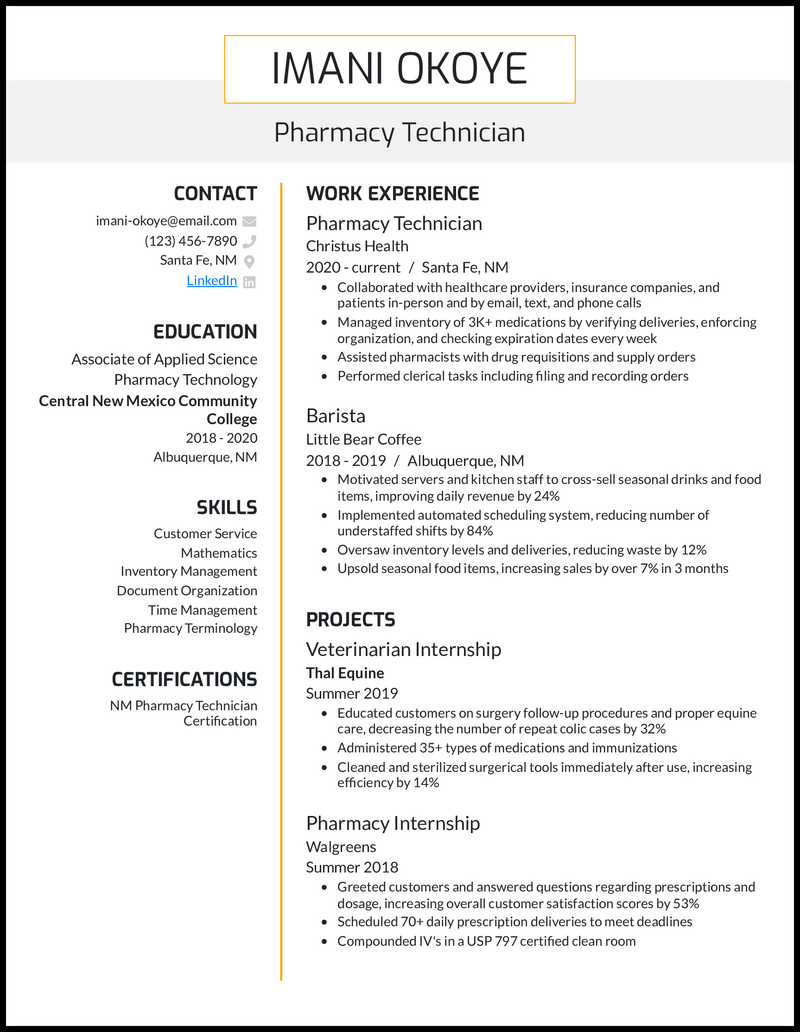
- Starting off with the right resume template and formatting your resume properly can save you oodles of time and set you in the right direction as you begin writing your entry-level healthcare resume.
- Work in the form of internships, volunteering, projects, and surprisingly, even relevant interests and hobbies can be included on your resume .
Entry-Level HR Resume

- Think about an internship, school project, or even coursework that polished a proficiency relevant to the role. See how James gives his entry level HR resume a clever twist by pointing to his successful “Navigating Workplace Harmony” project presentation and research for the “HR Trends in Modern Workplace” project.
Business Analyst Entry Level Resume

- That’s all you gotta do as well. If you can whip out impactful projects from university days like participating in a pitching contest or presenting market analysis reports, it can be more than enough to prove that you’re ready to test your expertise in a corporate setting.
Entry-Level Marketing Resume
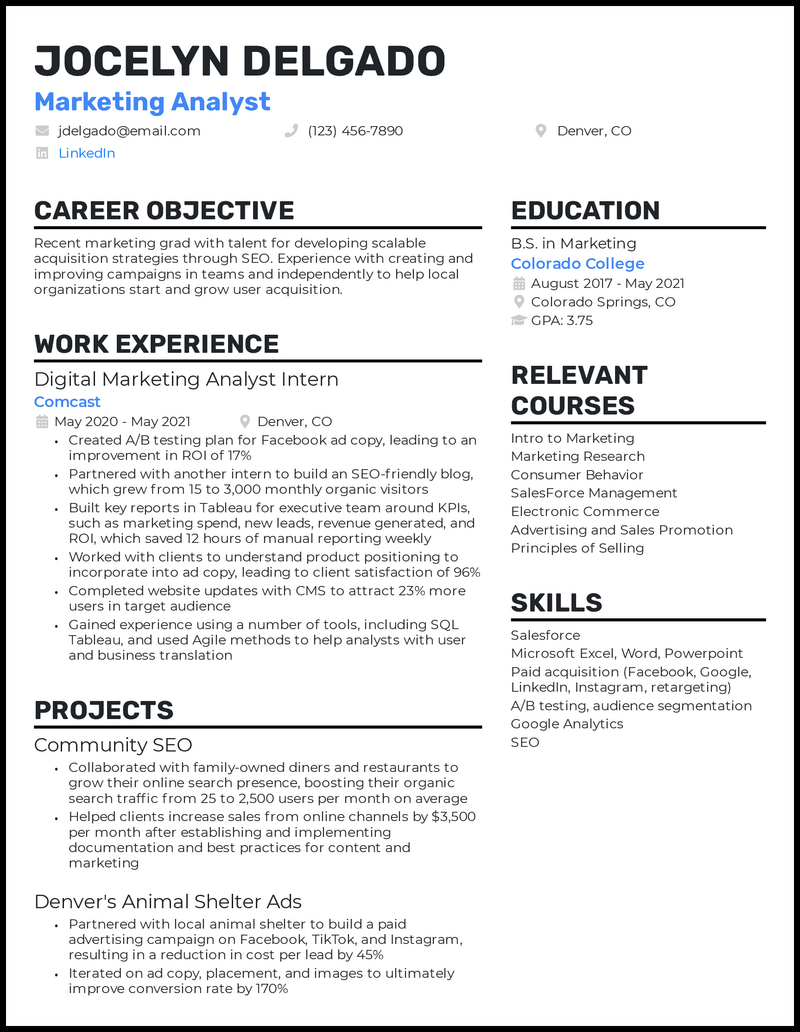
- As a marketer, you know that the most important metric you ultimately need to drive is revenue. If you’ve had a marketing internship when applying for your first full-time role, you should focus on how your marketing efforts impacted the bottom line.
- Volunteering for a local business or charity to help them with marketing is a great way to get some preliminary marketing experience under your belt. You can then leverage this experience into landing your first full-time marketing role.
- In the resume skills section of your entry-level marketing analyst resume be sure to state all of the channels (both paid and organic) that you’re comfortable with. Since you’re looking for an entry-level role, this list doesn’t need to be exhaustive! It’s okay if that’s one to two channels when you start your career.
Entry-Level Nurse Resume
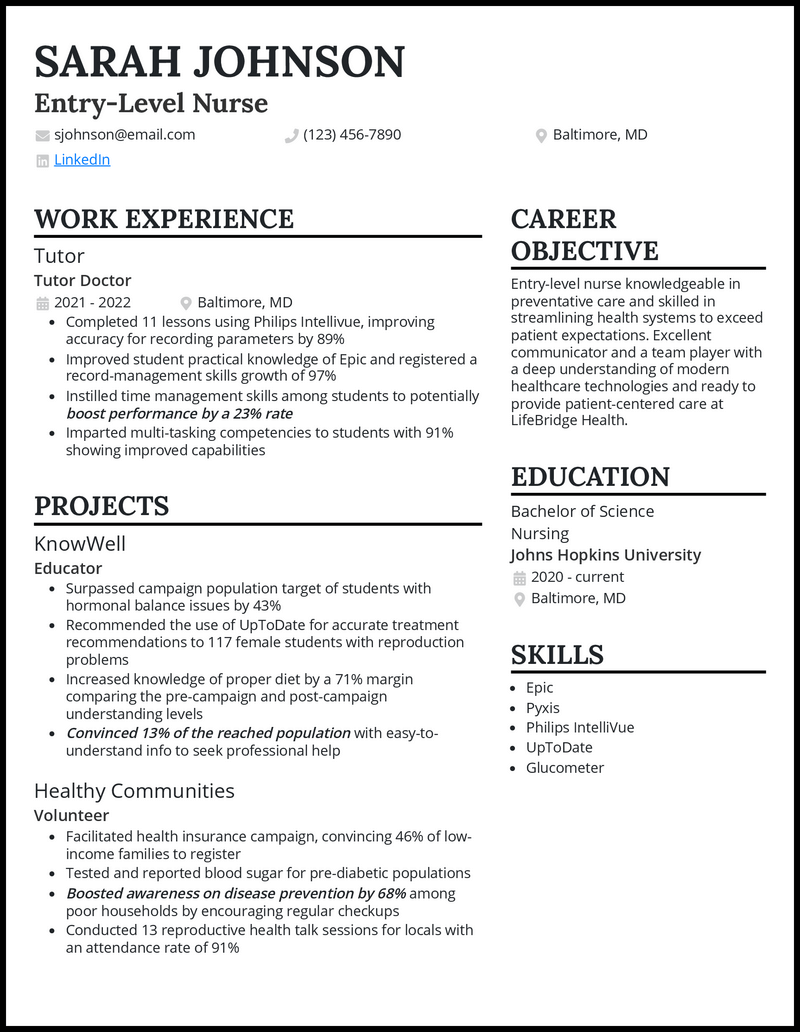
- Vividly show your achievements in your entry-level nurse resume as an educator and highlight your voluntary roles to benefit disadvantaged groups.
Entry-Level Phlebotomy Resume

- When well-aligned with the hiring company’s needs and goals, a career objective does wonders. It parades your ambition and commitment—some real heavyweights that could set you apart from the competition, regardless of your low experience level.
Entry-Level Recruiter Resume
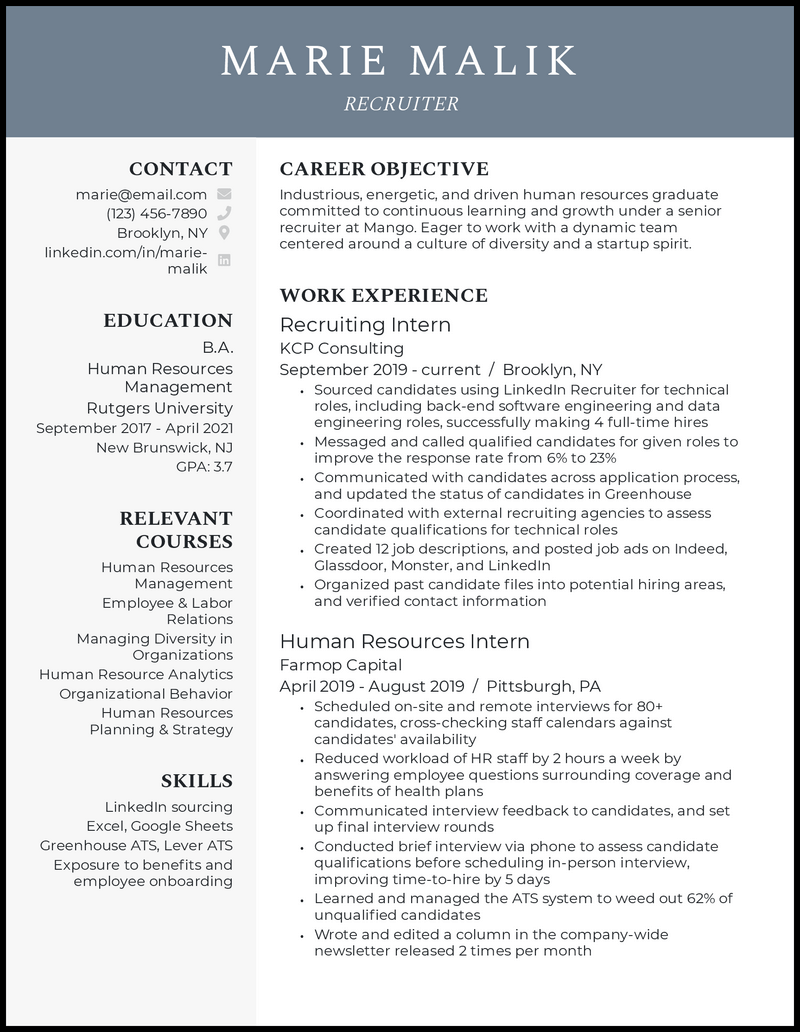
- Lead with your strengths on your entry-level recruiter resume. More often than not, this will be your education.
- As you progress in your career, your education section will take up less and less space on your resume, but right now, it’ll consume a sizable amount of real estate. Starting with a resume outline can help you fill in some of these important details.
- These statements can, however, set your resume apart from the crowd when customized to the target job:
- Great objectives (for entry-level) and summaries (for 10+ years of experience) mention the business by name, use power-packed, concise language, and sprinkle some metrics describing previous job achievements.
Entry-Level Sales Resume
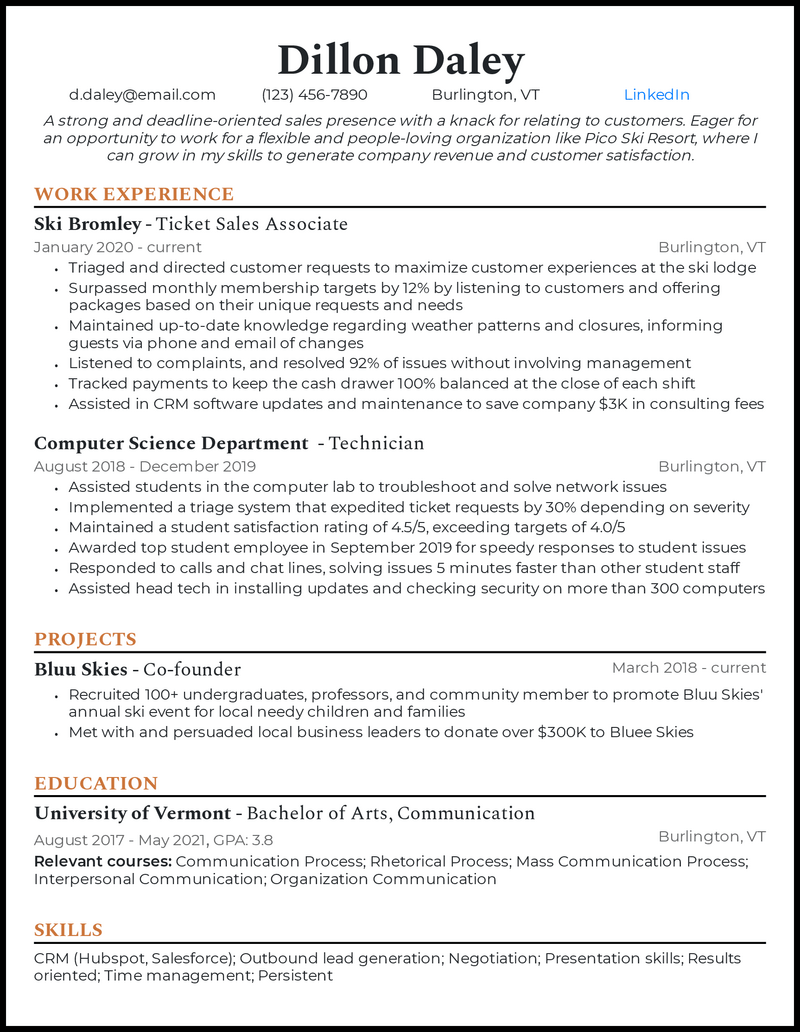
- Having a job, regardless of what it is, demonstrates responsibility—one of the most in-demand skills for entry-level candidates.
- With that said, you should still try to make your experience as relevant as possible to the sales role you’re applying for. For example, to be successful in sales, you need effective time management skills. Thankfully, almost all jobs require the ability to manage time, so it’s an inherently universal and valuable skill!
Entry-Level Software Developer Resume

- Listing one to two programming languages you know really well is much wiser than mentioning four to five languages you have novice familiarity with. You’ll end up looking foolish—or worse, dishonest during the interview!
- If you include a skill on your resume , you should be comfortable answering interview questions about it.
Project Manager Entry Level Resume

- If you’re creating your project manager entry level resume and can’t find any reasonable past experience, then use the career objective to impress employers. Pick out key impacts from your projects. Were you part of a volunteering team? Don’t just say it, describe how you managed volunteers using project management tools like Toggle or Asana.
Related resume guides
- College Graduate
- Grad School
- Administrative Assistant
Writing Your Entry-Level Resume

There’s no silver bullet when it comes to resume templates . You can use nearly any template and make an effective entry-level resume. Just be sure to follow a few rules:
- Make sure your resume is readable. Make the job of the person reviewing your resume as easy as possible.
- Keep your resume to one page. Your resume should only stretch to two pages when you have five or more years of experience.
- The resume sections you need: work experience, skills, education, and contact info. The rest are optional.
- Please, please, avoid spelling and grammar errors. Triple-check your resume; then, have a friend read it.
All of these rules are in service of one goal: make it as easy as possible for the person reviewing your resume to come away convinced that you deserve an interview for the role you’re applying to.
Stretching your resume to two pages or inserting big blocks of text goes directly against this goal.
Insert plenty of white space, avoid really small font, and use big headings.
Resume summary or sesume objective?
Have you ever opened a book or article because the title was compelling just to read the introduction to be disappointed?
Think of the resume summary or resume objective as the introduction paragraph to your resume.
Before we dive into how to make an effective summary or objective, let’s get some definitions out of the way:
- Resume summary: Used for experienced professionals to recap some of their career highlights.
- Resume objective: A short statement of a candidate’s key skills or qualifications as well as why they’re a good fit for a specific job.
As you can imagine, a resume objective is more suitable for an entry-level candidate.
Keep in mind that, unlike an introduction for a book, a resume objective is not required for your resume.
In fact, 95 percent of entry-level resumes should omit a resume objective!
Why? Because most resume objectives don’t increase a candidate’s chances of getting an interview.
To ensure you write a resume objective in the top five percent of applicants, follow these rules:
- Customize it for each job you apply to.
- Don’t be afraid to be personal about why you’re interested in the role or career you’re applying to.
- Keep it to two to three sentences. Any more and it will be ignored by the hiring manager.
- State your top one to two qualifications for the role you’re applying for.
I know, this seems like a lot to fit in two to three sentences. To help give you some inspiration, here are a few examples of effective entry-level resume objectives.
Entry-level resume objective examples
- “Prospective data analyst who strives to pose and answer questions with quantitative-driven insights. Through the development of personal projects I’ve learned the importance of having an iterative, hypothesis-oriented approach to analysis and I’m excited to leverage that approach at Acme Corp as a data analyst.”
- “Recent computer science graduate with a passion for developing scalable web applications and working across the full stack. I’ve built two web apps from the ground up using React, Node, and PostgreSQL.”
- “Retail sales associate with experience working directly with customers to ensure their satisfaction. Looking for an opportunity to work for a KPI-focused organization where I can grow like Acme Corp.”
- “Recent marketing graduate with a passion for developing scale-able acquisition strategies through paid acquisition and SEO. I have experience creating and improving campaigns in the context of a big team and I worked independently to help local organizations start and grow their user acquisition.”
Make any experience relevant
What on earth are you supposed to include on your entry-level resume when you don’t yet have relevant experience?
The answer, frankly, is anything that you can make seem relevant to the role you’re applying for.
I’m a firm believer that any work experience has skills that are transferable to other jobs.
Hiring managers understand that early in your career you may not have a ton of relevant industry experience to draw on.
That’s okay! Having a job, whether that’s a part-time summer job or an entirely unrelated full-time position demonstrates responsibility.
So don’t be hesitant to include any employment you’ve had in the past. Own it!
Still, there is another way to demonstrate to prospective employers that you’re qualified to do the entry-level job you’re applying to: projects.
These can be projects you did as part of a class or projects you undertook to satiate your own curiosity. Projects demonstrate a few things to employers:
- You have a real interest in the industry you’re seeking employment in.
- You take initiative (a very desirable trait for entry-level candidates).
- A level of expertise in your field.
Projects can truly be anything. To give you a better sense of that, here are some project ideas for different entry-level positions:
Project ideas for entry-level resumes
- Did you build a social media following for a club or organization you were part of or implement a successful SEO initiative?
- As part of a class, did you build out a comprehensive case study or hiring process for a real or fictional company? Talk about it.
- Did you build a web app to help your friends decide on which movie to watch next? What kind of programs have you developed in class?
- Can you do a deep dive on a company you’re interested in and build a presentation around a new market they can expand into or a new product offering they can develop?
- Can you try to join a hackathon and shape the vision of a product to build? Can you choose your favorite consumer web app and detail any changes you’d make?
- Pose a question you’ve always wanted to answer; then collect and analyze data to answer that question and put it in a blog post.
Which skills should you include?
When it comes to the skills to include on your entry-level resume, it’s better to include a few skills you know very well than a laundry list of skills you kind of know.
Put yourself in the shoes of the hiring manager. Isn’t it a little suspicious for an entry-level candidate to be an expert in 10+ skills?
You should include your relevant skills in a dedicated “skills” section on your resume and also include the context in which you used those skills in a work experience or project.
How do you know what skills to list for a given job?
- If you’re looking for a technical role, be sure to include programming languages or relevant technologies.
- Read the job description of the job you’re applying to.
- If so, list those skills!
- If not, are there skills mentioned in the job description you have that weren’t on your list?
It’s important to customize the skills that you include on your resume for each job you’re applying to because before a human reads your resume, an automated system called an Applicant Tracking System (ATS) will read it.
The ATS is checking whether or not your resume contains certain keywords mentioned in the job description. So it’s worth the time to customize your skills section for each entry-level role you’re applying to!

• We’ll show you how, step-by-step • Real, practical tips and tools • 100% free
10 Tips for Writing an Entry-Level Resume That’ll Get Your Career Started Right (Plus an Example)

Getting an “entry-level job” sounds like it should be easy, but when you pull up job descriptions and see the lists of skills and experiences companies are looking for, the prospect can be overwhelming. You know you’re ready to start a great career, but how do you convince someone to give you an entry-level job? That’s where an entry-level resume comes in. You may already have a resume you created to get a job while in high school or college , or to land an internship , but making a resume for an entry-level job can be a little different.
A resume is a document that showcases to potential employers why they should hire you. Generally, past work experience makes up the bulk of it. So what do you do when you’re just getting started and don’t have much (or any) past work experience to put on a resume? Or what if you do have past jobs, but you’re not sure if they apply to the entry-level job you’re looking at?
Read on to find out what recruiters are looking for in an entry-level resume and get tips for making your own—and skip to the end to get an example.
What Are Recruiters Looking for in an Entry-Level Resume?
Despite any horror stories you may have heard about entry-level jobs that require five or more years experience, most companies consider people with zero to three years of work experience to be candidates for entry-level jobs. And recruiters looking at these resumes adjust their expectations accordingly.
With “entry-level resumes, you go in with the assumption that someone isn’t going to have a lot of experience,” says Muse career coach Yolanda Owens , founder of Career Sensei and college corporate recruiter for over twenty years. So what are they looking for in an entry-level resume? How are they making judgements about entry-level candidates?
When recruiters look at an entry-level (or any) resume, they want to know why you’re applying for the job. If you majored in accounting and everything on your resume focuses on that, but you applied for a job in marketing, recruiters aren’t going to understand why and they’ll probably move you to the rejection pile. But if you show that you had a marketing internship you excelled in or took a lot of communications and marketing classes, that makes your motivations a whole lot clearer.
Your resume is a single page that is supposed to convince the person who reads it to call you for an interview. So it has to be relevant to the job they’re hiring for. That’s why you shouldn’t send out the exact same resume to every company with an entry-level opening. You’re unlikely to ever get a response that way. Instead, make sure you know why you’re applying for each role and tailor every section on your resume accordingly.
Personality
There are two major components to every single hiring decision: qualifications and personality. When you join a company, you’re joining a team, and hiring managers want to know that you’ll be a great addition. So where you can, you want to make sure your resume shows who you are as a person and how you’re unique among all the other applicants in the pile.
As a recruiter, Owens would often reject resumes where she could tell that the candidate “sprinkled in a bunch of buzzwords” and didn’t attempt to show the individual beyond the piece of paper. That’s because she couldn’t picture who they’d be as an employee and as a colleague. And don’t think that there’s a “correct” personality for every workplace. Every company (or even team within a company) has its own environment and group dynamics, and there’s definitely somewhere where you’ll be at home, just as you are.
Your resume summary (more on that below) is a great place to show your personality, as are your accomplishments and choices of activities.
Transferable Skills
When you’re first joining the workforce, you’re going to be lighter on skills that come directly from a past job in your field. That’s inevitable, and recruiters know it. Instead, they’re looking for your transferable skills . These are skills that you’ve used and developed through past experiences—including part-time jobs, internships, classes, and extracurricular activities—that can be applied to a number of different career paths. These might be things like communication, organization, time management, customer service, teamwork, and general office skills. For example, if you’ve worked in a fast food position, you likely have customer service experience that will translate to a sales position.
As you look back on all of your experiences, think about what you learned that could serve you well in the workplace. Did you have to figure out how to communicate with a group that disagreed? Did you have to plan a lot of small pieces of a large project in order to get everything done by a deadline? Did you have to work within a budget or convince local businesses to donate something or a charity event? These types of things are transferable skills. Just make sure they’re related to the description of the job you’re applying for before you put them on your resume, says Muse career coach Jennifer Smith , founder of Flourish Careers and former college recruiter.
Leadership Experience
Recruiters love to see leadership experience on a resume. Not because they expect you to fill a management role (obviously!), but because it signals to recruiters that you have some teamwork skills, know how to make decisions, and may have experience working with budget among other things—all in a somewhat professional capacity, Owens says.
“College provides a lot of opportunities for folks to be leaders,” Smith says, whether that’s through clubs and professional groups, fraternities and sororities, volunteer organizations, or sports teams, and leaders of these groups are often required to do things that often come up in a professional work environment. So look for opportunities to call attention to leadership experience on your resume. Even if you didn’t hold an official position, if you took the lead on organizing something that still counts.
If you held a leadership role in a past job, whether that’s as a store manager, assistant manager, shift lead, new employee trainer, or even a senior team member with additional responsibilities, definitely highlight that as well. Even if it’s not exactly on your current career path, it’s very valuable experience that proves you have a number of transferable skills.
So now that you know what recruiters are looking for on an entry-level resume, how do you go about putting one together?
1. Put Your Contact Information Front and Center
Your name and contact information should always be at the top of your resume. This includes your phone number, your email address (make sure it’s a professional-sounding one), and your LinkedIn URL (you do have a LinkedIn profile , right?). If it’s applicable to the field you’re trying to enter, you might also consider a link to your personal website or online portfolio .
As an entry-level candidate, you might be wondering whether or not to include a location—especially if you just finished school and intend to move somewhere new. The answer depends. If you’re applying to jobs where you currently live, go ahead and include your city and state—full mailing address not needed. If you’re applying to jobs in an area where you’re definitely planning to move, you can leave off your current location and write “Relocating to [City, State]” at the top of your resume or mention your plans to move in your cover letter.
If you’re not sure where you’re headed, Smith recommends leaving your location off your resume. If you list an out-of-area location, you risk getting disqualified by a recruiter who has no relocation budget. But if you leave it off entirely, you could land an interview and allow the company to learn more about you before discussing location. This isn’t likely to create a relocation budget where none exists, but it will get you considered for a role if you’re able to move without financial support from the company.
2. Use a Resume Summary to Help You Stand Out (Optional)
Below your name and contact info, consider adding a resume summary (not an outdated resume objective ). A resume summary consists of a few short sentences describing who you are as a candidate and as a person. For later-career candidates, a summary often talks about past full-time roles and key career achievements, but as an entry-level candidate you can use this space to get a bit more in-depth about who you are. Resume summaries are completely optional, but this is a place where you can really make a connection with a recruiter and have them think of you as a person, and not just words on a page.
In a resume summary you can (briefly) describe your key skills, what you’re passionate about, and what you have to offer this organization that’s going to set you apart. Candidates just entering a field often have fresh ideas and a lot of energy and enthusiasm, Smith says. And a resume summary is a great place to show that off.
Perhaps most importantly, your summary should also look to the future. After you describe who you are, spend a sentence or two talking about where you want to go and what you hope to bring to this specific job.
Here’s one example of what a resume summary might look like for an entry-level candidate:
Enthusiastic and creative recent grad with passion for communications, design, and the environment. Created graphics and written copy as part of social media strategies to grow personal, business, student group, and cute dog social media accounts by a combined 2 million followers across Facebook, Twitter, and Instagram. Active in Rutgers’ chapter of the Sierra Club for 4 years and dedicated to helping educate people about climate change.
3. Emphasize Your Education
If you’ve ever looked at the resume of someone several years into their career, you may have noticed that their “Education” section was at the bottom of the page. But this isn’t the case for entry-level resumes. Putting your education right below your contact information or summary (along with your graduation date or expected graduation date) immediately lets the reader know that you’re in the very early stages of your career, Owens says. This adjusts their expectations of what sort of experience you’re likely to have, so they won’t go in looking for several past jobs in your field when you’re about to showcase mostly internships, coursework, extracurricular activities, part-time or temporary jobs, and unrelated jobs.
Beyond your graduation date, you should list the name of each school you’ve attended after high school, its location, your degree (bachelor’s, associates, master’s, etc.), your major, and any minors or concentrations. If you don’t have a college degree, you should list the name of your high school, its location, and your graduation date. If you did any study abroad programs, list those as their own schools, but make it explicit that they were study abroad programs. This is also the section to list any relevant certificate, training programs, or online classes that you’ve completed along with the school or organization you completed them through and the date (or anticipated date) of completion.
Under the applicable school, you should also list any honors, scholarships, and awards you received along with a short description of what each accolade is or why you were given it. You should list your GPA if the job description asks for it. Otherwise it’s optional, but only list it if it’s above a 3.5.
From there, you want to consider the job you’re applying to when deciding what else to share. If you completed a capstone project, thesis, or another major project, you should list that, but tailor your description to the specific job. For example, let’s say you did a capstone project that involved coming up with a business plan. If you’re applying for software development positions, emphasize the part of the project where you coded a website from scratch. But if you’re pursuing a marketing role, you might want to call attention to the way you planned to advertise your business to potential customers.
You can also list relevant coursework, but make sure it’s obvious why it’s relevant. For example, say you have a business degree and took five finance classes without a formal concentration. When you apply to finance roles, listing those courses will show that you have background knowledge. If you have a general biology degree and are applying to work in a neuroscience lab, you can list the neuroscience and anatomy courses you took. A “relevant coursework” bullet point can also show how you obtained a key skill for the job you want. But don’t just list classes you think sound impressive unless they’re directly relevant to the job you’re applying to.
4. Show That You Have the Right Experience for the Job
On a resume for somebody further along in their career, “experience” almost always focuses primarily on current and past paid jobs. For an entry-level candidate, experience can come from many places:
- Relevant internships, apprenticeships, or co-ops are the first thing that many recruiters will look for on an entry-level resume. But they’re far from the only thing that counts as experience. Most recruiters and hiring managers recognize that not everyone can afford to do an internship—particularly in fields where they often pay little or nothing.
- Part-time or full-time jobs are still professional experience even when they’re not directly related to your future career path. They’re a great place to look for those transferable skills, and they show hiring managers that as a baseline, you have experience showing up, completing tasks, and getting along in a workplace environment. Further, “if someone worked and went to college they’re obviously juggling a lot,” Smith says, and that speaks to a candidate’s work ethic and time management skills.
- Volunteer work also counts as experience especially if you led the effort or played a big part in it, Smith says. Volunteer work can show a wealth of transferable skills whether or not it’s directly relevant to your field—but definitely emphasize it if it is.
- Activities, organizations, and affiliations show your interests and personality, but they can also show transferable skills and leadership experience. If you were in a leadership or officer position, you likely had to organize well, communicate effectively, manage your time, and motivate other members of your group. You may have also had to deal with money or show good customer service. Even if you didn’t lead the group but consistently participated, you likely showed these skills and can list what you did as part of the organization.
- Relevant projects can be things that you did on your own or as part of your coursework. If you took classes in school that were not part of your major, but are relevant to the jobs you want to pursue, highlighting a project is a great way to showcase your interests and skills outside of your major. The same goes for if you pursued something non-academic like starting an online business. Even if the project doesn’t directly map onto the job you want, you can still demonstrate transferable skills.
Once you know what experience you want to talk about, you should decide how you’ll split it up into sections. You can use the bullets above that apply to you and make each its own section—labeled “Internship Experience,” “Volunteer Work,” “Activities,” and more—or you might want to have “Related Experience” and “Other Experience” sections if the experiences that are most directly relevant to your job search span across several of the above categories. You can also do things like combine internships and paid jobs into a single section called “Professional Experience” or list relevant projects in the education section. What’s most important is presenting your story in a way that’s easy to read and makes it clear why you’re the right person for the job.
5. Craft Strong Bullet Points
When it comes to listing your experience, just stating your past positions or the activities you were part of isn’t enough. Under every entry, you need to include bullet points describing what you did and what you achieved. These bullet points might be the most important part of your resume with the most real estate devoted to them, so they deserve time and attention.
“Don’t focus on the mundane daily duties, talk about your accomplishments,” Owens says. If you were a salesperson in a retail store, recruiters know the basic job duties that entails. But they won’t know that you made more sales than anyone else in the month of December—unless you tell them. If you had an internship with a major company in your field, it’s likely that you assisted the staff with daily tasks, but it’s unique to you that you were part of a team that conceived of a new marketing campaign that boosted sales by 50% in a month and wrote the copy for the campaign’s social media posts. In your bullet points, write about “what you did that made the project, company, or job better and what you did that moved the needle,” Owens says.
Whenever possible, you want to quantify your bullet points in order to be more specific and memorable and to call attention to the results you got. Which sounds better? “Led tutoring sessions,” or, “Led tutoring sessions for up to 30 students twice a week, leading to an average 10% test score increase”?
These bullet points are also where you can work in your transferable skills. If these skills are things like software or techniques, be sure to name them. If they’re softer skills like organization, communication, or collaboration, you can use action verbs to insert them into your bullet points seamlessly. Anyone can list out skills in a skills section (and you should), but putting them into context shows the person reading your resume how you’ve actually used your skills in real-life situations and how you’ll use them to help their company.
6. Show Off Your Skills (Again)
Your resume should also have a skills section where you list out all of the skills you have that match what a job description asks for. Don’t list skills you don’t have just because you think they sound good. If someone asks (and they will), you should be able to explain how you obtained this skill or how you’ve used it.
This section is often the place to focus on software and technical skills, Smith says. Technology changes so rapidly that new grads and other entry-level folks are often more up to date in this area than later-career professionals, so you definitely want to use that to your advantage.
Make sure to be specific, Owens says. Don’t list “coding” in your skills section, list out the programming languages you know. Don’t say “project management software,” say “Asana” or “Trello.” You also want to keep it modern. Unless the job description specifies it, “typing” doesn’t need to go in your skills section. The same goes for general “Microsoft Office,” though listing specific programs or skills like “Excel” or “pivot tables” is still fair game.
7. Include Relevant Keywords
As you’re preparing your resume for a specific job, take a close look at the job description and note the language they use. You want to match this language as closely as possible when it comes to the specific keywords. For example, if they’re looking for someone who has experience with Final Cut Pro, don’t just put “video editing” on your resume—make sure to include “Final Cut Pro” in your skills section (assuming you actually know how to use it!).
Why? Many companies use applicant tracking systems (or ATSs) —programs that scan your resume looking for keywords found in the job description and forward the resumes with the most matches to a hiring manager or recruiter. While this software is getting more advanced and adept at recognizing synonyms and different phrasing, it’s always best to be cautious and list keywords exactly as they appear in the job description.
8. Format Your Resume So It’s Easy to Read (by Computers and Humans!)
You may have seen those fancy, flashy resumes with graphics and tables to show your skills. You may even be tempted to shell out some money for a heavily designed template. Don’t.
If you’re applying online, you should assume your resume will have to pass through an ATS. The software parses text only, so not only will much of your formatting be lost, your text could even get left out or jumbled if the ATS can’t “read” it.
ATS aside, actual human recruiters often only have a few seconds to take a first look at a resume, and you want to make sure they can find what they’re looking for quickly. This means your resume should be highly skimmable with easy-to-read formatting, clear section headings, and lots of white space. Smith looks for resumes that are “smart, succinct, and professional looking” and, to be clear, “professional looking” doesn’t mean highly stylized.
So keep your formatting consistent and use bold, italics, and underlining when you want text to stand out. You can also make headings and your name a larger font size and use color in a way that emphasizes but doesn't distract. Stick to the classic fonts as well—no Comic Sans, handwriting fonts, or anything that doesn’t come preinstalled on most word processors.
As an entry-level candidate, your resume should never be more than one page, but don’t feel the need to add fluff to stretch it. Recruiters understand that you’re just starting out and they’d rather see strong, relevant experience than filler.
9. Tailor Your Resume for Every Job Posting
Throughout this article, you’ve seen that the content of a section or bullet point depends on what the job description says. That means that you should be changing your resume for every job posting. Yes, it’s more work than just submitting the same doc every time. But recruiters want to look at your resume and quickly see why you’re the right person for this job, and if you don’t take the time to make your case for this job, you’re likely to be overlooked.
If you want to make a base resume to pass to people in your network who aren’t hiring for specific jobs or for you to start with to get your formatting right, you should do this by pulling up several job descriptions in your field to get a feel for what companies are generally looking for. You can also create a resume outline that lists all of your experiences and skills in one place so you have a document to draw from to make tailoring easier.
10. Proofread!
Proofread your resume to check for any typos or grammar mistakes—then step away for a few hours or days and come back to proofread it again. You can even start reading from the bottom section to help you see the text a bit differently and make it less likely you’ll skim absentmindedly.
Once you’re sure your resume is completely error-free, ask someone else to read it, too. A new set of eyes will often catch things you overlooked.
An Example Entry-Level Resume
So what does all this advice look like in action? Take a look at this example entry-level resume for a recent college grad applying to a social media job with an environmental nonprofit. You’ll see the emphasis on experience that directly relates to a role like this.
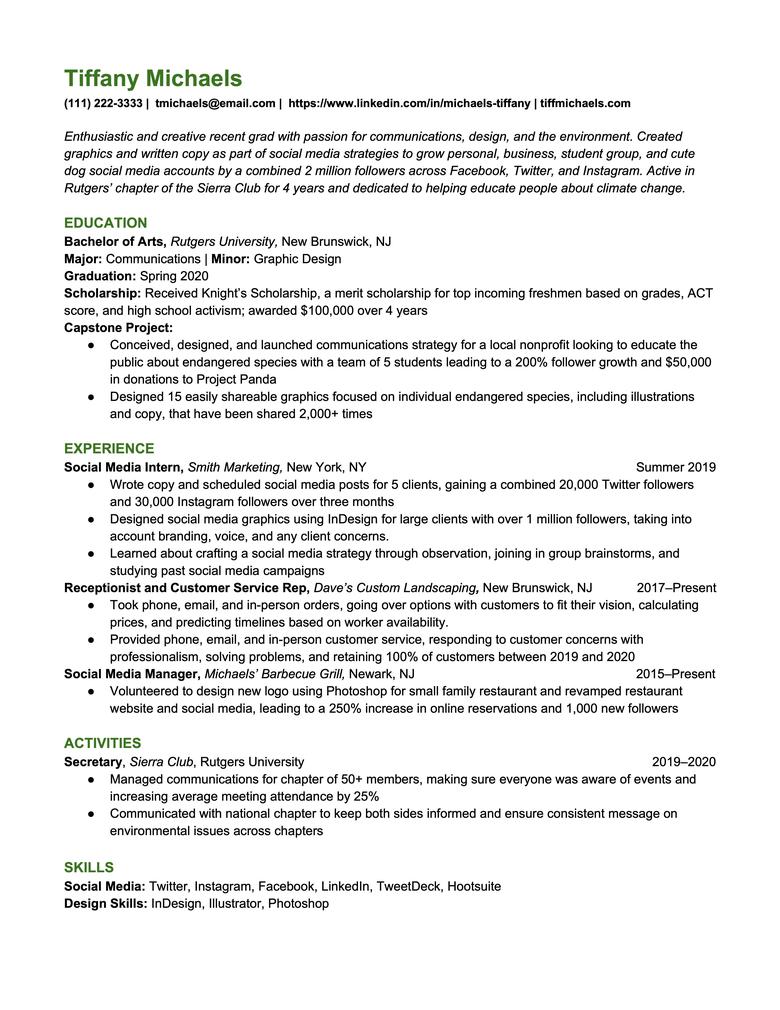
Download sample entry-level resume here
As you begin your first big job search, you might feel overwhelmed or like you’ll never get a job. And yes, some companies do post listings with unrealistic standards for entry-level hires, but that doesn’t mean there are no companies out there looking for true entry-level candidates .
Believing in yourself is a big part of job hunting when you first start out, Smith says. Know that you do have something to offer companies and be confident in your capabilities. And if trying to fit a job description has you feeling like you can't be yourself on your resume or in your interview, it might be a sign that this role or company isn’t right for you, Owens says. But don’t worry, there’s another position out there that is.
- Resume Templates Simple Professional Modern Creative View all
- Resume Examples Nurse Student Internship Teacher Accountant View all
- Resume Builder
- Cover Letter Templates Simple Professional Modern Creative View all
- Cover Letter Examples Nursing Administrative Assistant Internship Graduate Teacher View all
- Cover Letter Builder
- Resume Examples
- Entry-Level
Entry-Level resume examples & templates

Choosing the right resume format for entry-level jobs
Include your contact information, make use of a summary, outline your entry-level work experience, include the relevant key skills that make you a great entry-level candidate, pick the right resume layout and design for an entry-level resume, what type of salary you can expect in entry-level roles.
An entry-level job is the starting point of virtually any career. These positions allow you to transition into the workforce after you’ve completed a college degree or another form of education.
.jpg)
But here’s the truth about entry-level jobs: they’re becoming increasingly competitive. As employers look to hire candidates with the right blend of skills and culture fit, they often ask for a level of experience once thought to be above the typical entry-level position.
So how do you stand out and win one of these coveted roles? By creating an exceptional resume that highlights the strengths you do have.
This entry-level resume example and guide is designed to walk you through the process.
Resume guide for an entry-level resume
Accelerate success with Resume.io. Our guides and resume examples cover over 500 professions, and our resume builder makes creating a compelling resume easier than ever.
This resume guide and corresponding entry-level resume example will cover the following:
- How to write an entry-level resume
- How to add your contact information
- Using summaries
- Adding your experience
- Listing education and relevant experience
- Picking the right resume design/layout
- What the entry-level job market looks like, and what salary you can expect
How to write an entry-level job resume
The very first step in writing your entry-level resume is understanding what sections to include. Your resume should contain the following elements:
- The resume header
- The resume summary (aka profile or personal statement)
- The employment history section
- The resume skills section
- The education section
Even if you have limited experience, your entry-level job resume should be crafted to highlight your unique traits and the fresh perspective you can bring to the workplace.
If you’re a college graduate, your degree is no longer enough to get your foot in the door. You’ll also need to highlight a variety of internships , activities, and industry-related experiences that show you’re a motivated candidate ready to dive into your field.
While writing your entry-level resume, consider this winning formula:
- Employers are now more interested in accomplishments than responsibilities. Whether it was a job, internship, or academic activity, make sure your resume mentions concrete achievements as opposed to simple duties.
- Your resume should be tailored to each employer you apply to. Customizing your resume means updating the skills and employment history bullet points to match the needs of the company, and also including the employer's name and the job title in your professional summary.
- Make sure your application sends a message of professionalism through the layout and formatting. When submitting online, optimize your resume with appropriate keywords so it won’t be filtered out by ATS screening software . Consider using an ATS resume template .
Optimize for the ATS
If you’re a recent grad, you may not be aware that a human hiring manager won’t be the first “person” to read your resume. Virtually all medium and large companies now use ATS recruitment software built into online hiring portals to screen and evaluate candidates. ATS stands for Applicant Tracking Systems.
These algorithms scan resumes for keywords—usually programmed in from the job description. Only the highest-ranking resumes pass through to be reviewed by the hiring manager while the rest get filtered out.
Luckily, there are a few steps you can take to increase your chances of making it past this hurdle:
- Make sure to read the job description closely and highlight any duties or skills that are relevant to the employer.
- Place these “keywords” throughout your resume where appropriate for your skills and experience.
- Use the employer’s exact language to ensure that the ATS picks up the keywords you’ve included.
- Never try to cheat the ATS by adding excessive keywords or lying about your experience—the hiring manager will find out soon enough!
To learn more about conquering the ATS, check out our article on resume ATS optimization .
Choosing the right resume format for entry-level jobs can be tricky. You may not have a ton of experience to show, yet you still want to appear competitive and motivated in the eyes of the hiring manager.
If you’ve completed at least three internships, jobs, or other semi-professional experiences, we recommend that you stick with the reverse chronological resume format. This format is focused primarily on the employment history section, listed in reverse chronological order , and allows you to expand on your academic and professional experiences up to this point.
This is the format you will find in our adaptable entry-level resume example because it’s the structure that most hiring managers expect to see from professional candidates.
If you’re still a student or have virtually no experience, you may opt for the functional format . This format focuses on skills right at the top of the page and may include a very short employment history section, or no employment history section at all. A combination, or hybrid resume format , allows you to emphasize your skills while still showing a bit of previous work experience.
Your contact information is an extremely important part of your resume, which is why it’s almost always placed at the top of the resume in an attractive and eye-catching header section.
The hiring manager should be able to find your basic details in order to set up an interview. Here is some of the information to include:
- Full name & title . List your first and last name and include the name of the role from the job description.
- Professional email address . Use a clean format like [email protected] . Don’t use a quirky, unprofessional email address or an .edu even if you are a student.
- Phone number . List a number where you can be easily contacted and make sure to set up a professional voicemail greeting.
- Location . Nowadays it is only necessary to list your city and state . You can also add 'Willing to Relocate' here if applicable.
- LinkedIn . Even as a student, you should have a LinkedIn profile that is active , relevant, and shows your professional experience. Make sure to create a custom URL and add it to the top of your resume.
If applying in the U.S., Canada, or the U.K., don’t include:
- Date of birth : Not necessary and could potentially lead to age discrimination .
- Personal details : Marital status, social security number, passport number , etc.
You may want to adjust your header formatting based on the company you are applying to. Our adaptable entry-level resume sample can help you get started with creating an effective header.\
Jamie Brown
Research Assistant
090-080-0000
[email protected]
Entry-level jobseeker
Your resume summary is like the written version of your elevator pitch. These 3-4 lines at the top of the page are meant to catch the hiring manager’s attention and give them just enough information about your skills and experience to make them want to read the rest of your resume.
Here’s how to craft a great summary:
- Start with a few adjectives that describe your most impressive personality traits or amount of experience.
- Use action verbs in the simple past or present tense to talk about your accomplishments.
- Add numbers and statistics to quantify your successes and provide concrete details where possible.
- Mention key skills or educational requirements listed in the job description.
- Include the company name and the job title you’re applying for to add a personal touch.
Remember, your summary (also sometimes called a profile) should be concise and should allow the hiring manager to draw an overarching conclusion about why you might be a better choice than other entry-level candidates with the same degree.
Make sure to match the tone with that of your industry, and show off a bit of professional personality if appropriate.
Need inspiration for your summary? Check out our related resumes:
- Entry-level software engineer resume sample
- Accounting entry-level resume example
- Entry-level project management resume sample
You can find adaptable entry-level resume example summaries below:
Tech-savvy recent graduate with a degree in computer science and a passion for problem-solving and innovation. Proficient in programming languages such as Python, Java, and C++, with hands-on experience in software development and debugging. Won first place in 2024 Bay Area Hackathon. Strong analytical skills combined with a collaborative mindset, eager to contribute to the dynamic team environment as a software developer at Google.
Recent marketing graduate with a passion for leveraging social media platforms and digital marketing strategies to drive brand awareness and engagement. Skilled in market research, content creation, and campaign management. Achieved 30% follower growth for Instagram account of previous internship. A creative thinker with a strong analytical mindset, seeking an opportunity to bring fresh ideas to the HarperCollins team in a junior marketing specialist role.
Energetic and results-driven sales enthusiast with excellent communication and interpersonal skills. Recent graduate with a background in business administration and a proven ability to build rapport with clients and prospects. Thrives in fast-paced environments and eager to learn and grow within a sales role. Committed to exceeding sales targets and delivering exceptional customer service to drive revenue growth.
Even for entry-level positions, your work experience section will be a major focal point for hiring managers. Start this section by listing your current (or most recent) job or internship and working your way back to your first job.
As a general rule, stick with experience from your college years (or high school if you’re a recent high school grad). Make sure to list the job title (or internship title), employer name, dates worked, and location (add “remote” if applicable).
Under each subheading, aim to add 3-5 bullet points that describe your key duties and accomplishments in concise statements, omitting “I.” Be specific and use dynamic action verbs like led, initiated, orchestrated, developed, managed, or collaborated. We always recommend listing tangible outcomes as opposed to generic responsibilities.
Take a look at these bland bullet points:
- “Wrote blog articles for weekly student magazine”
- “Posted to social media accounts”
- “Worked with magazine staff to organize fundraising events”
Now check out these results-based points :
- “Pitched, reported, and edited 5+ weekly blogs for leading campus magazine”
- “Crafted and launched social media strategy resulting in 60% increase in followers”
- “Collaborated with magazine staff to fundraise 4K+ at monthly raffle events”
Take a look at the entry-level employment history resume sample below:
Business Analytics Intern at Google, New York May 2023 - August 2023
- Built interactive Tableau dashboards to track and visualize campaign performance data
- Identified trends in customer behavior, gaining actionable insights that led to a 5% increase in campaign clickthrough rate
- Spearheaded documentation project to catalogue processes for accessing and analyzing data
Barista & Shift Supervisor at Starbucks, San Francisco September 2021 - December 2022
- Promoted to supervisor within 6 months, quickly mastering inventory and staff management
- Improved inventory loss tracking with new processes, reducing waste by 8% per quarter
How to write an entry-level resume with no experience
Theoretically, you should be able to land an entry-level job even with no experience on your resume. However, the reality is a bit more complicated. Companies now ask for advanced degrees, years of experience, or proof of skills when hiring for entry-level roles .
The secret to writing an entry-level resume with no experience is to focus on the limited accomplishments you do have and show the hiring manager why you’re a motivated candidate who is eager to learn and contribute.
While landing an entry-level position without prior experience may require extra effort and persistence, it's certainly achievable with the right combination of skills, determination, and strategic job search tactics . Here are a few steps to take:
- Highlight transferable skills . Emphasize skills gained through education, extracurricular activities , volunteer work , or personal projects that are relevant to the job you're applying for. Transferable skills such as communication , problem-solving , teamwork , and time management are valued by employers because they are hard to teach but can be applied across a wide variety of positions.
- Tailor your resume and cover letter . Customize your resume and cover letter for each application, highlighting how your background, skills, and interests align with the requirements of the position. Your cover letter is especially useful in showcasing why you’re the right fit for the organization—even if your experience is limited.
- Networking . Here’s a secret: networking is the best way to land an entry-level job with no experience. Build relationships with professionals in your desired field through networking events, informational interviews, and online platforms like LinkedIn.
- Gain relevant certifications or training . Consider pursuing certifications, online courses, or workshops that enhance your skills and knowledge in your chosen field. Many online courses are free and give you valuable experience to place on your resume.
Your skills section might seem like just a simple list, but this section serves a key purpose in getting you past the ATS we mentioned earlier and also showing the hiring manager your interests and expertise at a glance.
Make sure to combine hard and soft skills to show that you’re a well-rounded candidate. Hard skills are technical proficiencies that are often industry-specific and are learned in courses or on the job.
However, soft skills are personal traits like motivation, communication, collaboration, and adaptability that are necessary across roles and industries. Depending on your field, employers may be more interested in hard skills than soft skills, or vice versa. Refer to the job description for an idea of what the hiring manager is looking for.
Here’s what the skills box looks like in our entry-level resume template.
- Documentation
- Excellent communication
- Budgeting and forecasting
- Data collection and analysis
- Understanding of business objectives
- Strong research ability
- Time management
- Organization Presentation
Detail your education & relevant certifications
The education section is an essential component of any entry-level resume. If you’re a recent grad, you may want to place this section above your employment history, while more experienced professionals should do the opposite.
List your degrees from most recent to oldest as you did for your work history. If you’ve completed a college degree , there’s no need to include your high school diploma . Add the degree name, school, dates attended, and location.
You can also offer 1-2 bullet points that showcase academic achievements like leadership positions, relevant coursework , or impressive grades.
Beyond formal education, this section is a great opportunity to list certifications or training relevant to your industry including training and certifications, publications , awards , or organizations. If you have multiple entries for any specific sub-category, you can consider making it a separate category.
Bachelor of Science in Business Analytics, University of San Francisco, San Francisco September 2020 - May 2023
As an entry-level candidate, your layout and design help you be taken seriously by employers and make a positive first impression.
A good layout doesn’t need to be overly colorful or flashy, but can include one or two accent colors if appropriate for your job title or industry. Above all, make sure to focus on clean lines for separating sections, clear section titles, and an eye-catching and attractive header .
Just as we recommend tailoring the content of your resume for each application, you should do the same with your layout. Reformatting your whole resume can be tedious, which is why expertly designed resume templates are a great way to test out different styles while ensuring a professional look.
It likely comes as no surprise that the salary for entry-level jobs varies widely based on industry, location, and employer.
Here are a few examples of annual salary information for some of the most common entry-level jobs in the U.S.:
- Entry-level software engineer: $72,679 to $87,153 via Salary.com
- Entry-level sales representative: $54,419 to $74,131 via Salary.com
- Entry-level customer service associate: $35,150 to $43,814 via Salary.com
- Entry-level HR coordinator: approximately $62,000 via Salary.com
- Entry-level graphic designer: approximately $60,000 via Salary.com
Entry-level resume text only example
Detail-oriented recent graduate with Bachelor’s in Business Analytics. Seeking to utilize strong analytical abilities, technical expertise in Tableau and SQL, and problem-solving skills to gain business insights as an Entry Level Business Analyst.
Employment history
Key takeaways for building an entry-level resume
While entry-level candidates may not have extensive professional experience, crafting a resume that showcases motivation along with relevant internships, part-time jobs, volunteer work, or extracurricular activities is the key to demonstrating your capabilities and landing an entry-level job.
Make sure to focus on accomplishments and responsibilities that showcase your ability to contribute effectively in a professional setting.
A strong layout and presentation is also an important part of showing a hiring manager that you take the opportunity seriously. Our online resume builder allows you to quickly create an impressive application free from costly mistakes.
Beautiful ready-to-use resume templates
Job-Winning Entry-Level Licensed Insurance Agent Resume Example & Tips
Our Resumes are featured in

- • Implemented targeted lead generation strategies that increased new client acquisitions by 15% within the first quarter.
- • Assessed client needs through structured interviews, resulting in personalized policy recommendations and a 20% increase in customer satisfaction.
- • Collaborated with the marketing team to devise social media campaigns that reached over 10,000 potential clients monthly.
- • Assisted in the preparation of financial reports and bookkeeping, ensuring a 100% accuracy rate in monthly audits.
- • Updated client records and insurance policies to comply with changing regulatory requirements, improving compliance rates by 25%.
- • Participated in training sessions to stay current with industry regulations, enhancing overall knowledge and sales capabilities.
- • Supported the sales team by managing client communications and meeting scheduling, enhancing operational efficiency by 30%.
- • Conducted market research to identify new sales opportunities, leading to a 10% growth in the client portfolio.
- • Developed and maintained client profiles to tailor insurance plans effectively, resulting in a 12% increase in plan renewals.
- • Assessed insurance claims, ensuring quick and accurate processing, which contributed to a 98% client retention rate.
- • Organized and presented at workshops that reached over 200 underprivileged youths.
- • Collaborated with a team of volunteers to create educational materials on financial and insurance literacy.
Entry-Level Licensed Insurance Agents are the backbone of the insurance industry. They serve as the first point of contact for clients, providing invaluable assistance and guidance. Their roles ensure that people can navigate life's uncertainties with a safety net in place.
You must have great communication skills and attention to detail if you're stepping into this position. Knowledge of insurance products and the ability to assess client needs will make you an asset to any team. When crafting your Entry-Level Licensed Insurance Agent resume, highlight these skills and experiences prominently to stand out.
How to Structure a Job-Winning Entry-Level Licensed Insurance Agent Resume
Crafting a compelling resume for an Entry-Level Licensed Insurance Agent is essential to jumpstarting your career in insurance. Here are the main sections that you should include on your resume:
- Contact information: Start with your full name, phone number, email address, and street address. This section ensures that potential employers can get in touch with you easily, without having to search for your details. Keeping it simple and clear makes their job easier.
- Objective statement: Your objective should be a brief statement that outlines your career goals and how they align with the company's vision. It’s crucial to tailor this section to each job application, as it provides a snapshot of your ambitions and enthusiasm. A strong objective can capture the recruiter’s attention from the get-go.
- Education: List your highest degrees first along with any relevant coursework or certifications. For an insurance agent, having knowledge in finance or business-related fields can be a significant advantage. Including your education showcases your foundational knowledge and commitment to learning.
- Licensure: Clearly mention the details of your insurance licenses, including the types and states where you're licensed. This section is vital for an insurance role, as it validates your qualifications and legal eligibility to perform in that role. Employers need to confirm that you meet the fundamental requirements for the position.
- Work experience: Even if it's not directly related to insurance, list past jobs where you developed transferable skills. Highlight achievements and responsibilities that demonstrate customer service, sales, or analytical skills. This section allows employers to see how your past experiences can benefit their team.
- Skills: List your relevant skills such as customer relationship management, sales techniques, risk analysis, and communication skills. Prioritizing skills that are directly applicable to insurance will make your resume more appealing. Employers are keen to know how your skill set will enhance their operations.
In addition to the main sections, including additional sections can further bolster your resume:
- Certifications: Besides your primary licensure, any additional certifications, such as in risk management or customer service, can highlight your dedication. These extra credentials show you’re committed to excelling in your career and continuously improving your skill set. It’s a way to stand out and demonstrate your expanded knowledge base.
- Professional affiliations: Membership in relevant industry groups or associations can elevate your resume. It indicates you’re well-connected within the industry and stay updated with industry trends. Being part of professional communities can reflect your proactive attitude towards networking and professional growth.
- Volunteer work: Including volunteer work reveals your character and willingness to give back. It can also showcase additional skills or experiences that are valuable in a workplace setting, such as leadership and team collaboration. Employers often appreciate seeing a well-rounded individual who balances professional and personal commitments.
Top Hard Skills for Entry-Level Licensed Insurance Agent Resumes
- Insurance Underwriting
- Risk Assessment
- Claims Processing
- Policy Analysis
- Compliance Understanding
- Sales Techniques
- Customer Relationship Management (CRM)
- Financial Analysis
- Product Knowledge
Top Soft Skills for Entry-Level Licensed Insurance Agent Resumes
- Communication
- Problem-Solving
- Attention to Detail
- Time Management
- Negotiation
- Adaptability
- Interpersonal Skills
Top Action Verbs for Entry-Level Licensed Insurance Agent Resumes
- Collaborated
- Communicated
- Implemented
- Investigated
Frequently Asked Questions
How long should my entry-level licensed insurance agent resume be.
Your resume should ideally be one page long. As an entry-level candidate, you likely don't have extensive work experience, so it's important to keep your resume concise and focused. Prioritize your recent educational achievements, any certifications or licenses you have obtained, and relevant internships or volunteer experiences. Highlighting the most important aspects will ensure your resume is impactful without overwhelming potential employers.
What is the best format for an Entry-Level Licensed Insurance Agent resume?
A reverse-chronological format is an excellent choice for an entry-level licensed insurance agent resume. This format lists your most recent experiences first, making it easy for employers to see your latest and most relevant credentials quickly. Start with your education, certifications, and any work experiences you have had, including internships. This format works well because it presents a clear timeline of your growth and progression.
What should I highlight on my Entry-Level Licensed Insurance Agent resume to stand out?
Make sure to emphasize your educational background, licenses, and any relevant experience, even if it's not directly in the insurance industry. Communication skills, customer service experience, and any sales achievements are particularly valuable. Additionally, if you possess skills with specific insurance software or tools, mention these as well. Your goal is to showcase your potential and readiness to adapt and thrive in the insurance industry.
What are some ways to quantify my experience on my Entry-Level Licensed Insurance Agent resume?
Quantify your experience by including specific numbers and achievements. For example, if you worked in a previous job where you handled customer inquiries, mention the volume of calls or clients you managed daily. If you were part of a sales team, include any sales targets you met or exceeded. Another example would be noting the number of policies you assisted in processing or the customer satisfaction ratings you helped achieve. These quantifiable details can provide a clearer picture of your capabilities and impact.
For more inspiration, why not check out our free resource of job-focused resume examples?

Licensed Insurance Claims Agent
Licensed Insurance Claims Agents stand as the frontline shield for individuals and businesses facing losses. Their expertise ensures that claims are evaluated fairly and settled promptly, offering a lifeline in challenging times. Without their diligence, many would find it hard to bounce back from misfortunes. To be effective, these agents must have a sharp eye for detail and excellent communication skills. Employers will value their ability to negotiate settlements and provide critical support to policyholders. When crafting your Licensed Insurance Claims Agent resume, it is crucial to highlight these competencies vividly.

Licensed Commercial Insurance Agent
Licensed Commercial Insurance Agents play a pivotal role in protecting businesses from unforeseen setbacks. They stand as the guardians of commercial enterprises, offering safety nets against financial turmoil. Their expertise can mean the difference between a thriving business and one that struggles to recover from sudden losses. To excel, these agents need sharp analytical skills and a problem-solving mindset. Companies prize their ability to assess risks, draft policies, and provide tailored advice. Your Licensed Commercial Insurance Agent resume should highlight these abilities, showcasing your capacity to protect and serve your clients effectively.

Licensed Insurance Sales Agent
Insurance sales agents hold a significant role in our financial security. Their advice and solutions help us protect the things we value most. They are the guardians of our peace of mind. To succeed, insurance agents must excel in communication, interpersonal skills, and problem-solving. Companies seek those who can confidently guide clients, understand their needs, and offer the right products. A strong Licensed Insurance Sales Agent resume should highlight these abilities and showcase relevant experience.

IMAGES
VIDEO
COMMENTS
Microsoft Office skills. Insights from 11 million resumes crafted with our builder show that: On average, the typical resume for an Entry-Level IT Worker includes 5 skills. Skills such as .NET development, programming, object-oriented programming, and software development are top choices for Junior IT Workers.
Here are the key elements to include in a resume for an entry-level IT job: Name and contact information: Your first and last name followed by your physical address, city, state, zip code and phone number should comprise the top of your resume. This gives the employer the information they need to contact you about your candidacy.
Top 5 Tips for Your Entry-Level IT Resume. All of your experience matters Remember that your resume can contain any experience that's even mildly relevant. This can mean past work in IT, such as a helpdesk technician role, but also being part of the programming club in high school; even working in retail is useful here, as it shows your experience in customer service.
Choose a good resume font like a Noto in 11-12pt. Leave 1-inch margins and plenty of white space. Limit your resume to just one page - it's what recruiters expect and prefer at entry level. Include at least these resume sections: Header, Objective/Summary, Experience (if you have any), Education, and Skills.
Entry Level IT roles focus on providing support for technology systems and ensuring smooth operations for users. Highlight your experience with troubleshooting, customer service, and any relevant technical projects on your resume. Consider incorporating skills like problem-solving, familiarity with various software, and basic network knowledge.
For inspiration, view the sample resume for an entry-level IT worker below, or download the entry-level IT resume template in Word. Entry-Level IT Jobs. Good news for you as you get your foot in the door: Jobs in IT are projected to grow by 11% over the next 10 years, which is much faster than average, according to the Bureau of Labor ...
Follow this guide to help craft a resume that helps you stand out in a competitive field. 1. Write a dynamic profile summarizing your entry-level information technology qualifications. The goal of your resume profile is to grab a recruiter or hiring manager's attention so they continue reviewing your full resume.
Your commitment to learning and growing in your career. Your ability to work effectively as part of a team. Here's a list of steps to help you create your own entry-level software developer resume: 1. Create a header at the top of your resume. A header displays relevant contact information so employers can contact you for additional questions ...
Entry-Level Software Engineer Resume. Written By The Resume Genius Team. Reviewed By Krystin Morgan. Landing your first software engineering job is never easy. Show employers that you have all the necessary technical skills with our entry-level software engineering resume sample and writing tips. December 10, 2023.
Here's how to format an entry-level software engineer resume: Layou t: use the reverse-chronological format. Subheadings: clear resume section titles make it easy to find everything in a flash. Fonts: go for modern, legible fonts. Use 12 pt for the text and 14-16 pt for section titles.
Fit your entry-level resume to the job like spandex. To do it, read the job offer, then customize your bullet points. Put resume objective just below your contact info. The education section of even a high school student resume should pull its weight. Use it to show your schooling prepped you for the job.
Here are two formats for entry-level IT resumes. Format Entry-level IT Resume With No Experience #1 [Name of IT Project] [Date/Duration] [bullet list item #1 e.g. performed network testing for 100+ connected gateways] [bullet list item #2 …] [bullet list item #3 …] Note - use this format only when you are listing a large project. It would ...
Top 5 Tips for Your Entry Level Software Engineer Resume. Showcase your education. As great as your teen jobs were, when you're fresh out of school or a coding boot camp, your education might be your biggest asset! That's okay and completely expected at this stage of your career. Really put it forward and include relevant programming ...
Here's what we see in the top entry-level IT resumes. Showcasing Impact With Numbers: Good resumes show how you made a difference.Use numbers like reduced system downtime by 20%, cut response times by 15%, increased network efficiency by 25%, and resolved 30% more tickets to show clear impact.. Matching Skills With The Job Description: Include skills on your resume that you have and are ...
No worries though, there are other ways to showcase that you'd be an excellent entry-level data analyst hire for any company smart enough to hire you. The five entry-level data analyst resume examples below have worked to help fellow analysts break into the world of data in 2024, and these resume tips are a great place for you to get started ...
Starting as an entry-level software developer can be challenging. This article provides resume examples and advice to help you create a strong application. Learn what skills to highlight, the best formats, and how to catch a hiring manager's attention. Start your career in software development with the right resume.
50+ Entry Level Resume Examples - Here's What Works In 2024. Writing your resume is the first step to landing your first job in a new industry. This guide will cover several examples of real resumes that helped people break into a new industry, whether it was their first job or if they changed careers. We've put together a number of free Entry ...
Here are five more steps you can take to make your entry level resume just as effective: 1. Use a professional entry level resume title. Hiring managers receive hundreds of resumes for entry level jobs. Make your application stand out by writing an attention-grabbing resume title that includes your: job title.
How to write an entry-level resume. Here are some steps you can take to write an effective entry-level resume: 1. Add a resume header. A resume header is a simple aspect of your resume, but it's one of the most essential. This section is at the top of your resume and includes your contact information.
The Bureau of Labor Statistics forecasts entry-level jobs will increase by about 5% between 2021 and 2031. You can get more entry-level job interviews by tailoring your resume for each application. Start by looking at the job post and noting words or phrases that are repeated, emphasized, or otherwise seem important.
2. Write a Compelling Beginner Resume Objective Statement. 3. Highlight Your Hireability in the Entry-Level Resume Education Section. 4. Expand Your Entry-Level Resume with Some Experience That's Relevant. 5. Add a Relevant Skills Section to Your Entry-Level Resume. 6.
Best for senior and mid-level candidates. There's plenty of room in our elegant resume template to add your professional experience while impressing recruiters with a sleek design. Writing a resume for an entry-level anything can be stressful—luckily, Michael had a pretty good idea of how to spin college and internship experiences in his favor.
That's where an entry-level resume comes in. You may already have a resume you created to get a job while in high school or college, or to land an internship, but making a resume for an entry-level job can be a little different. 1. Software Engineering Jobs 2. Data and Analytics Jobs 3. Business Operations Jobs 4.
Here are a few examples of annual salary information for some of the most common entry-level jobs in the U.S.: Entry-level software engineer: $72,679 to $87,153 via Salary.com. Entry-level sales representative: $54,419 to $74,131 via Salary.com. Entry-level customer service associate: $35,150 to $43,814 via Salary.com.
As an Entry-Level Licensed Insurance Agent, your resume should showcase your strong communication skills, sales abilities, and understanding of insurance products. In this guide, you will read about the key components of a great Entry-Level Licensed Insurance Agent resume, and we will show why these elements are essential for demonstrating your ...